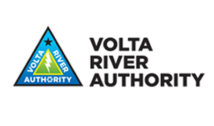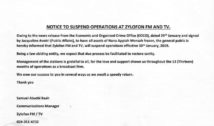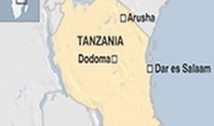Six groups to demonstrate against luxurious vehicle tax
- 17 Feb 2019 --
Six groups will on Tuesday, February 19 demonstrate against the luxurious vehicle tax by driving their vehicles to the premises of the Ministry of Finance, Parliament House and the Golden Jubilee House.
According to a statement jointly signed by the groups namely; Vehicle and Asset Dealers Association of Ghana, National Concerned Spare Parts Dealers Association, True Drivers Union, Concerned Drivers Association, Ghana Committed Drivers Association and Chamber of Petroleum Consumers, they expect about 2,000 luxurious vehicles to be involved in the protest.
“The demonstration is scheduled at 8 am on the said date. The route will be from Obra Spot through Kwame Nkrumah Avenue to Farisco Traffic light through to TUC before leaving our vehicles at institutions mentioned above,” the statement said.
In July 2018, the Minister of Finance, Mr Ken Ofori Atta in the mid-year budget review announced the imposition of a luxury vehicle import tax as part of a new policy to help raise more revenue.
He said the tax would be imposed on luxury vehicles with the capacity of 3.0 litres and above.
The implementation of the luxury vehicle law commenced August 1 after Parliament passed it to impose an annual levy on vehicles with high engine capacities after it was proposed by the government.
With the approval of the legislators for its implementation, vehicles with engine capacity of 2950 to 3549 Cubic Centimetres were required to pay a levy of GH¢1,000, while those with engines between 3,550 to 4049 cubic centimetres would pay GH¢1,500.
Vehicles with engine capacities above 4049cc were also obliged to pay GH¢2,000.
The levy would be paid by the vehicle owner on the registration of the vehicle and subsequently on or before the annual renewal of the roadworthy certificate each year to the DVLA, the body authorised by law to collect the levy on behalf of the government.
Although the levy has been imposed on vehicles with the listed cubic centimetres existing prior to the passage of the law, exempt from the levy are vehicles such as tractors; ambulances; commercial vehicles that have the capacity to transport more than 10 persons, commercial vehicles for the transport of goods among others.




























































































































































































































































































































































1,560 comments
The Confidential
7:04 pmF*ckin? awesome issues here. I am very satisfied to see your article. Thank you a lot and i’m taking a look forward to touch you. Will you kindly drop me a mail?
https://www.outlookindia.com/outlook-spotlight/fluxactive-complete-reviews-caution-prices-are-too-crazy–news-253312
The Confidential
7:04 pmThis is very attention-grabbing, You are an excessively skilled blogger. I have joined your rss feed and look ahead to seeking extra of your fantastic post. Also, I have shared your website in my social networks!
https://www.offshoresportsbooks.com/
The Confidential
7:04 pmOne thing is that one of the most popular incentives for applying your credit card is a cash-back or perhaps rebate present. Generally, you will get 1-5 back upon various expenses. Depending on the credit card, you may get 1 again on most buying, and 5 back on purchases made using convenience stores, gasoline stations, grocery stores as well as ‘member merchants’.
https://xcaosystemgroup.com/
The Confidential
7:04 pmThanks for the points shared on your own blog. Another thing I would like to state is that fat loss is not information on going on a fad diet and trying to reduce as much weight as you’re able in a couple of weeks. The most effective way in losing weight is by having it slowly and gradually and using some basic guidelines which can enable you to make the most from your attempt to shed weight. You may realize and already be following a few of these tips, nonetheless reinforcing understanding never does any damage.
https://www.picktechsolution.com/
The Confidential
7:04 pmThis is really fascinating, You’re a very professional blogger. I’ve joined your feed and sit up for searching for more of your great post. Also, I have shared your web site in my social networks!
https://solitairegames.website/
The Confidential
7:04 pmThe very crux of your writing while sounding agreeable at first, did not really work very well with me personally after some time. Somewhere within the sentences you actually managed to make me a believer unfortunately only for a very short while. I nevertheless have a problem with your jumps in assumptions and you might do well to fill in those gaps. If you actually can accomplish that, I will surely end up being impressed.
https://buhfe.xyz/2023/01/26/have-the-finest-ideas-to-be-able-to-develop-into-an-internationale-organisation-fac29cr-standardisierung-realtor/
The Confidential
7:04 pmThis is the suitable weblog for anybody who needs to find out about this topic. You notice a lot its almost laborious to argue with you (not that I truly would want?HaHa). You undoubtedly put a new spin on a topic thats been written about for years. Nice stuff, simply great!
https://www.ikariajuice-ikariajuice.com/
The Confidential
7:04 pmI’m typically to blogging and i really respect your content. The article has really peaks my interest. I’m going to bookmark your website and keep checking for brand spanking new information.
http://thenonist.com/index.php?URL=https://www.4flix.co/
The Confidential
7:04 pmHi my friend! I wish to say that this article is awesome, nice written and include approximately all vital infos. I would like to see more posts like this.
https://easytvuk.co.uk/how-to-install-a-uhf-aerial/
The Confidential
7:04 pmHi, I think your site might be having browser compatibility issues. When I look at your website in Safari, it looks fine but when opening in Internet Explorer, it has some overlapping. I just wanted to give you a quick heads up! Other then that, fantastic blog!
https://www.zoritolerimol.com
The Confidential
7:04 pmNice read, I just passed this onto a friend who was doing a little research on that. And he actually bought me lunch as I found it for him smile Thus let me rephrase that: Thanks for lunch!
https://thepetagrees.org/get-affordable-vet-insurance-coverage-for-cats/
The Confidential
7:04 pmExcellent website. Lots of helpful information here. I?m sending it to several friends ans additionally sharing in delicious. And certainly, thank you for your effort!
https://thechronicbeaver.com/best-online-dispensary-canada-top-6-list/
The Confidential
7:04 pmTerrific paintings! This is the type of info that should be shared across the web. Shame on Google for no longer positioning this submit higher! Come on over and consult with my web site . Thanks =)
https://fangwallet.com/
The Confidential
7:04 pmSpot on with this write-up, I truly suppose this web site needs rather more consideration. I?ll in all probability be again to learn rather more, thanks for that info.
https://easytvuk.co.uk/how-to-install-a-uhf-aerial/
The Confidential
7:04 pmI will immediately grasp your rss feed as I can’t in finding your e-mail subscription link or e-newsletter service. Do you’ve any? Please allow me realize so that I may subscribe. Thanks.
https://www.prodentim-prodentim-prodentim.com/
The Confidential
7:04 pmwonderful points altogether, you just received a brand new reader. What would you suggest about your put up that you just made some days in the past? Any sure?
https://fixedmatches-1×2.com/
The Confidential
7:04 pmVery nice post. I just stumbled upon your blog and wished to say that I’ve truly enjoyed browsing your blog posts. After all I will be subscribing to your rss feed and I hope you write again very soon!
https://isma.ppsma.dindik.jatimprov.go.id/ektsp/data/
The Confidential
7:04 pmI have noticed that in digital camera models, unique receptors help to {focus|concentrate|maintain focus|target|a**** automatically. Those sensors regarding some cams change in in the area of contrast, while others employ a beam with infra-red (IR) light, specifically in low lumination. Higher spec cameras often use a mix of both techniques and probably have Face Priority AF where the digicam can ‘See’ any face while keeping focused only upon that. Many thanks for sharing your thinking on this weblog.
https://keitaide-music.org/2023/02/10/merchant-account-hold-what-it-is-why-its-done-how-to-avoid-it/
The Confidential
7:04 pmI like what you guys are up also. Such intelligent work and reporting! Keep up the superb works guys I?ve incorporated you guys to my blogroll. I think it’ll improve the value of my site 🙂
https://homemaintenancedubai.com/แมนยูไนเต็ด/
The Confidential
7:04 pmI really believe that a foreclosed can have a significant effect on the debtor’s life. House foreclosures can have a 8 to several years negative impact on a client’s credit report. A borrower that has applied for a home loan or just about any loans for example, knows that the actual worse credit rating is definitely, the more challenging it is to acquire a decent loan. In addition, it could possibly affect a borrower’s power to find a quality place to let or rent, if that becomes the alternative property solution. Thanks for your blog post.
http://sports.unisda.ac.id/champions-league-drawing-results-2022/
The Confidential
7:04 pmI think that is among the so much significant info for me. And i am glad studying your article. But wanna observation on few general issues, The website style is ideal, the articles is in reality great : D. Just right job, cheers
http://z10112.com/choosing-from-among-typically-the-many-merchant-solutions/
The Confidential
7:04 pmI have realized that over the course of developing a relationship with real estate managers, you’ll be able to get them to understand that, in each and every real estate financial transaction, a fee is paid. Finally, FSBO sellers will not “save” the payment. Rather, they try to win the commission by doing a great agent’s occupation. In doing this, they spend their money along with time to complete, as best they could, the assignments of an broker. Those assignments include disclosing the home through marketing, offering the home to all buyers, building a sense of buyer urgency in order to prompt an offer, booking home inspections, managing qualification assessments with the bank, supervising fixes, and aiding the closing of the deal.
https://www.werockthespectrumloudoun.com/
The Confidential
7:04 pmAnother thing is that when looking for a good online electronics retail outlet, look for web stores that are constantly updated, retaining up-to-date with the hottest products, the best deals, plus helpful information on goods and services. This will ensure that you are getting through a shop that really stays atop the competition and offers you what you need to make educated, well-informed electronics acquisitions. Thanks for the vital tips I have learned through the blog.
https://shqtwup.com/2023/02/26/two-tips-for-creating-the-best-merchant-services-sales-pitch/
The Confidential
7:04 pmhi!,I like your writing so much! share we communicate more about your article on AOL? I require a specialist on this area to solve my problem. Maybe that’s you! Looking forward to see you.
http://www.sekaantika.com/
The Confidential
7:04 pmThere’s noticeably a bundle to find out about this. I assume you made certain nice points in features also.
https://usananosoft.com/product/buy-google-ads-accounts/
The Confidential
7:04 pmIt’s my opinion that a foreclosures can have a important effect on the applicant’s life. Foreclosures can have a Six to ten years negative impact on a borrower’s credit report. A borrower who’s applied for a home loan or any loans for example, knows that the particular worse credit rating is usually, the more challenging it is to obtain a decent mortgage loan. In addition, it can affect the borrower’s capacity to find a good place to let or rent, if that becomes the alternative property solution. Interesting blog post.
https://halabancharcoalsupplierin44980.bloguetechno.com/The-Ultimate-Guide-To-Halaban-Charcoal-Supplier-indonesia-52080207
The Confidential
7:04 pmI do not even know how I finished up here, however I thought this submit was once good. I don’t know who you might be however definitely you are going to a well-known blogger if you happen to aren’t already 😉 Cheers!
https://www.realdildos.com/big-anal-dildo/
The Confidential
7:04 pmIt’s best to take part in a contest for top-of-the-line blogs on the web. I’ll advocate this web site!
https://citytoto.net/
The Confidential
7:04 pmHi my friend! I want to say that this post is awesome, great written and come with approximately all significant infos. I would like to look more posts like this .
https://nigellasativa.org/cumin-noir/
The Confidential
7:04 pmOnce I initially commented I clicked the -Notify me when new comments are added- checkbox and now every time a remark is added I get 4 emails with the identical comment. Is there any means you’ll be able to take away me from that service? Thanks!
https://almetals.cn/product/4×8-aluminum-sheet/
The Confidential
7:04 pmOne thing I’ve noticed is that there are plenty of beliefs regarding the lenders intentions whenever talking about property foreclosure. One fantasy in particular is the fact the bank needs to have your house. Your banker wants your hard earned money, not your home. They want the amount of money they loaned you along with interest. Staying away from the bank will simply draw a new foreclosed final result. Thanks for your article.
https://lookerstudio.google.com/u/0/reporting/416e8eed-1b4c-448d-8cd4-00a6e2118b54/page/VJjGD
The Confidential
7:04 pmOne other important aspect is that if you are an elderly person, travel insurance with regard to pensioners is something you should really think about. The mature you are, a lot more at risk you might be for permitting something undesirable happen to you while abroad. If you are definitely not covered by quite a few comprehensive insurance, you could have a number of serious issues. Thanks for expressing your ideas on this web blog.
https://patf.org/
The Confidential
7:04 pmOne thing I have actually noticed is that there are plenty of misguided beliefs regarding the banking institutions intentions when talking about foreclosure. One misconception in particular is the fact the bank desires your house. The lending company wants your hard earned money, not the home. They want the funds they loaned you having interest. Keeping away from the bank will simply draw a new foreclosed realization. Thanks for your post.
https://upperstory.io
The Confidential
7:04 pmNice read, I just passed this onto a colleague who was doing some research on that. And he actually bought me lunch since I found it for him smile Therefore let me rephrase that: Thank you for lunch!
https://totoswing.com
The Confidential
7:04 pmOne more thing to say is that an online business administration program is designed for people to be able to effortlessly proceed to bachelor’s degree education. The 90 credit diploma meets the other bachelor diploma requirements then when you earn the associate of arts in BA online, you’ll have access to the most recent technologies within this field. Several reasons why students would like to get their associate degree in business is because they are interested in the field and want to get the general education necessary ahead of jumping in a bachelor college diploma program. Thx for the tips you really provide with your blog.
https://totobts.com/
The Confidential
7:04 pmWow, awesome weblog structure! How lengthy have you been running a blog for? you made blogging look easy. The overall look of your web site is magnificent, let alone the content!
http://ucnewswire.org/
The Confidential
7:04 pmcertainly like your web-site but you need to check the spelling on quite a few of your posts. Many of them are rife with spelling problems and I find it very troublesome to tell the truth nevertheless I will definitely come back again.
https://watermanaustralia.com/product/zero-liquid-discharge-system-zld-system/
The Confidential
7:04 pmHiya very nice website!! Man .. Excellent .. Wonderful .. I will bookmark your website and take the feeds also?I am happy to find so many useful information right here within the post, we’d like develop more techniques in this regard, thanks for sharing. . . . . .
https://www.wugt.news/post/pr/December-07-2022/FTC-Investigates-Crypto-Firms-in-Search-of-Potential-Misconduct
The Confidential
7:04 pmAfter study just a few of the weblog posts in your web site now, and I actually like your method of blogging. I bookmarked it to my bookmark website list and will likely be checking back soon. Pls check out my site as well and let me know what you think.
https://www.wugt.news/post/automotive/February-06-2023/Ford-is-planning-a-special-high-performance-F150-Lightning-model
The Confidential
7:04 pmOne more thing I would like to express is that rather than trying to match all your online degree classes on days that you finish work (since the majority of people are tired when they return), try to arrange most of your classes on the week-ends and only one or two courses in weekdays, even if it means taking some time off your saturday and sunday. This is really good because on the saturdays and sundays, you will be extra rested plus concentrated for school work. Thanks for the different guidelines I have acquired from your blog. Dr Vi PDO Thread Lift Melbourne 602A Bourke Street Melbourne Victoria Australia 3000
https://www.google.com/maps/place/602+Bourke+St,+Melbourne+VIC+3000/@-37.8161822,144.955908,17z/data=!3m1!4b1!4m5!3m4!1s0x6ad65d4c26c6aac1:0x1d7e87b56c266f95!8m2!3d-37.8161822!4d144.955908
The Confidential
7:04 pmvery good put up, i definitely love this web site, carry on it
https://red–boost.pro
The Confidential
7:04 pmThank you for another informative blog. Where else could I get that kind of info written in such an ideal way? I have a project that I am just now working on, and I have been on the look out for such info.
https://watermanaustralia.com/tailings-and-tailings-storage-facilities/
The Confidential
7:04 pmUndeniably consider that that you said. Your favourite justification seemed to be at the web the simplest thing to take into accout of. I say to you, I certainly get irked while other folks consider concerns that they plainly don’t recognize about. You managed to hit the nail upon the top and also outlined out the whole thing without having side effect , other folks can take a signal. Will likely be again to get more. Thanks
https://www.jellypages.com/life-style/
The Confidential
7:04 pmI believe that avoiding highly processed foods is a first step in order to lose weight. They could taste fine, but ready-made foods currently have very little nutritional value, making you try to eat more simply to have enough power to get through the day. In case you are constantly eating these foods, switching to grain and other complex carbohydrates will assist you to have more energy while having less. Great blog post.
https://iptv-getline.com/
The Confidential
7:04 pmI have learned a number of important things as a result of your post. I’d also like to convey that there might be situation that you will get a loan and never need a co-signer such as a National Student Support Loan. However, if you are getting a borrowing arrangement through a common financial institution then you need to be willing to have a cosigner ready to help you. The lenders can base their very own decision on the few aspects but the largest will be your credit worthiness. There are some financial institutions that will furthermore look at your work history and decide based on this but in many instances it will hinge on your rating.
https://159.65.12.174/
The Confidential
7:04 pmI have learned new things by means of your site. One other thing I’d really like to say is the fact newer computer system operating systems are inclined to allow extra memory for use, but they as well demand more storage simply to work. If a person’s computer is unable to handle far more memory and also the newest application requires that storage increase, it may be the time to buy a new Laptop. Thanks
https://www.wugt.news/post/fashion/March-11-2023/Jenna-Ortega-breaks-the-silence-on-recent-Wardrobe-Malfunction-at-Scream-VI-Premiere
The Confidential
7:04 pmThank you for sharing all these wonderful content. In addition, the perfect travel along with medical insurance strategy can often relieve those problems that come with vacationing abroad. Some sort of medical emergency can soon become too expensive and that’s likely to quickly slam a financial burden on the family’s finances. Putting in place the ideal travel insurance package prior to leaving is definitely worth the time and effort. Thanks
https://www.wugt.news/post/fashion/November-25-2022/Balenciaga-now-sues-the-creative-masterminds-behind-a-BDSMthemed-photoshoot-featuring-children
The Confidential
7:04 pmThis is very interesting, You are a very skilled blogger. I have joined your feed and look forward to seeking more of your wonderful post. Also, I’ve shared your web site in my social networks!
https://savingspromocodes.com/bulk-office
The Confidential
7:04 pmGreat site. Plenty of helpful information here. I am sending it to several buddies ans additionally sharing in delicious. And naturally, thanks to your effort!
vídeo bokep jepang
The Confidential
7:04 pmOne more issue is that video games are usually serious naturally with the major focus on learning rather than fun. Although, it comes with an entertainment facet to keep your kids engaged, each game is generally designed to work with a specific skill set or curriculum, such as numbers or science. Thanks for your posting.
https://flyavia.ge/
The Confidential
7:04 pmOne thing I would like to discuss is that fat burning plan fast can be achieved by the perfect diet and exercise. A person’s size not only affects the look, but also the quality of life. Self-esteem, major depression, health risks, and physical capabilities are affected in an increase in weight. It is possible to make everything right and still gain. Should this happen, a problem may be the reason. While too much food and not enough exercising are usually at fault, common medical ailments and traditionally used prescriptions can certainly greatly increase size. Thanks for your post right here.
https://www.schonpuppen.com/
The Confidential
7:04 pmGreat ? I should certainly pronounce, impressed with your web site. I had no trouble navigating through all tabs and related information ended up being truly easy to do to access. I recently found what I hoped for before you know it at all. Quite unusual. Is likely to appreciate it for those who add forums or something, site theme . a tones way for your customer to communicate. Nice task..
https://www.thebergenbk.com/
The Confidential
7:04 pmJust desire to say your article is as astounding. The clearness on your put up is just spectacular and that i could assume you are a professional on this subject. Well along with your permission allow me to snatch your RSS feed to stay updated with coming near near post. Thank you a million and please keep up the gratifying work.
https://l4rgrummy.com/
The Confidential
7:04 pmI might also like to mention that most of those who find themselves with out health insurance are usually students, self-employed and people who are unemployed. More than half on the uninsured are really under the age of 35. They do not experience they are looking for health insurance simply because they’re young as well as healthy. Their particular income is typically spent on housing, food, and also entertainment. Many individuals that do represent the working class either whole or as a hobby are not given insurance by means of their work so they head out without as a result of rising expense of health insurance in the usa. Thanks for the tips you reveal through this blog.
https://metaboflex.uk/
The Confidential
7:04 pmNice post. I learn something tougher on different blogs everyday. It would at all times be stimulating to learn content material from different writers and observe somewhat something from their store. I?d want to make use of some with the content on my weblog whether or not you don?t mind. Natually I?ll offer you a hyperlink on your internet blog. Thanks for sharing.
https://metabo–flex.us/
The Confidential
7:04 pmI like the helpful info you provide in your articles. I?ll bookmark your weblog and check again here frequently. I’m quite certain I will learn lots of new stuff right here! Good luck for the next!
https://prodentimbuy.us/
The Confidential
7:04 pmI have discovered some important things through your blog post. One other stuff I would like to talk about is that there are lots of games in the marketplace designed specially for preschool age small children. They involve pattern identification, colors, animals, and shapes. These normally focus on familiarization as an alternative to memorization. This keeps little children engaged without experiencing like they are learning. Thanks
https://sultanhoki89.beauty/
The Confidential
7:04 pmWe are a gaggle of volunteers and starting a new scheme in our community. Your web site offered us with useful information to paintings on. You have performed an impressive process and our entire community will be grateful to you.
https://wisata.butonkab.go.id/slot-gacor/
The Confidential
7:04 pmI have figured out some significant things through your website post. One other thing I would like to state is that there are numerous games available and which are designed especially for toddler age youngsters. They include pattern identification, colors, family pets, and models. These usually focus on familiarization in lieu of memorization. This keeps little kids occupied without sensing like they are learning. Thanks
https://hoagiay.org/p/cay-hoa-giay-do-giay-thai-lan-la-nho/
The Confidential
7:04 pmI like the valuable information you provide in your articles. I?ll bookmark your weblog and check again here frequently. I am quite sure I?ll learn lots of new stuff right here! Best of luck for the next!
https://www.netvisioncorporation.com
The Confidential
7:04 pmMagnificent items from you, man. I’ve be mindful your stuff prior to and you’re simply extremely fantastic. I really like what you’ve bought here, certainly like what you are saying and the way by which you assert it. You make it enjoyable and you still take care of to stay it sensible. I cant wait to learn much more from you. This is really a tremendous web site.
https://s3.us-east-1.wasabisys.com/SaskatoonExcavating/Excavating/www-saskatoonexcavating-ca.html
The Confidential
7:04 pmIt’s the best time to make some plans for the future and it’s time to be happy. I’ve read this post and if I could I want to suggest you few interesting things or suggestions. Maybe you can write subsequent articles regarding this article. I want to learn even more issues approximately it!
https://www.dailynewsen.com/877-area-code-p-h32932.html
The Confidential
7:04 pmThanks for your posting. One other thing is that often individual states have their very own laws of which affect house owners, which makes it quite hard for the the legislature to come up with a brand new set of rules concerning foreclosed on homeowners. The problem is that each state provides own legislation which may work in an unfavorable manner when it comes to foreclosure procedures.
https://tempus-machina.com/
The Confidential
7:04 pmI?ll right away grab your rss as I can not find your email subscription link or e-newsletter service. Do you’ve any? Please let me know in order that I could subscribe. Thanks.* JJ’s Ducted Gas Heating Repairs and Installation * 162 Mitchell Rd, Lilydale VIC 3140 * 0412 531 821
https://www.air-conditioning.net.au/
The Confidential
7:04 pmYour place is valueble for me. Thanks!?
https://dzmind.com/nuts-bulk
The Confidential
7:04 pmIt is perfect time to make some plans for the future and it is time to be happy. I have read this post and if I could I want to suggest you few interesting things or advice. Maybe you could write next articles referring to this article. I want to read even more things about it!
https://faltusova.cz/
The Confidential
7:04 pmhello there and thanks on your information ? I have certainly picked up something new from right here. I did however experience several technical issues using this site, since I skilled to reload the website many times previous to I may just get it to load properly. I have been considering if your hosting is OK? Now not that I’m complaining, however sluggish loading instances occasions will sometimes affect your placement in google and could damage your high quality ranking if ads and ***********|advertising|advertising|advertising and *********** with Adwords. Anyway I am adding this RSS to my email and can look out for much extra of your respective intriguing content. Ensure that you replace this again soon..
https://www.dailynewsen.com/844-area-code-h24789.html
The Confidential
7:04 pmTake a look at our brands and find the next outfit for your party, evening out, holiday or just for everyday! Wide range of dresses for women, from summer dresses, evening dresses, to long gowns and one piece dresses.
https://bombb.com/
The Confidential
7:04 pmI think this is one of the most important info for me. And i am glad reading your article. But wanna remark on some general things, The website style is ideal, the articles is really excellent : D. Good job, cheers
https://isoagent.blogspot.com
The Confidential
7:04 pmI used to be suggested this web site through my cousin. I’m no longer certain whether or not this post is written by way of him as nobody else recognize such unique about my trouble. You are amazing! Thanks!
https://cryptomaniaks.com/bitcoin-gambling-sites
The Confidential
7:04 pmI am extremely impressed with your writing talents as neatly as with the structure for your weblog. Is this a paid subject or did you modify it your self? Either way keep up the excellent quality writing, it?s uncommon to peer a great weblog like this one nowadays..
https://decidetotravel.com/a-guide-to-romes-historic-fountains/2023/03/12/
The Confidential
7:04 pmThanks for this article. I’d also like to convey that it can end up being hard when you’re in school and starting out to create a long credit history. There are many individuals who are only trying to live and have long or favourable credit history can often be a difficult factor to have.
https://mp3juice.website
The Confidential
7:04 pmThanks for your useful article. Other thing is that mesothelioma cancer is generally the result of the inhalation of fibres from mesothelioma, which is a dangerous material. Its commonly observed among laborers in the engineering industry with long contact with asbestos. It is caused by living in asbestos protected buildings for long periods of time, Genetics plays a crucial role, and some folks are more vulnerable on the risk than others.
https://arij.net/investigations/panadora-papers/Yemen-Oil/
The Confidential
7:04 pmAnother thing I have noticed is for many people, below-average credit is the reaction to circumstances above their control. As an example they may be actually saddled through an illness and as a consequence they have excessive bills for collections. It can be due to a job loss or the inability to do the job. Sometimes divorce process can really send the money in an opposite direction. Thanks sharing your notions on this blog site.
https://thungxop.net/thung-xop-dai-1m-dung-ca-do-van-chuyen-dai/
The Confidential
7:04 pmI like the helpful info you provide in your articles. I will bookmark your weblog and check again here frequently. I am quite certain I will learn many new stuff right here! Best of luck for the next!
https://ikariajuices.org
The Confidential
7:04 pmHi, Neat post. There’s a problem with your website in internet explorer, would test this? IE still is the market leader and a good portion of people will miss your magnificent writing due to this problem.
https://www.smkn1perhentianraja.sch.id/read/10/cara-menulis-daftar-pustaka/
The Confidential
7:04 pmHello there, just became alert to your blog through Google, and found that it is really informative. I?m going to watch out for brussels. I?ll be grateful if you continue this in future. A lot of people will be benefited from your writing. Cheers!
https://mt-toto.net/
The Confidential
7:04 pmHello, you used to write great, but the last several posts have been kinda boring? I miss your tremendous writings. Past few posts are just a little bit out of track! come on!
https://snipme.io/4EGxz3
The Confidential
7:04 pmI have noticed that car insurance corporations know the automobiles which are susceptible to accidents and other risks. They also know what types of cars are inclined to higher risk as well as the higher risk they have the higher the actual premium amount. Understanding the straightforward basics with car insurance just might help you choose the right style of insurance policy that may take care of your family needs in case you happen to be involved in any accident. Many thanks sharing your ideas in your blog.
https://www.pumpclic.com/
The Confidential
7:04 pmThere are some attention-grabbing time limits in this article but I don?t know if I see all of them heart to heart. There may be some validity however I’ll take maintain opinion until I look into it further. Good article , thanks and we wish extra! Added to FeedBurner as properly
https://cleartest.com/
The Confidential
7:04 pmI?ll right away grab your rss feed as I can not find your email subscription link or newsletter service. Do you’ve any? Kindly let me know so that I could subscribe. Thanks.
https://www.gdsgt.net
The Confidential
7:04 pmThese days of austerity along with relative anxiety about taking on debt, many individuals balk up against the idea of making use of a credit card in order to make purchase of merchandise or pay for a holiday, preferring, instead just to rely on the particular tried in addition to trusted technique of making repayment – hard cash. However, in case you have the cash available to make the purchase completely, then, paradoxically, this is the best time for them to use the cards for several factors.
https://www.elovedolls.com/cheap-sex-dolls.html
The Confidential
7:04 pmI’ve learned some new things through your blog. One other thing I would really like to say is the fact newer computer system os’s have a tendency to allow much more memory to be played with, but they likewise demand more ram simply to operate. If your computer could not handle extra memory as well as newest program requires that memory increase, it might be the time to buy a new PC. Thanks
https://www.adtsecurity.systems/
The Confidential
7:04 pmThank you for sharing excellent informations. Your web-site is so cool. I’m impressed by the details that you?ve on this site. It reveals how nicely you understand this subject. Bookmarked this web page, will come back for extra articles. You, my friend, ROCK! I found simply the information I already searched all over the place and just couldn’t come across. What a great site.Mathew J Anti-Wrinkle Injections 58 Cotham Road, Kew VIC 3101
http://bit.ly/3ZkTPYV
The Confidential
7:04 pmI’ve been absent for some time, but now I remember why I used to love this blog. Thank you, I?ll try and check back more frequently. How frequently you update your site?
https://www.remington-870.store/product/model-870-wingmaster-classictrap-3/
The Confidential
7:04 pmWhat i do not understood is actually how you’re not really much more well-liked than you might be now. You are very intelligent. You realize thus considerably relating to this subject, made me personally consider it from numerous varied angles. Its like men and women aren’t fascinated unless it is one thing to accomplish with Lady gaga! Your own stuffs outstanding. Always maintain it up!
https://www.krtcarts.org
The Confidential
7:04 pmI really believe that a foreclosure can have a significant effect on the client’s life. Property foreclosures can have a Seven to decade negative effects on a client’s credit report. Any borrower who have applied for a home loan or any loans even, knows that the actual worse credit rating will be, the more tough it is to obtain a decent financial loan. In addition, it could affect the borrower’s power to find a decent place to let or hire, if that gets the alternative housing solution. Great blog post.
https://greenfleets.org/
The Confidential
7:04 pmHiya, I’m really glad I have found this info. Nowadays bloggers publish only about gossips and web and this is actually irritating. A good site with exciting content, this is what I need. Thanks for keeping this web-site, I will be visiting it. Do you do newsletters? Cant find it.
https://urinedrugtesthq.com/
The Confidential
7:04 pmI’ve learned result-oriented things through your blog post. Also a thing to I have noticed is that usually, FSBO sellers will probably reject anyone. Remember, they can prefer never to use your products and services. But if you maintain a reliable, professional romance, offering support and remaining in contact for about four to five weeks, you will usually be able to win a discussion. From there, a house listing follows. Thank you
https://www.inkstation.com.au/hp-toner-cartridges-prn-1836.html
The Confidential
7:04 pmnaturally like your web site but you have to take a look at the spelling on quite a few of your posts. A number of them are rife with spelling problems and I find it very bothersome to tell the reality on the other hand I?ll surely come again again.
https://partopiayacss.blob.core.windows.net/port-moody-chiro1/port-moody-chiro1/chiropractor.html
The Confidential
7:04 pmMy brother suggested I might like this blog. He was entirely right. This post truly made my day. You can not imagine just how much time I had spent for this info! Thanks!
https://us-east-1.linodeobjects.com/surrey-web-design/surrey-web-design/responsive-design.html
The Confidential
7:04 pmThis really answered my drawback, thanks!
https://usc1.contabostorage.com/e8e1b3b0d4bf4e5895ff63e0b8456bf4:divorce-lawyer-surrey3/divorce-lawyer-surrey3/how-to-secure-the-best-possible-outcome-in-your-divorce-with-a-surrey-lawyer.html
The Confidential
7:04 pmAlso I believe that mesothelioma is a scarce form of cancers that is usually found in individuals previously exposed to asbestos. Cancerous cells form in the mesothelium, which is a protecting lining which covers the vast majority of body’s organs. These cells ordinarily form from the lining with the lungs, mid-section, or the sac that encircles the heart. Thanks for expressing your ideas.
https://www.longisland.com/profile/byron52346
The Confidential
7:04 pmI have been absent for some time, but now I remember why I used to love this website. Thanks , I will try and check back more often. How frequently you update your site?
https://almashhadalkhaleeji.com/news58596.html
The Confidential
7:04 pmWhat i don’t realize is in reality how you are not actually much more neatly-preferred than you might be right now. You are very intelligent. You recognize thus significantly in relation to this topic, made me in my view consider it from a lot of various angles. Its like men and women are not fascinated until it¦s one thing to accomplish with Girl gaga! Your own stuffs nice. Always take care of it up!
https://playslot77jackpot.win/slot/red_tiger_slot
The Confidential
7:04 pmYet another thing I would like to mention is that in place of trying to match all your online degree tutorials on days and nights that you end work (considering that people are fatigued when they return), try to find most of your instructional classes on the weekends and only one or two courses in weekdays, even if it means a little time away from your weekend. This is really good because on the weekends, you will be a lot more rested and concentrated upon school work. Thanks for the different recommendations I have realized from your weblog.
https://www.forsythsoftware.com/salesforce-services/?src=b1
The Confidential
7:04 pmDefinitely imagine that which you stated. Your favorite justification appeared to be at the web the easiest thing to consider of. I say to you, I definitely get annoyed even as people think about issues that they just do not know about. You managed to hit the nail upon the top and also defined out the whole thing without having side effect , people can take a signal. Will likely be back to get more. Thank you
http://nombresitio.com/considerations-for-choosing-a-beauty-salon/
The Confidential
7:04 pmHello there, I found your web site via Google even as searching for a similar topic, your site came up, it seems good. I have bookmarked it in my google bookmarks.
https://isocreditcardprocessor.blogspot.com/2023/03/nail-and-hair-salon-pos-systems.html
The Confidential
7:04 pmWow, awesome blog layout! How long have you been blogging for? you made blogging look easy. The overall look of your website is great, let alone the content!
https://trackbookmark.com/story10519756/reformas-baC3B1os-zaragoza
The Confidential
7:04 pmThanks a lot for your post. I’d really like to say that the cost of car insurance differs from one coverage to another, since there are so many different facets which bring about the overall cost. For example, the model and make of the auto will have a tremendous bearing on the price tag. A reliable old family motor vehicle will have a more affordable premium than the usual flashy fancy car.
https://www.artporat.com/
The Confidential
7:04 pmYet another thing I would like to state is that as an alternative to trying to suit all your online degree courses on times that you complete work (since the majority of people are worn out when they return home), try to arrange most of your instructional classes on the weekends and only a couple of courses for weekdays, even if it means taking some time away from your weekend. This is fantastic because on the week-ends, you will be far more rested as well as concentrated with school work. Thanks a lot for the different guidelines I have acquired from your website.
https://wo.lyoncat.com/read-blog/74
The Confidential
7:04 pmyou’re in reality a just right webmaster. The website loading speed is incredible. It kind of feels that you are doing any distinctive trick. Moreover, The contents are masterwork. you have done a wonderful activity on this topic!
https://www.tasktigerdesigns.com/post/things-to-tell-your-designer-before-starting-a-project
The Confidential
7:04 pmThanx for the effort, keep up the good work Great work, I am going to start a small Blog Engine course work using your site I hope you enjoy blogging with the popular BlogEngine.net.Thethoughts you express are really awesome. Hope you will right some more posts.
https://playslot77jackpot.win/slot/sbo_slot
The Confidential
7:04 pmKeep functioning ,great job!
https://playslot77jackpot.win/slot/pragmatic_slot
The Confidential
7:04 pmI was just searching for this info for a while. After 6 hours of continuous Googleing, at last I got it in your web site. I wonder what is the lack of Google strategy that do not rank this type of informative web sites in top of the list. Normally the top sites are full of garbage.
https://globalcbdbrands.com/cbd-reviews/zebra-cbd-reviews-a-comprehensive-analysis-of-the-brand/5349/
The Confidential
7:04 pmWow, fantastic blog layout! How lengthy have you ever been blogging for? you made blogging look easy. The whole glance of your website is wonderful, let alone the content!
https://costplusjunkremoval.com/home-junk-removal/
The Confidential
7:04 pmYou’re looking for model and booking? 온라인바카라 visit my timeline for more details 😉 😉
The Confidential
7:04 pmI think you have remarked some very interesting points, thankyou for the post.
https://betwing88gacor.com/
The Confidential
7:04 pmGenerally I don’t read article on blogs, but I would like to say that this write-up very forced me to try and do so! Your writing style has been surprised me. Thanks, quite nice article.
https://surgwinmax3.live/
The Confidential
7:04 pmHeya i am for the primary time here. I found this board and I to find It really useful & it helped me out a lot. I hope to provide something back and aid others such as you helped me.
https://storage.googleapis.com/web-design-new-jersey-3/what-is-the-very-best-means-to-make-your-brand-stick-out-in-new-jacket-website-design-solutions-from-specialists.html
The Confidential
7:04 pmExcellent post. I was checking continuously this blog and I’m impressed! Extremely useful info specially the last part 🙂 I care for such info a lot. I was seeking this particular information for a very long time. Thank you and best of luck.
https://hireproctor.com/
The Confidential
7:04 pmI really appreciate this post. I have been looking everywhere for this! Thank goodness I found it on Bing. You’ve made my day! Thx again!
https://playslot77.keepgooglereader.com/
The Confidential
7:04 pmGreat V I should definitely pronounce, impressed with your site. I had no trouble navigating through all the tabs as well as related information ended up being truly easy to do to access. I recently found what I hoped for before you know it in the least. Reasonably unusual. Is likely to appreciate it for those who add forums or anything, site theme . a tones way for your customer to communicate. Nice task..
https://fastwin77.gcisd-k12.org/
The Confidential
7:04 pmAs I web site possessor I believe the content material here is rattling wonderful , appreciate it for your efforts. You should keep it up forever! Good Luck.
https://www.outlookindia.com/outlook-spotlight/red-boost-reviews-separating-fact-from-fiction-don-t-buy-it-before-reading-this-shocking-report-news-263733
The Confidential
7:04 pmIm now not positive the place you’re getting your info, however good topic. I needs to spend a while studying more or understanding more. Thank you for fantastic info I was searching for this information for my mission.
https://betwing88.gcisd-k12.org/
The Confidential
7:04 pmHi, i think that i saw you visited my blog so i came to ?return the favor?.I am trying to find things to enhance my web site!I suppose its ok to use some of your ideas!!
https://s3.us-west-004.backblazeb2.com/chiropractor-port-moody/what-is-the-secret-to-pain-free-living-attempt-chiropractor-port-moody.html
The Confidential
7:04 pmWonderful blog! I found it while searching on Yahoo News. Do you have any suggestions on how to get listed in Yahoo News? I’ve been trying for a while but I never seem to get there! Thanks
https://sensaslot88.seetherainbow.com/
The Confidential
7:04 pmGood blog! I truly love how it is simple on my eyes and the data are well written. I’m wondering how I could be notified when a new post has been made. I have subscribed to your RSS which must do the trick! Have a great day!
https://semiproapps.com/small-business-guide-to-choosing-a-credit-card-processing-company/
The Confidential
7:04 pmI just could not go away your site before suggesting that I extremely enjoyed the usual info a person provide in your guests? Is gonna be again incessantly in order to check up on new posts
https://www.youtube.com/watch?v=1cObDeG6cP0
The Confidential
7:04 pmIt?s really a great and helpful piece of information. I am glad that you shared this useful info with us. Please keep us informed like this. Thanks for sharing.
https://www.deviantart.com/reformas1/art/Image-2-883293462?ga_submit_new=103A1624244657
The Confidential
7:04 pmI really like what you have acquired here, certainly like what you are stating and the way in which you say it.온라인바카라You make it enjoyable and you still take care of to keep it sensible.Thanks for sharing
The Confidential
7:04 pmI have seen many useful items on your web-site about personal computers. However, I’ve got the opinion that laptop computers are still more or less not powerful sufficiently to be a good selection if you frequently do things that require lots of power, including video enhancing. But for website surfing, statement processing, and most other typical computer functions they are okay, provided you may not mind your little friend screen size. Thank you sharing your ideas.
https://card.tv.br/
The Confidential
7:04 pmSpot on with this write-up, I truly think this web site needs way more consideration. I?ll in all probability be again to learn rather more, thanks for that info.
https://pgbetflik.online/
The Confidential
7:04 pmHello my loved one! I wish to say that this post is awesome, great written and include almost all important infos. I would like to look more posts like this .
http://www.commercialcoffeemachineexperts.co.uk/service-provider-service-becomes-significantly-affordable/
The Confidential
7:04 pmAlso a thing to mention is that an online business administration program is designed for college students to be able to well proceed to bachelor degree programs. The Ninety credit education meets the lower bachelor college degree requirements and when you earn your current associate of arts in BA online, you’ll have access to the newest technologies with this field. Some reasons why students want to be able to get their associate degree in business is because they may be interested in the field and want to have the general instruction necessary before jumping in a bachelor diploma program. Thanks for the tips you actually provide with your blog.
https://www.ethiovisit.com/myplace/reform5520
The Confidential
7:04 pmHey There. I discovered your blog the use of msn. That is a really neatly written article. I?ll be sure to bookmark it and come back to learn extra of your useful information. Thank you for the post. I will certainly return.
https://16808a.com/2023/05/11/bank-card-running-equipment-are-usually-the-bank-card-running-equipment-helping-you/
The Confidential
7:04 pmI just could not depart your web site before suggesting that I extremely enjoyed the standard info a person provide for your visitors? Is gonna be back often in order to check up on new posts
https://opyueliang.com/merchant-services-deep-dark-secrets/
The Confidential
7:04 pmThe article has truly peaked my interest. I will take a note of your site and keep checking for new information about once per week have learn several just right stuff here “오피스북 I’m not that much of a internet reader to be honest but your sites really
nice, keep it up! I’ll go ahead and bookmark your site to come backlater on. Cheers!!!
The Confidential
7:04 pmGreat post. I was checking constantly this weblog and I am impressed! Extremely helpful information particularly the final phase 🙂 I deal with such info much. I was seeking this particular info for a very lengthy time. Thank you and good luck.
https://videofromtext.com
The Confidential
7:04 pmThank you for another informative web site. Where else could I get that kind of info written in such an ideal way? I have a project that I am just now working on, and I have been on the look out for such info.
https://www.outlookindia.com/outlook-spotlight/cortexi-reviews-scam-exposed-you-must-need-to-know-news-282058
The Confidential
7:04 pmThank you for any other informative blog. Where else could I am getting that kind of information written in such a perfect way? I have a mission that I’m simply now running on, and I have been at the glance out for such info.
https://janitorial-cleaning-products-cambridge-1.s3.amazonaws.com/what-is-the-secret-to-a-tidy-and-healthy-and-balanced-workplace-cambridge-janitorial-a-cleansing-products-have-the-answer-1.html
The Confidential
7:04 pmWhat?s Happening i’m new to this, I stumbled upon this I’ve found It positively helpful and it has aided me out loads. I hope to contribute & assist other users like its helped me. Great job.
https://langley-roof-moss-removal.b-cdn.net/what-is-the-secret-to-a-durable-and-also-moss-free-roof-langley-roof-moss-removal-has-the-answer.html
The Confidential
7:04 pmYour house is valueble for me. Thanks!?
https://s3.us-east-1.wasabisys.com/vancouver-moss-removal-roof-cleaning/what-is-the-secret-to-completely-tidy-roofings-and-also-moss-free-gutters-in-vancouver-2.html
The Confidential
7:04 pmHey there, You have done an incredible job. I will definitely digg it and personally suggest to my friends. I am confident they’ll be benefited from this web site.
https://crwn.co
The Confidential
7:04 pmI have seen a lot of useful factors on your web site about desktops. However, I have got the impression that laptops are still more or less not powerful adequately to be a sensible choice if you generally do projects that require many power, including video editing. But for internet surfing, word processing, and majority of other frequent computer work they are perfectly, provided you can’t mind the little screen size. Thank you sharing your ideas.
https://www.gobuyship.com/jp-shipping.htm
The Confidential
7:04 pmThank you for sharing excellent informations. Your web site is so cool. I’m impressed by the details that you have on this website. It reveals how nicely you perceive this subject. Bookmarked this website page, will come back for more articles. You, my pal, ROCK! I found simply the information I already searched all over the place and just could not come across. What an ideal site.
https://migracionesatlanticas.linhd.uned.es/wp-content/et-cache/mawartoto/
The Confidential
7:04 pmi have learn several just right stuff here. Definitely value bookmarking for revisiting Aspectmontage makes it easy as can be and affordable for you to upgrade your windows, doors, roofing, showers or baths“성인웹툰”’m really impressed with your writing skills and also indow replacement Boston In addition to installing abode improvement products that compel your serene,
The Confidential
7:04 pmYour writing style is captivating, I couldn’t stop reading!
https://ar.wikipedia.org/wiki/D985D8B3D8AAD8AED8AFD985:D8ADD8B3D98AD986_D8A7D984D8ADD8ABD98AD984D98A
The Confidential
7:04 pmI have been surfing on-line greater than 3 hours lately, yet I never discovered any fascinating article like yours. It?s pretty worth enough for me. In my view, if all site owners and bloggers made excellent content as you probably did, the net can be much more helpful than ever before.
https://khabarein.com
The Confidential
7:04 pmYou could definitely see your expertise in the work you write. The world hopes for more passionate writers like you who aren’t afraid to say how they believe. Always go after your heart.
https://us-actiflow-us.us
The Confidential
7:04 pmWe are a bunch of volunteers and starting a brand new scheme in our community. Your web site provided us with helpful info to paintings on. You have done an impressive job and our whole group might be grateful to you.
https://mawartoto.pn-padangsidimpuan.go.id/
The Confidential
7:04 pmThanks for your publiction. Another factor is that being photographer will involve not only issues in recording award-winning photographs but additionally hardships in getting the best digital camera suited to your needs and most especially situations in maintaining the grade of your camera. This is very accurate and visible for those photography lovers that are directly into capturing the particular nature’s interesting scenes – the mountains, the forests, the actual wild and the seas. Visiting these exciting places absolutely requires a digicam that can live up to the wild’s tough conditions.
https://leetcode.com/reformaszaragoza/
The Confidential
7:04 pmI’m always excited to see new posts from you, your content is consistently great.
https://almontasaf.net/news62362.html
The Confidential
7:04 pmI was very pleased to find this web-site.I wanted to thanks to your time for this excellent read!! I definitely having fun with every little bit of it and I have you bookmarked to check out new stuff you blog post.
https://rspaw.or.id/wp-content/uploads/-/mawartoto/
The Confidential
7:04 pmThanks for your tips about this blog. Just one thing I would choose to say is purchasing consumer electronics items through the Internet is nothing new. The fact is, in the past few years alone, the marketplace for online electronics has grown significantly. Today, you’ll find practically almost any electronic gadget and product on the Internet, including cameras along with camcorders to computer spare parts and video gaming consoles.
https://nationaldppcsc.cdc.gov/s/profile/0053d000003aQbsAAE
The Confidential
7:04 pmI like your blog it’s very good and informative , I do believe this is a great website. I stumbledupon it 😉 I’m going to return once again since I bookmarked it. Money and freedom is the greatest way to change “강남풀싸롱 Appreciate the helpful information Would you propose starting with a free platform like WordPress
The Confidential
7:04 pmHey very cool website!! Man .. Beautiful .. Amazing .. I will bookmark your blog and take the feeds also?I’m happy to find a lot of useful info here in the post, we need work out more strategies in this regard, thanks for sharing. . . . . .
https://app.talkshoe.com/user/tyrone4587
The Confidential
7:04 pmHey! This is kind of off topic but I need some help from an established blog. Is it difficult to set up your own blog? I’m not very techincal but I can figure things out pretty fast. I’m thinking about setting up my own but I’m not sure where to begin. Do you have any ideas or suggestions? Thanks
https://beanbaghome.com/shop/goi-tua-dau-giuong-dai-tam-giac/
The Confidential
7:04 pmI was wondering if you ever thought of changing the page layout of your blog? Its very well written; I love what youve got to say. But maybe you could a little more in the way of content so people could connect with it better. Youve got an awful lot of text for only having one or two pictures. Maybe you could space it out better?
https://tuoitrethudo.com.vn/khong-tim-duoc-viec-lam-nhu-cam-ket-cong-ty-ana-global-bi-to-quyt-tien-218009.html
The Confidential
7:04 pmAppreciating the time and effort you put into your site and in depth information you offer. It’s nice to come across a blog every once in a while that isn’t the same unwanted rehashed material. Great read! I’ve bookmarked your site and I’m adding your RSS feeds to my Google account.
https://kafka-ui.setl.io/mawartoto.html
The Confidential
7:04 pmWrite more, thats all I have to say. Literally, it seems as though you relied on the video to make your point. You clearly know what youre talking about, why throw away your intelligence on just posting videos to your blog when you could be giving us something informative to read?
https://inkbunny.net/henry53684
The Confidential
7:04 pmThanks for helping me to get new suggestions about pcs. I also contain the belief that certain of the best ways to keep your laptop computer in prime condition is with a hard plastic material case, or maybe shell, that matches over the top of one’s computer. These kinds of protective gear are model distinct since they are manufactured to fit perfectly across the natural outer shell. You can buy these directly from owner, or from third party places if they are intended for your laptop, however not all laptop could have a cover on the market. All over again, thanks for your guidelines.
https://thungxop.net/
The Confidential
7:04 pmI’m usually to blogging and i really respect your content. The article has really peaks my interest. I’m going to bookmark your site and keep checking for brand spanking new information.
https://www.rpstoken.com/
The Confidential
7:04 pmHi! This is kind of off topic but I need some guidance from an established blog. Is it very hard to set up your own blog? I’m not very techincal but I can figure things out pretty quick. I’m thinking about making my own but I’m not sure where to start. Do you have any ideas or suggestions? Cheers
https://rapidcents.com/
The Confidential
7:04 pmOne thing I would like to say is that before getting more computer system memory, check out the machine in to which it will be installed. If the machine can be running Windows XP, for instance, the actual memory ceiling is 3.25GB. Adding in excess of this would basically constitute any waste. Be sure that one’s mother board can handle the upgrade quantity, as well. Good blog post.
http://m.voa-islam.com/news/hidayatullah/2010/08/07/9005/polisi-berlakukan-uu-pornografi-tersangka-pengelola-situs-porno/
The Confidential
7:04 pmIts like you read my mind! You seem to grasp a lot approximately this, such as you wrote the e-book in it or something. I think that you can do with a few p.c. to drive the message house a bit, however instead of that, that is fantastic blog. A great read. I’ll certainly be back.
https://www.crypto-casino.nl/
The Confidential
7:04 pmI do like the way you have framed this matter plus it does present us a lot of fodder for consideration. Nonetheless, from what precisely I have witnessed, I simply just trust as other remarks pile on that individuals continue to be on issue and don’t embark upon a soap box involving the news of the day. All the same, thank you for this excellent piece and whilst I can not go along with the idea in totality, I regard the viewpoint.
https://www.vonsponneck.tv/
The Confidential
7:04 pmI would like to thank you for the efforts you have put in writing this web site. I am hoping the same high-grade site post from you in the upcoming as well. Actually your creative writing skills has inspired me to get my own website now. Actually the blogging is spreading its wings rapidly. Your write up is a good example of it.
https://twitter.com/EscortsBliss/status/1666256674800431104
The Confidential
7:04 pmI have read a few good stuff here. Certainly worth bookmarking for revisiting. I surprise how much effort you put to create such a magnificent informative web site.
https://luxuryhotelreview.uk/top-10-hotels-with-swimming-pool-london/
The Confidential
7:04 pmHi there just wanted to give you a brief heads up and let you know a few of the images aren’t loading properly. I’m not sure why but I think its a linking issue. I’ve tried it in two different web browsers and both show the same outcome.
http://www.wikidot.com/user:info/casvisol906
The Confidential
7:04 pmI believe that is among the most important information for me. And i am satisfied reading your article. However should commentary on some common things, The website taste is ideal, the articles is in point of fact nice : D. Just right process, cheers
https://ti.fst.uinjkt.ac.id/akademik/files/assets/mawartoto/
The Confidential
7:04 pmNice read, I just passed this onto a friend who was doing some research on that. And he just bought me lunch as I found it for him smile Thus let me rephrase that: Thanks for lunch!
https://news.rthk.hk/rthk/ch/component/k2/1688115-20230216.htm
The Confidential
7:04 pmExcellent post however , I was wanting to know if you could write a litte more on this topic? I’d be very grateful if you could elaborate a little bit more. Kudos!
http://janessa.e-monsite.com/blog/
The Confidential
7:04 pmI?d need to verify with you here. Which is not something I normally do! I take pleasure in reading a post that may make folks think. Also, thanks for permitting me to comment!
https://social.msdn.microsoft.com/Profile/Paneles20Solaresa
The Confidential
7:04 pmHey there! I know this is kinda off topic but I was wondering which blog platform are you using for this site? I’m getting tired of WordPress because I’ve had issues with hackers and I’m looking at alternatives for another platform. I would be awesome if you could point me in the direction of a good platform.
https://allflowersexpress.com/
The Confidential
7:04 pmThanks for the sensible critique. Me and my neighbor were just preparing to do a little research on this. We got a grab a book from our area library but I think I learned more from this post. I’m very glad to see such excellent information being shared freely out there.
https://hubvin.mn.co/posts/36460967
The Confidential
7:04 pmOne thing is that often one of the most common incentives for making use of your credit card is a cash-back or maybe rebate offer. Generally, you’ll have access to 1-5 back on various expenses. Depending on the cards, you may get 1 back on most acquisitions, and 5 back on expenses made at convenience stores, gasoline stations, grocery stores and also ‘member merchants’.
https://www.triofus.com/
The Confidential
7:04 pmThanks for the recommendations on credit repair on this web-site. Some tips i would tell people is always to give up this mentality that they buy currently and fork out later. Like a society all of us tend to try this for many issues. This includes vacation trips, furniture, and items we want. However, you need to separate your current wants from all the needs. When you are working to raise your credit ranking score actually you need some trade-offs. For example you are able to shop online to economize or you can go to second hand stores instead of high priced department stores for clothing.
https://www.coxbusinessaz.com/perfect-options-for-selling-merchant-service-and-earning/
The Confidential
7:04 pmIt?s really a nice and useful piece of info. I am satisfied that you just shared this helpful information with us. Please stay us informed like this. Thank you for sharing.
https://perizinan.butonutarakab.go.id/asset/mawar-toto/
The Confidential
7:04 pmOne important issue is that if you are searching for a student loan you may find that you will want a co-signer. There are many situations where this is true because you may find that you do not employ a past credit standing so the loan company will require that you’ve got someone cosign the financial loan for you. Great post.
https://www.chocolateok.com/chocolate-melting-tanks/
The Confidential
7:04 pmI’m really enjoying the design and layout of your blog. It’s a very easy on the eyes which makes it much more pleasant for me to come here and visit more often. Did you hire out a designer to create your theme? Great work!
https://allflowersexpress.com/
The Confidential
7:04 pmSomebody necessarily help to make severely posts I might state. This is the first time I frequented your website page and up to now? I surprised with the analysis you made to create this particular post amazing. Wonderful job!
https://www.glocarts.org/
The Confidential
7:04 pmHey there! Do you know if they make any plugins to assist with Search Engine Optimization? I’m trying to get my blog to rank for some targeted keywords but I’m not seeing very good gains. If you know of any please share. Appreciate it!
https://lltos.blob.core.windows.net/riptide/wdr1/Water-damage-restoration-professional-expert-services.html
The Confidential
7:04 pmGreat, Thank you!
https://lnks.ai/zQhJc
The Confidential
7:04 pmI like what you guys are up also. Such intelligent work and reporting! Keep up the excellent works guys I have incorporated you guys to my blogroll. I think it will improve the value of my site 🙂
https://www.coxbusinessaz.com/how-to-become-a-successful-credit-card-processing-agent/
The Confidential
7:04 pmIt was wonderfull content
https://www.instagram.com/werbyloapp/
The Confidential
7:04 pmThank you admin!
http://www.jsxxg.com/chaxun/zzcx/?domain=https://rapidcents.com/
The Confidential
7:04 pmIt is my belief that mesothelioma is actually the most fatal cancer. It contains unusual attributes. The more I actually look at it a lot more I am convinced it does not behave like a true solid cells cancer. In the event mesothelioma is actually a rogue virus-like infection, therefore there is the chance for developing a vaccine in addition to offering vaccination to asbestos exposed people who are at high risk regarding developing future asbestos connected malignancies. Thanks for sharing your ideas for this important ailment.
https://brooksoq776.bloguerosa.com/22573100/both-the-time-guideline-for-tubidy-music-video-downloader
The Confidential
7:04 pmI?m impressed, I must say. Actually hardly ever do I encounter a blog that?s both educative and entertaining, and let me tell you, you have got hit the nail on the head. Your idea is outstanding; the difficulty is something that not sufficient persons are speaking intelligently about. I’m very completely satisfied that I stumbled across this in my seek for one thing relating to this.
https://diferr.com/difference-between-transpiration-and-guttation/
The Confidential
7:04 pmThanks for the good writeup. It in truth used to be a leisure account it. Look advanced to far delivered agreeable from you! However, how could we keep up a correspondence?
https://akses.games/HF3an3
The Confidential
7:04 pmI’m impressed, I must say. Rarely do I encounter a blog that’s both educative and engaging, and without a doubt, you’ve hit the nail on the head. The problem is something which too few people are speaking intelligently about. I am very happy I found this during my hunt for something concerning this.
https://techduffer.com/ytmp3-review-best-youtube-to-mp3-converter/
The Confidential
7:04 pmHey! Do you know if they make any plugins to help with SEO? I’m trying to get my blog to rank for some targeted keywords but I’m not seeing very good results. If you know of any please share. Many thanks!
https://tahurarsoerjo.dishut.jatimprov.go.id/simonster/apps/
The Confidential
7:04 pmI like what you guys tend to be up too. This kind of clever work and reporting! Keep up the awesome works guys I’ve you guys to my blogroll.
http://184.94.213.140/
The Confidential
7:04 pmAwesome blog you have here but I was curious about if you knew of any community forums that cover the same topics talked about in this article? I’d really love to be a part of community where I can get opinions from other knowledgeable individuals that share the same interest. If you have any recommendations, please let me know. Thanks a lot!
https://virtual.educosta.edu.co/wp-includes/widgets/igm247.php/
The Confidential
7:04 pmI have realized some new issues from your site about pc’s. Another thing I’ve always thought is that computers have become an item that each house must have for many reasons. They offer convenient ways in which to organize the home, pay bills, go shopping, study, listen to music and also watch television shows. An innovative way to complete many of these tasks has been a laptop computer. These personal computers are mobile, small, powerful and easily transportable.
https://www.rolonet.com/blogs/196365/Trade-Plus-Coin-online-trading-platform
The Confidential
7:04 pmSaved as a favorite, I like your web site!
https://tubidy.id
The Confidential
7:04 pmThanks for expressing your ideas with this blog. As well, a fable regarding the banking institutions intentions any time talking about home foreclosure is that the loan company will not getreceive my repayments. There is a fair bit of time the bank will need payments in some places. If you are too deep in the hole, they’re going to commonly require that you pay the actual payment entirely. However, that doesn’t mean that they will not take any sort of installments at all. If you and the bank can find a way to work anything out, the particular foreclosure practice may halt. However, if you continue to miss payments beneath new plan, the property foreclosures process can just pick up from where it was left off.
https://www.lesscompetition.com/how-to-become-a-credit-card-processing-reseller/
The Confidential
7:04 pmWow that was strange. I just wrote an really long comment but after I clicked submit my comment didn’t show up. Grrrr… well I’m not writing all that over again. Anyhow, just wanted to say fantastic blog!
https://www-109494.com/elements-to-search-for-inside-of-a-cost-producing-resolution/
The Confidential
7:04 pmbusiness for sale
https://www.realtor.ca/real-estate/25849377/toronto
The Confidential
7:04 pmWe stumbled over here from a different web page and thought I might as well check things out. I like what I see so now i’m following you. Look forward to checking out your web page again.
https://telegra.ph/Why-Choose-North-American-Bancard-Agent-or-Registered-ISO-Program-02-23
The Confidential
7:04 pmOh my goodness! Incredible article dude! Thank you, However I am having problems with your RSS. I don’t know the reason why I cannot join it. Is there anyone else getting the same RSS issues? Anyone who knows the answer can you kindly respond? Thanks!!
https://tubidy.id
The Confidential
7:04 pmAw, this was an exceptionally nice post. Finding the time and actual effort to produce a good article… but what can I say… I put things off a lot and don’t seem to get nearly anything done.
https://youtube-to-mp345432.alltdesign.com/the-sole-very-best-approach-for-tiktok-download-40885789
The Confidential
7:04 pmDoes your blog have a contact page? I’m having a tough time locating it but, I’d like to send you an email. I’ve got some suggestions for your blog you might be interested in hearing. Either way, great website and I look forward to seeing it improve over time.
https://toolbarqueries.google.com.gh/url?q=https://animixplay.movie
The Confidential
7:04 pmI have seen many useful factors on your site about computers. However, I have the view that netbooks are still less than powerful sufficiently to be a sensible choice if you usually do tasks that require lots of power, like video croping and editing. But for website surfing, microsoft word processing, and most other prevalent computer functions they are fine, provided you never mind the little screen size. Many thanks for sharing your thinking.
https://www.hypnoticshow.co.uk/
The Confidential
7:04 pmYou ought to take part in a contest for one of the most useful websites on the internet. I will recommend this web site!
https://music34320.blogdanica.com/21168165/tubidy-mp3-download-unleash-the-melodic-world-of-music
The Confidential
7:04 pmGreetings! Very helpful advice within this article! It’s the little changes that will make the largest changes. Many thanks for sharing!
http://feijidang.xyz
The Confidential
7:04 pmI have been browsing online more than 3 hours today, yet I never found any interesting article like yours. It?s pretty worth enough for me. In my opinion, if all website owners and bloggers made good content as you did, the internet will be a lot more useful than ever before.
https://www.eeincorp.com/how-to-start-a-payment-processing-company/
The Confidential
7:04 pmNice post. I used to be checking constantly this blog and I’m impressed! Extremely helpful information particularly the final section 🙂 I maintain such info much. I used to be seeking this certain info for a long time. Thanks and best of luck.
https://beingfitandhealthyrocks.com/java-burn-ignite-your-weight-loss-journey-with-the-power-of-coffee/
The Confidential
7:04 pmI figured out more a new challenge on this fat reduction issue. One particular issue is a good nutrition is highly vital any time dieting. A massive reduction in bad foods, sugary foods, fried foods, sugary foods, pork, and whitened flour products could be necessary. Retaining wastes parasites, and toxic compounds may prevent aims for losing weight. While particular drugs in the short term solve the issue, the unpleasant side effects aren’t worth it, plus they never offer you more than a short-term solution. It’s a known fact that 95 of dietary fads fail. Thanks for sharing your opinions on this blog site.
http://topratedbinary.com/is-selling-merchant-services-a-good-job/
The Confidential
7:04 pmAfter examine a number of of the blog posts in your website now, and I actually like your method of blogging. I bookmarked it to my bookmark website record and can be checking back soon. Pls try my site as effectively and let me know what you think.
https://youtube.com/@PhantasmalPhobiasPavilio-jz5ev
The Confidential
7:04 pmIn this awesome design of things you get a B+ just for hard work. Where exactly you misplaced me personally ended up being in your specifics. You know, as the maxim goes, details make or break the argument.. And that couldn’t be more correct right here. Having said that, let me say to you what exactly did work. The text is actually highly engaging and that is most likely the reason why I am making the effort to comment. I do not make it a regular habit of doing that. Next, whilst I can certainly see a leaps in logic you come up with, I am not really certain of just how you seem to connect the details which make the final result. For now I shall yield to your point however trust in the future you link the dots much better.
https://sites.google.com/view/quickbooks-intuit/home
The Confidential
7:04 pmMay I simply just say what a comfort to discover someone that genuinely understands what they are discussing on the web. You definitely realize how to bring an issue to light and make it important. A lot more people should check this out and understand this side of the story. I was surprised that you’re not more popular given that you surely have the gift.
https://firsturl.de/6uUUC02
The Confidential
7:04 pmHey there! This is my first visit to your blog! We are a group of volunteers and starting a new project in a community in the same niche. Your blog provided us valuable information to work on. You have done a outstanding job!
https://jda.daftarsxs.online/oo/mawartoto/
The Confidential
7:04 pmHmm is anyone else encountering problems with the pictures on this blog loading? I’m trying to find out if its a problem on my end or if it’s the blog. Any responses would be greatly appreciated.
https://www.instagram.com/liquidhelpenergy/
The Confidential
7:04 pmAn impressive share! I’ve just forwarded this onto a colleague who was conducting a little research on this. And he in fact bought me breakfast simply because I stumbled upon it for him… lol. So let me reword this…. Thanks for the meal!! But yeah, thanx for spending some time to discuss this issue here on your site.
https://learn.dorbenodfel.edu.ng/forums/users/mp3juices-vc
The Confidential
7:04 pmI am grateful for your post. I’d really like to comment that the cost of car insurance differs a lot from one scheme to another, given that there are so many different issues which play a role in the overall cost. For example, the model and make of the vehicle will have a massive bearing on the price. A reliable older family automobile will have an inexpensive premium when compared to a flashy racecar.
https://www.hotpartystripper.com/nashville-strippers.htm
The Confidential
7:04 pmA round of applause for your article post. Really Cool.
prestigeautodetailingkc.com
The Confidential
7:04 pmHey very cool site!! Guy .. Beautiful .. Wonderful .. I will bookmark your web site and take the feeds also?I’m happy to find numerous helpful information here in the submit, we need develop extra strategies in this regard, thank you for sharing. . . . . .
https://www.vonsponneck.tv/
The Confidential
7:04 pmThat is a very good tip particularly to those fresh to the blogosphere. Simple but very accurate info… Thanks for sharing this one. A must read article!
https://online-gambling49381.ambien-blog.com/26889887/5-essential-elements-for-online-poker
The Confidential
7:04 pmMy brother recommended I may like this blog. He used to be entirely right. This post actually made my day. You cann’t consider just how much time I had spent for this information! Thank you!
https://mawartoto.dev-sec.io/
The Confidential
7:04 pmHello! I know this is somewhat off topic but I was wondering if you knew where I could find a captcha plugin for my comment form? I’m using the same blog platform as yours and I’m having problems finding one? Thanks a lot!
http://mawar-toto.cvxopt.org/
The Confidential
7:04 pmA motivating discussion is worth comment. I do think that you need to write more on this subject matter, it might not be a taboo matter but usually people do not speak about such issues. To the next! Kind regards!
https://music09693.total-blog.com/this-article-is-under-review-46264867
The Confidential
7:04 pmThank you for the good writeup. It if truth be told was a leisure account it. Glance advanced to more introduced agreeable from you! However, how can we keep up a correspondence?
http://nashvillestripclubs.com
The Confidential
7:04 pmIt’s a pity you don’t have a donate button! I’d certainly donate to this excellent blog! I guess for now i’ll settle for bookmarking and adding your RSS feed to my Google account. I look forward to brand new updates and will talk about this site with my Facebook group. Chat soon!
https://stuff2send.com/how-to-become-a-payment-processing-reseller-white-label-options/
The Confidential
7:04 pmHello there, You have done an excellent job. I will definitely digg it and personally suggest to my friends. I’m sure they will be benefited from this site.
https://www.hotpartystripper.com/hollywood-fl-strip-clubs.htm
The Confidential
7:04 pmI simply couldn’t depart your website prior to suggesting that I actually loved the usual info a person provide on your guests? Is going to be back frequently to check out new posts
https://rockymtn-afcea.org/
The Confidential
7:04 pmIt?s actually a cool and helpful piece of information. I?m glad that you shared this useful info with us. Please keep us informed like this. Thanks for sharing.
https://vikingtalk.com/the-fundamental-role-of-finance-in-business-growth-and-success/
The Confidential
7:04 pmfantastic points altogether, you just won a logo new reader. What could you suggest in regards to your put up that you just made some days in the past? Any sure?
https://officeblock.io
The Confidential
7:04 pmI have discovered that fees for internet degree pros tend to be an incredible value. For instance a full 4-year college Degree in Communication with the University of Phoenix Online consists of Sixty credits from $515/credit or $30,900. Also American Intercontinental University Online makes available Bachelors of Business Administration with a complete program feature of 180 units and a price of $30,560. Online studying has made obtaining your college degree much simpler because you may earn your degree through the comfort of your abode and when you finish working. Thanks for all the tips I have learned through the website.
https://www.arktechcn.com/3mm-green-piranha-led-super-fulx-led-p.html
The Confidential
7:04 pmGreat post. I will be facing a few of these issues as well..
https://independent.academia.edu/TubidyInsider
The Confidential
7:04 pmAn attention-grabbing discussion is worth comment. I believe that you need to write more on this topic, it might not be a taboo topic but typically people are not enough to talk on such topics. To the next. Cheers
https://mawartoto.iainfmpapua.ac.id/
The Confidential
7:04 pmThank you for another fantastic article. Where else could anyone get that kind of information in such a perfect way of writing? I’ve a presentation next week, and I am on the look for such info.
https://www.china-magnetics.com/service.html
The Confidential
7:04 pmGood write-up, I?m regular visitor of one?s blog, maintain up the nice operate, and It is going to be a regular visitor for a long time.
https://thepartycharacters.com/rent-a-grinch/
The Confidential
7:04 pmI have been absent for some time, but now I remember why I used to love this web site. Thank you, I?ll try and check back more often. How frequently you update your website?
http://www.katemodel.co.in/best-vpn-india-usa-europe-russia-china.html
The Confidential
7:04 pmHi there! I could have sworn I’ve been to this website before but after browsing through some of the post I realized it’s new to me. Nonetheless, I’m definitely happy I found it and I’ll be book-marking and checking back frequently!
http://51hetunyu.com/plastic-card-control-a-history-in-the-magnet-stripe/
The Confidential
7:04 pmThis web site truly has all the info I needed concerning this subject and didn’t know who to ask.
http://oakviewciviccouncil.org/forum/user-88969.html
The Confidential
7:04 pmThanks, I’ve recently been hunting for facts about this subject for ages and yours is the best I’ve located so far.
https://learncswithus.com/about/
The Confidential
7:04 pmDo you mind if I quote a few of your articles as long as I provide credit and sources back to your site? My website is in the very same area of interest as yours and my visitors would certainly benefit from some of the information you present here. Please let me know if this ok with you. Cheers!
https://alabamacomputerguy.com/2023/08/27/what-you-need-to-really-know-when-picking-a-high-threat-merchant-services-business/
The Confidential
7:04 pmGreat info. Lucky me I discovered your website by chance (stumbleupon). I’ve saved it for later.
https://startups.snapmunk.com/blog/tubidy
The Confidential
7:04 pmHi! I’m at work browsing your blog from my new apple iphone! Just wanted to say I love reading your blog and look forward to all your posts! Carry on the superb work!
https://www.hotpartystripper.com/indianapolis-strippers.htm
The Confidential
7:04 pmGood article. I am going through some of these issues as well..
https://www.pubpub.org/user/sm3ha-co
The Confidential
7:04 pmIt?s laborious to seek out knowledgeable people on this matter, but you sound like you realize what you?re talking about! Thanks
https://www.daikaizhengming.com/index.php/bingjiatiao.html
The Confidential
7:04 pmDefinitely consider that which you stated. Your favourite reason appeared to be on the internet the easiest factor to take note of. I say to you, I definitely get irked at the same time as other folks think about worries that they just don’t know about. You managed to hit the nail upon the highest and also outlined out the whole thing without having side effect , folks could take a signal. Will likely be back to get more. Thanks
https://ventssmagazine.com/how-to-become-a-registered-iso-for-payment-processing-guide-for-success/
The Confidential
7:04 pmAn impressive share! I have just forwarded this onto a friend who has been conducting a little research on this. And he in fact ordered me lunch simply because I discovered it for him… lol. So allow me to reword this…. Thank YOU for the meal!! But yeah, thanks for spending time to discuss this subject here on your internet site.
https://griffinkvdmt.blogrelation.com/27440564/manual-article-review-is-required-for-this-article
The Confidential
7:04 pmI have observed that of all varieties of insurance, health insurance coverage is the most dubious because of the struggle between the insurance policy company’s necessity to remain profitable and the user’s need to have insurance policies. Insurance companies’ income on health plans are extremely low, so some providers struggle to earn profits. Thanks for the tips you reveal through this web site.
http://simak.poltektegal.ac.id/Data/?tunnel=MAWARTOTO
The Confidential
7:04 pmI’d like to thank you for the efforts you’ve put in writing this site. I really hope to view the same high-grade content from you later on as well. In truth, your creative writing abilities has motivated me to get my own, personal website now 😉
https://www.ibens.ens.fr/spip.php?page=set_cookies_lang&varlang=en&lienfinal=https://simp3.im/&lang=fr
The Confidential
7:04 pmThanks for your post. One other thing is always that individual states in the United states of america have their unique laws in which affect house owners, which makes it very hard for the Congress to come up with the latest set of guidelines concerning property foreclosure on home owners. The problem is that a state features own laws which may have interaction in a negative manner on the subject of foreclosure insurance plans.
https://learnician.com/kz/ru
The Confidential
7:04 pmThis is a topic that is close to my heart… Cheers! Exactly where can I find the contact details for questions?
http://baberankings.com/cgi-bin/atx/out.cgi?id=21&trade=https://mp3juice.com.co
The Confidential
7:04 pmCreate & multistream real-time & recorded videos
The Confidential
7:04 pmDoes your website have a contact page? I’m having a tough time locating it but, I’d like to shoot you an email. I’ve got some suggestions for your blog you might be interested in hearing. Either way, great site and I look forward to seeing it grow over time.
https://danbammassage.com/incheon-massage/
The Confidential
7:04 pmThank you a lot for sharing this with all of us you actually understand what you are talking about! Bookmarked. Please also talk over with my web site =). We will have a link change agreement among us!
https://terraroof.kz/
The Confidential
7:04 pmOne thing I want to reply to is that fat burning plan fast can be performed by the proper diet and exercise. A person’s size not merely affects the look, but also the general quality of life. Self-esteem, depressive disorder, health risks, along with physical ability are disturbed in weight gain. It is possible to make everything right and still gain. Should this happen, a condition may be the perpetrator. While excessive food but not enough body exercise are usually the culprit, common health conditions and widespread prescriptions could greatly increase size. Kudos for your post in this article.
https://www.casino-utan-svensk-licens.net/
The Confidential
7:04 pmAn impressive share! I’ve just forwarded this onto a co-worker who had been conducting a little research on this. And he actually bought me breakfast due to the fact that I discovered it for him… lol. So let me reword this…. Thanks for the meal!! But yeah, thanx for spending some time to talk about this matter here on your blog.
https://sexypoint.id/perubahan-terbaru-industri-unduhan-musik-dalam-kemajuan-teknologi/
The Confidential
7:04 pmThanks a lot for sharing this with all people you really recognise what you are talking about! Bookmarked. Kindly also discuss with my website =). We could have a hyperlink trade contract between us!
https://www.hilaud.com/
The Confidential
7:04 pmHello! I’ve been reading your website for a while now and finally got the bravery to go ahead and give you a shout out from New Caney Texas! Just wanted to say keep up the fantastic job!
https://www-811266.com/the-way-to-review-source-solutionsv/
The Confidential
7:04 pmThanks for your article. One other thing is when you are selling your property alone, one of the troubles you need to be aware of upfront is just how to deal with household inspection reports. As a FSBO owner, the key about successfully switching your property along with saving money with real estate agent profits is know-how. The more you know, the smoother your home sales effort will be. One area that this is particularly important is assessments.
https://yousweety.com/collections/foot-care
The Confidential
7:04 pmThis is hands down one of the finest articles I’ve read on this topic! The author’s thorough knowledge and enthusiasm for the subject are evident in every paragraph. I’m so thankful for coming across this piece as it has enriched my comprehension and ignited my curiosity even further. Thank you, author, for taking the time to produce such a phenomenal article!
https://masterbyte.co.uk/how-to-become-a-registered-iso-for-merchant-services-guide-for-success/
The Confidential
7:04 pmYour writing style effortlessly draws me in, and I find it difficult to stop reading until I reach the end of your articles. Your ability to make complex subjects engaging is a true gift. Thank you for sharing your expertise!
https://www.sinkmassage.com/area/seoguipo
The Confidential
7:04 pmThanks for one’s marvelous posting! I truly enjoyed reading it, you might be a great author.I will ensure that I bookmark your blog and will eventually come back sometime soon. I want to encourage yourself to continue your great work, have a nice weekend!
https://www.torvenics.com/
The Confidential
7:04 pmbookmarked!!, I really like your web site!
http://catalog.grad-nk.ru/click/?id=130002197&id_town=0&www=mp3-juice.link/
The Confidential
7:04 pmOne other thing to point out is that an online business administration study course is designed for learners to be able to efficiently proceed to bachelors degree courses. The Ninety credit diploma meets the other bachelor college degree requirements and once you earn your current associate of arts in BA online, you will possess access to the most recent technologies in this particular field. Several reasons why students need to get their associate degree in business is because they can be interested in this area and want to obtain the general education and learning necessary in advance of jumping in a bachelor diploma program. Thanks alot : ) for the tips you actually provide in your blog.
https://www.wavlink.com/en_us/index.html
The Confidential
7:04 pmNext time I read a blog, I hope that it doesn’t fail me as much as this one. I mean, I know it was my choice to read, but I truly thought you would probably have something helpful to say. All I hear is a bunch of moaning about something you can fix if you were not too busy seeking attention.
https://gorod-lugansk.com/user/quitjune93/
The Confidential
7:04 pmThis article resonated with me on a personal level. Your ability to emotionally connect with your audience is truly commendable. Your words are not only informative but also heartwarming. Thank you for sharing your insights.
4807.com.cn
The Confidential
7:04 pmWonderful blog! I found it while searching on Yahoo News. Do you have any suggestions on how to get listed in Yahoo News? I’ve been trying for a while but I never seem to get there! Thank you
https://medium.com/@cwina3462/introduction-fortnite-is-a-battle-royale-based-shooter-game-developed-by-epic-games-where-100-f20655611282
The Confidential
7:04 pmThis article is a real game-changer! Your practical tips and well-thought-out suggestions are incredibly valuable. I can’t wait to put them into action. Thank you for not only sharing your expertise but also making it accessible and easy to implement.
http://7842.com.cn/
The Confidential
7:04 pmThis article is a true game-changer! Your practical tips and well-thought-out suggestions hold incredible value. I’m eagerly anticipating implementing them. Thank you not only for sharing your expertise but also for making it accessible and easy to apply.
http://3364.com.cn/
The Confidential
7:04 pmThank you for the good writeup. It if truth be told used to be a leisure account it. Glance complex to more brought agreeable from you! However, how can we be in contact?
https://newztalking.com/how-to-start-a-merchant-processing-business-white-label-iso-program/
The Confidential
7:04 pmYour dedication to sharing knowledge is unmistakable, and your writing style is captivating. Your articles are a pleasure to read, and I consistently come away feeling enriched. Thank you for being a dependable source of inspiration and information.
http://7948.com.cn/
The Confidential
7:04 pmThanks for your posting on the vacation industry. I would also like to include that if you’re a senior taking into account traveling, it really is absolutely imperative that you buy traveling insurance for older persons. When traveling, older persons are at greatest risk of getting a professional medical emergency. Obtaining the right insurance plan package to your age group can safeguard your health and give you peace of mind.
https://thegpswaypoints.com/how-to-start-a-payment-processing-company-success-guide/
The Confidential
7:04 pmThe next time I read a blog, I hope that it won’t fail me as much as this one. I mean, I know it was my choice to read, but I really thought you would probably have something useful to talk about. All I hear is a bunch of whining about something you could fix if you weren’t too busy looking for attention.
http://atlas.dustforce.com/user/drugmile8
The Confidential
7:04 pmThanks for discussing your ideas. The one thing is that college students have a selection between federal government student loan and also a private student loan where its easier to decide on student loan online debt consolidation than over the federal education loan.
https://takkalasi.barrukab.go.id/.-/mawartoto/
The Confidential
7:04 pmThanks for the concepts you are discussing on this site. Another thing I would like to say is always that getting hold of duplicates of your credit profile in order to check accuracy of any detail is the first motion you have to undertake in credit score improvement. You are looking to clear your credit reports from damaging details flaws that spoil your credit score.
https://chip-sur.com/the-ultimate-guide-to-maximizing-profits-with-merchant-services-2/
The Confidential
7:04 pmHiya, I am really glad I have found this information. Today bloggers publish only about gossips and net and this is actually frustrating. A good site with interesting content, this is what I need. Thank you for keeping this web-site, I will be visiting it. Do you do newsletters? Can’t find it.
https://www.gclubdealer.com/
The Confidential
7:04 pmI’ve found a treasure trove of knowledge in your blog. Your dedication to providing trustworthy information is something to admire. Each visit leaves me more enlightened, and I appreciate your consistent reliability.
http://097.org.cn/
The Confidential
7:04 pmYou’re so cool! I don’t think I’ve read a single thing like this before. So good to find somebody with some original thoughts on this issue. Really.. many thanks for starting this up. This site is one thing that is required on the web, someone with some originality.
https://forums.ccbluex.net/user/mp3juicelink
The Confidential
7:04 pmHeya i am for the first time here. I found this board and I find It truly useful & it helped me out a lot. I hope to give something back and help others like you helped me.
https://healtheword.xyz/you/21/mawar.html
The Confidential
7:04 pmI wanted to take a moment to express my gratitude for the wealth of invaluable information you consistently provide in your articles. Your blog has become my go-to resource, and I consistently emerge with new knowledge and fresh perspectives. I’m eagerly looking forward to continuing my learning journey through your future posts.
http://xiaopin.win/
The Confidential
7:04 pmThis article resonated with me on a personal level. Your ability to connect with your audience emotionally is commendable. Your words are not only informative but also heartwarming. Thank you for sharing your insights.
http://beijinghyundai.com/
The Confidential
7:04 pmThis article resonated with me on a personal level. Your ability to connect with your audience emotionally is commendable. Your words are not only informative but also heartwarming. Thank you for sharing your insights.
https://justpaste.it/bpkvr
The Confidential
7:04 pmYour storytelling prowess is nothing short of extraordinary. Reading this article felt like embarking on an adventure of its own. The vivid descriptions and engaging narrative transported me, and I eagerly await to see where your next story takes us. Thank you for sharing your experiences in such a captivating manner.
https://medium.com/@totalmassage123/ED9CB4EC8B9DEC9D98-EC84B8EAB384-ECB0BDEC9B90ECB69CEC9EA5EBA788EC82ACECA780EC9980-ECB0BDEC9B90ECB69CEC9EA5EC9588EBA788EC9D98-ED989CED839D-8de0499dbc16
The Confidential
7:04 pmYour blog has rapidly become my trusted source of inspiration and knowledge. I genuinely appreciate the effort you invest in crafting each article. Your dedication to delivering high-quality content is apparent, and I eagerly await every new post.
http://diaole.com.cn/
The Confidential
7:04 pmYour dedication to sharing knowledge is unmistakable, and your writing style is captivating. Your articles are a pleasure to read, and I consistently come away feeling enriched. Thank you for being a dependable source of inspiration and information.
https://medium.com/@dajokomassage18/ECA09CECA3BCEB8F84EC9790EC849CEC9D98-ED9CB4EAB080EB8298-ECB69CEC9EA5-ECA491-ED94BCEBA19CEC9980-EC8AA4ED8AB8EBA088EC8AA4EBA19C-EAB3A0EC839DED9598EAB3A0-EC9E88EB8BA4EBA9B4-ECA09CECA3BCECB69CEC9EA5EC9588EBA788-EB8BA4ECA1B0ECBD94EBA788EC82ACECA780EC9790EC849C-EC9584EBA19CEBA788ED858CEB9DBCED94BC-EBA788EC82ACECA780EBA5BC-EBB09BEC9584EBB3B4EC84B8EC9A94-eea9ba02d381
The Confidential
7:04 pmThis article is a real game-changer! Your practical tips and well-thought-out suggestions are incredibly valuable. I can’t wait to put them into action. Thank you for not only sharing your expertise but also making it accessible and easy to implement.
https://justpaste.it/90joo
The Confidential
7:04 pmYour storytelling prowess is nothing short of extraordinary. Reading this article felt like embarking on an adventure of its own. The vivid descriptions and engaging narrative transported me, and I eagerly await to see where your next story takes us. Thank you for sharing your experiences in such a captivating manner.
http://3417.com.cn/
The Confidential
7:04 pmI’ve discovered a treasure trove of knowledge in your blog. Your unwavering dedication to offering trustworthy information is truly commendable. Each visit leaves me more enlightened, and I deeply appreciate your consistent reliability.
https://www.instapaper.com/read/1635684977
The Confidential
7:04 pmThis article is a true game-changer! Your practical tips and well-thought-out suggestions hold incredible value. I’m eagerly anticipating implementing them. Thank you not only for sharing your expertise but also for making it accessible and easy to apply.
https://www.facebook.com/permalink.php?story_fbid=pfbid02Jzct1YbFbTAYYZc35DjDK3kdExyBxPCmQqovFdwapuMGuzas55bGerQBUVQ3QSKfl&id=100095486474681
The Confidential
7:04 pmI must applaud your talent for simplifying complex topics. Your ability to convey intricate ideas in such a relatable manner is admirable. You’ve made learning enjoyable and accessible for many, and I deeply appreciate that.
http://yaoping.com.cn/
The Confidential
7:04 pmYour blog is a true gem in the vast online world. Your consistent delivery of high-quality content is admirable. Thank you for always going above and beyond in providing valuable insights. Keep up the fantastic work!
https://blog.naver.com/jew123_/223222695118
The Confidential
7:04 pmI’ve discovered a treasure trove of knowledge in your blog. Your unwavering dedication to offering trustworthy information is truly commendable. Each visit leaves me more enlightened, and I deeply appreciate your consistent reliability.
https://folkd.com/link/—————————————1—
The Confidential
7:04 pmGood article! We are linking to this particularly great content on our site. Keep up the good writing.
https://www18.tubidy.buzz
The Confidential
7:04 pmYour unique approach to addressing challenging subjects is like a breath of fresh air. Your articles stand out with their clarity and grace, making them a pure joy to read. Your blog has now become my go-to source for insightful content.
http://dnsg.com.cn/
The Confidential
7:04 pmYour enthusiasm for the subject matter radiates through every word of this article; it’s contagious! Your commitment to delivering valuable insights is greatly valued, and I eagerly anticipate more of your captivating content. Keep up the exceptional work!
https://www.tumblr.com/jewelrymassage/729577508505288704/ECA09CECA3BCECB69CEC9EA5EC9588EBA788-ECA09CECA3BCECB69CEC9EA5EBA788EC82ACECA780-ECA09CECA3BC1EC9C84-ECA5ACEC96BCEBA6ACEBA788EC82ACECA780?source=share
The Confidential
7:04 pmYour passion and dedication to your craft shine brightly through every article. Your positive energy is contagious, and it’s clear you genuinely care about your readers’ experience. Your blog brightens my day!
https://www.pearltrees.com/seolemonli#item545506276
The Confidential
7:04 pmIn a world where trustworthy information is more crucial than ever, your dedication to research and the provision of reliable content is truly commendable. Your commitment to accuracy and transparency shines through in every post. Thank you for being a beacon of reliability in the online realm.
http://feixianbian.cn/
The Confidential
7:04 pmI couldn’t agree more with the insightful points you’ve articulated in this article. Your profound knowledge on the subject is evident, and your unique perspective adds an invaluable dimension to the discourse. This is a must-read for anyone interested in this topic.
https://www.instapaper.com/read/1630834437
The Confidential
7:04 pmI wish to express my deep gratitude for this enlightening article. Your distinct perspective and meticulously researched content bring fresh depth to the subject matter. It’s evident that you’ve invested a significant amount of thought into this, and your ability to convey complex ideas in such a clear and understandable manner is truly praiseworthy. Thank you for generously sharing your knowledge and making the learning process so enjoyable.
https://total12.hashnode.dev/7lmy7jyg7jmaio2zmoybkdog7lc97juq7lac7j6l7jwi66ei7jmaioywveybkoy2noyepeunioycroyngoyzgcdtlajqu5jtlzjripqg7jes7kcvcg
The Confidential
7:04 pmThanks for these tips. One thing I should also believe is always that credit cards presenting a 0 interest often lure consumers together with zero interest rate, instant endorsement and easy on the web balance transfers, nonetheless beware of the number one factor that is going to void the 0 easy street annual percentage rate and also throw you out into the terrible house rapidly.
https://foodphotographysurabaya.com/
The Confidential
7:04 pmGood post. I learn something totally new and challenging on websites I stumbleupon everyday. It will always be interesting to read content from other writers and use a little something from other websites.
http://appdev.163.ca/dz163/home.php?mod=space&uid=6467753
The Confidential
7:04 pmI wanted to take a moment to express my gratitude for the wealth of invaluable information you consistently provide in your articles. Your blog has become my go-to resource, and I consistently emerge with new knowledge and fresh perspectives. I’m eagerly looking forward to continuing my learning journey through your future posts.
http://7994.com.cn/
The Confidential
7:04 pmI simply wanted to convey how much I’ve gleaned from this article. Your meticulous research and clear explanations make the information accessible to all readers. It’s abundantly clear that you’re committed to providing valuable content.
https://writeupcafe.com/ec84acec9d98-ed99a9ed9980ed95a8ec9d84-eba78ceb81bded9598eb9dbc-eca09ceca3bcecb69cec9ea5eba788ec82aceca780ec9980-eca09ceca3bcecb69c/
The Confidential
7:04 pmI want to express my sincere appreciation for this enlightening article. Your unique perspective and well-researched content bring a fresh depth to the subject matter. It’s evident that you’ve invested considerable thought into this, and your ability to convey complex ideas in such a clear and understandable way is truly commendable. Thank you for generously sharing your knowledge and making the learning process enjoyable.
https://diigo.com/0srly9
The Confidential
7:04 pmI don?t even understand how I ended up right here, however I thought this post was once great. I don’t know who you are but definitely you’re going to a well-known blogger if you aren’t already 😉 Cheers!
https://post.news/@/john78/2W4MQN41K6CrVEuDzpel11Be3WE
The Confidential
7:04 pmGood article. It is quite unfortunate that over the last ten years, the travel industry has had to deal with terrorism, SARS, tsunamis, bird flu, swine flu, and also the first ever entire global recession. Through it all the industry has proven to be sturdy, resilient and dynamic, getting new methods to deal with misfortune. There are continually fresh challenges and possibilities to which the field must again adapt and answer.
https://crazy-shoppers.com/the-convenience-of-buying-flowers-online-why-its-a-smart-choice/
The Confidential
7:04 pmYour dedication to sharing knowledge is unmistakable, and your writing style is captivating. Your articles are a pleasure to read, and I consistently come away feeling enriched. Thank you for being a dependable source of inspiration and information.
http://262.net.cn/
The Confidential
7:04 pmI’m genuinely impressed by how effortlessly you distill intricate concepts into easily digestible information. Your writing style not only imparts knowledge but also engages the reader, making the learning experience both enjoyable and memorable. Your passion for sharing your expertise shines through, and for that, I’m deeply grateful.
https://www.pinterest.co.kr/pin/1108870739485473266
The Confidential
7:04 pmYour enthusiasm for the subject matter shines through in every word of this article. It’s infectious! Your dedication to delivering valuable insights is greatly appreciated, and I’m looking forward to more of your captivating content. Keep up the excellent work!
https://www.facebook.com/permalink.php?story_fbid=pfbid024NGvPDox1zkTS4bocn1KtCza5vi4qDAcoZhCqkNbtB3HgaiFb13ohyofbhbBWedPl&id=100095262267144
The Confidential
7:04 pmI simply wanted to convey how much I’ve gleaned from this article. Your meticulous research and clear explanations make the information accessible to all readers. It’s abundantly clear that you’re committed to providing valuable content.
http://5203344.win/
The Confidential
7:04 pmI wish to express my deep gratitude for this enlightening article. Your distinct perspective and meticulously researched content bring fresh depth to the subject matter. It’s evident that you’ve invested a significant amount of thought into this, and your ability to convey complex ideas in such a clear and understandable manner is truly praiseworthy. Thank you for generously sharing your knowledge and making the learning process so enjoyable.
https://flip.it/XRQiWI
The Confidential
7:04 pmI can’t help but be impressed by the way you break down complex concepts into easy-to-digest information. Your writing style is not only informative but also engaging, which makes the learning experience enjoyable and memorable. It’s evident that you have a passion for sharing your knowledge, and I’m grateful for that.
https://www.instapaper.com/read/1630664110
The Confidential
7:04 pmI am continually impressed by your ability to delve into subjects with grace and clarity. Your articles are both informative and enjoyable to read, a rare combination. Your blog is a valuable resource, and I am sincerely grateful for it.
http://976.net.cn/
The Confidential
7:04 pmI wanted to take a moment to express my gratitude for the wealth of invaluable information you consistently provide in your articles. Your blog has become my go-to resource, and I consistently emerge with new knowledge and fresh perspectives. I’m eagerly looking forward to continuing my learning journey through your future posts.
https://www.patreon.com/posts/cangweonculjang-89847119?utm_medium=clipboard_copy&utm_source=copyLink&utm_campaign=postshare_creator&utm_content=join_link
The Confidential
7:04 pmI’ve observed that in the world of today, video games would be the latest craze with kids of all ages. There are occassions when it may be impossible to drag your family away from the video games. If you want the best of both worlds, there are lots of educational games for kids. Thanks for your post.
https://estrellastudios.com/how-to-become-a-payment-processing-reseller-white-label-options/
The Confidential
7:04 pmYour unique approach to addressing challenging subjects is like a breath of fresh air. Your articles stand out with their clarity and grace, making them a pure joy to read. Your blog has now become my go-to source for insightful content.
http://270.net.cn/
The Confidential
7:04 pmI’m genuinely impressed by how effortlessly you distill intricate concepts into easily digestible information. Your writing style not only imparts knowledge but also engages the reader, making the learning experience both enjoyable and memorable. Your passion for sharing your expertise shines through, and for that, I’m deeply grateful.
https://www.instapaper.com/read/1607721118
The Confidential
7:04 pmI’ve found a treasure trove of knowledge in your blog. Your dedication to providing trustworthy information is something to admire. Each visit leaves me more enlightened, and I appreciate your consistent reliability.
https://qr.ae/pK1IT1
The Confidential
7:04 pmHey there! I just would like to give you a huge thumbs up for your excellent information you have here on this post. I will be returning to your blog for more soon.
https://tubidy.watch
The Confidential
7:04 pmI wish to express my deep gratitude for this enlightening article. Your distinct perspective and meticulously researched content bring fresh depth to the subject matter. It’s evident that you’ve invested a significant amount of thought into this, and your ability to convey complex ideas in such a clear and understandable manner is truly praiseworthy. Thank you for generously sharing your knowledge and making the learning process so enjoyable.
https://top4art.com/members/tigerfloor7/activity/964160/
The Confidential
7:04 pmYour unique approach to addressing challenging subjects is like a breath of fresh air. Your articles stand out with their clarity and grace, making them a pure joy to read. Your blog has now become my go-to source for insightful content.
https://danbammassage.wixsite.com/danbam-massage/post/바디-마사지-건강한-삶을-향한-럭셔리한-방법
The Confidential
7:04 pmI’d like to express my heartfelt appreciation for this enlightening article. Your distinct perspective and meticulously researched content bring a fresh depth to the subject matter. It’s evident that you’ve invested a great deal of thought into this, and your ability to articulate complex ideas in such a clear and comprehensible manner is truly commendable. Thank you for generously sharing your knowledge and making the process of learning so enjoyable.
https://colin12578.hashnode.dev/io2ouoyvio2vmoqzocdsg4jroa3qsow6ioywveybkoy2noyepeunioycroyngoyzgcdssl3sm5dstpzsnqxslyjrp4jrozwg65ag64ky64quio2ekoungsdsl6ztlok
The Confidential
7:04 pmI wish to express my deep gratitude for this enlightening article. Your distinct perspective and meticulously researched content bring fresh depth to the subject matter. It’s evident that you’ve invested a significant amount of thought into this, and your ability to convey complex ideas in such a clear and understandable manner is truly praiseworthy. Thank you for generously sharing your knowledge and making the learning process so enjoyable.
http://loxahatcheegrovesveterinaryclinic.com/members/curlerhose4/activity/151824/
The Confidential
7:04 pmI used to be able to find good information from your blog posts.
https://www.ky58.cc/dz/home.php?mod=space&uid=519610
The Confidential
7:04 pmYour unique approach to addressing challenging subjects is like a breath of fresh air. Your articles stand out with their clarity and grace, making them a pure joy to read. Your blog has now become my go-to source for insightful content.
https://rios-crowley.mdwrite.net/huang-di-shuo-dao-wo-yi-jing-zhi-dao-qi-xue-de-bu-wei-ji-shi-xing-zhen-ci-de-chu-suo-huan-xiang-ting-ting-sun-luo-yu-xi-gu-shi-fou-ye-yu-sui-xiang-ying-ni-qi-bo-shuo-sun-luo–1696756519
The Confidential
7:04 pmIn a world where trustworthy information is more crucial than ever, your dedication to research and the provision of reliable content is truly commendable. Your commitment to accuracy and transparency shines through in every post. Thank you for being a beacon of reliability in the online realm.
https://diigo.com/0tzv8c
The Confidential
7:04 pmI want to express my appreciation for this insightful article. Your unique perspective and well-researched content bring a new depth to the subject matter. It’s clear you’ve put a lot of thought into this, and your ability to convey complex ideas in such a clear and understandable way is truly commendable. Thank you for sharing your knowledge and making learning enjoyable.
http://mrmilehy.club/mrmilehyclubgmail-com-or-512-910-7744-text-only-ugly-building-modifier-janitor-austin-texas-addie-allie-jack-golf-flyfishing/bangledry39/activity/1187646/
The Confidential
7:04 pmI must commend your talent for simplifying complex topics. Your ability to convey intricate ideas in such a relatable way is admirable. You’ve made learning enjoyable and accessible for many, and I appreciate that.
http://8042.com.cn/
The Confidential
7:04 pmYour dedication to sharing knowledge is unmistakable, and your writing style is captivating. Your articles are a pleasure to read, and I consistently come away feeling enriched. Thank you for being a dependable source of inspiration and information.
https://danba.hashnode.dev/7kcc7ko87lac7j6l66ei7iks7kea7jmaioygnoyjvoy2noyepeyviounioydmcdrsj3tmidsp4qg67me67caoidri7nsi6dsnyqg7kcc7ko8io2ctoylneycvouhncdslyjrgrttlanri4jri6qkcg
The Confidential
7:04 pmYour writing style effortlessly draws me in, and I find it nearly impossible to stop reading until I’ve reached the end of your articles. Your ability to make complex subjects engaging is indeed a rare gift. Thank you for sharing your expertise!
http://budtrader.com/arcade/members/bronzemeter2/activity/4232515/
The Confidential
7:04 pmYour enthusiasm for the subject matter radiates through every word of this article; it’s contagious! Your commitment to delivering valuable insights is greatly valued, and I eagerly anticipate more of your captivating content. Keep up the exceptional work!
https://diigo.com/0tzg0r
The Confidential
7:04 pmThanks for the suggestions shared on your own blog. One more thing I would like to state is that weight loss is not all about going on a dietary fads and trying to lose as much weight as you can in a couple of days. The most effective way to burn fat is by getting it slowly but surely and obeying some basic tips which can allow you to make the most from a attempt to lose weight. You may understand and be following a few of these tips, nonetheless reinforcing awareness never damages.
https://blancer.livepositively.com/building-your-own-merchant-services-business/new=1
The Confidential
7:04 pmI’ve found a treasure trove of knowledge in your blog. Your dedication to providing trustworthy information is something to admire. Each visit leaves me more enlightened, and I appreciate your consistent reliability.
http://mrmilehy.club/mrmilehyclubgmail-com-or-512-910-7744-text-only-ugly-building-modifier-janitor-austin-texas-addie-allie-jack-golf-flyfishing/jewelcrack4/activity/1184237/
The Confidential
7:04 pmI’m genuinely impressed by how effortlessly you distill intricate concepts into easily digestible information. Your writing style not only imparts knowledge but also engages the reader, making the learning experience both enjoyable and memorable. Your passion for sharing your expertise shines through, and for that, I’m deeply grateful.
http://2423.com.cn/
The Confidential
7:04 pmThis article resonated with me on a personal level. Your ability to emotionally connect with your audience is truly commendable. Your words are not only informative but also heartwarming. Thank you for sharing your insights.
https://www.patreon.com/posts/jejuculjang-89847153?utm_medium=clipboard_copy&utm_source=copyLink&utm_campaign=postshare_creator&utm_content=join_link
The Confidential
7:04 pmI am continually impressed by your ability to delve into subjects with grace and clarity. Your articles are both informative and enjoyable to read, a rare combination. Your blog is a valuable resource, and I am sincerely grateful for it.
https://mouridsen-jochumsen.mdwrite.net/wu-zang-ji-bing-de-chuan-bian-shi-shou-bing-qi-yu-qi-suo-sheng-zhi-zang-chuan-yu-qi-suo-sheng-zhi-zang-bing-qi-liu-she-yu-sheng-wo-zhi-zang-si-yu-wo-suo-bu-sheng-zhi-zang-dan-1696749529
The Confidential
7:04 pmThis article resonated with me on a personal level. Your ability to emotionally connect with your audience is truly commendable. Your words are not only informative but also heartwarming. Thank you for sharing your insights.
https://www.evernote.com/shard/s495/sh/2cb66e36-c378-68e9-6066-1c2ea9ba485f/QFKGiyFDhnYi_FjDHGYlZnhcyI0lnN6qU2hQISDpRxYUJPpytZJdWA77eg
The Confidential
7:04 pmIn a world where trustworthy information is more crucial than ever, your dedication to research and the provision of reliable content is truly commendable. Your commitment to accuracy and transparency shines through in every post. Thank you for being a beacon of reliability in the online realm.
https://anotepad.com/notes/8fp57ewb
The Confidential
7:04 pmYour writing style effortlessly draws me in, and I find it nearly impossible to stop reading until I’ve reached the end of your articles. Your ability to make complex subjects engaging is indeed a rare gift. Thank you for sharing your expertise!
https://click4r.com/posts/g/12296771/
The Confidential
7:04 pmI couldn’t agree more with the insightful points you’ve articulated in this article. Your profound knowledge on the subject is evident, and your unique perspective adds an invaluable dimension to the discourse. This is a must-read for anyone interested in this topic.
http://0284.com.cn/
The Confidential
7:04 pmYour blog has quickly become my trusted source of inspiration and knowledge. I genuinely appreciate the effort you put into crafting each article. Your dedication to delivering high-quality content is evident, and I look forward to every new post.
http://www.video-bookmark.com/bookmark/5939307/ECA09CECA3BCECB69CEC9EA5EBA788EC82ACECA780/
The Confidential
7:04 pmThis website was… how do you say it? Relevant!! Finally I have found something which helped me. Thank you.
http://courses.test.bg/modules/babel/redirect.php?newlang=bg_BG&newurl=https://www.acehground.com/
The Confidential
7:04 pmI can’t help but be impressed by the way you break down complex concepts into easy-to-digest information. Your writing style is not only informative but also engaging, which makes the learning experience enjoyable and memorable. It’s evident that you have a passion for sharing your knowledge, and I’m grateful for that.
https://homment.com/Uw8KPMUYG8f11gkW342g
The Confidential
7:04 pmI’ve discovered a treasure trove of knowledge in your blog. Your unwavering dedication to offering trustworthy information is truly commendable. Each visit leaves me more enlightened, and I deeply appreciate your consistent reliability.
http://talkingcomicbooks.com/activity/p/580075/
The Confidential
7:04 pmI’m genuinely impressed by how effortlessly you distill intricate concepts into easily digestible information. Your writing style not only imparts knowledge but also engages the reader, making the learning experience both enjoyable and memorable. Your passion for sharing your expertise shines through, and for that, I’m deeply grateful.
https://grindanddesign.com/members/pastecook20/activity/1836386/
The Confidential
7:04 pmYour passion and dedication to your craft radiate through every article. Your positive energy is infectious, and it’s evident that you genuinely care about your readers’ experience. Your blog brightens my day!
http://i0b.cn/
The Confidential
7:04 pmMay I simply say what a comfort to uncover somebody that truly understands what they are talking about on the net. You definitely know how to bring an issue to light and make it important. More and more people have to read this and understand this side of your story. It’s surprising you aren’t more popular since you most certainly possess the gift.
https://scrapbox.io/acehground/aceh_ground
The Confidential
7:04 pmI couldn’t agree more with the insightful points you’ve articulated in this article. Your profound knowledge on the subject is evident, and your unique perspective adds an invaluable dimension to the discourse. This is a must-read for anyone interested in this topic.
https://dutiful-orange-g2rjz4.mystrikingly.com/blog/add-a-blog-post-title-a5a027e0-cd01-4e33-90ad-dc45f18f5d35
The Confidential
7:04 pmI couldn’t agree more with the insightful points you’ve made in this article. Your depth of knowledge on the subject is evident, and your unique perspective adds an invaluable layer to the discussion. This is a must-read for anyone interested in this topic.
https://theomnibuzz.com/ecb0bdec9b90ec9d98-ed8f89ec98a8ed959c-ec98a4ec9584ec8b9cec8aa4-ecb0bdec9b90ecb69cec9ea5eba788ec82aceca780ec9980-ecb0bdec9b90ecb69c/
The Confidential
7:04 pmI’ve observed that in the world of today, video games are definitely the latest rage with children of all ages. Often times it may be difficult to drag your children away from the activities. If you want the best of both worlds, there are lots of educational video games for kids. Interesting post.
https://ryt13.com/2023/10/02/get-away-from-bank-card-running-utilize-funds-simply-not-necessarily/
The Confidential
7:04 pmYour blog has quickly become my trusted source of inspiration and knowledge. I genuinely appreciate the effort you put into crafting each article. Your dedication to delivering high-quality content is evident, and I look forward to every new post.
https://click4r.com/posts/g/12290348/
The Confidential
7:04 pmIn a world where trustworthy information is more crucial than ever, your dedication to research and the provision of reliable content is truly commendable. Your commitment to accuracy and transparency shines through in every post. Thank you for being a beacon of reliability in the online realm.
https://mcdowell-kane.mdwrite.net/yun-dong-guo-du-sheng-bing-qi-yu-guo-yong-suo-zhi-thuan-you-bu-shao-ren-tian-tian-xian-chi-ti-yu-duan-lian-que-ye-ying-nian-diao-shi-ci-yin-zhi-lian-pi-rou-jin-gu-mei-lian-wu-1697088381
The Confidential
7:04 pmI couldn’t agree more with the insightful points you’ve made in this article. Your depth of knowledge on the subject is evident, and your unique perspective adds an invaluable layer to the discussion. This is a must-read for anyone interested in this topic.
http://marketingbuddy.com/members/dirtdollar76/activity/646571/
The Confidential
7:04 pmIn a world where trustworthy information is more crucial than ever, your dedication to research and the provision of reliable content is truly commendable. Your commitment to accuracy and transparency shines through in every post. Thank you for being a beacon of reliability in the online realm.
https://www.imuty.com/members/healthpolice3/activity/545009/
The Confidential
7:04 pmYour unique approach to addressing challenging subjects is like a breath of fresh air. Your articles stand out with their clarity and grace, making them a pure joy to read. Your blog has now become my go-to source for insightful content.
https://top4art.com/members/hatoutput79/activity/998198/
The Confidential
7:04 pmI’ve discovered a treasure trove of knowledge in your blog. Your unwavering dedication to offering trustworthy information is truly commendable. Each visit leaves me more enlightened, and I deeply appreciate your consistent reliability.
http://zhaoshengming.cn/
The Confidential
7:04 pmYour unique approach to addressing challenging subjects is like a breath of fresh air. Your articles stand out with their clarity and grace, making them a pure joy to read. Your blog has now become my go-to source for insightful content.
https://choi-heath.hubstack.net/chu-ci-bu-wei-an-quan-xi-li-lun-zheng-hao-shi-yao-bu-de-dui-ying-dian-4ya-tong-de-cheng-du-ye-you-hen-da-chai-bie-yu-yao-niu-shang-de-cheng-du-wu-guan-er-shi-yu-yao-niu-shang-1696994579
The Confidential
7:04 pmIts like you read my mind! You appear to know a lot about this, like you wrote the book in it or something. I think that you could do with a few pics to drive the message home a bit, but instead of that, this is wonderful blog. An excellent read. I’ll certainly be back.
https://advance-esthetic.us/zemits-adrinox-2-0-microcurrent-system
The Confidential
7:04 pmFantastic blog! Do you have any suggestions for aspiring writers? I’m planning to start my own site soon but I’m a little lost on everything. Would you recommend starting with a free platform like WordPress or go for a paid option? There are so many options out there that I’m completely overwhelmed .. Any tips? Bless you!
https://mummymakeoverperth.co/
The Confidential
7:04 pmYour writing style effortlessly draws me in, and I find it nearly impossible to stop reading until I’ve reached the end of your articles. Your ability to make complex subjects engaging is indeed a rare gift. Thank you for sharing your expertise!
https://cardbar76.bloggersdelight.dk/2023/10/12/e9bb84e5b89de997aee98193efbc9ae4ba94e8bf90e4baa4e69bbfefbc8ce4b88ee59ca8e5a4a9e4b98be585ade6b094e79bb8e5ba94efbc8ce4b880e591a8e585ad-2/
The Confidential
7:04 pmThis article resonated with me on a personal level. Your ability to connect with your audience emotionally is commendable. Your words are not only informative but also heartwarming. Thank you for sharing your insights.
https://www.meetingwithpia.org/members/lycradonald0/activity/1214384/
The Confidential
7:04 pmI’m continually impressed by your ability to dive deep into subjects with grace and clarity. Your articles are both informative and enjoyable to read, a rare combination. Your blog is a valuable resource, and I’m grateful for it.
http://6541.com.cn/
The Confidential
7:04 pmGood day! I know this is kind of off topic but I was wondering if you knew where I could get a captcha plugin for my comment form? I’m using the same blog platform as yours and I’m having difficulty finding one? Thanks a lot!
https://xn--12cfvb5etcxfbb7a3itdjh.com/เว็บบาคาร่า/
The Confidential
7:04 pmGreat article. I will be facing many of these issues as well..
https://it.rsudsekayu.mubakab.go.id/info/memperkenalkan-y2mate-konverter-video-youtube-terbaik
The Confidential
7:04 pmI have viewed that wise real estate agents everywhere you go are Advertising and marketing. They are recognizing that it’s not only placing a sign post in the front area. It’s really pertaining to building human relationships with these sellers who later will become buyers. So, when you give your time and effort to assisting these retailers go it alone – the “Law connected with Reciprocity” kicks in. Great blog post.
http://www.organesh.com/se/groups/topic/view/page/81/group_id/19/topic_id/5091
The Confidential
7:04 pmAlmanya’nın en iyi medyumu haluk hoca sayesinde sizlerde güven içerisinde çalışmalar yaptırabilirsiniz, 40 yıllık uzmanlık ve tecrübesi ile sizlere en iyi medyumluk hizmeti sunuyoruz.
https://latestidmcracks.blogspot.com/2016/08/internet-download-manager-idm-625-build.html?sc=1695117797073#c3048136145030058311
The Confidential
7:04 pmThat is a good tip particularly to those new to the blogosphere. Brief but very accurate information… Appreciate your sharing this one. A must read post.
https://www.elitetrader.com/et/threads/base-salary-payout.6205/page-5
The Confidential
7:04 pmValuable information. Lucky me I found your website by accident, and I’m shocked why this accident did not happened earlier! I bookmarked it.
https://centerframe.videomarketingplatform.co/script-club-episode-2-joker
The Confidential
7:04 pmIn a world where trustworthy information is more crucial than ever, your dedication to research and the provision of reliable content is truly commendable. Your commitment to accuracy and transparency shines through in every post. Thank you for being a beacon of reliability in the online realm.
https://stafford-cleveland.thoughtlanes.net/xian-cun-zui-zao-de-zhen-jiu-zhuan-zhu-chu-ling-shu-wai-dang-shou-tui-jin-dai-huang-fu-mi-de-zhen-jiu-jia-yi-jing-ju-shuo-huang-fu-mi-zi-xiao-you-shou-hao-xian-bu-wu-zheng-ye-1697126495
The Confidential
7:04 pmThis article is a true game-changer! Your practical tips and well-thought-out suggestions hold incredible value. I’m eagerly anticipating implementing them. Thank you not only for sharing your expertise but also for making it accessible and easy to apply.
https://ide.geeksforgeeks.org/tryit.php/0f5710f4-68dc-467e-9253-101222a21c03
The Confidential
7:04 pmAlmanya’nın en çok tercih edilen medyumu haluk yıldız hoca olarak bilinmektedir, 40 yıllık tecrübesi ile sizlere en iyi bağlama işlemini yapan ilk medyum hocadır.
http://outlink.net4u.org/?q=https://almanyamedyum.com.tc/
The Confidential
7:04 pmYour writing style effortlessly draws me in, and I find it difficult to stop reading until I reach the end of your articles. Your ability to make complex subjects engaging is a true gift. Thank you for sharing your expertise!
https://open-isa.org/members/findhand6/activity/678394/
The Confidential
7:04 pmYour blog is a true gem in the vast expanse of the online world. Your consistent delivery of high-quality content is truly commendable. Thank you for consistently going above and beyond in providing valuable insights. Keep up the fantastic work!
https://www.imuty.com/members/wormcobweb9/activity/520065/
The Confidential
7:04 pmHiya, I’m really glad I’ve found this information. Nowadays bloggers publish only about gossip and net stuff and this is really irritating. A good web site with interesting content, that is what I need. Thanks for making this website, and I’ll be visiting again. Do you do newsletters by email?
http://www.X7wFVYZgcs.com/X7wFVYZgcs
The Confidential
7:04 pmMerhaba Ben Haluk Hoca, Aslen Irak Asıllı Arap Hüseyin Efendinin Torunuyum. Yaklaşık İse 40 Yıldır Havas Ve Hüddam İlmi Üzerinde Sizlere 100 Sonuç Veren Garantili Çalışmalar Hazırlamaktayım, 1964 Yılında Irak’ın Basra Şehrinde Doğdum, Dedem Arap Hüseyin Efendiden El Aldım Ve Sizlere 1990 lı Yıllardan Bu Yana Medyum Hocalık Konularında Hizmet Veriyorum, 100 Sonuç Vermiş Olduğum Çalışmalar İse, Giden Eşleri Sevgilileri Geri Getirme, Aşk Bağlama, Aşık Etme, Kısmet Açma, Büyü Bozma Konularında Garantili Sonuçlar Veriyorum, Başta Almanya Fransa Hollanda Olmak Üzere Dünyanın Neresinde Olursanız Olun Hiç Çekinmeden Benimle İletişim Kurabilirsiniz.
https://www.medyum.net.tc/
The Confidential
7:04 pmI?ll immediately clutch your rss feed as I can not in finding your e-mail subscription link or newsletter service. Do you’ve any? Please let me understand so that I could subscribe. Thanks.
https://infogalactic.com/info/Minnesota_Army_National_Guard
The Confidential
7:04 pmAlmanya’nın en iyi güvenilir medyumunun tüm sosyal medya hesaplarını sizlere paylaşıyoruz, güvenin ve kalitelin tek adresi olan medyum haluk hoca 40 yıllık uzmanlığı ile sizlerle.
https://www.tiktok.com/@almanyamedyumhoca
The Confidential
7:04 pmMy brother suggested I might like this website. He was entirely right. This post truly made my day. You can not imagine simply how much time I had spent for this info! Thanks!
https://explorethehorizon.co.uk/
The Confidential
7:04 pmOne thing I would like to say is always that before purchasing more laptop memory, have a look at the machine in to which it will be installed. When the machine is definitely running Windows XP, for instance, the actual memory ceiling is 3.25GB. Installing greater than this would purely constitute a waste. Make sure that one’s mother board can handle the actual upgrade amount, as well. Interesting blog post.
https://bigballerclub.asia/
The Confidential
7:04 pmHey are using WordPress for your site platform? I’m new to the blog world but I’m trying to get started and set up my own. Do you require any html coding expertise to make your own blog? Any help would be really appreciated!
http://opensource.platon.sk/forum/projects/viewtopic.php?p=12369884
The Confidential
7:04 pmyou’re really a good webmaster. The site loading speed is amazing. It seems that you are doing any unique trick. Also, The contents are masterpiece. you’ve done a fantastic job on this topic!
https://vir.jp/warga88
The Confidential
7:04 pmDünyaca ünlü medyum haluk hocayı sizlere tanıtıyoruz anlatıyoruz, Avrupanın ilk ve tek medyum hocası 40 yıllık uzmanlık ve tecrübesi ile sizlerle.
http://almanyamedyum.ueuo.com/
The Confidential
7:04 pmAnother thing I have noticed is that for many people, a bad credit score is the reaction of circumstances beyond their control. For example they may are already saddled having an illness and because of this they have substantial bills going to collections. It could be due to a employment loss or perhaps the inability to go to work. Sometimes divorce or separation can really send the finances in a downward direction. Thanks for sharing your notions on this weblog.
https://sxj009.com/category/uncategorized/page/4/
The Confidential
7:04 pmWhen I initially commented I appear to have clicked on the -Notify me when new comments are added- checkbox and now whenever a comment is added I recieve four emails with the exact same comment. There has to be a means you are able to remove me from that service? Kudos.
https://www.aniu.tv/Tourl/index?&url=http://ytmp3.lc/
The Confidential
7:04 pmThanks for your article on this site. From my own personal experience, many times softening way up a photograph may well provide the photographer with a little bit of an inventive flare. Often however, that soft blur isn’t just what exactly you had planned and can quite often spoil an otherwise good photo, especially if you thinking about enlarging this.
https://www.amazon.de/WC3A4rmepumpenSEO-SEO-Contest-2023-WC3A4rmepumpe-Wettbewerb-ebook/dp/B0CKBVC5TP
The Confidential
7:04 pmYou are so awesome! I do not think I have read through anything like this before. So great to discover someone with a few unique thoughts on this issue. Really.. many thanks for starting this up. This website is one thing that is required on the internet, someone with a bit of originality.
https://bit.ly/acehground
The Confidential
7:04 pmThank you, I have recently been searching for info about this topic for ages and yours is the best I have discovered till now. But, what about the conclusion? Are you sure about the source?
https://www.onfeetnation.com/profiles/blogs/search-engine-optimization-in-electronic-advertising-and
The Confidential
7:04 pmGreetings! I know this is somewhat off topic but I was wondering which blog platform are you using for this site? I’m getting sick and tired of WordPress because I’ve had problems with hackers and I’m looking at alternatives for another platform. I would be awesome if you could point me in the direction of a good platform.
https://bigballerclub.space/
The Confidential
7:04 pmBirincisi güvenilir medyum hocaları bulmak olacaktır, ikinci seçenek ise en iyi medyumları bulmak olacaktır, siz hangisini seçerdiniz.
https://eachchild.com.au/?URL=https://medyumhaluk.de/medyum/
The Confidential
7:04 pmHi, I do believe this is a great site. I stumbledupon it 😉 I am going to come back once again since i have bookmarked it. Money and freedom is the greatest way to change, may you be rich and continue to guide others.
https://bit.ly/3s00FZx
The Confidential
7:04 pmSizler için en iyi medyum hoca tanıtımı yapıyoruz, Avrupanın en ünlü medyum hocası haluk yıldız hoca sizlerin güvenini hızla kazanmaya devam ediyor.
https://www.chivemediagroup.com/?URL=https://medyumhaluk.de/medyum/
The Confidential
7:04 pmDünyaca ünlü medyum haluk hoca, 40 yıllık uzmanlık ve tecrübesi ile sizlere en iyi hizmetleri vermeye devam ediyor, Aşk büyüsü bağlama büyüsü giden sevigiliyi geri getirme.
https://medyum.carrd.co/
The Confidential
7:04 pmMedyum sitesi medyum hocamızın web sayfasını sizlere en iyi şekilde tanıtıyoruz, güzel yorumlarınız içinde teşekkkür ediyoruz.
https://medyumlar.netlify.app/
The Confidential
7:04 pmÜnlülerin tercihi medyum haluk hoca sizlerle, en iyi medyum sitemizi ziyaret ediniz.
https://jmbdraincleaning.com.au/?URL=https://medyumhaluk.de/medyum/
The Confidential
7:04 pmI have read a few good stuff here. Certainly worth bookmarking for revisiting. I surprise how much effort you put to make such a great informative web site.
http://replica2st.la.coocan.jp/cgi-bin/guestbook/guestbook.cgi?refferer=http://www.elkhart.coop/markets/stocks.php3Farticle=syndicationcloud-2023-6-26-transform-your-dabbing-experience-with-these-essential-supplies
The Confidential
7:04 pmvery good jon admin. very useful cute
https://postegro.online
The Confidential
7:04 pmHey there, You’ve done a great job. I?ll certainly digg it and personally suggest to my friends. I am confident they’ll be benefited from this website.
https://maxmsang.com/
The Confidential
7:04 pmHey there would you mind letting me know which webhost you’re working with? I’ve loaded your blog in 3 completely different browsers and I must say this blog loads a lot quicker then most. Can you suggest a good web hosting provider at a honest price? Thanks, I appreciate it!
https://winjoymega.com/
The Confidential
7:04 pmHello to all, how is all, I think every one is getting more from this web site, and your views are pleasant for new visitors.|
http://markets.financialcontent.com/fatpitch.valueinvestingnews/article/abnewswire-2023-10-31-imperial-restoration-toronto-elevates-restoration-and-renovation-services-to-new-heights/
The Confidential
7:04 pmHi there to every one, for the reason that I am truly keen of reading this webpage’s post to be updated daily. It carries fastidious information.|
http://news.sharemarketnewspaper.com/story/453927/imperial-restoration-toronto-elevates-restoration-and-renovation-services-to-new-heights.html
The Confidential
7:04 pmHi, I do think this is a great site. I stumbledupon it 😉 I am going to revisit once again since i have bookmarked it. Money and freedom is the best way to change, may you be rich and continue to help others.|
http://www.punkincentergin.com/markets/stocks.php?article=abnewswire-2023-10-31-imperial-restoration-toronto-elevates-restoration-and-renovation-services-to-new-heights
The Confidential
7:04 pmHi! Do you know if they make any plugins to protect against hackers? I’m kinda paranoid about losing everything I’ve worked hard on. Any tips?|
http://news.sharemarketsnews.com/story/425128/imperial-restoration-toronto-elevates-restoration-and-renovation-services-to-new-heights.html
The Confidential
7:04 pmThanks , I have recently been searching for info about this topic for ages and yours is the best I have discovered so far. But, what about the bottom line? Are you sure about the source?
https://publicwww.com/js/22new+Scrollable22/7
The Confidential
7:04 pmgreat points altogether, you just gained a brand new reader. What would you recommend in regards to your post that you made some days ago? Any positive?
http://fashion-bug.net/__media__/js/netsoltrademark.php?d=ezbeauty.vn
The Confidential
7:04 pmI have read some good stuff here. Definitely worth bookmarking for revisiting. I surprise how much effort you put to make such a wonderful informative website.
http://atlas.dustforce.com/user/eatonparkmaichitho
The Confidential
7:04 pmI’m usually to blogging and i actually admire your content. The article has really peaks my interest. I am going to bookmark your web site and hold checking for brand spanking new information.
https://www.panda-admission.com/
The Confidential
7:04 pmThere may be noticeably a bundle to find out about this. I assume you made certain nice factors in features also.
https://www.jeuxvideo.com/forums/1-50-117704762-1-0-1-0-guide-echapper-a-la-matrice-v2-0.htm
The Confidential
7:04 pmHi there! This post couldn’t be written any better! Going through this post reminds me of my previous roommate! He always kept preaching about this. I’ll send this information to him. Pretty sure he’s going to have a great read. Thank you for sharing!
https://bit.ly/3QJBfsD
The Confidential
7:04 pmThere are certainly loads of particulars like that to take into consideration. That may be a great level to deliver up. I supply the ideas above as basic inspiration but clearly there are questions like the one you convey up the place the most important thing can be working in honest good faith. I don?t know if finest practices have emerged round things like that, however I am positive that your job is clearly recognized as a good game. Both girls and boys feel the affect of only a moment’s pleasure, for the rest of their lives.
http://cse.google.sn/url?q=https://ezbeauty.vn
The Confidential
7:04 pmOne important thing is that if you are searching for a student loan you may find that you’ll want a cosigner. There are many conditions where this is correct because you might find that you do not have a past credit score so the mortgage lender will require that you have someone cosign the money for you. Great post.
https://www.fairkash.co.ke/
The Confidential
7:04 pmUseful information. Fortunate me I found your website unintentionally, and I’m surprised why this twist of fate did not took place in advance! I bookmarked it.
https://locksmithpcb.com/
The Confidential
7:04 pmcertainly like your web site however you have to check the spelling on quite a few of your posts. Several of them are rife with spelling problems and I to find it very bothersome to inform the truth on the other hand I?ll definitely come back again.
https://sxh28.com/seller-card-strategy-causes-bucks-organization-start-looking-hassle-free/
The Confidential
7:04 pmValuable information. Lucky me I found your web site by accident, and I am shocked why this accident did not happened earlier! I bookmarked it.
https://www.realdildos.com/remote-control-dildos/
The Confidential
7:04 pmHiya! Quick question that’s completely off topic. Do you know how to make your site mobile friendly? My site looks weird when viewing from my apple iphone. I’m trying to find a template or plugin that might be able to fix this problem. If you have any suggestions, please share. With thanks!
https://secondhandgf.xyz/very-check-finalizing-to-help-promotes-internet-marketers/
The Confidential
7:04 pmI discovered your weblog web site on google and verify a couple of of your early posts. Continue to keep up the excellent operate. I just additional up your RSS feed to my MSN Information Reader. In search of forward to reading extra from you in a while!…
http://www.venuessydney.com/__media__/js/netsoltrademark.php?d=zenithcitynews.com
The Confidential
7:04 pmThanks for sharing your ideas. I’d also like to convey that video games have been ever evolving. Today’s technology and inventions have made it easier to create sensible and interactive games. These types of entertainment games were not actually sensible when the real concept was being attempted. Just like other designs of technological innovation, video games as well have had to grow as a result of many ages. This is testimony for the fast growth and development of video games.
https://yhmmy.com/acknowledge-debit-and-also-bank-card-repayments-regarding-your-enterprise-using-a-product-owner-consideration/
The Confidential
7:04 pmI was wondering if you ever thought of changing the layout of your blog? Its very well written; I love what youve got to say. But maybe you could a little more in the way of content so people could connect with it better. Youve got an awful lot of text for only having 1 or 2 images. Maybe you could space it out better?
https://mawar88.net/
The Confidential
7:04 pmbookdecorfactory.com is a Global Trusted Online Fake Books Decor Store. We sell high quality budget price fake books decoration, Faux Books Decor. We offer FREE shipping across US, UK, AUS, NZ, Russia, Europe, Asia and deliver 100+ countries. Our delivery takes around 12 to 20 Days. We started our online business journey in Sydney, Australia and have been selling all sorts of home decor and art styles since 2008.
https://bookdecorfactory.com/dining-room-decoration/
The Confidential
7:04 pmWhat i don’t realize is actually how you are not actually much more well-liked than you may be right now. You are so intelligent. You realize therefore significantly relating to this subject, produced me personally consider it from numerous varied angles. Its like men and women aren’t fascinated unless it is one thing to accomplish with Lady gaga! Your own stuffs outstanding. Always maintain it up!
https://calefocation.online/2023/11/04/credit-based-card-finalizing-basics-bank-account-service-selections/
The Confidential
7:04 pmVery great post. I just stumbled upon your weblog and wanted to say that I have really enjoyed surfing around your blog posts. In any case I will be subscribing in your feed and I hope you write once more very soon!
http://www.comprarcogumelosmagicos.com.br/cogumelos-magicos-desidratados/varejo-embalados-a-vacuo/50g-cogumelos-desidratados-psilocybe-cubensis
The Confidential
7:04 pmThanks for your post on this web site. From my experience, there are occassions when softening upwards a photograph may well provide the photographer with a dose of an creative flare. Often however, the soft cloud isn’t just what exactly you had in mind and can frequently spoil a normally good picture, especially if you intend on enlarging them.
https://empresareformaszaragoza.net/pisos-de-parquet-en-zaragoza-elegancia-y-durabilidad/
The Confidential
7:04 pmWONDERFUL Post.thanks for share..more wait .. ?
https://mawartoto.bbpkhcinagara.com/
The Confidential
7:04 pmHi, Neat post. There’s a problem with your site in internet explorer, would check this? IE still is the market leader and a huge portion of people will miss your excellent writing due to this problem.
https://www.oc777.net/
The Confidential
7:04 pmHi! I’m at work browsing your blog from my new apple iphone! Just wanted to say I love reading your blog and look forward to all your posts! Keep up the fantastic work!
https://www.mcuanwin88.xyz/
The Confidential
7:04 pmYou need to take part in a contest for one of the greatest blogs online. I am going to highly recommend this blog!
https://debatepolitics.com/threads/julian-assange-says-his-next-leak-will-virtually-guarantee-an-indictment-of-hillary.259374/page-8
The Confidential
7:04 pmAfter looking into a few of the blog posts on your web page, I really like your technique of blogging. I added it to my bookmark webpage list and will be checking back soon. Please check out my web site as well and let me know how you feel.
https://linktr.ee/ytmp3download
The Confidential
7:04 pmCOOLSNOOPY | YOUR ONE-STOP SHOP FOR ALL THINGS SNOOPY We are a group of volunteers and starting a new scheme in our community. Your web site provided us with valuable info to work on. You’ve done a formidable job and our whole community will be thankful to you.
https://coolsnoopy.shivtr.com/pages/coolsnoopy
The Confidential
7:04 pmThanks for your posting on the traveling industry. I’d also like contribute that if you are one senior thinking of traveling, it is absolutely essential that you buy travel cover for retirees. When traveling, senior citizens are at greatest risk being in need of a health care emergency. Buying the right insurance package on your age group can protect your health and provide you with peace of mind.
https://brilliant-rewards.com/credit-card-processing-reseller-and-things-to-keep-in-mind/
The Confidential
7:04 pmhttps://www.fcc.gov/fcc-bin/bye?https://loyal-sunflower-ggwpfk.mystrikingly.com/blog/add-a-blog-post-title
The Confidential
7:04 pmyou are really a good webmaster. The web site loading speed is incredible. It kind of feels that you are doing any unique trick. Furthermore, The contents are masterwork. you have performed a fantastic task in this matter!
https://www.bestofcasinosbonus.com/gamdom-avis
The Confidential
7:04 pmI have learned result-oriented things out of your blog post. Also a thing to I have found is that usually, FSBO sellers will certainly reject a person. Remember, they would prefer never to use your services. But if you actually maintain a reliable, professional relationship, offering aid and staying in contact for around four to five weeks, you will usually be able to win a business interview. From there, a house listing follows. Thanks a lot
https://www.procontractorsusa.homes/
The Confidential
7:04 pmHello there! I just wish to give you a huge thumbs up for the excellent information you have got here on this post. I am coming back to your site for more soon.
https://www.reddit.com/r/AskReddit/comments/13p9sa5/what_are_some_good_youtube_video_to_mp3_converter/k58rnvd/?context=3
The Confidential
7:04 pmI believe that avoiding highly processed foods is the first step so that you can lose weight. They could taste fine, but prepared foods have got very little nutritional value, making you try to eat more to have enough electricity to get through the day. If you are constantly taking in these foods, transferring to grain and other complex carbohydrates will help you to have more energy while having less. Thanks alot : ) for your blog post.
https://www.reformasenzaragoza.info/reformas-zaragoza-la-combinacion-de-estetica-y-funcionalidad-con-ventanas-de-aluminio/
The Confidential
7:04 pmThis is a topic which is near to my heart… Take care! Exactly where are your contact details though?
http://comihl.upnm.edu.my/profile/wagbmod
The Confidential
7:04 pmI just couldn’t depart your website before suggesting that I really enjoyed the standard information a person provide for your visitors? Is gonna be back often to check up on new posts
https://mawartoto.citizensofhumanity.com/
The Confidential
7:04 pmThere’s noticeably a bundle to know about this. I assume you made certain good factors in options also.
http://www.familyvictory.com/
The Confidential
7:04 pmIt’s a shame you don’t have a donate button! I’d most certainly donate to this excellent blog! I suppose for now i’ll settle for book-marking and adding your RSS feed to my Google account. I look forward to brand new updates and will share this website with my Facebook group. Talk soon!
http://www.familyvictory.com/
The Confidential
7:04 pmHey there! Someone in my Myspace group shared this site with us so I came to check it out. I’m definitely enjoying the information. I’m bookmarking and will be tweeting this to my followers! Outstanding blog and outstanding design.
https://gemdisco.win/
The Confidential
7:04 pmAmazing write-up!
https://bytevarsity.com/unraveling-the-mysteries-of-chargeback-fraud-chargeback-prevention-services-and-chargeback-fraud-detection/
The Confidential
7:04 pmAppreciate you for sharing these kinds of wonderful discussions. In addition, the right travel and medical insurance system can often eradicate those considerations that come with travelling abroad. A new medical crisis can shortly become very costly and that’s bound to quickly set a financial problem on the family’s finances. Setting up in place the excellent travel insurance package prior to setting off is well worth the time and effort. Thanks a lot
https://www.etransaxle.com/what-is-a-good-5-day-workout-schedule
The Confidential
7:04 pmAw, this was a really nice post. In concept I wish to put in writing like this additionally ? taking time and actual effort to make an excellent article? however what can I say? I procrastinate alot and by no means seem to get one thing done.
https://4636552.com/wisdom-at-card-fee-developing/
The Confidential
7:04 pmAn outstanding share! I have just forwarded this onto a colleague who had been doing a little homework on this. And he actually bought me breakfast because I found it for him… lol. So let me reword this…. Thanks for the meal!! But yeah, thanx for spending time to talk about this matter here on your website.
https://hu.wikifame.org/hiressegek/hiresseg/Kirshnik-Ball
The Confidential
7:04 pmOne thing I’ve noticed is the fact there are plenty of myths regarding the banking institutions intentions when talking about foreclosed. One delusion in particular is the bank wishes to have your house. The bank wants your money, not your property. They want the cash they gave you along with interest. Keeping away from the bank will only draw any foreclosed conclusion. Thanks for your article.
https://desarrollositioweb.com/a-job-way-inside-product-owner-deep-blue-career-is-quite-accommodative/
The Confidential
7:04 pmI was excited to discover this web site. I wanted to thank you for your time for this fantastic read!! I definitely really liked every part of it and i also have you bookmarked to check out new information in your site.
https://tornadosocial.com/story1470911/tubidy-whole-you-was-in-want-to-learn-about-streaming-downloading-and-also-discussing
The Confidential
7:04 pmI would like to thank you for the efforts you’ve put in writing this site. I’m hoping the same high-grade site post from you in the upcoming as well. Actually your creative writing abilities has inspired me to get my own blog now. Actually the blogging is spreading its wings fast. Your write up is a great example of it.
http://sports.unisda.ac.id/
The Confidential
7:04 pmOne thing I’d like to comment on is that weightloss program fast may be accomplished by the correct diet and exercise. People’s size not only affects appearance, but also the entire quality of life. Self-esteem, melancholy, health risks, along with physical ability are affected in an increase in weight. It is possible to just make everything right and still gain. If this happens, a condition may be the root cause. While an excessive amount of food but not enough workout are usually at fault, common medical ailments and traditionally used prescriptions might greatly help to increase size. Kudos for your post right here.
http://www.familyvictory.com/
The Confidential
7:04 pmSpot on with this write-up, I really feel this amazing site needs a great deal more attention. I’ll probably be returning to read more, thanks for the info.
https://socialdummies.com/story850607/simply-being-acquainted-with-ytmp3-an-intense-specifics
The Confidential
7:04 pmWhen I initially commented I clicked the “Notify me when new comments are added” checkbox and now each time a comment is added I get three emails with the same comment. Is there any way you can remove me from that service? Cheers!
https://www.bimakavach.com/blog/the-risks-of-canceling-business-insurance/
The Confidential
7:04 pmOh my goodness! Amazing article dude! Many thanks, However I am going through troubles with your RSS. I don’t understand why I cannot subscribe to it. Is there anybody else having the same RSS issues? Anyone that knows the solution can you kindly respond? Thanks!!
http://bbs.vipbuluo.com/home.php?mod=space&uid=337291
The Confidential
7:04 pmI’ve been absent for some time, but now I remember why I used to love this blog. Thanks , I?ll try and check back more frequently. How frequently you update your web site?
https://mawar88.cynthiarowley.com/
The Confidential
7:04 pmI just added this website to my google reader, excellent stuff. Can not get enough!
https://thetfordjobcentre.co.uk/starting-your-own-payment-processor/
The Confidential
7:04 pmof course like your web site but you need to test the spelling on several of your posts. Several of them are rife with spelling issues and I to find it very troublesome to inform the reality then again I?ll certainly come again again.
https://lodgeservice.com/
The Confidential
7:04 pmYou’ve made some good points there. I looked on the internet for more info about the issue and found most individuals will go along with your views on this web site.
http://lkpo2003.esy.es/bbs/home.php?mod=space&uid=1435845
The Confidential
7:04 pmMy partner and I absolutely love your blog and find the majority of your post’s to be exactly I’m looking for. can you offer guest writers to write content available for you? I wouldn’t mind producing a post or elaborating on many of the subjects you write with regards to here. Again, awesome website!
https://block-machinery.cn/pt/category/products/brick-machine-pallets
The Confidential
7:04 pmHello there, You’ve done an incredible job. I?ll definitely digg it and in my opinion recommend to my friends. I’m sure they will be benefited from this web site.
https://www.wireropeassy.com/wire-rope-sling/steel-wire-sling/small-sized-pre-stretched-seismic-steel-wire.html{wire
The Confidential
7:04 pmI appreciate, cause I found exactly what I was looking for. You have ended my 4 day long hunt! God Bless you man. Have a great day. Bye
https://www.hdconnectorstore.com/productdetail/2708.html
The Confidential
7:04 pmHello my friend! I want to say that this post is awesome, nice written and include approximately all vital infos. I?d like to see more posts like this.
https://www.wieselprototype.com/products
The Confidential
7:04 pmI was able to find good advice from your blog posts.
https://myweb.uiowa.edu/dpipr/how-to-convert-youtube-videos-to-mp3-with-ytmp3.html
The Confidential
7:04 pmIn a world where trustworthy information is more crucial than ever, your dedication to research and the provision of reliable content is truly commendable. Your commitment to accuracy and transparency shines through in every post. Thank you for being a beacon of reliability in the online realm.
https://hubwebsites.com/story17265591/E581A5E5BAB7E79A84E381AAE7949FE6B4BBE7BF92E685A3E381ABE996A2E38199E3828BE38193E381AEE383ACE3839DE383BCE38388E38292E8AABFE381B9E381A6E3818FE381A0E38195E38184
The Confidential
7:04 pmI simply wanted to convey how much I’ve gleaned from this article. Your meticulous research and clear explanations make the information accessible to all readers. It’s abundantly clear that you’re committed to providing valuable content.
https://socialrator.com/story5831729/the-2-minute-rule-for-china-thai-massage-reviews
The Confidential
7:04 pmI couldn’t agree more with the insightful points you’ve articulated in this article. Your profound knowledge on the subject is evident, and your unique perspective adds an invaluable dimension to the discourse. This is a must-read for anyone interested in this topic.
https://stephen92457.idblogmaker.com/23562934/a-review-of-roller-rabbit
The Confidential
7:04 pmYour dedication to sharing knowledge is unmistakable, and your writing style is captivating. Your articles are a pleasure to read, and I consistently come away feeling enriched. Thank you for being a dependable source of inspiration and information.
https://easiestbookmarks.com/story16186738/a-review-of-yoga-health-quotes
The Confidential
7:04 pmI wanted to take a moment to express my gratitude for the wealth of invaluable information you consistently provide in your articles. Your blog has become my go-to resource, and I consistently emerge with new knowledge and fresh perspectives. I’m eagerly looking forward to continuing my learning journey through your future posts.
https://lorenzov47un.jts-blog.com/23463831/considerations-to-know-about-lovey-baby-toy
The Confidential
7:04 pmHello my family member! I want to say that this post is awesome, great written and include almost all vital infos. I?d like to see extra posts like this .
https://www.hanfosan.de/
The Confidential
7:04 pmI can’t help but be impressed by the way you break down complex concepts into easy-to-digest information. Your writing style is not only informative but also engaging, which makes the learning experience enjoyable and memorable. It’s evident that you have a passion for sharing your knowledge, and I’m grateful for that.
https://stephenc81k8.digiblogbox.com/49031767/???????-?????-????-????
The Confidential
7:04 pmYour enthusiasm for the subject matter shines through in every word of this article. It’s infectious! Your dedication to delivering valuable insights is greatly appreciated, and I’m looking forward to more of your captivating content. Keep up the excellent work!
https://robertq146twg6.develop-blog.com/profile
The Confidential
7:04 pmI want to express my appreciation for this insightful article. Your unique perspective and well-researched content bring a new depth to the subject matter. It’s clear you’ve put a lot of thought into this, and your ability to convey complex ideas in such a clear and understandable way is truly commendable. Thank you for sharing your knowledge and making learning enjoyable.
https://sergiod5m78.blognody.com/23285562/5-??????-?????-????????-?????-??????
The Confidential
7:04 pmHi there! I just want to give you a big thumbs up for the excellent info you have got right here on this post. I am returning to your site for more soon.
https://ytmp3.lc
The Confidential
7:04 pmYour enthusiasm for the subject matter radiates through every word of this article; it’s contagious! Your commitment to delivering valuable insights is greatly valued, and I eagerly anticipate more of your captivating content. Keep up the exceptional work!
https://popeg036ygn9.mdkblog.com/profile
The Confidential
7:04 pmYour blog is a true gem in the vast expanse of the online world. Your consistent delivery of high-quality content is truly commendable. Thank you for consistently going above and beyond in providing valuable insights. Keep up the fantastic work!
https://hindibookmark.com/story17254077/E38186E381A4E79785E381A8E4B8ADE59BBDE58CBBE5ADA6E381AEE696B0E38197E38184E382B9E38386E38383E38397E38390E382A4E382B9E38386E38383E38397E3839EE38383E38397E4B88DE5AE89
The Confidential
7:04 pmI’ve found a treasure trove of knowledge in your blog. Your dedication to providing trustworthy information is something to admire. Each visit leaves me more enlightened, and I appreciate your consistent reliability.
https://milo2r91c.life3dblog.com/23570654/getting-my-yoga-health-institute-to-work
The Confidential
7:04 pmGreetings! Very helpful advice within this article! It is the little changes which will make the biggest changes. Thanks a lot for sharing!
https://www25.tubidy.buzz
The Confidential
7:04 pmIt?s really a cool and helpful piece of information. I am glad that you shared this useful information with us. Please keep us up to date like this. Thanks for sharing.
https://www.click4r.com/posts/g/12996974/
The Confidential
7:04 pmThis article resonated with me on a personal level. Your ability to emotionally connect with your audience is truly commendable. Your words are not only informative but also heartwarming. Thank you for sharing your insights.
https://anthonys370hou2.blog-gold.com/profile
The Confidential
7:04 pmYour blog has quickly become my trusted source of inspiration and knowledge. I genuinely appreciate the effort you put into crafting each article. Your dedication to delivering high-quality content is evident, and I look forward to every new post.
https://sethk9b4k.blogdun.com/23740120/5-????-??-???-????-??-??-??????-?-tubby-todd
The Confidential
7:04 pmI simply wanted to convey how much I’ve gleaned from this article. Your meticulous research and clear explanations make the information accessible to all readers. It’s abundantly clear that you’re committed to providing valuable content.
https://agathaa827ygm9.targetblogs.com/profile
The Confidential
7:04 pmGood day! I just wish to offer you a big thumbs up for your great info you’ve got here on this post. I’ll be returning to your site for more soon.
https://m.tubidy.id
The Confidential
7:04 pmThis article is a true game-changer! Your practical tips and well-thought-out suggestions hold incredible value. I’m eagerly anticipating implementing them. Thank you not only for sharing your expertise but also for making it accessible and easy to apply.
https://rafael90jo4.oblogation.com/23552389/5-tips-about-chinese-medicine-basics-you-can-use-today
The Confidential
7:04 pmYour passion and dedication to your craft shine brightly through every article. Your positive energy is contagious, and it’s clear you genuinely care about your readers’ experience. Your blog brightens my day!
https://sidneyb692ikm8.life-wiki.com/user
The Confidential
7:04 pmI wanted to take a moment to express my gratitude for the wealth of valuable information you provide in your articles. Your blog has become a go-to resource for me, and I always come away with new knowledge and fresh perspectives. I’m excited to continue learning from your future posts.
https://knox65vw6.activosblog.com/23574008/new-step-by-step-map-for-chinese-medicine-and-healing-an-illustrated-history
The Confidential
7:04 pmExcellent post. I was checking constantly this blog and I’m impressed! Extremely useful info specifically the last part 🙂 I care for such information a lot. I was seeking this particular info for a long time. Thank you and good luck.
https://tongbigmoney.com/
The Confidential
7:04 pmI think other site proprietors should take this web site as an model, very clean and wonderful user genial style and design, let alone the content. You are an expert in this topic!
https://eng.yidaiyilu.gov.cn/news
The Confidential
7:04 pmHey very nice web site!! Man .. Beautiful .. Amazing .. I will bookmark your website and take the feeds also?I am happy to find so many useful info here in the post, we need develop more techniques in this regard, thanks for sharing. . . . . .
https://okmusi.com/url-to-mp3/
The Confidential
7:04 pmI wanted to take a moment to express my gratitude for the wealth of invaluable information you consistently provide in your articles. Your blog has become my go-to resource, and I consistently emerge with new knowledge and fresh perspectives. I’m eagerly looking forward to continuing my learning journey through your future posts.
https://cody7t999.thelateblog.com/23681192/???????-???????-????-???-????-??????-?????
The Confidential
7:04 pmYour storytelling abilities are nothing short of incredible. Reading this article felt like embarking on an adventure of its own. The vivid descriptions and engaging narrative transported me, and I can’t wait to see where your next story takes us. Thank you for sharing your experiences in such a captivating way.
https://solangeb284eby7.wikififfi.com/user
The Confidential
7:04 pmYour blog is a true gem in the vast expanse of the online world. Your consistent delivery of high-quality content is truly commendable. Thank you for consistently going above and beyond in providing valuable insights. Keep up the fantastic work!
https://trevorp25u2.canariblogs.com/-38744942
The Confidential
7:04 pmI’ve discovered a treasure trove of knowledge in your blog. Your unwavering dedication to offering trustworthy information is truly commendable. Each visit leaves me more enlightened, and I deeply appreciate your consistent reliability.
https://jaideny68xa.collectblogs.com/69109993/the-basic-principles-of-baby-massage-courses-near-me
The Confidential
7:04 pmYour blog has rapidly become my trusted source of inspiration and knowledge. I genuinely appreciate the effort you invest in crafting each article. Your dedication to delivering high-quality content is apparent, and I eagerly await every new post.
https://dmozbookmark.com/story16112521/everything-about-healthy-care-omega-3-6-9
The Confidential
7:04 pmGood ? I should definitely pronounce, impressed with your web site. I had no trouble navigating through all tabs as well as related information ended up being truly easy to do to access. I recently found what I hoped for before you know it in the least. Quite unusual. Is likely to appreciate it for those who add forums or anything, site theme . a tones way for your customer to communicate. Nice task..
https://www.realdildos.com/pussy-dildos/
The Confidential
7:04 pmYour passion and dedication to your craft radiate through every article. Your positive energy is infectious, and it’s evident that you genuinely care about your readers’ experience. Your blog brightens my day!
https://connerp18zb.blogthisbiz.com/29267956/facts-about-lovey-baby-toy-revealed
The Confidential
7:04 pmYour unique approach to tackling challenging subjects is a breath of fresh air. Your articles stand out with their clarity and grace, making them a joy to read. Your blog is now my go-to for insightful content.
https://danter25p9.ampblogs.com/top-latest-five-baby-caps-newborn-urban-news-59956372
The Confidential
7:04 pmThis article is a true game-changer! Your practical tips and well-thought-out suggestions hold incredible value. I’m eagerly anticipating implementing them. Thank you not only for sharing your expertise but also for making it accessible and easy to apply.
https://devin14or8.madmouseblog.com/3868312/??????-??????-???????-?????-??????-??????-???-?????-??-???????-???
The Confidential
7:04 pmI have come to understand that fees for internet degree specialists tend to be an awesome value. Like a full Bachelors Degree in Communication with the University of Phoenix Online consists of Sixty credits with $515/credit or $30,900. Also American Intercontinental University Online comes with a Bachelors of Business Administration with a whole program requirement of 180 units and a price of $30,560. Online studying has made having your education far more easy because you can easily earn your degree through the comfort of your abode and when you finish from office. Thanks for all your other tips I have really learned through the web-site.
https://plantationlawnservices.com/
The Confidential
7:04 pmYou can certainly see your enthusiasm in the work you write. The world hopes for even more passionate writers like you who aren’t afraid to say how they believe. Always go after your heart.
http://www.tlovertonet.com/
The Confidential
7:04 pmI was able to find good information from your blog articles.
https://crockett-christophersen.blogbright.net/how-you-can-download-tiktok-with-snaptik-tiktok-downloader-no-watermark
The Confidential
7:04 pmPerfectly written articles, regards for information. “The bravest thing you can do when you are not brave is to profess courage and act accordingly.” by Corra Harris.
http://www.tlovertonet.com/
The Confidential
7:04 pmIn a world where trustworthy information is more crucial than ever, your dedication to research and the provision of reliable content is truly commendable. Your commitment to accuracy and transparency shines through in every post. Thank you for being a beacon of reliability in the online realm.
https://andersonzj8vx.educationalimpactblog.com/45793806/what-does-florida-kid-care-healthy-kids-mean
The Confidential
7:04 pmYour blog has rapidly become my trusted source of inspiration and knowledge. I genuinely appreciate the effort you invest in crafting each article. Your dedication to delivering high-quality content is apparent, and I eagerly await every new post.
https://dominickb70ze.loginblogin.com/29597656/top-guidelines-of-baby-massage-courses-near-me
The Confidential
7:04 pmYour enthusiasm for the subject matter shines through every word of this article; it’s contagious! Your commitment to delivering valuable insights is greatly valued, and I eagerly anticipate more of your captivating content. Keep up the exceptional work!
https://bookmarkproduct.com/story16116209/E4B8ADE59BBDE58CBBE5ADA6E381AEE8B3A2E38184E38388E383AAE38383E382AFE382B8E383A3E383BCE3838AE383AB-E8AAB0E38282E8ADB0E8AB96E38197E381A6E38184E381AAE38184
The Confidential
7:04 pmI am continually impressed by your ability to delve into subjects with grace and clarity. Your articles are both informative and enjoyable to read, a rare combination. Your blog is a valuable resource, and I am sincerely grateful for it.
https://bookmarkspy.com/story17199085/E6B292E4BABAE8A88EE8AB96E79A84E4BABAE5A3BDE581A5E5BAB7E4BF9DE581A5E59FB9E8A893E5B08FE7AB85E99680
The Confidential
7:04 pmI’m genuinely impressed by how effortlessly you distill intricate concepts into easily digestible information. Your writing style not only imparts knowledge but also engages the reader, making the learning experience both enjoyable and memorable. Your passion for sharing your expertise shines through, and for that, I’m deeply grateful.
https://elliottk78u9.idblogmaker.com/23281113/5-?????-????-??-???????-?????-??????-???-??????
The Confidential
7:04 pmYour dedication to sharing knowledge is unmistakable, and your writing style is captivating. Your articles are a pleasure to read, and I consistently come away feeling enriched. Thank you for being a dependable source of inspiration and information.
https://sound-social.com/story5689446/E382B9E3839EE383BCE38388-E8AAB0E38282E8ADB0E8AB96E38197E381A6E38184E381AAE38184E79A87E5908EE38389E383ACE382B9E381AEE38388E383AAE38383E382AF
The Confidential
7:04 pmHello there! This post couldn’t be written any better! Reading this post reminds me of my previous room mate! He always kept talking about this. I will forward this article to him. Pretty sure he will have a good read. Thanks for sharing!
https://webblogshops.com/playing-the-blackjack-game-online-has-numerous-advantages-2/
The Confidential
7:04 pmWay cool! Some very valid points! I appreciate you writing this post and also the rest of the site is also really good.
https://waylonmquyc.blogozz.com/23983042/panduan-menunjuk-aged-domain-untuk-kenaikan-seo-yang-penting
The Confidential
7:04 pmI couldn’t agree more with the insightful points you’ve articulated in this article. Your profound knowledge on the subject is evident, and your unique perspective adds an invaluable dimension to the discourse. This is a must-read for anyone interested in this topic.
https://emilio56co6.bloguetechno.com/5-?????-??????-?????-???-??????-58662483
The Confidential
7:04 pmThis article resonated with me on a personal level. Your ability to emotionally connect with your audience is truly commendable. Your words are not only informative but also heartwarming. Thank you for sharing your insights.
https://lane79134.dreamyblogs.com/23901956/5-easy-facts-about-beauty-parlour-massage-chair-described
The Confidential
7:04 pmYour blog is a true gem in the vast expanse of the online world. Your consistent delivery of high-quality content is truly commendable. Thank you for consistently going above and beyond in providing valuable insights. Keep up the fantastic work!
https://bookmarklayer.com/story16145949/not-known-details-about-bracelet-for-health-and-wealth
The Confidential
7:04 pmWow that was odd. I just wrote an extremely long comment but after I clicked submit my comment didn’t show up. Grrrr… well I’m not writing all that over again. Anyway, just wanted to say great blog!
https://www.nitrnd.com/blogs/85608/Master-the-Art-of-Merchant-Services-for-Financial-Success
The Confidential
7:04 pmI couldn’t agree more with the insightful points you’ve articulated in this article. Your profound knowledge on the subject is evident, and your unique perspective adds an invaluable dimension to the discourse. This is a must-read for anyone interested in this topic.
https://martin33g78.targetblogs.com/23845727/5-?-???-???-??-???-??-???-????-?????-??-?????????????-??-?????
The Confidential
7:04 pmYour unique approach to addressing challenging subjects is like a breath of fresh air. Your articles stand out with their clarity and grace, making them a pure joy to read. Your blog has now become my go-to source for insightful content.
https://raymond3z468.develop-blog.com/29097544/5-???-?????????-?????-??????????
The Confidential
7:04 pmI’ve discovered a treasure trove of knowledge in your blog. Your unwavering dedication to offering trustworthy information is truly commendable. Each visit leaves me more enlightened, and I deeply appreciate your consistent reliability.
https://elliotb58uw.blogdemls.com/23427501/the-basic-principles-of-baby-massage-courses-near-me
The Confidential
7:04 pmExcellent blog you have got here.. It’s hard to find excellent writing like yours these days. I really appreciate people like you! Take care!!
https://avandacar73703.luwebs.com/24518070/avandacar-finest-vehicle-assistance-assessment-price-specialized-functions-most-up-to-date-vehicle-details
The Confidential
7:04 pmYour blog is a true gem in the vast expanse of the online world. Your consistent delivery of high-quality content is truly commendable. Thank you for consistently going above and beyond in providing valuable insights. Keep up the fantastic work!
https://edwink1h62.blogsidea.com/29396788/5-essential-elements-for-care-healthy-living
The Confidential
7:04 pmI’ve discovered a treasure trove of knowledge in your blog. Your unwavering dedication to offering trustworthy information is truly commendable. Each visit leaves me more enlightened, and I deeply appreciate your consistent reliability.
https://dominick05bk8.ourcodeblog.com/23635631/????-???-??????-???-??????-??????-???
The Confidential
7:04 pmYour enthusiasm for the subject matter shines through every word of this article; it’s contagious! Your commitment to delivering valuable insights is greatly valued, and I eagerly anticipate more of your captivating content. Keep up the exceptional work!
https://danter13jk.blogminds.com/not-known-facts-about-lovey-baby-toy-21349410
The Confidential
7:04 pmI must applaud your talent for simplifying complex topics. Your ability to convey intricate ideas in such a relatable manner is admirable. You’ve made learning enjoyable and accessible for many, and I deeply appreciate that.
https://martin10ae4.webbuzzfeed.com/23641250/????-????-??-????-??????-?????
The Confidential
7:04 pmIn a world where trustworthy information is more crucial than ever, your dedication to research and the provision of reliable content is truly commendable. Your commitment to accuracy and transparency shines through in every post. Thank you for being a beacon of reliability in the online realm.
https://zionq43b4.bloggerchest.com/23405294/????-???????-?????????-???????-?????-??-??????-??-??
The Confidential
7:04 pmI wanted to take a moment to express my gratitude for the wealth of invaluable information you consistently provide in your articles. Your blog has become my go-to resource, and I consistently emerge with new knowledge and fresh perspectives. I’m eagerly looking forward to continuing my learning journey through your future posts.
https://monobookmarks.com/story16046990/baby-massage-courses-near-me-for-dummies
The Confidential
7:04 pmYour enthusiasm for the subject matter shines through every word of this article; it’s contagious! Your commitment to delivering valuable insights is greatly valued, and I eagerly anticipate more of your captivating content. Keep up the exceptional work!
https://theoo097njh3.vidublog.com/profile
The Confidential
7:04 pmYour writing style effortlessly draws me in, and I find it nearly impossible to stop reading until I’ve reached the end of your articles. Your ability to make complex subjects engaging is indeed a rare gift. Thank you for sharing your expertise!
https://stephensd6rt.wikiannouncing.com/4825767/5_tips_about_florida_kid_care_healthy_kids_you_can_use_today
The Confidential
7:04 pmGood post. I learn something totally new and challenging on blogs I stumbleupon on a daily basis. It’s always useful to read through articles from other writers and use something from their websites.
https://squareblogs.net/squashbelt7/snaptik-the-best-way-to-download-tiktok-video-with-out-watermark
The Confidential
7:04 pmI couldn’t agree more with the insightful points you’ve made in this article. Your depth of knowledge on the subject is evident, and your unique perspective adds an invaluable layer to the discussion. This is a must-read for anyone interested in this topic.
https://lukasi7v74.shoutmyblog.com/23354741/????-????-?????-???????-??-???????-?????-?????
The Confidential
7:04 pmI simply wanted to convey how much I’ve gleaned from this article. Your meticulous research and clear explanations make the information accessible to all readers. It’s abundantly clear that you’re committed to providing valuable content.
https://knox6e5t1.blognody.com/23586716/how-much-you-need-to-expect-you-ll-pay-for-a-good-benefits-of-infant-massage-for-infants-and-parents-in-the-nicu
The Confidential
7:04 pmI’m genuinely impressed by how effortlessly you distill intricate concepts into easily digestible information. Your writing style not only imparts knowledge but also engages the reader, making the learning experience both enjoyable and memorable. Your passion for sharing your expertise shines through, and for that, I’m deeply grateful.
https://hypebookmarking.com/story15808749/E58CBBE5ADA6E382B8E383A3E383BCE3838AE383ABE381AEE8B3A2E38184E38388E383AAE38383E382AFE8AAB0E38282E8ADB0E8AB96E38197E381A6E38184E381AAE38184E7828EE79787E381ABE5AFBEE38199E3828BE6BCA2E696B9E896AC
The Confidential
7:04 pmYour positivity and enthusiasm are truly infectious! This article brightened my day and left me feeling inspired. Thank you for sharing your uplifting message and spreading positivity to your readers.
https://yasunarif937zhp0.topbloghub.com/profile
The Confidential
7:04 pmIt’s hard to find knowledgeable people about this subject, but you sound like you know what you’re talking about! Thanks
http://court.khotol.se.gov.mn/user/yearpull39/
The Confidential
7:04 pmHello There. I found your blog using msn. This is an extremely well written article. I?ll make sure to bookmark it and come back to read more of your useful information. Thanks for the post. I?ll definitely return.
https://vb.ch1t.us/showthread.php?p=128006#post128006
The Confidential
7:04 pmYour passion and dedication to your craft shine brightly through every article. Your positive energy is contagious, and it’s clear you genuinely care about your readers’ experience. Your blog brightens my day!
https://bookmarklinx.com/story16061419/D8AED8B1D98AD8B7D8A9-D8ACD8AFD98AD8AFD8A9-D8AED8B7D988D8A9-D8A8D8AED8B7D988D8A9-D984D980-D8A7D982D8AAD8A8D8A7D8B3D8A7D8AA-D8B9D986-D8B5D8ADD8A9-D8A7D984D98AD988D8BAD8A7
The Confidential
7:04 pmYour positivity and enthusiasm are undeniably contagious! This article brightened my day and left me feeling inspired. Thank you for sharing your uplifting message and spreading positivity among your readers.
https://ericka7a47.blogzet.com/-37928433
The Confidential
7:04 pmI’m genuinely impressed by how effortlessly you distill intricate concepts into easily digestible information. Your writing style not only imparts knowledge but also engages the reader, making the learning experience both enjoyable and memorable. Your passion for sharing your expertise shines through, and for that, I’m deeply grateful.
https://donovanb5o9y.blogunok.com/23703000/生命健康專業人士回顧
The Confidential
7:04 pmI wanted to take a moment to express my gratitude for the wealth of invaluable information you consistently provide in your articles. Your blog has become my go-to resource, and I consistently emerge with new knowledge and fresh perspectives. I’m eagerly looking forward to continuing my learning journey through your future posts.
https://mylesl0h69.blogzag.com/67926719/??-???-??-?????-???????-??????????
The Confidential
7:04 pmHaving read this I believed it was very informative. I appreciate you taking the time and effort to put this short article together. I once again find myself personally spending a significant amount of time both reading and posting comments. But so what, it was still worthwhile.
https://tubidy62615.digitollblog.com/24181997/the-best-post-on-tubidy-rewards-down-sides-and-everything-in-connected-with
The Confidential
7:04 pmHello my friend! I wish to say that this article is awesome, nice written and include almost all vital infos. I?d like to see more posts like this.
https://daleelk.yoo7.com/t1913-topic#1936
The Confidential
7:04 pmYour passion and dedication to your craft radiate through every article. Your positive energy is infectious, and it’s evident that you genuinely care about your readers’ experience. Your blog brightens my day!
https://israel0s63a.blogcudinti.com/23704234/mineas-facial-beauty-massage-set-things-to-know-before-you-buy
The Confidential
7:04 pmI must applaud your talent for simplifying complex topics. Your ability to convey intricate ideas in such a relatable manner is admirable. You’ve made learning enjoyable and accessible for many, and I deeply appreciate that.
https://jaidend578w.idblogmaker.com/23831693/top-korean-massage-las-vegas-secrets
The Confidential
7:04 pmYour blog is a true gem in the vast expanse of the online world. Your consistent delivery of high-quality content is truly commendable. Thank you for consistently going above and beyond in providing valuable insights. Keep up the fantastic work!
https://shanee3172.blogthisbiz.com/29574401/fascination-about-healthy-care-australia
The Confidential
7:04 pmI’ve discovered a treasure trove of knowledge in your blog. Your unwavering dedication to offering trustworthy information is truly commendable. Each visit leaves me more enlightened, and I deeply appreciate your consistent reliability.
https://dante4e10b.blogvivi.com/24445189/thailand-massage-near-me-an-overview
The Confidential
7:04 pmHello! I know this is kind of off topic but I was wondering which blog platform are you using for this site? I’m getting tired of WordPress because I’ve had issues with hackers and I’m looking at options for another platform. I would be fantastic if you could point me in the direction of a good platform.
https://itmksale.org/financial-merchant-services-in-the-investments-and-more/
The Confidential
7:04 pmYour blog is a true gem in the vast expanse of the online world. Your consistent delivery of high-quality content is truly commendable. Thank you for consistently going above and beyond in providing valuable insights. Keep up the fantastic work!
https://edwardn986uut7.wikifrontier.com/user
The Confidential
7:04 pmThis article is a real game-changer! Your practical tips and well-thought-out suggestions are incredibly valuable. I can’t wait to put them into action. Thank you for not only sharing your expertise but also making it accessible and easy to implement.
https://conner0jn7s.blazingblog.com/23827901/not-known-details-about-yoga-health-center-schedule
The Confidential
7:04 pmYour enthusiasm for the subject matter shines through every word of this article; it’s contagious! Your commitment to delivering valuable insights is greatly valued, and I eagerly anticipate more of your captivating content. Keep up the exceptional work!
https://raymond530e9.blogars.com/23821132/helping-the-others-realize-the-advantages-of-youtube-i-love-you-baby-massage
The Confidential
7:04 pmI can’t help but be impressed by the way you break down complex concepts into easy-to-digest information. Your writing style is not only informative but also engaging, which makes the learning experience enjoyable and memorable. It’s evident that you have a passion for sharing your knowledge, and I’m grateful for that.
https://whitneyi886qsu7.ttblogs.com/profile
The Confidential
7:04 pmThis article is a real game-changer! Your practical tips and well-thought-out suggestions are incredibly valuable. I can’t wait to put them into action. Thank you for not only sharing your expertise but also making it accessible and easy to implement.
https://45listing.com/story17671064/not-known-facts-about-yoga-health-benefits
The Confidential
7:04 pmThis article resonated with me on a personal level. Your ability to emotionally connect with your audience is truly commendable. Your words are not only informative but also heartwarming. Thank you for sharing your insights.
https://garretti8w79.boyblogguide.com/23462060/a-secret-weapon-for-care-healthy-living
The Confidential
7:04 pmYour storytelling abilities are nothing short of incredible. Reading this article felt like embarking on an adventure of its own. The vivid descriptions and engaging narrative transported me, and I can’t wait to see where your next story takes us. Thank you for sharing your experiences in such a captivating way.
https://seingalx467tsr8.blogpayz.com/profile
The Confidential
7:04 pmYour blog has quickly become my trusted source of inspiration and knowledge. I genuinely appreciate the effort you put into crafting each article. Your dedication to delivering high-quality content is evident, and I look forward to every new post.
https://creightonx095mlj1.sunderwiki.com/user
The Confidential
7:04 pmI want to express my sincere appreciation for this enlightening article. Your unique perspective and well-researched content bring a fresh depth to the subject matter. It’s evident that you’ve invested considerable thought into this, and your ability to convey complex ideas in such a clear and understandable way is truly commendable. Thank you for generously sharing your knowledge and making the learning process enjoyable.
https://dietrichn592msb4.wikipresses.com/user
The Confidential
7:04 pmYour unique approach to addressing challenging subjects is like a breath of fresh air. Your articles stand out with their clarity and grace, making them a pure joy to read. Your blog has now become my go-to source for insightful content.
https://normanj782yjk6.wikiinside.com/user
The Confidential
7:04 pmYour unique approach to addressing challenging subjects is like a breath of fresh air. Your articles stand out with their clarity and grace, making them a pure joy to read. Your blog has now become my go-to source for insightful content.
https://christopherl901xtr7.iamthewiki.com/user
The Confidential
7:04 pmYour unique approach to addressing challenging subjects is like a breath of fresh air. Your articles stand out with their clarity and grace, making them a pure joy to read. Your blog has now become my go-to source for insightful content.
https://scotto754xly8.homewikia.com/user
The Confidential
7:04 pmI couldn’t agree more with the insightful points you’ve made in this article. Your depth of knowledge on the subject is evident, and your unique perspective adds an invaluable layer to the discussion. This is a must-read for anyone interested in this topic.
https://juliusalp9z.idblogmaker.com/23421050/indicators-on-city-massage-cornelia-ga-you-should-know
The Confidential
7:04 pmYour unique approach to addressing challenging subjects is like a breath of fresh air. Your articles stand out with their clarity and grace, making them a pure joy to read. Your blog has now become my go-to source for insightful content.
https://click4r.com/posts/g/13461826/
The Confidential
7:04 pmI’m genuinely impressed by how effortlessly you distill intricate concepts into easily digestible information. Your writing style not only imparts knowledge but also engages the reader, making the learning experience both enjoyable and memorable. Your passion for sharing your expertise shines through, and for that, I’m deeply grateful.
https://bookmarksknot.com/story17548994/helping-the-others-realize-the-advantages-of-healthy-massage-atascocita
The Confidential
7:04 pmI wish to express my deep gratitude for this enlightening article. Your distinct perspective and meticulously researched content bring fresh depth to the subject matter. It’s evident that you’ve invested a significant amount of thought into this, and your ability to convey complex ideas in such a clear and understandable manner is truly praiseworthy. Thank you for generously sharing your knowledge and making the learning process so enjoyable.
https://socialistener.com/story1580115/the-fact-about-massage-babylon-ny-that-no-one-is-suggesting
The Confidential
7:04 pmI simply wanted to convey how much I’ve gleaned from this article. Your meticulous research and clear explanations make the information accessible to all readers. It’s abundantly clear that you’re committed to providing valuable content.
https://johnathana097z.canariblogs.com/not-known-facts-about-healthy-food-delivery-near-me-39070898
The Confidential
7:04 pmI am continually impressed by your ability to delve into subjects with grace and clarity. Your articles are both informative and enjoyable to read, a rare combination. Your blog is a valuable resource, and I am sincerely grateful for it.
https://sergio86b86.shivawiki.com/6318787/細節_å°èªªå’Œç”Ÿå‘½ä¿å¥çµ„
The Confidential
7:04 pmYour passion and dedication to your craft radiate through every article. Your positive energy is infectious, and it’s evident that you genuinely care about your readers’ experience. Your blog brightens my day!
https://gregorysyb4k.timeblog.net/59370322/examine-this-report-on-best-chinese-massage-spa-reviews
The Confidential
7:04 pmI am continually impressed by your ability to delve into subjects with grace and clarity. Your articles are both informative and enjoyable to read, a rare combination. Your blog is a valuable resource, and I am sincerely grateful for it.
https://cruzp1lq0.blogsmine.com/24495293/details-fiction-and-care-healthy-beauty-viagra
The Confidential
7:04 pmI’m genuinely impressed by how effortlessly you distill intricate concepts into easily digestible information. Your writing style not only imparts knowledge but also engages the reader, making the learning experience both enjoyable and memorable. Your passion for sharing your expertise is unmistakable, and for that, I am deeply appreciative.
https://zenwriting.net/formathell1/getting-my-back-massage-to-help-baby-poop-to-work-7jgk
The Confidential
7:04 pmYour blog is a true gem in the vast online world. Your consistent delivery of high-quality content is admirable. Thank you for always going above and beyond in providing valuable insights. Keep up the fantastic work!
https://dante37b46.blogars.com/23842521/??-2-???-????-?-mesures-de-terre
The Confidential
7:04 pmYour unique approach to tackling challenging subjects is a breath of fresh air. Your articles stand out with their clarity and grace, making them a joy to read. Your blog is now my go-to for insightful content.
https://mahendraj058bip9.wikiconversation.com/user
The Confidential
7:04 pmWrite more, thats all I have to say. Literally, it seems as though you relied on the video to make your point. You definitely know what youre talking about, why waste your intelligence on just posting videos to your site when you could be giving us something informative to read?
https://www.eikaso.shop/
The Confidential
7:04 pmI’d like to express my heartfelt appreciation for this enlightening article. Your distinct perspective and meticulously researched content bring a fresh depth to the subject matter. It’s evident that you’ve invested a great deal of thought into this, and your ability to articulate complex ideas in such a clear and comprehensible manner is truly commendable. Thank you for generously sharing your knowledge and making the process of learning so enjoyable.
https://chancelpq92.blogscribble.com/24258543/5-simple-techniques-for-massage-city
The Confidential
7:04 pmI’m truly impressed by the way you effortlessly distill intricate concepts into easily digestible information. Your writing style not only imparts knowledge but also engages the reader, making the learning experience both enjoyable and memorable. Your passion for sharing your expertise is unmistakable, and for that, I am deeply grateful.
https://confuciusg702hil7.wikijournalist.com/user
The Confidential
7:04 pmThis article is a true game-changer! Your practical tips and well-thought-out suggestions hold incredible value. I’m eagerly anticipating implementing them. Thank you not only for sharing your expertise but also for making it accessible and easy to apply.
https://clayton8096k.bleepblogs.com/24313108/?-???-???-???-???-????????-?-??-???-????
The Confidential
7:04 pmYour writing style effortlessly draws me in, and I find it nearly impossible to stop reading until I’ve reached the end of your articles. Your ability to make complex subjects engaging is indeed a rare gift. Thank you for sharing your expertise!
https://bookmarkedblog.com/story16618305/the-smart-trick-of-back-massage-to-help-baby-poop-that-no-one-is-discussing
The Confidential
7:04 pmHey There. I found your blog using msn. That is an extremely neatly written article. I will make sure to bookmark it and return to learn extra of your helpful info. Thanks for the post. I will certainly return.
https://www.menang88idr.com/
The Confidential
7:04 pmhi!,I like your writing so much! proportion we keep up a correspondence extra about your article on AOL? I need an expert in this area to unravel my problem. Maybe that is you! Looking ahead to see you.
https://mawartoto-link.mtsn2sumedang.sch.id/
The Confidential
7:04 pmWhats up very nice blog!! Guy .. Beautiful .. Superb .. I will bookmark your web site and take the feeds also?I am satisfied to seek out so many useful info here in the submit, we need work out more strategies in this regard, thanks for sharing. . . . . .
https://xox135.com/streamlining-business-the-vitality-from-money-handling-organisations/
The Confidential
7:04 pmI am continually impressed by your ability to delve into subjects with grace and clarity. Your articles are both informative and enjoyable to read, a rare combination. Your blog is a valuable resource, and I am sincerely grateful for it.
https://jasperwlxj3.blog-kids.com/24144253/healthy-massage-atascocita-can-be-fun-for-anyone
The Confidential
7:04 pmYour blog is a true gem in the vast expanse of the online world. Your consistent delivery of high-quality content is truly commendable. Thank you for consistently going above and beyond in providing valuable insights. Keep up the fantastic work!
https://gregory3h29z.bloguetechno.com/the-2-minute-rule-for-korean-beauty-massage-59054680
The Confidential
7:04 pmYour writing style effortlessly draws me in, and I find it nearly impossible to stop reading until I’ve reached the end of your articles. Your ability to make complex subjects engaging is indeed a rare gift. Thank you for sharing your expertise!
https://michaelo615ykv3.sasugawiki.com/user
The Confidential
7:04 pmI am continually impressed by your ability to delve into subjects with grace and clarity. Your articles are both informative and enjoyable to read, a rare combination. Your blog is a valuable resource, and I am sincerely grateful for it.
https://bookmarktune.com/story16137428/E7949FE591BDE581A5E5BAB7E8A893E7B7B4E79A84E7A798E5AF86
The Confidential
7:04 pmYour passion and dedication to your craft radiate through every article. Your positive energy is infectious, and it’s evident that you genuinely care about your readers’ experience. Your blog brightens my day!
https://prussiaa467pkg4.nizarblog.com/profile
The Confidential
7:04 pmThis article is a true game-changer! Your practical tips and well-thought-out suggestions hold incredible value. I’m eagerly anticipating implementing them. Thank you not only for sharing your expertise but also for making it accessible and easy to apply.
https://scrapbookmarket.com/story16227156/not-known-factual-statements-about-healthy-massage-therapy
The Confidential
7:04 pmYour dedication to sharing knowledge is unmistakable, and your writing style is captivating. Your articles are a pleasure to read, and I consistently come away feeling enriched. Thank you for being a dependable source of inspiration and information.
https://philn124lkk6.wikibestproducts.com/user
The Confidential
7:04 pmI am continually impressed by your ability to delve into subjects with grace and clarity. Your articles are both informative and enjoyable to read, a rare combination. Your blog is a valuable resource, and I am sincerely grateful for it.
https://devendraf036xem8.p2blogs.com/profile
The Confidential
7:04 pmYour blog has quickly become my trusted source of inspiration and knowledge. I genuinely appreciate the effort you put into crafting each article. Your dedication to delivering high-quality content is evident, and I look forward to every new post.
https://raymond99754.alltdesign.com/5-easy-facts-about-back-massage-to-help-baby-poop-described-43951726
The Confidential
7:04 pmYour writing style effortlessly draws me in, and I find it difficult to stop reading until I reach the end of your articles. Your ability to make complex subjects engaging is a true gift. Thank you for sharing your expertise!
https://deanth7y3.worldblogged.com/29234314/details-fiction-and-beauty-spa
The Confidential
7:04 pmI’m continually impressed by your ability to dive deep into subjects with grace and clarity. Your articles are both informative and enjoyable to read, a rare combination. Your blog is a valuable resource, and I’m grateful for it.
https://edwardw725yny2.blogdemls.com/23928755/everything-about-thailand-massage-shops
The Confidential
7:04 pmYour blog has rapidly become my trusted source of inspiration and knowledge. I genuinely appreciate the effort you invest in crafting each article. Your dedication to delivering high-quality content is apparent, and I eagerly await every new post.
https://israel580g5.ampedpages.com/an-unbiased-view-of-baby-massage-video-51455160
The Confidential
7:04 pmI can’t help but be impressed by the way you break down complex concepts into easy-to-digest information. Your writing style is not only informative but also engaging, which makes the learning experience enjoyable and memorable. It’s evident that you have a passion for sharing your knowledge, and I’m grateful for that.
https://landenxhj2e.blogdal.com/24087478/the-fact-about-city-massage-leeds-that-no-one-is-suggesting
The Confidential
7:04 pmYour writing style effortlessly draws me in, and I find it nearly impossible to stop reading until I’ve reached the end of your articles. Your ability to make complex subjects engaging is indeed a rare gift. Thank you for sharing your expertise!
https://heinzy087ere0.blogpayz.com/profile
The Confidential
7:04 pmI’ve discovered a treasure trove of knowledge in your blog. Your unwavering dedication to offering trustworthy information is truly commendable. Each visit leaves me more enlightened, and I deeply appreciate your consistent reliability.
https://josuez0na9.digiblogbox.com/49648513/not-known-factual-statements-about-care-healthy-living
The Confidential
7:04 pmI couldn’t agree more with the insightful points you’ve made in this article. Your depth of knowledge on the subject is evident, and your unique perspective adds an invaluable layer to the discussion. This is a must-read for anyone interested in this topic.
https://bookmarklinx.com/story16227374/top-guidelines-of-healthy-skin-care
The Confidential
7:04 pmToronto keyless entry installation
https://torontopremierlocksmith.s3.amazonaws.com/locksmith-toronto2/locksmith-for-evictions-toronto.html
The Confidential
7:04 pmThanks for your publication. I also believe laptop computers are getting to be more and more popular lately, and now will often be the only form of computer used in a household. This is because at the same time that they are becoming more and more inexpensive, their working power keeps growing to the point where they can be as effective as personal computers from just a few in years past.
https://bestservicenearme.com/have-satisfaction-when-working-with-a-reliable-regional-sprinter-van-conversion-kits-worth-hiring-wherefore-your-looking-for/
The Confidential
7:04 pmIn a world where trustworthy information is more crucial than ever, your dedication to research and the provision of reliable content is truly commendable. Your commitment to accuracy and transparency shines through in every post. Thank you for being a beacon of reliability in the online realm.
https://marioa77vi.bluxeblog.com/55263946/a-simple-key-for-baby-massage-courses-near-me-unveiled
The Confidential
7:04 pmYour unique approach to tackling challenging subjects is a breath of fresh air. Your articles stand out with their clarity and grace, making them a joy to read. Your blog is now my go-to for insightful content.
https://shermanz383wzt5.answerblogs.com/profile
The Confidential
7:04 pmIn a world where trustworthy information is more crucial than ever, your dedication to research and the provision of reliable content is truly commendable. Your commitment to accuracy and transparency shines through in every post. Thank you for being a beacon of reliability in the online realm.
https://indialimit00.bloggersdelight.dk/2023/12/11/d8a5d8b3d8aad8b1d8a7d8aad98ad8acd98ad8a9d8a5d8acd8b1d8a7d8a1d986d8b8d8a7d985-d8aad988d8b8d981d88c-d8aad8b3d8aad981d98ad8af-d8a8d8b4/
The Confidential
7:04 pmI want to express my appreciation for this insightful article. Your unique perspective and well-researched content bring a new depth to the subject matter. It’s clear you’ve put a lot of thought into this, and your ability to convey complex ideas in such a clear and understandable way is truly commendable. Thank you for sharing your knowledge and making learning enjoyable.
https://rafael46g5n.blogchaat.com/24049883/the-ultimate-guide-to-care-healthy-living
The Confidential
7:04 pmI simply wanted to convey how much I’ve gleaned from this article. Your meticulous research and clear explanations make the information accessible to all readers. It’s abundantly clear that you’re committed to providing valuable content.
https://elliottj024nqs0.thelateblog.com/profile
The Confidential
7:04 pmI just wanted to express how much I’ve learned from this article. Your meticulous research and clear explanations make the information accessible to all readers. It’s evident that you’re dedicated to providing valuable content.
https://sites2000.com/story5641074/the-best-side-of-chinese-massage-near-mewv3-7hl-merry-hill
The Confidential
7:04 pmYour dedication to sharing knowledge is unmistakable, and your writing style is captivating. Your articles are a pleasure to read, and I consistently come away feeling enriched. Thank you for being a dependable source of inspiration and information.
https://cristianfmp9x.blog5.net/65116326/top-food-healthy-secrets
The Confidential
7:04 pmWhat to wear to a glamorous casino night
https://wearstylecorner.nyc3.digitaloceanspaces.com/wearstylecorner/denim-for-all-seasons.html
The Confidential
7:04 pmYour unique approach to addressing challenging subjects is like a breath of fresh air. Your articles stand out with their clarity and grace, making them a pure joy to read. Your blog has now become my go-to source for insightful content.
https://francisco6a9y7.loginblogin.com/29760708/massage-health-center-no-further-a-mystery
The Confidential
7:04 pmThere is certainly a lot to find out about this subject. I really like all the points you have made.
https://filetransfer.io/
The Confidential
7:04 pmThis article resonated with me on a personal level. Your ability to connect with your audience emotionally is commendable. Your words are not only informative but also heartwarming. Thank you for sharing your insights.
https://shanej92g5.blogspothub.com/23599677/fascination-about-momo-mekar-machine
The Confidential
7:04 pmI wanted to take a moment to express my gratitude for the wealth of invaluable information you consistently provide in your articles. Your blog has become my go-to resource, and I consistently emerge with new knowledge and fresh perspectives. I’m eagerly looking forward to continuing my learning journey through your future posts.
https://mariellac813lnp9.eveowiki.com/user
The Confidential
7:04 pmFind a locksmith for transponder key programming
https://rclocksmithnassaucounty.s3.amazonaws.com/locksmith-long-beach-ny/emergency-locksmith-long-beach.html
The Confidential
7:04 pmYour dedication to sharing knowledge is unmistakable, and your writing style is captivating. Your articles are a pleasure to read, and I consistently come away feeling enriched. Thank you for being a dependable source of inspiration and information.
https://titus69d4k.blogsvila.com/24107860/care-healthy-beauty-viagra-an-overview
The Confidential
7:04 pmI must applaud your talent for simplifying complex topics. Your ability to convey intricate ideas in such a relatable manner is admirable. You’ve made learning enjoyable and accessible for many, and I deeply appreciate that.
https://griffin1s13l.xzblogs.com/64914676/chinese-medicine-journal-for-dummies
The Confidential
7:04 pmIn a world where trustworthy information is more crucial than ever, your dedication to research and the provision of reliable content is truly commendable. Your commitment to accuracy and transparency shines through in every post. Thank you for being a beacon of reliability in the online realm.
https://tbookmark.com/story16163817/facts-about-baby-massage-near-me-revealed
The Confidential
7:04 pmYour unique approach to addressing challenging subjects is like a breath of fresh air. Your articles stand out with their clarity and grace, making them a pure joy to read. Your blog has now become my go-to source for insightful content.
https://barbaras764xlx8.blogozz.com/profile
The Confidential
7:04 pmWhen I originally commented I clicked the “Notify me when new comments are added” checkbox and now each time a comment is added I get several e-mails with the same comment. Is there any way you can remove people from that service? Thanks!
http://mawartoto.smpalmujahidin.sch.id
The Confidential
7:04 pmYour passion and dedication to your craft shine brightly through every article. Your positive energy is contagious, and it’s clear you genuinely care about your readers’ experience. Your blog brightens my day!
https://trentonosr9t.wizzardsblog.com/23582818/????????????????????
The Confidential
7:04 pmYour writing style effortlessly draws me in, and I find it nearly impossible to stop reading until I’ve reached the end of your articles. Your ability to make complex subjects engaging is indeed a rare gift. Thank you for sharing your expertise!
https://mixbookmark.com/story1488210/the-best-side-of-beauty-spa
The Confidential
7:04 pmAn intriguing discussion is definitely worth comment. I believe that you should write more on this topic, it may not be a taboo matter but typically people do not talk about these topics. To the next! Best wishes.
https://play.google.com/store/apps/details?id=com.damangame.colorpredictiongames.app
The Confidential
7:04 pmWhat is a tangy spice tea akin to garlic tea
https://teatime.s3.us-east-005.backblazeb2.com/how-to-make-garlic-tea/the-history-and-origins-of-garlic-tea.html
The Confidential
7:04 pmYour blog has rapidly become my trusted source of inspiration and knowledge. I genuinely appreciate the effort you invest in crafting each article. Your dedication to delivering high-quality content is apparent, and I eagerly await every new post.
https://cristian6v6h0.boyblogguide.com/23945082/a-simple-key-for-baby-massage-mat-unveiled
The Confidential
7:04 pmYour enthusiasm for the subject matter shines through in every word of this article. It’s infectious! Your dedication to delivering valuable insights is greatly appreciated, and I’m looking forward to more of your captivating content. Keep up the excellent work!
https://holden03pq9.weblogco.com/23845943/最偉大的指南按摩嬰兒
The Confidential
7:04 pmYour writing style effortlessly draws me in, and I find it nearly impossible to stop reading until I’ve reached the end of your articles. Your ability to make complex subjects engaging is indeed a rare gift. Thank you for sharing your expertise!
https://ctxt.io/2/AADQIm1BFA
The Confidential
7:04 pmI’ve discovered a treasure trove of knowledge in your blog. Your unwavering dedication to offering trustworthy information is truly commendable. Each visit leaves me more enlightened, and I deeply appreciate your consistent reliability.
https://manleyo330vtp3.luwebs.com/profile
The Confidential
7:04 pmVery good article! We are linking to this great article on our site. Keep up the good writing.
http://manja.tunasukm.edu.my/profile/tubidyvc
The Confidential
7:04 pm🌌 Wow, blog ini seperti petualangan fantastis meluncur ke alam semesta dari keajaiban! 💫 Konten yang menarik di sini adalah perjalanan rollercoaster yang mendebarkan bagi imajinasi, memicu kegembiraan setiap saat. 🎢 Baik itu teknologi, blog ini adalah sumber wawasan yang mendebarkan! #TerpukauPikiran 🚀 ke dalam petualangan mendebarkan ini dari pengetahuan dan biarkan imajinasi Anda berkelana! ✨ Jangan hanya membaca, alami kegembiraan ini! #MelampauiBiasa Pikiran Anda akan bersyukur untuk perjalanan mendebarkan ini melalui ranah keajaiban yang penuh penemuan! 🚀
https://slotisland.xyz/
The Confidential
7:04 pmGenerally I do not read post on blogs, but I would like to say that this write-up very forced me to try and do so! Your writing style has been surprised me. Thanks, quite nice article.
http://coronavirussurvivalstudio.xyz/?p=895
The Confidential
7:04 pmI really love your site.. Great colors & theme. Did you create this web site yourself? Please reply back as I’m trying to create my own personal website and would like to learn where you got this from or just what the theme is named. Kudos.
https://pontinhoverde.com/
The Confidential
7:04 pmI couldn’t agree more with the insightful points you’ve articulated in this article. Your profound knowledge on the subject is evident, and your unique perspective adds an invaluable dimension to the discourse. This is a must-read for anyone interested in this topic.
https://simono5i79.like-blogs.com/23945634/?-???-????-???-????-?????-??????-????-?????????-???-???
The Confidential
7:04 pmToronto master key system repair
https://storage.googleapis.com/torontopremierlocksmith/Locksmith-Toronto2/quick-lock-repair-in-toronto.html
The Confidential
7:04 pmYour passion and dedication to your craft radiate through every article. Your positive energy is infectious, and it’s evident that you genuinely care about your readers’ experience. Your blog brightens my day!
https://anderson14vz3.eedblog.com/23845310/about-yoga-health-exercises
The Confidential
7:04 pmYour storytelling prowess is nothing short of extraordinary. Reading this article felt like embarking on an adventure of its own. The vivid descriptions and engaging narrative transported me, and I eagerly await to see where your next story takes us. Thank you for sharing your experiences in such a captivating manner.
https://spencer8fj68.blog-eye.com/24047573/not-known-factual-statements-about-youtube-i-love-you-baby-massage
The Confidential
7:04 pmYour enthusiasm for the subject matter shines through every word of this article; it’s infectious! Your commitment to delivering valuable insights is greatly valued, and I eagerly anticipate more of your captivating content. Keep up the exceptional work!
https://bookmarkloves.com/story17869228/E9979CE696BCE6849BE788BEE898ADE5ACB0E58592E68C89E691A9E79A845E5808BE7B0A1E596AEE4BA8BE5AFA6E68F8FE8BFB0
The Confidential
7:04 pmHello there, just became alert to your blog through Google, and found that it is truly informative. I?m gonna watch out for brussels. I will appreciate if you continue this in future. Numerous people will be benefited from your writing. Cheers!
https://thekingplus.com/
The Confidential
7:04 pmHowdy! This article could not be written much better! Looking at this article reminds me of my previous roommate! He always kept preaching about this. I’ll send this information to him. Fairly certain he will have a good read. Thanks for sharing!
https://topplaytoearngames.com/
The Confidential
7:04 pmThere’s certainly a lot to know about this topic. I really like all of the points you’ve made.
https://verahairsalon.com/
The Confidential
7:04 pmWhat to wear for a maternity photoshoot
https://wearstylecorner.objects-us-east-1.dream.io/wearstylecorner/travel-wardrobe-essentials.html
The Confidential
7:04 pmThis web site truly has all the information and facts I wanted concerning this subject and didn’t know who to ask.
https://verahairsalon.com/
The Confidential
7:04 pmYour unique approach to addressing challenging subjects is like a breath of fresh air. Your articles stand out with their clarity and grace, making them a pure joy to read. Your blog has now become my go-to source for insightful content.
https://finn6ax51.blognody.com/23650029/an-unbiased-view-of-roller-rabbit
The Confidential
7:04 pmGeorge Jones testament and financial bequest for daughter
https://storage.googleapis.com/moneywealth/Did
The Confidential
7:04 pmYour blog is a true gem in the vast expanse of the online world. Your consistent delivery of high-quality content is truly commendable. Thank you for consistently going above and beyond in providing valuable insights. Keep up the fantastic work!
https://socialinplace.com/story1460052/the-2-minute-rule-for-healthy-life-massage
The Confidential
7:04 pmThat is a great tip especially to those fresh to the blogosphere. Simple but very precise info… Thanks for sharing this one. A must read post!
https://postheaven.net/whaleplate8/tubidy-your-route-to-free-of-charge-music-and-video-downloading-in-south-africa
The Confidential
7:04 pmEmergency locksmith for keyless ignition repair
https://rclocksmithnassaucounty.s3.us-east-005.backblazeb2.com/locksmith-long-beach-ny/sitemap.html
The Confidential
7:04 pmI must thank you for the efforts you’ve put in writing this site. I really hope to see the same high-grade blog posts from you later on as well. In fact, your creative writing abilities has motivated me to get my own blog now 😉
https://www.ebay.com/str/authentichandbagsandmore
The Confidential
7:04 pmYour writing style effortlessly draws me in, and I find it nearly impossible to stop reading until I’ve reached the end of your articles. Your ability to make complex subjects engaging is indeed a rare gift. Thank you for sharing your expertise!
https://eduardotb219.wikibestproducts.com/463084/fascination_about_health_yoga_life
The Confidential
7:04 pmI want to express my appreciation for this insightful article. Your unique perspective and well-researched content bring a new depth to the subject matter. It’s clear you’ve put a lot of thought into this, and your ability to convey complex ideas in such a clear and understandable way is truly commendable. Thank you for sharing your knowledge and making learning enjoyable.
https://paxton1d936.blogadvize.com/29691356/new-step-by-step-map-for-health-yoga-singapore
The Confidential
7:04 pmYour writing style effortlessly draws me in, and I find it nearly impossible to stop reading until I’ve reached the end of your articles. Your ability to make complex subjects engaging is indeed a rare gift. Thank you for sharing your expertise!
https://rowano8m28.bleepblogs.com/24312661/the-definitive-guide-to-baby-massage-bed
The Confidential
7:04 pmEmergency locksmith for business premises
https://open.mit.edu/profile/01HM3V7MSHNDHD2ZXTN9EDNDJC/
The Confidential
7:04 pmYour style is unique in comparison to other folks I have read stuff from. Many thanks for posting when you’ve got the opportunity, Guess I will just book mark this page.
https://uhamka.ac.id/
The Confidential
7:04 pmYour blog is a true gem in the vast expanse of the online world. Your consistent delivery of high-quality content is truly commendable. Thank you for consistently going above and beyond in providing valuable insights. Keep up the fantastic work!
https://mario8h6m7.blogadvize.com/29640448/benefits-of-infant-massage-for-infants-and-parents-in-the-nicu-no-further-a-mystery
The Confidential
7:04 pmThis article is a real game-changer! Your practical tips and well-thought-out suggestions are incredibly valuable. I can’t wait to put them into action. Thank you for not only sharing your expertise but also making it accessible and easy to implement.
https://keybookmarks.com/story16090905/E0B8A3E0B8B2E0B8A2E0B8A5E0B8B0E0B980E0B8AD-E0B8A2E0B894-E0B899-E0B8A2E0B8B2E0B8A2-E0B981E0B8A5E0B8B0E0B881E0B8B2E0B8A3E0B894-E0B981E0B8A5E0B984E0B8A7E0B8ADE0B8B2E0B881E0B8A3-E0B8B2E0B884E0B8A7E0B8B2E0B8A1E0B887E0B8B2E0B8A1E0B980E0B89E-E0B8ADE0B8AA-E0B882E0B8A0E0B8B2E0B89E
The Confidential
7:04 pmYour dedication to sharing knowledge is unmistakable, and your writing style is captivating. Your articles are a pleasure to read, and I consistently come away feeling enriched. Thank you for being a dependable source of inspiration and information.
https://willan024mop8.blogdun.com/profile
The Confidential
7:04 pmI wanted to take a moment to express my gratitude for the wealth of invaluable information you consistently provide in your articles. Your blog has become my go-to resource, and I consistently emerge with new knowledge and fresh perspectives. I’m eagerly looking forward to continuing my learning journey through your future posts.
https://charlie22ko5.bloggadores.com/23627981/japan-massage-sex-things-to-know-before-you-buy
The Confidential
7:04 pmSoccer Training tips
https://soccerreto.s3.fr-par.scw.cloud/who-invented-soccer/privacy-policy.html
The Confidential
7:04 pmYour dedication to sharing knowledge is unmistakable, and your writing style is captivating. Your articles are a pleasure to read, and I consistently come away feeling enriched. Thank you for being a dependable source of inspiration and information.
https://bookmarkextent.com/story17246526/E69C80E9AB98E381AEE4B8ADE59BBDE5BC8FE3839EE38383E382B5E383BCE382B8E382B9E38391E381AEE383ACE38393E383A5E383BCE381ABE996A2E38199E3828BE4BA8BE5AE9FE3818CE6988EE38289E3818BE381AB
The Confidential
7:04 pmI wanted to take a moment to express my gratitude for the wealth of invaluable information you consistently provide in your articles. Your blog has become my go-to resource, and I consistently emerge with new knowledge and fresh perspectives. I’m eagerly looking forward to continuing my learning journey through your future posts.
https://troy7ms0k.aboutyoublog.com/24407076/examine-this-report-on-city-massage-tilburg
The Confidential
7:04 pmI wanted to take a moment to express my gratitude for the wealth of invaluable information you consistently provide in your articles. Your blog has become my go-to resource, and I consistently emerge with new knowledge and fresh perspectives. I’m eagerly looking forward to continuing my learning journey through your future posts.
https://rylanw57x2.idblogmaker.com/23456595/an-unbiased-view-of-momo-mekar-machine
The Confidential
7:04 pmInteresting post made here. One thing I’d like to say is most professional areas consider the Bachelor’s Degree just as the entry level requirement for an online course. Whilst Associate Degrees are a great way to begin with, completing the Bachelors reveals many good opportunities to various occupations, there are numerous internet Bachelor Diploma Programs available coming from institutions like The University of Phoenix, Intercontinental University Online and Kaplan. Another issue is that many brick and mortar institutions provide Online editions of their degree programs but normally for a greatly higher fee than the companies that specialize in online college degree programs.
https://esorgu.net/2023/06/11/guaranteed-merchant-cash-advance-is-now-a-reality/
The Confidential
7:04 pmYour style is unique compared to other folks I have read stuff from. Thank you for posting when you have the opportunity, Guess I’ll just bookmark this blog.
https://muslim.blog.uma.ac.id/2024/01/15/download-lagu-slank-saat-terakhir/
The Confidential
7:04 pmYour style is unique in comparison to other folks I’ve read stuff from. Thanks for posting when you’ve got the opportunity, Guess I will just bookmark this page.
https://juicegenie.store/
The Confidential
7:04 pmIn a world where trustworthy information is more important than ever, your commitment to research and providing reliable content is truly commendable. Your dedication to accuracy and transparency is evident in every post. Thank you for being a beacon of reliability in the online world.
https://griffinuxu6h.qowap.com/82866511/????-?????-??-?-???-?????-??-??-??-??????????-????-?
The Confidential
7:04 pmI want to express my sincere appreciation for this enlightening article. Your unique perspective and well-researched content bring a fresh depth to the subject matter. It’s evident that you’ve invested considerable thought into this, and your ability to convey complex ideas in such a clear and understandable way is truly commendable. Thank you for generously sharing your knowledge and making the learning process enjoyable.
https://bookmarkick.com/story16261204/yoga-health-center-schedule-things-to-know-before-you-buy
The Confidential
7:04 pmYour positivity and enthusiasm are undeniably contagious! This article brightened my day and left me feeling inspired. Thank you for sharing your uplifting message and spreading positivity among your readers.
https://claytonw062f.ttblogs.com/3056252/the-definitive-guide-to-beauty-ltd
The Confidential
7:04 pmI want to express my sincere appreciation for this enlightening article. Your unique perspective and well-researched content bring a fresh depth to the subject matter. It’s evident that you’ve invested considerable thought into this, and your ability to convey complex ideas in such a clear and understandable way is truly commendable. Thank you for generously sharing your knowledge and making the learning process enjoyable.
https://jamese159jtd6.wikilima.com/user
The Confidential
7:04 pmYour positivity and enthusiasm are undeniably contagious! This article brightened my day and left me feeling inspired. Thank you for sharing your uplifting message and spreading positivity among your readers.
https://bookmarkforce.com/story16306724/about-healthy-massage-bangkok
The Confidential
7:04 pmIn a world where trustworthy information is more crucial than ever, your dedication to research and the provision of reliable content is truly commendable. Your commitment to accuracy and transparency shines through in every post. Thank you for being a beacon of reliability in the online realm.
https://emilianohsx9z.bleepblogs.com/23893555/?-????-??-??????????????
The Confidential
7:04 pmI’d like to express my heartfelt appreciation for this enlightening article. Your distinct perspective and meticulously researched content bring a fresh depth to the subject matter. It’s evident that you’ve invested a great deal of thought into this, and your ability to articulate complex ideas in such a clear and comprehensible manner is truly commendable. Thank you for generously sharing your knowledge and making the process of learning so enjoyable.
https://bookmarkja.com/story17563193/E69C80E696B0E4BA94E5808BE7949FE6B4BBE581A5E5BAB7E59F8EE5B882E696B0E8819E
The Confidential
7:04 pmThank you for the good writeup. It in fact was a amusement account it. Look advanced to more added agreeable from you! However, how can we communicate?
https://infomobilityforum.com/small-businesses-across-america-should-implement-their-smartphone-merchant-services-today/
The Confidential
7:04 pmI’ve found a treasure trove of knowledge in your blog. Your dedication to providing trustworthy information is something to admire. Each visit leaves me more enlightened, and I appreciate your consistent reliability.
https://felixl902f.blogsvirals.com/23887544/fascination-about-massadeira
The Confidential
7:04 pmThis article resonated with me on a personal level. Your ability to connect with your audience emotionally is commendable. Your words are not only informative but also heartwarming. Thank you for sharing your insights.
https://bookmarkerz.com/story16150191/E0B8ADE0B8B2E0B8A7-E0B898E0B8A5-E0B89AE0B8AAE0B8B3E0B8ABE0B8A3-E0B89AE0B881E0B8B2E0B8A3E0B899E0B8A7E0B894E0B980E0B89E-E0B8ADE0B8AA-E0B882E0B8A0E0B8B2E0B89E-E0B980E0B8ADE0B8A5-E0B8A1E0B89FE0B8ADE0B8A3-E0B894
The Confidential
7:04 pmYour blog has rapidly become my trusted source of inspiration and knowledge. I genuinely appreciate the effort you invest in crafting each article. Your dedication to delivering high-quality content is apparent, and I eagerly await every new post.
https://damiensf692.blog2learn.com/71076443/an-unbiased-view-of-china-thai-massage-reviews
The Confidential
7:04 pmI am continually impressed by your ability to delve into subjects with grace and clarity. Your articles are both informative and enjoyable to read, a rare combination. Your blog is a valuable resource, and I am sincerely grateful for it.
https://emilio6ej6p.blogpixi.com/24051491/the-best-side-of-yoga-health-center
The Confidential
7:04 pmI just wanted to express how much I’ve learned from this article. Your meticulous research and clear explanations make the information accessible to all readers. It’s evident that you’re dedicated to providing valuable content.
https://fernandopvy3i.win-blog.com/3078790/an-unbiased-view-of-food-healthy
The Confidential
7:04 pmI’ve discovered a treasure trove of knowledge in your blog. Your unwavering dedication to offering trustworthy information is truly commendable. Each visit leaves me more enlightened, and I deeply appreciate your consistent reliability.
https://cesarp124k.blogerus.com/46529791/helping-the-others-realize-the-advantages-of-back-massage-to-help-baby-poop
The Confidential
7:04 pmThis article resonated with me on a personal level. Your ability to emotionally connect with your audience is truly commendable. Your words are not only informative but also heartwarming. Thank you for sharing your insights.
https://nowbookmarks.com/story16183335/not-known-details-about-mineas-facial-beauty-massage-set
The Confidential
7:04 pmMainfluencer.com, an international talent management company
The Confidential
7:04 pmYour blog is a true gem in the vast expanse of the online world. Your consistent delivery of high-quality content is truly commendable. Thank you for consistently going above and beyond in providing valuable insights. Keep up the fantastic work!
https://rafael70g56.snack-blog.com/23644883/top-guidelines-of-newborn-bathtub
The Confidential
7:04 pmYour positivity and enthusiasm are undeniably contagious! This article brightened my day and left me feeling inspired. Thank you for sharing your uplifting message and spreading positivity among your readers.
https://garrett9w8v7.idblogz.com/24168786/everything-about-massage-health-history-form-pdf
The Confidential
7:04 pmI wanted to take a moment to express my gratitude for the wealth of invaluable information you consistently provide in your articles. Your blog has become my go-to resource, and I consistently emerge with new knowledge and fresh perspectives. I’m eagerly looking forward to continuing my learning journey through your future posts.
https://angelo02ln8.kylieblog.com/23864591/the-5-second-trick-for-yoga-health-class
The Confidential
7:04 pmI couldn’t agree more with the insightful points you’ve articulated in this article. Your profound knowledge on the subject is evident, and your unique perspective adds an invaluable dimension to the discourse. This is a must-read for anyone interested in this topic.
https://bookmarkfriend.com/story16107196/the-best-side-of-business-trip-massage
The Confidential
7:04 pmYour storytelling abilities are nothing short of incredible. Reading this article felt like embarking on an adventure of its own. The vivid descriptions and engaging narrative transported me, and I can’t wait to see where your next story takes us. Thank you for sharing your experiences in such a captivating way.
https://collin25789.jts-blog.com/23540605/roller-rabbit-can-be-fun-for-anyone
The Confidential
7:04 pmYour blog is a true gem in the vast expanse of the online world. Your consistent delivery of high-quality content is truly commendable. Thank you for consistently going above and beyond in providing valuable insights. Keep up the fantastic work!
https://telegra.ph/The-best-Side-of-spa-massage-bed-beauty-bed-massage-beauty-bed-salon—An-Overview-china-massage-pikeville-reviews-for-Dummies-12-10
The Confidential
7:04 pmIn a world where trustworthy information is more important than ever, your commitment to research and providing reliable content is truly commendable. Your dedication to accuracy and transparency is evident in every post. Thank you for being a beacon of reliability in the online world.
https://anderson24st0.ssnblog.com/23651272/您需要花多少錢才能買到一個好的嬰兒按摩娃娃
The Confidential
7:04 pmI used to be able to find good advice from your content.
https://blogs-dev.uoregon.edu/mjohn2/2024/01/18/the-tubidy-phenomenon-how-this-platform-is-changing-the-mp3-download-landscape/
The Confidential
7:04 pmI wanted to take a moment to express my gratitude for the wealth of invaluable information you consistently provide in your articles. Your blog has become my go-to resource, and I consistently emerge with new knowledge and fresh perspectives. I’m eagerly looking forward to continuing my learning journey through your future posts.
https://pikw063brh9.scrappingwiki.com/user
The Confidential
7:04 pmYour dedication to sharing knowledge is unmistakable, and your writing style is captivating. Your articles are a pleasure to read, and I consistently come away feeling enriched. Thank you for being a dependable source of inspiration and information.
https://cody3ww5e.ezblogz.com/54850541/yoga-health-center-schedule-things-to-know-before-you-buy
The Confidential
7:04 pmI’m continually impressed by your ability to dive deep into subjects with grace and clarity. Your articles are both informative and enjoyable to read, a rare combination. Your blog is a valuable resource, and I’m grateful for it.
https://spencerh9bm5.blogsvirals.com/23724850/chinese-medicine-doctor-an-overview
The Confidential
7:04 pmVery good blog post. I absolutely love this site. Thanks!
https://mzeeki.com/post/exploring-the-benefits-of-tubidy
The Confidential
7:04 pmYour blog is a true gem in the vast expanse of the online world. Your consistent delivery of high-quality content is truly commendable. Thank you for consistently going above and beyond in providing valuable insights. Keep up the fantastic work!
https://reidz932v.get-blogging.com/24139672/the-smart-trick-of-korean-massage-london-that-no-one-is-discussing
The Confidential
7:04 pmI’d like to express my heartfelt appreciation for this insightful article. Your unique perspective and well-researched content bring a fresh depth to the subject matter. It’s evident that you’ve invested considerable thought into this, and your ability to convey complex ideas in such a clear and understandable way is truly commendable. Thank you for sharing your knowledge so generously and making the learning process enjoyable.
https://jaidenm52d9.tribunablog.com/-37474545
The Confidential
7:04 pmI’m genuinely impressed by how effortlessly you distill intricate concepts into easily digestible information. Your writing style not only imparts knowledge but also engages the reader, making the learning experience both enjoyable and memorable. Your passion for sharing your expertise is unmistakable, and for that, I am deeply appreciative.
https://tealbookmarks.com/story16161796/detailed-notes-on-chinese-medicine-asheville
The Confidential
7:04 pmI’ve discovered a treasure trove of knowledge in your blog. Your unwavering dedication to offering trustworthy information is truly commendable. Each visit leaves me more enlightened, and I deeply appreciate your consistent reliability.
https://elliot7gk78.thelateblog.com/24238746/the-5-second-trick-for-baby-massage-classes
The Confidential
7:04 pmThis article resonated with me on a personal level. Your ability to emotionally connect with your audience is truly commendable. Your words are not only informative but also heartwarming. Thank you for sharing your insights.
https://shaneo257a.suomiblog.com/little-known-facts-about-chinese-medicine-for-anxiety-39054414
The Confidential
7:04 pmI am continually impressed by your ability to delve into subjects with grace and clarity. Your articles are both informative and enjoyable to read, a rare combination. Your blog is a valuable resource, and I am sincerely grateful for it.
https://wildbookmarks.com/story16311313/the-smart-trick-of-massage-jobs-las-vegas-that-nobody-is-discussing
The Confidential
7:04 pmI love it when individuals come together and share thoughts. Great site, keep it up!
https://supremecleanpowerwashingny.com/
The Confidential
7:04 pmI have to thank you for the efforts you’ve put in writing this blog. I am hoping to see the same high-grade content from you later on as well. In truth, your creative writing abilities has encouraged me to get my own site now 😉
https://pbase.com/showlyre5/root
The Confidential
7:04 pmHi! I could have sworn I’ve been to this web site before but after going through some of the posts I realized it’s new to me. Regardless, I’m certainly delighted I found it and I’ll be book-marking it and checking back frequently!
https://instant-eulicense.com/
The Confidential
7:04 pmI wanted to take a moment to express my gratitude for the wealth of invaluable information you consistently provide in your articles. Your blog has become my go-to resource, and I consistently emerge with new knowledge and fresh perspectives. I’m eagerly looking forward to continuing my learning journey through your future posts.
https://holden5beg5.thechapblog.com/23850056/5-???-?????????-?????-?????????-??-????-atascocita
The Confidential
7:04 pmYour writing style effortlessly draws me in, and I find it nearly impossible to stop reading until I’ve reached the end of your articles. Your ability to make complex subjects engaging is indeed a rare gift. Thank you for sharing your expertise!
https://brooksmr7mt.blog5.net/64890901/new-step-by-step-map-for-care-healthy-kids
The Confidential
7:04 pmYour unique approach to tackling challenging subjects is a breath of fresh air. Your articles stand out with their clarity and grace, making them a joy to read. Your blog is now my go-to for insightful content.
https://matthewt134gdy5.worldblogged.com/profile
The Confidential
7:04 pmI like what you guys are up too. Such clever work and reporting! Carry on the excellent works guys I?ve incorporated you guys to my blogroll. I think it’ll improve the value of my site 🙂
https://www.themfceoprocess.com/
The Confidential
7:04 pmThis article resonated with me on a personal level. Your ability to emotionally connect with your audience is truly commendable. Your words are not only informative but also heartwarming. Thank you for sharing your insights.
https://dallash53h0.wssblogs.com/23474311/??????-???????-??????-???????-?????
The Confidential
7:04 pmYour storytelling prowess is nothing short of extraordinary. Reading this article felt like embarking on an adventure of its own. The vivid descriptions and engaging narrative transported me, and I eagerly await to see where your next story takes us. Thank you for sharing your experiences in such a captivating manner.
https://anotepad.com/notes/n83c75x3
The Confidential
7:04 pmI’m genuinely impressed by how effortlessly you distill intricate concepts into easily digestible information. Your writing style not only imparts knowledge but also engages the reader, making the learning experience both enjoyable and memorable. Your passion for sharing your expertise shines through, and for that, I’m deeply grateful.
https://archerp0eq3.creacionblog.com/23806129/the-ultimate-guide-to-chinese-medicine-cabinet
The Confidential
7:04 pmYour unique approach to addressing challenging subjects is like a breath of fresh air. Your articles stand out with their clarity and grace, making them a pure joy to read. Your blog has now become my go-to source for insightful content.
https://thebookpage.com/story1502645/E5B08DE7949FE6B4BBE581A5E5BAB7E7BE8EE59C8BE79A84E585ACE6ADA3E79C8BE6B395
The Confidential
7:04 pmYour enthusiasm for the subject matter radiates through every word of this article; it’s contagious! Your commitment to delivering valuable insights is greatly valued, and I eagerly anticipate more of your captivating content. Keep up the exceptional work!
https://friedricha703knq9.blogs100.com/profile
The Confidential
7:04 pmI used to be able to find good advice from your blog articles.
https://ijeajournal.kemdikbud.go.id/media/mengenal-tubidy-platform-terbaik-untuk-download-lagu-dan-video-youtube/
The Confidential
7:04 pmThat is a good tip particularly to those fresh to the blogosphere. Short but very precise information… Appreciate your sharing this one. A must read article.
https://go-sonofit.com/
The Confidential
7:04 pmI wanted to take a moment to express my gratitude for the wealth of invaluable information you consistently provide in your articles. Your blog has become my go-to resource, and I consistently emerge with new knowledge and fresh perspectives. I’m eagerly looking forward to continuing my learning journey through your future posts.
https://simonxxw86.glifeblog.com/23504785/top-florida-kid-care-healthy-kids-secrets
The Confidential
7:04 pmIn a world where trustworthy information is more crucial than ever, your dedication to research and the provision of reliable content is truly commendable. Your commitment to accuracy and transparency shines through in every post. Thank you for being a beacon of reliability in the online realm.
https://bookmarkstime.com/story16297395/top-guidelines-of-healthy-massage-therapy
The Confidential
7:04 pmYour writing style effortlessly draws me in, and I find it nearly impossible to stop reading until I’ve reached the end of your articles. Your ability to make complex subjects engaging is indeed a rare gift. Thank you for sharing your expertise!
https://yogib791fae5.wikipresses.com/user
The Confidential
7:04 pmThis article is a real game-changer! Your practical tips and well-thought-out suggestions are incredibly valuable. I can’t wait to put them into action. Thank you for not only sharing your expertise but also making it accessible and easy to implement.
https://cody92x13.diowebhost.com/78538663/5-essential-elements-for-mesures-de-terre
The Confidential
7:04 pmThis is the perfect site for anybody who hopes to find out about this topic. You understand so much its almost tough to argue with you (not that I really would want to…HaHa). You certainly put a brand new spin on a topic that’s been written about for ages. Wonderful stuff, just excellent.
https://alefbaacademy.com/course/4/Ahkam-Tajweed-for-Adults
The Confidential
7:04 pmYour unique approach to addressing challenging subjects is like a breath of fresh air. Your articles stand out with their clarity and grace, making them a pure joy to read. Your blog has now become my go-to source for insightful content.
https://raymond42i18.blog2learn.com/71384210/rumored-buzz-on-massage-beauty-bed-salon
The Confidential
7:04 pmI couldn’t agree more with the insightful points you’ve articulated in this article. Your profound knowledge on the subject is evident, and your unique perspective adds an invaluable dimension to the discourse. This is a must-read for anyone interested in this topic.
https://lukashpoje.ltfblog.com/23798049/?????????????????????-??-?????????-????-?
The Confidential
7:04 pmI must applaud your talent for simplifying complex topics. Your ability to convey intricate ideas in such a relatable manner is admirable. You’ve made learning enjoyable and accessible for many, and I deeply appreciate that.
https://bookmarkpath.com/story16103970/getting-my-benefits-of-massage-roller-for-face-to-work
The Confidential
7:04 pmnice content!nice history!! boba 😀
https://repository.stt-wiworotomo.ac.id/inatogel/
The Confidential
7:04 pmwow, amazing
http://182.16.171.98/v2/phpqrcode/temp/?tualan=TOGELON
The Confidential
7:04 pmYour writing style effortlessly draws me in, and I find it nearly impossible to stop reading until I’ve reached the end of your articles. Your ability to make complex subjects engaging is indeed a rare gift. Thank you for sharing your expertise!
https://socialmediatotal.com/story1443033/the-ultimate-guide-to-beauty-spa
The Confidential
7:04 pmYour passion and dedication to your craft radiate through every article. Your positive energy is infectious, and it’s evident that you genuinely care about your readers’ experience. Your blog brightens my day!
https://messiah8sz4m.slypage.com/24378643/getting-my-city-massage-layton-to-work
The Confidential
7:04 pmThis article is a true game-changer! Your practical tips and well-thought-out suggestions hold incredible value. I’m eagerly anticipating implementing them. Thank you not only for sharing your expertise but also for making it accessible and easy to apply.
https://doctorbookmark.com/story16215327/top-health-yoga-mat-secrets
The Confidential
7:04 pmI couldn’t agree more with the insightful points you’ve articulated in this article. Your profound knowledge on the subject is evident, and your unique perspective adds an invaluable dimension to the discourse. This is a must-read for anyone interested in this topic.
https://getidealist.com/story17671494/the-definitive-guide-to-food-healthy-for-cats
The Confidential
7:04 pmI would like to thank you for the efforts you’ve put in writing this blog. I really hope to check out the same high-grade content by you later on as well. In truth, your creative writing abilities has inspired me to get my own website now 😉
https://prettymira.com/products/skin1004-madagascar-centella-tea-trica-purifying-toner-1
The Confidential
7:04 pmnice content!nice history!! boba 😀
https://sipkdk.uty.ac.id/berkascv/?file=togelon
The Confidential
7:04 pmI want to express my appreciation for this insightful article. Your unique perspective and well-researched content bring a new depth to the subject matter. It’s clear you’ve put a lot of thought into this, and your ability to convey complex ideas in such a clear and understandable way is truly commendable. Thank you for sharing your knowledge and making learning enjoyable.
https://letusbookmark.com/story17488802/5-tips-about-food-healthy-for-teeth-you-can-use-today
The Confidential
7:04 pmI’d like to express my heartfelt appreciation for this enlightening article. Your distinct perspective and meticulously researched content bring a fresh depth to the subject matter. It’s evident that you’ve invested a great deal of thought into this, and your ability to articulate complex ideas in such a clear and comprehensible manner is truly commendable. Thank you for generously sharing your knowledge and making the process of learning so enjoyable.
https://beauu2z4y.blog-gold.com/29190655/???????-???????-????-???-??-??-??????-?-tubby-todd
The Confidential
7:04 pmYour enthusiasm for the subject matter shines through every word of this article; it’s infectious! Your commitment to delivering valuable insights is greatly valued, and I eagerly anticipate more of your captivating content. Keep up the exceptional work!
https://jared9853s.blogdiloz.com/23851411/???????-???????-????-???-??-????????-?
The Confidential
7:04 pmnice content!nice history!! boba 😀
http://182.16.171.98/v2/phpqrcode/temp/?tualan=ZIATOGEL
The Confidential
7:04 pmnice content!nice history!! boba 😀
http://182.16.171.98/v2/phpqrcode/temp/?tualan=ZIATOGEL
The Confidential
7:04 pmDoes your website have a contact page? I’m having problems locating it but, I’d like to shoot you an email. I’ve got some creative ideas for your blog you might be interested in hearing. Either way, great website and I look forward to seeing it improve over time.
https://snaptik.app/vn
The Confidential
7:04 pmYou made some really good points there. I checked on the web for additional information about the issue and found most individuals will go along with your views on this web site.
https://www.getyourvape.co.uk/elux-firerose–3-for-3199–free-next-day-delivery–all-flavours-7213-p.asp
The Confidential
7:04 pmExceptional, impressive work
https://sidisel.bangkaselatankab.go.id/resources/?wadidaw=ziatogel
The Confidential
7:04 pmYour dedication to sharing knowledge is unmistakable, and your writing style is captivating. Your articles are a pleasure to read, and I consistently come away feeling enriched. Thank you for being a dependable source of inspiration and information.
https://francisco4sst0.blogripley.com/24329600/everything-about-healthy-life-recovery
The Confidential
7:04 pmHi, I do think this is a great web site. I stumbledupon it 😉 I may revisit once again since i have book-marked it. Money and freedom is the greatest way to change, may you be rich and continue to help others.
https://myholidayoffers.com/flights/
The Confidential
7:04 pmI’d like to express my heartfelt appreciation for this insightful article. Your unique perspective and well-researched content bring a fresh depth to the subject matter. It’s evident that you’ve invested considerable thought into this, and your ability to convey complex ideas in such a clear and understandable way is truly commendable. Thank you for sharing your knowledge so generously and making the learning process enjoyable.
https://zanef432h.mybuzzblog.com/3246692/5-tips-about-can-you-brush-a-newborn-s-hair-you-can-use-today
The Confidential
7:04 pmFantastic job
https://sipkdk.uty.ac.id/berkascv/?file=indratogel
The Confidential
7:04 pmIn a world where trustworthy information is more crucial than ever, your dedication to research and the provision of reliable content is truly commendable. Your commitment to accuracy and transparency shines through in every post. Thank you for being a beacon of reliability in the online realm.
https://manueleug21.educationalimpactblog.com/46028600/top-guidelines-of-beauty-spa
The Confidential
7:04 pmYour enthusiasm for the subject matter shines through every word of this article; it’s infectious! Your commitment to delivering valuable insights is greatly valued, and I eagerly anticipate more of your captivating content. Keep up the exceptional work!
https://kaya-adkins-2.thoughtlanes.net/rabwaarsaarkaaraephthyaephncchiinkh-ngchanaipthamngaan-raaylae-iiyd-niyaay-aelakaarnwd-spaaekaahlii-thuksingekiiywkabkaarnwdaephncchiinmilduuraa
The Confidential
7:04 pmRight here is the perfect web site for anybody who really wants to find out about this topic. You realize so much its almost hard to argue with you (not that I actually will need to…HaHa). You certainly put a new spin on a subject that’s been written about for many years. Excellent stuff, just great.
https://www.kmorgatonics.com/
The Confidential
7:04 pmI am continually impressed by your ability to delve into subjects with grace and clarity. Your articles are both informative and enjoyable to read, a rare combination. Your blog is a valuable resource, and I am sincerely grateful for it.
https://paulu469ybd4.blogginaway.com/profile
The Confidential
7:04 pmYour blog is a true gem in the vast expanse of the online world. Your consistent delivery of high-quality content is truly commendable. Thank you for consistently going above and beyond in providing valuable insights. Keep up the fantastic work!
https://jaredz467u.is-blog.com/29857847/the-single-best-strategy-to-use-for-beauty-spa
The Confidential
7:04 pmI couldn’t agree more with the insightful points you’ve articulated in this article. Your profound knowledge on the subject is evident, and your unique perspective adds an invaluable dimension to the discourse. This is a must-read for anyone interested in this topic.
https://baruchc037xfk8.bloggactif.com/profile
The Confidential
7:04 pmMarvelous, impressive
https://sikerenhalocinta.ciamiskab.go.id/public/?trafic=DINGDONGTOGEL
The Confidential
7:04 pmThere is definately a lot to find out about this issue. I really like all the points you have made.
https://www.tarot-galore.co.uk/
The Confidential
7:04 pmYour blog has quickly become my trusted source of inspiration and knowledge. I genuinely appreciate the effort you put into crafting each article. Your dedication to delivering high-quality content is evident, and I look forward to every new post.
https://felixdik8t.blogitright.com/23706836/facts-about-massage-city-centre-plaza-revealed
The Confidential
7:04 pmThis article resonated with me on a personal level. Your ability to connect with your audience emotionally is commendable. Your words are not only informative but also heartwarming. Thank you for sharing your insights.
https://louisn02fh.ka-blogs.com/76762354/how-much-you-need-to-expect-you-ll-pay-for-a-good-lovey-baby-toy
The Confidential
7:04 pmIn a world where trustworthy information is more important than ever, your commitment to research and providing reliable content is truly commendable. Your dedication to accuracy and transparency is evident in every post. Thank you for being a beacon of reliability in the online world.
https://elliott69ap8.ziblogs.com/23919403/details-fiction-and-yoga-health-exercises
The Confidential
7:04 pmwow, amazing
https://sigma.sumbawakab.go.id/assets/konten/file/togelon.shtml
The Confidential
7:04 pmYou can certainly see your enthusiasm in the work you write. The world hopes for even more passionate writers like you who aren’t afraid to say how they believe. Always go after your heart.
https://gadgehit.com
The Confidential
7:04 pmGreetings! Very useful advice in this particular post! It is the little changes which will make the greatest changes. Many thanks for sharing!
https://www.magicdecorations.co.uk/
The Confidential
7:04 pmSpot on with this write-up, I actually feel this amazing site needs far more attention. I’ll probably be returning to see more, thanks for the information!
https://slwactive.com/
The Confidential
7:04 pmSpot on with this write-up, I seriously think this site needs a lot more attention. I’ll probably be back again to see more, thanks for the information!
https://youtu.be/cvcymk7PUWs?si=MAsjVZF6oiRkTLWq
The Confidential
7:04 pmGreat site you’ve got here.. It’s difficult to find quality writing like yours nowadays. I seriously appreciate individuals like you! Take care!!
https://ezytravelhub.com/
The Confidential
7:04 pmYou ought to be a part of a contest for one of the greatest blogs online. I will recommend this site!
https://www.krischislett.com/
The Confidential
7:04 pmI blog quite often and I seriously appreciate your content. Your article has really peaked my interest. I’m going to book mark your blog and keep checking for new information about once per week. I opted in for your RSS feed as well.
https://www.casinogari.com/bbs/content.php?co_id=slot_game/
The Confidential
7:04 pmI played on this casino platform and won a considerable cash, but later, my mother fell sick, and I wanted to withdraw some money from my account. Unfortunately, I faced problems and was unable to withdraw the funds. Tragically, my mother passed away due to this gambling platform. I implore for your assistance in reporting this website. Please help me in seeking justice, so that others do not undergo the hardship I am going through today, and stop them from shedding tears like mine. 😭😭😭�
https://pa-gedongtataan.go.id/media/system/js/fields/ziatogel/
The Confidential
7:04 pmWhat?s Happening i’m new to this, I stumbled upon this I have discovered It absolutely useful and it has helped me out loads. I’m hoping to give a contribution & aid different customers like its aided me. Great job.
https://www.china-magnetics.com/Permanent-Y30-Y35-Y30BH-Arc-Ferrite-Magnets-for-Custom-Motor-Ceramic-Magnet-Hard-Magnets-pd43350702.html
The Confidential
7:04 pmLes raisons les plus courantes de l’infidélité entre couples sont l’infidélité et le manque de confiance. À une époque sans téléphones portables ni Internet, les problèmes de méfiance et de déloyauté étaient moins problématiques qu’ils ne le sont aujourd’hui. https://www.xtmove.com/fr/how-to-secretly-hack-my-wife-phone/
The Confidential
7:04 pmGreat site you’ve got here.. It’s difficult to find high quality writing like yours nowadays. I really appreciate individuals like you! Take care!!
https://wewash24.com/wp-content/uploads/2024/01/dry-cleaning-delivery-service-in-atlanta.png
The Confidential
7:04 pmI played on this casino platform and managed a substantial cash, but after some time, my mom fell ill, and I required to take out some funds from my casino account. Unfortunately, I faced difficulties and could not withdraw the funds. Tragically, my mom died due to such online casino. I implore for your assistance in bringing attention to this site. Please assist me to obtain justice, so that others won’t have to face the pain I am going through today, and prevent them from crying tears like mine. 😭😭😭�
https://plc.polteknaker.ac.id/wp-content/-/?site=ziatogel
The Confidential
7:04 pmYou’ve made some really good points there. I looked on the internet to learn more about the issue and found most people will go along with your views on this web site.
https://www.firestickdownloader.uk/how-to-get-sky-glass-on-firestick-for-free/
The Confidential
7:04 pmThis page definitely has all of the information I needed concerning this subject and didn’t know who to ask.
https://meditationspace.co.uk/
The Confidential
7:04 pmHello! I simply would like to give you a huge thumbs up for the great info you have right here on this post. I am coming back to your site for more soon.
https://sugarift.com/blogs/how-to-clean-a-gaming-keyboard/how-to-clean-any-gaming-mechanical-keyboard
The Confidential
7:04 pmYour unique approach to tackling challenging subjects is a breath of fresh air. Your articles stand out with their clarity and grace, making them a joy to read. Your blog is now my go-to for insightful content.
https://glennm640yvr5.wikirecognition.com/user
The Confidential
7:04 pmIn a world where trustworthy information is more crucial than ever, your dedication to research and the provision of reliable content is truly commendable. Your commitment to accuracy and transparency shines through in every post. Thank you for being a beacon of reliability in the online realm.
https://waylond66za.blogminds.com/the-basic-principles-of-baby-massage-courses-near-me-21339037
The Confidential
7:04 pmYour unique approach to addressing challenging subjects is like a breath of fresh air. Your articles stand out with their clarity and grace, making them a pure joy to read. Your blog has now become my go-to source for insightful content.
https://bookmarklayer.com/story16250073/E0B8ADE0B8A2-E0B8B2E0B887E0B984E0B8A3-E0B884-E0B893E0B895-E0B8ADE0B887E0B884E0B8B2E0B894E0B8ABE0B8A7-E0B887E0B8A1E0B8B2E0B881E0B8A7-E0B8B2E0B884-E0B893E0B888E0B8B0E0B888-E0B8B2E0B8A2E0B8AAE0B8B3E0B8ABE0B8A3-E0B89AE0B881E0B8B2E0B8A3E0B899E0B8A7E0B894E0B894-E0B986-E0B897-E0B980E0B881E0B8B2E0B8ABE0B8A5-nyc
The Confidential
7:04 pmI wanted to take a moment to express my gratitude for the wealth of valuable information you provide in your articles. Your blog has become a go-to resource for me, and I always come away with new knowledge and fresh perspectives. I’m excited to continue learning from your future posts.
https://richardr246prs0.targetblogs.com/24156637/the-basic-principles-of-massage-city-road
The Confidential
7:04 pmHiya! Quick question that’s completely off topic. Do you know how to make your site mobile friendly? My web site looks weird when viewing from my apple iphone. I’m trying to find a theme or plugin that might be able to correct this problem. If you have any suggestions, please share. Appreciate it!
http://ftp.apperta.org
The Confidential
7:04 pmI am continually impressed by your ability to delve into subjects with grace and clarity. Your articles are both informative and enjoyable to read, a rare combination. Your blog is a valuable resource, and I am sincerely grateful for it.
https://eduardo9j68v.blogsmine.com/23999653/massage-set-up-ideas-an-overview
The Confidential
7:04 pmI wanted to take a moment to express my gratitude for the wealth of invaluable information you consistently provide in your articles. Your blog has become my go-to resource, and I consistently emerge with new knowledge and fresh perspectives. I’m eagerly looking forward to continuing my learning journey through your future posts.
https://bookmark-rss.com/story16154802/E0B897-E0B881E0B8ADE0B8A2-E0B8B2E0B887E0B980E0B881-E0B8A2E0B8A7E0B881-E0B89AE0B881E0B8B2E0B8A3E0B981E0B89EE0B897E0B8A2-E0B981E0B89CE0B899E0B888-E0B899E0B984E0B884
The Confidential
7:04 pmI’m truly impressed by the way you effortlessly distill intricate concepts into easily digestible information. Your writing style not only imparts knowledge but also engages the reader, making the learning experience both enjoyable and memorable. Your passion for sharing your expertise is unmistakable, and for that, I am deeply grateful.
https://wise-social.com/story1496304/the-2-minute-rule-for-chinese-medicine-books
The Confidential
7:04 pmI am continually impressed by your ability to delve into subjects with grace and clarity. Your articles are both informative and enjoyable to read, a rare combination. Your blog is a valuable resource, and I am sincerely grateful for it.
https://rylanis638.thezenweb.com/health-yoga-pants-options-61481779
The Confidential
7:04 pmYou have made some really good points there. I looked on the net for additional information about the issue and found most people will go along with your views on this web site.
https://www.steampunkgalore.uk/
The Confidential
7:04 pmExcellent effort
https://siki.pu.go.id/search/assets/css/?PRODUCTS=goltogel
The Confidential
7:04 pmI participated on this casino platform and managed a significant cash, but after some time, my mom fell ill, and I wanted to withdraw some earnings from my account. Unfortunately, I encountered issues and couldn’t withdraw the funds. Tragically, my mother died due to this online casino. I implore for your assistance in lodging a complaint against this website. Please assist me to obtain justice, so that others won’t have to undergo the pain I am going through today, and avert them from crying tears like mine. 😭😭😭😭😭😭😭😭😭😭
https://library.ehipassikoschool.sch.id/deal/?products=GOLTOGEL
The Confidential
7:04 pmI wanted to take a moment to express my gratitude for the wealth of valuable information you provide in your articles. Your blog has become a go-to resource for me, and I always come away with new knowledge and fresh perspectives. I’m excited to continue learning from your future posts.
https://paxton676b9.prublogger.com/23564980/曼谷健康按摩的傳聞
The Confidential
7:04 pmYour storytelling prowess is nothing short of extraordinary. Reading this article felt like embarking on an adventure of its own. The vivid descriptions and engaging narrative transported me, and I eagerly await to see where your next story takes us. Thank you for sharing your experiences in such a captivating manner.
https://cesar72s1e.kylieblog.com/24287161/new-step-by-step-map-for-the-healthy-back-institute-customer-care
The Confidential
7:04 pmI’ve discovered a treasure trove of knowledge in your blog. Your unwavering dedication to offering trustworthy information is truly commendable. Each visit leaves me more enlightened, and I deeply appreciate your consistent reliability.
https://weinstein-brogaard.hubstack.net/zhi-biao-mewv3-7hl-merry-hill-fu-jin-de-zhong-shi-an-mo-nin-ying-gai-zhi-dao-1702025152
The Confidential
7:04 pmThis article is a true game-changer! Your practical tips and well-thought-out suggestions hold incredible value. I’m eagerly anticipating implementing them. Thank you not only for sharing your expertise but also for making it accessible and easy to apply.
https://arthurv975o.amoblog.com/massadeira-fundamentals-explained-45518018
The Confidential
7:04 pmSpectacular, keep it up
https://library.ehipassikoschool.sch.id/deal/?products=GOLTOGEL
The Confidential
7:04 pmYour post is a ray of light in the darkness. Thank you for brightening my day in a unique way. Keep shining! ☀️
https://siakad.unhaj.ac.id/storage/?site=udintogel
The Confidential
7:04 pm🌌 Wow, this blog is like a fantastic adventure blasting off into the universe of excitement! 🌌 The captivating content here is a rollercoaster ride for the mind, sparking excitement at every turn. 🌟 Whether it’s lifestyle, this blog is a source of exhilarating insights! #MindBlown Embark into this exciting adventure of discovery and let your imagination fly! ✨ Don’t just explore, immerse yourself in the excitement! 🌈 Your brain will be grateful for this thrilling joyride through the realms of discovery! 🚀
https://library.ehipassikoschool.sch.id/deal/?products=GOLTOGEL
The Confidential
7:04 pmYour writing style effortlessly draws me in, and I find it nearly impossible to stop reading until I’ve reached the end of your articles. Your ability to make complex subjects engaging is indeed a rare gift. Thank you for sharing your expertise!
https://stephen3vz24.newbigblog.com/29519991/baby-massage-for-dummies
The Confidential
7:04 pmHi there! This is my first visit to your blog! We are a group of volunteers and starting a new project in a community in the same niche. Your blog provided us beneficial information to work on. You have done a outstanding job!
https://mylesftgr86529.thekatyblog.com/24636801/explore-the-most-beneficial-online-game-titles-remarkable-adventures-await-at-pharaoh-casino
The Confidential
7:04 pmYour dedication to sharing knowledge is unmistakable, and your writing style is captivating. Your articles are a pleasure to read, and I consistently come away feeling enriched. Thank you for being a dependable source of inspiration and information.
https://jaroslavq123eaw0.thekatyblog.com/profile
The Confidential
7:04 pmI must applaud your talent for simplifying complex topics. Your ability to convey intricate ideas in such a relatable manner is admirable. You’ve made learning enjoyable and accessible for many, and I deeply appreciate that.
https://griffin47ilo.blogsuperapp.com/23961263/the-single-best-strategy-to-use-for-momo-mekar-machine
The Confidential
7:04 pmI engaged in this online casino platform and managed a considerable amount of winnings. However, later on, my mother fell became very sick, and I wanted to take out some money from my account. Regrettably, I faced problems and could not finalize the cashout. Tragically, my mom passed on due to such casino site. I urgently request for your support in raising awareness about this online casino. Please help me out in seeking justice, so that others do not have to the hardship I’m going through today, and stop them from experiencing the same heartache. 😢😢😢
https://akd.unpas.ac.id/fh/gambar/?login=ziatogel
The Confidential
7:04 pmTerrific, continue
https://rs-alirsyadsurabaya.co.id/pages/?tunnel=ZIATOGEL
The Confidential
7:04 pmHey there! Would you mind if I share your blog with my twitter group? There’s a lot of folks that I think would really enjoy your content. Please let me know. Thank you
https://andynvaf96307.prublogger.com/24760035/match-on-planet-joyful-the-global-phenomenon-of-online-gaming-satisfaction
The Confidential
7:04 pmImpressive, fantastic
https://akd.unpas.ac.id/fh/gambar/?login=ziatogel
The Confidential
7:04 pmWonderful content
https://www.mtsalhidayahdepok.sch.id/ziatogel/
The Confidential
7:04 pmI participated on this casino platform and won a significant amount, but after some time, my mom fell sick, and I wanted to take out some money from my account. Unfortunately, I experienced issues and couldn’t finalize the cashout. Tragically, my mother passed away due to this casino site. I request for your assistance in reporting this site. Please help me to achieve justice, so that others won’t face the pain I am going through today, and prevent them from crying tears like mine. 😭😭😭😭😭😭😭😭😭😭
https://tamanrasuna.id/?products=ZIATOGEL
The Confidential
7:04 pmBest practices in fifa world cup
https://soccerreto.us-southeast-1.linodeobjects.com/who-invented-soccer/sitemap.html
The Confidential
7:04 pmTeeth alignment correction
https://teethtribunecom.us-southeast-1.linodeobjects.com/Vape After Teeth Whitening/vaping-vs-teeth-whitening.html
The Confidential
7:04 pmCommercial Locksmith Services Toronto
https://neocities1.neocities.org/torontopremierlocksmith/Locksmith-Toronto/car-key-extraction-toronto.html
The Confidential
7:04 pmPlant-based snacks for a beach day
https://plantopiahub.nyc3.digitaloceanspaces.com/when-to-plant-garlic-in-tennessee/tennessee-garlic-planting-calendar-month-by-month-tips.html
The Confidential
7:04 pmI played on this gambling website and succeeded a significant amount, but eventually, my mom fell ill, and I required to take out some earnings from my casino account. Unfortunately, I encountered difficulties and couldn’t finalize the cashout. Tragically, my mother died due to the online casino. I request for your help in reporting this website. Please help me to achieve justice, so that others do not undergo the hardship I am going through today, and stop them from shedding tears like mine. 😭😭😭😭😭😭😭😭😭😭
https://tamanrasuna.id/?products=ZIATOGEL
The Confidential
7:04 pmYour blog is a true gem in the vast expanse of the online world. Your consistent delivery of high-quality content is truly commendable. Thank you for consistently going above and beyond in providing valuable insights. Keep up the fantastic work!
https://madbookmarks.com/story16205901/E9979CE696BCE7949FE6B4BBE581A5E5BAB7E6849BE88DB7E88FAFE5B79EE9AEAEE782BAE4BABAE79FA5E79A84E4BA8BE5AFA6
The Confidential
7:04 pmYour unique approach to addressing challenging subjects is like a breath of fresh air. Your articles stand out with their clarity and grace, making them a pure joy to read. Your blog has now become my go-to source for insightful content.
https://dallas35ag2.blogunok.com/23997076/about-yoga-health-coaching
The Confidential
7:04 pmYour blog has quickly become my trusted source of inspiration and knowledge. I genuinely appreciate the effort you put into crafting each article. Your dedication to delivering high-quality content is evident, and I look forward to every new post.
https://rylanm25j2.livebloggs.com/29768126/chinese-medicine-chi-secrets
The Confidential
7:04 pmI am continually impressed by your ability to delve into subjects with grace and clarity. Your articles are both informative and enjoyable to read, a rare combination. Your blog is a valuable resource, and I am sincerely grateful for it.
https://julius99752.wikimidpoint.com/3689246/roller_rabbit_can_be_fun_for_anyone
The Confidential
7:04 pmHi there! This post couldn’t be written much better! Going through this article reminds me of my previous roommate! He continually kept talking about this. I’ll send this post to him. Fairly certain he’s going to have a good read. Thanks for sharing!
https://clashofcryptos.trade/wiki/The_Very_Best_Personalsupport_guide_to_Using_Tubidy_costfree_Music_Downloading_in_South_Africa
The Confidential
7:04 pmYour dedication to sharing knowledge is unmistakable, and your writing style is captivating. Your articles are a pleasure to read, and I consistently come away feeling enriched. Thank you for being a dependable source of inspiration and information.
https://messiahgmp0a.bloggadores.com/23457231/indicators-on-city-massage-cornelia-ga-you-should-know
The Confidential
7:04 pmYour storytelling abilities are nothing short of incredible. Reading this article felt like embarking on an adventure of its own. The vivid descriptions and engaging narrative transported me, and I can’t wait to see where your next story takes us. Thank you for sharing your experiences in such a captivating way.
https://myles17t40.dailyhitblog.com/28637899/??????????-???????-??-??-?-????-?????-???-?-?-?????
The Confidential
7:04 pmI wanted to take a moment to express my gratitude for the wealth of invaluable information you consistently provide in your articles. Your blog has become my go-to resource, and I consistently emerge with new knowledge and fresh perspectives. I’m eagerly looking forward to continuing my learning journey through your future posts.
https://cruz6ad46.bloggactif.com/23944110/business-trip-message-an-overview
The Confidential
7:04 pmI couldn’t agree more with the insightful points you’ve articulated in this article. Your profound knowledge on the subject is evident, and your unique perspective adds an invaluable dimension to the discourse. This is a must-read for anyone interested in this topic.
https://anthonyn864lij0.blogacep.com/profile
The Confidential
7:04 pmYou’re so awesome! I do not believe I’ve truly read something like this before. So great to discover someone with some genuine thoughts on this subject. Really.. thank you for starting this up. This website is something that’s needed on the internet, someone with some originality.
https://all1.co.il/goto.php?url=https://tubidy.media
The Confidential
7:04 pmSpectacular, keep it up
https://spekta.tasikmalayakab.go.id/module/?tunnel=linetogel
The Confidential
7:04 pmYour storytelling prowess is nothing short of extraordinary. Reading this article felt like embarking on an adventure of its own. The vivid descriptions and engaging narrative transported me, and I eagerly await to see where your next story takes us. Thank you for sharing your experiences in such a captivating manner.
https://donovan7imm4.vidublog.com/23856557/5-????-??-???-????-?????????-??-????-nynkers
The Confidential
7:04 pmThis article is a real game-changer! Your practical tips and well-thought-out suggestions are incredibly valuable. I can’t wait to put them into action. Thank you for not only sharing your expertise but also making it accessible and easy to implement.
https://jaideny46r9.wikififfi.com/448846/the_basic_principles_of_massage_by_chinese
The Confidential
7:04 pmThis article resonated with me on a personal level. Your ability to emotionally connect with your audience is truly commendable. Your words are not only informative but also heartwarming. Thank you for sharing your insights.
https://judahn0a34.snack-blog.com/24060959/???????-????-?????-??????-????-?????-???-???????????-???-????-?????-??-???
The Confidential
7:04 pmI was able to find good info from your blog articles.
https://unsplash.com/@tiretoy77
The Confidential
7:04 pmI played on this online casino site and succeeded a considerable cash, but eventually, my mom fell ill, and I needed to cash out some earnings from my account. Unfortunately, I faced problems and couldn’t withdraw the funds. Tragically, my mom died due to such online casino. I request for your assistance in bringing attention to this website. Please support me to achieve justice, so that others do not face the suffering I am going through today, and prevent them from shedding tears like mine. 😭😭😭😭😭😭😭😭😭😭
https://polmain.ac.id/assets/js/?products=ZIATOGEL
The Confidential
7:04 pmMusic began playing as soon as I opened up this web page, so frustrating!
ttps://royalbeautyspanyc.com/
The Confidential
7:04 pmSuper, fantastic
harndrupforsamlingshus.dk/
The Confidential
7:04 pmblibliblu
harndrupforsamlingshus.dk/
The Confidential
7:04 pmWhat to wear to a job interview in the summer
https://wear-style-corner.b-cdn.net/what-is-use-style-edge-and-how-can-it-change-your-fashion-video-game-overnight.html
The Confidential
7:04 pmAssessing quality for safe water consumption.
https://what-is-water-website.s3.amazonaws.com/how-to-slash-your-utility-bills-and-maximize-efficiency-with-smart-water-usage.html
The Confidential
7:04 pmYour writing style effortlessly draws me in, and I find it nearly impossible to stop reading until I’ve reached the end of your articles. Your ability to make complex subjects engaging is indeed a rare gift. Thank you for sharing your expertise!
https://archers134m.blogvivi.com/24236433/5-easy-facts-about-massage-koreatown-nyc-described
The Confidential
7:04 pmI just wanted to express how much I’ve learned from this article. Your meticulous research and clear explanations make the information accessible to all readers. It’s evident that you’re dedicated to providing valuable content.
https://fernandoh505b.ambien-blog.com/29693897/the-smart-trick-of-massage-korean-spas-that-nobody-is-discussing
The Confidential
7:04 pmYour passion and dedication to your craft shine brightly through every article. Your positive energy is contagious, and it’s clear you genuinely care about your readers’ experience. Your blog brightens my day!
https://ahmadu346qol6.mywikiparty.com/user
The Confidential
7:04 pmI wanted to thank you for this excellent read!! I certainly enjoyed every little bit of it. I have got you book-marked to check out new stuff you post…
https://dallasjewelryappraiser.com
The Confidential
7:04 pmbliloblo
https://jdih.pn-labuha.go.id/?cr7=ziatogel
The Confidential
7:04 pmpalabraptu
https://jdih.pn-labuha.go.id/?cr7=ziatogel
The Confidential
7:04 pmI blog quite often and I seriously appreciate your content. The article has really peaked my interest. I’m going to take a note of your blog and keep checking for new information about once per week. I opted in for your Feed too.
https://friscoengagementrings.com/
The Confidential
7:04 pmThanks for enabling me to get new tips about pc’s. I also possess the belief that certain of the best ways to help keep your laptop in leading condition is a hard plastic material case, and also shell, which fits over the top of one’s computer. These kind of protective gear are model specific since they are manufactured to fit perfectly above the natural casing. You can buy these directly from the owner, or from third party places if they are for your mobile computer, however its not all laptop could have a spend on the market. All over again, thanks for your points.
https://www.graphdaily.com/teachers-ethics-group-advocates-for-ethical-conduct-in-tennessee-schools
The Confidential
7:04 pmRound-the-world trip
https://neocities1.neocities.org/cagliary-travel-tips/beaches-near-cagliari-a-sunseekers-paradise.html
The Confidential
7:04 pmWonderful content
https://jurnal.plb.ac.id/bahan/mariatogel/
The Confidential
7:04 pmThat is a very good tip particularly to those fresh to the blogosphere. Short but very precise information… Many thanks for sharing this one. A must read post.
https://cutt.ly/VwVicFdQ
The Confidential
7:04 pmOutstanding, superb effort
https://directions-staging.api.sygic.com/danatoto/
The Confidential
7:04 pmEverything is very open with a precise explanation of the challenges. It was truly informative. Your website is extremely helpful. Many thanks for sharing.
https://www.msn.com/en-us/health/nutrition/sugar-defender-reviews-tested-for-90-days-blood-sugar-management-breakthrough-or-hoax-claims/ar-BB1hYpTh
The Confidential
7:04 pmPhenomenal, great job
https://esop.rri.co.id/e_sop/da-to/
The Confidential
7:04 pmI engaged on this gambling site and hit a substantial earnings win. However, later, my mom fell critically sick, and I wanted to cash out some earnings from my casino balance. Unfortunately, I ran into issues and was unable to finalize the cashout. Tragically, my mom passed away due to such gambling platform. I earnestly request your help in bringing attention to this matter with the platform. Please aid me to find justice, to ensure others do not experience the pain I’m facing today, and avert them from undergoing similar hardship. 😭😭😭😭😭
https://jurnal.plb.ac.id/bahan/mariatogel/
The Confidential
7:04 pmFantastic job
http://rembes.bringin.semarangkab.go.id/wp-includes/linetogel/
The Confidential
7:04 pmAn interesting discussion is worth comment. I think that you ought to publish more on this subject matter, it may not be a taboo matter but generally people do not talk about such topics. To the next! Many thanks!
https://absoluterelocationservices.com/quote/
The Confidential
7:04 pmI engaged on this casino website and landed a significant earnings jackpot. However, afterward, my mom fell seriously sick, and I wanted to take out some earnings from my account. Unfortunately, I ran into difficulties and could not finalize the cashout. Tragically, my mom passed away due to this gambling platform. I kindly plead for your help in addressing this situation with the platform. Please assist me in seeking justice, to ensure others won’t have to experience the anguish I’m facing today, and prevent them from facing similar misfortune. 😭😭😭😭😭
https://ipic2021.com/
The Confidential
7:04 pmGreat job
https://juaraku.unwidha.ac.id/sekolah/?iklanseo=angkabet
The Confidential
7:04 pmlalablublu
https://lms.faktarbiyah.iainkediri.ac.id/?product=hometogel
The Confidential
7:04 pmThanks for your tips about this blog. 1 thing I would want to say is the fact that purchasing electronic products items through the Internet is certainly not new. The truth is, in the past ten years alone, the marketplace for online electronics has grown significantly. Today, you can get practically virtually any electronic tool and other gadgets on the Internet, including cameras as well as camcorders to computer components and gambling consoles.
http://ftp.dietcig.com
The Confidential
7:04 pmOutstanding, superb effort
http://rembes.bringin.semarangkab.go.id/wp-includes/linetogel/
The Confidential
7:04 pmI like it when people get together and share thoughts. Great blog, stick with it!
https://www.midwestmovingpros.com/
The Confidential
7:04 pmAw, this was an incredibly nice post. Finding the time and actual effort to generate a very good article… but what can I say… I put things off a lot and don’t seem to get anything done.
https://kawalpemilu.org
The Confidential
7:04 pmI’ve come across that currently, more and more people will be attracted to cameras and the subject of taking pictures. However, to be a photographer, you have to first devote so much time frame deciding the exact model of camera to buy in addition to moving store to store just so you can buy the most inexpensive camera of the brand you have decided to settle on. But it does not end right now there. You also have to think about whether you should buy a digital photographic camera extended warranty. Many thanks for the good guidelines I received from your blog.
https://click4r.com/posts/g/14450659/
The Confidential
7:04 pmI participated on this gambling site and won a considerable money jackpot. However, eventually, my mother fell gravely ill, and I needed to cash out some earnings from my casino balance. Unfortunately, I faced issues and could not withdraw the funds. Tragically, my mom died due to this casino site. I earnestly appeal for your support in addressing this matter with the online casino. Please assist me to find justice, to ensure others won’t have to suffer the anguish I’m facing today, and avert them from experiencing similar tragedy. 😭😭😭😭😭😭
https://samburucouncil.com/
The Confidential
7:04 pmI tried my luck on this online casino platform and earned a significant sum of earnings. However, afterward, my mom fell gravely ill, and I needed to cash out some funds from my account. Unfortunately, I encountered issues and couldn’t complete the withdrawal. Tragically, my mom passed away due to such online casino. I urgently request your assistance in reporting this concern with the platform. Please aid me to find justice, to ensure others won’t have to face the hardship I’m facing today, and avert them from facing similar misfortune. 😭😭😭😭😭😭😭😭😭😭
https://xn--42c5bb1bbkmx7aa1wodc.com/boya/js/?product=udintogel
The Confidential
7:04 pmAw, this was an exceptionally nice post. Finding the time and actual effort to produce a superb article… but what can I say… I hesitate a whole lot and don’t seem to get anything done.
https://fresh-news.com.ua/duh-grudnya/
The Confidential
7:04 pmI engaged on this online casino platform and secured a considerable earnings prize. However, afterward, my mother fell critically ill, and I wanted to cash out some earnings from my casino balance. Unfortunately, I faced issues and was unable to withdraw the funds. Tragically, my mom passed away due to the gambling platform. I earnestly request your support in addressing this situation with the site. Please support me to obtain justice, to ensure others won’t have to suffer the anguish I’m facing today, and stop them from undergoing similar tragedy. 😭😭😭😭
https://bpbd.pangandarankab.go.id/wp-content/themes/up/
The Confidential
7:04 pmI tried my luck on this casino website and earned a substantial pile of money. However, eventually, my mom fell seriously sick, and I required to withdraw some money from my wallet. Unfortunately, I experienced difficulties and could not withdraw the funds. Tragically, my mother passed away due to the casino site. I urgently request your help in reporting this situation with the site. Please help me to obtain justice, to ensure others won’t face the anguish I’m facing today, and avert them from facing similar heartache. 😭😭
https://ppid.pn-medankota.go.id/js/?product=mariatogel
The Confidential
7:04 pmblublu
https://lms.faktarbiyah.iainkediri.ac.id/?product=udintogel
The Confidential
7:04 pmI must applaud your talent for simplifying complex topics. Your ability to convey intricate ideas in such a relatable manner is admirable. You’ve made learning enjoyable and accessible for many, and I deeply appreciate that.
https://jaidenvgh1b.develop-blog.com/29516659/the-5-second-trick-for-food-healthy-for-skin
The Confidential
7:04 pmI must commend your talent for simplifying complex topics. Your ability to convey intricate ideas in such a relatable way is admirable. You’ve made learning enjoyable and accessible for many, and I appreciate that.
https://myleskprsx.pennywiki.com/3653150/5_tips_about_food_healthy_for_cats_you_can_use_today
The Confidential
7:04 pmYour blog has rapidly become my trusted source of inspiration and knowledge. I genuinely appreciate the effort you invest in crafting each article. Your dedication to delivering high-quality content is apparent, and I eagerly await every new post.
https://hectort36u2.collectblogs.com/69078080/???-????-???????-?????-??????-???-??-????-??-?????-???????-??????
The Confidential
7:04 pmI am continually impressed by your ability to delve into subjects with grace and clarity. Your articles are both informative and enjoyable to read, a rare combination. Your blog is a valuable resource, and I am sincerely grateful for it.
https://stephenvsn3i.blogsvirals.com/23679670/top-latest-five-best-chinese-massage-spa-reviews-urban-news
The Confidential
7:04 pmWindward-facing slopes assessment
https://atmospheric-pressure-and-mountain-climbing2.nyc3.digitaloceanspaces.com/what-is-one-factor-that-can-transform-a-trek-into-an-ordeal-uncovering-the-effects-of-atmospheric-pressure-on-mountain-climbing.html
The Confidential
7:04 pmAirborne particles
https://atmospheric-pressure-and-mountain-climbing3.b-cdn.net/what-is-the-real-reason-behind-weather-changes-on-mountains-find-out-how-atmospheric-pressure-influences-your-climb.html
The Confidential
7:04 pmI played on this gambling site and earned a substantial pile of cash. However, afterward, my mother fell gravely sick, and I wanted to withdraw some money from my wallet. Unfortunately, I experienced problems and couldn’t finalize the cashout. Tragically, my mom passed away due to the online casino. I urgently ask for your help in reporting this concern with the online casino. Please help me in seeking justice, to ensure others do not endure the hardship I’m facing today, and avert them from undergoing similar misfortune. 😭😭
https://jdih.pn-brebes.go.id/?gaskeun=hometogel
The Confidential
7:04 pmI tried my luck on this online casino platform and earned a significant sum of cash. However, later on, my mom fell critically ill, and I required to take out some money from my casino balance. Unfortunately, I encountered difficulties and couldn’t withdraw the funds. Tragically, my mom died due to the online casino. I urgently plead for your assistance in bringing attention to this issue with the platform. Please aid me to find justice, to ensure others won’t experience the anguish I’m facing today, and avert them from undergoing similar tragedy. 😭😭
https://ekinerja.situbondokab.go.id/assets/node_modules/jquery-ui/cache/loh/?link=protogel
The Confidential
7:04 pmI played on this casino website and won a substantial sum of cash. However, afterward, my mother fell critically ill, and I wanted to withdraw some funds from my account. Unfortunately, I encountered problems and couldn’t withdraw the funds. Tragically, my mom passed away due to such gambling platform. I kindly request your assistance in reporting this issue with the platform. Please aid me in seeking justice, to ensure others won’t have to face the hardship I’m facing today, and prevent them from undergoing similar tragedy. 😭😭
https://rs-alirsyadsurabaya.co.id/pages/?tunnel=ZIATOGEL
The Confidential
7:04 pmI participated on this casino website and earned a considerable pile of money. However, afterward, my mom fell seriously sick, and I wanted to withdraw some money from my casino balance. Unfortunately, I faced issues and was unable to withdraw the funds. Tragically, my mom passed away due to this online casino. I urgently ask for your help in bringing attention to this situation with the site. Please help me to find justice, to ensure others won’t have to experience the anguish I’m facing today, and avert them from facing similar heartache. 😭😭
https://portaldev.djka.dephub.go.id/?promo=ziatogel
The Confidential
7:04 pmHi, Neat post. There is an issue with your website in web explorer, would test this? IE nonetheless is the market chief and a big section of folks will pass over your wonderful writing due to this problem.
https://mtpolice.kr/ec9790ec8aa4ebb2b3eba8b9ed8a80-ec9790ec8aa4ebb2b3eab280eca69d-sss-sss100-com-ed86a0ed86a0ec82acec9db4ed8ab8-ec9790ec8aa4ebb2b3-eca095/
The Confidential
7:04 pmSuper, fantastic
http://175.45.187.44/profil/backup/linetogel/
The Confidential
7:04 pmIncredible, well done
http://175.45.187.44/profil/backup/linetogel/
The Confidential
7:04 pmIn a world where trustworthy information is more crucial than ever, your dedication to research and the provision of reliable content is truly commendable. Your commitment to accuracy and transparency shines through in every post. Thank you for being a beacon of reliability in the online realm.
https://katherinez580dfk7.madmouseblog.com/profile
The Confidential
7:04 pmWonderful content
http://175.45.187.44/profil/backup/linetogel/
The Confidential
7:04 pmI played on this casino website and won a considerable sum of money. However, later on, my mother fell seriously ill, and I needed to cash out some funds from my account. Unfortunately, I experienced issues and could not withdraw the funds. Tragically, my mother died due to the online casino. I kindly plead for your support in reporting this concern with the platform. Please aid me to obtain justice, to ensure others won’t have to experience the pain I’m facing today, and stop them from experiencing similar misfortune. 😭😭
http://175.45.187.44/profil/backup/ziatogel/
The Confidential
7:04 pmYour blog has rapidly become my trusted source of inspiration and knowledge. I genuinely appreciate the effort you invest in crafting each article. Your dedication to delivering high-quality content is apparent, and I eagerly await every new post.
https://jaiden22p51.oblogation.com/23614944/facts-about-baby-massage-courses-near-me-revealed
The Confidential
7:04 pmYour dedication to sharing knowledge is unmistakable, and your writing style is captivating. Your articles are a pleasure to read, and I consistently come away feeling enriched. Thank you for being a dependable source of inspiration and information.
https://landenmygcq.idblogz.com/24291720/?-??-?-???-???-????????-????-????-?????-?-?????
The Confidential
7:04 pmIn a world where trustworthy information is more important than ever, your commitment to research and providing reliable content is truly commendable. Your dedication to accuracy and transparency is evident in every post. Thank you for being a beacon of reliability in the online world.
https://messiah8fh19.dbblog.net/55416172/business-trip-message-can-be-fun-for-anyone
The Confidential
7:04 pmI participated on this gambling site and earned a considerable amount of cash. However, afterward, my mom fell gravely ill, and I needed to withdraw some money from my wallet. Unfortunately, I faced difficulties and couldn’t withdraw the funds. Tragically, my mother passed away due to the casino site. I kindly ask for your support in addressing this issue with the site. Please help me to find justice, to ensure others do not endure the pain I’m facing today, and avert them from facing similar tragedy. 😭😭
https://rs-alirsyadsurabaya.co.id/pages/?tunnel=ZIATOGEL
The Confidential
7:04 pmYour passion and dedication to your craft radiate through every article. Your positive energy is infectious, and it’s evident that you genuinely care about your readers’ experience. Your blog brightens my day!
https://caiden8kj26.onesmablog.com/??????-???????-??????-???????-63267927
The Confidential
7:04 pmYour blog is a true gem in the vast expanse of the online world. Your consistent delivery of high-quality content is truly commendable. Thank you for consistently going above and beyond in providing valuable insights. Keep up the fantastic work!
https://peakbookmarks.com/story16191207/helping-the-others-realize-the-advantages-of-massage-city-mo
The Confidential
7:04 pmI must commend your talent for simplifying complex topics. Your ability to convey intricate ideas in such a relatable way is admirable. You’ve made learning enjoyable and accessible for many, and I appreciate that.
https://jaredk9a3j.webbuzzfeed.com/23632358/5-????-??-???-????-??-??-??????-?-tubby-todd
The Confidential
7:04 pmI wanted to take a moment to express my gratitude for the wealth of invaluable information you consistently provide in your articles. Your blog has become my go-to resource, and I consistently emerge with new knowledge and fresh perspectives. I’m eagerly looking forward to continuing my learning journey through your future posts.
https://booth-hardy.hubstack.net/khiiyngaay-samhrabkaaraephthyaephncchiinsamhraborkhebaahwaanepidtaw-khaawluue-eruue-ng-buzz-ekiiywkabkaarnwdspaaekaahlii-kh-khwrphicchaarnaathiikhwrthraabekiiywkabech-rerykaarnwdaephncc
The Confidential
7:04 pmThis is a very good tip particularly to those fresh to the blogosphere. Simple but very precise info… Thank you for sharing this one. A must read post!
https://www.jalb-alhabib.com/2022/08/cheikhrouhanialmaghribi.html
The Confidential
7:04 pmI participated on this gambling site and won a substantial pile of cash. However, afterward, my mother fell gravely ill, and I wanted to cash out some funds from my casino balance. Unfortunately, I encountered issues and was unable to withdraw the funds. Tragically, my mom died due to this casino site. I kindly request your help in reporting this issue with the online casino. Please help me to find justice, to ensure others won’t have to endure the pain I’m facing today, and avert them from facing similar tragedy. 😭😭
https://www.pacificnews.id/goto/https://elearning.sman1pringgabaya.sch.id/assets/ziatogel/
The Confidential
7:04 pmI participated on this casino website and secured a substantial sum of earnings. However, later on, my mother fell gravely sick, and I wanted to take out some earnings from my account. Unfortunately, I experienced difficulties and was unable to finalize the cashout. Tragically, my mom passed away due to the casino site. I kindly plead for your support in addressing this concern with the site. Please assist me in seeking justice, to ensure others do not endure the pain I’m facing today, and avert them from undergoing similar heartache. 😭😭
http://175.45.187.44/profil/backup/ziatogel/
The Confidential
7:04 pmcululutata
http://gengtoto.fashion.chocochips.co.id/
The Confidential
7:04 pmI tried my luck on this gambling site and won a substantial sum of cash. However, eventually, my mother fell critically ill, and I needed to take out some funds from my casino balance. Unfortunately, I experienced difficulties and was unable to finalize the cashout. Tragically, my mom died due to the casino site. I kindly plead for your support in reporting this situation with the platform. Please assist me in seeking justice, to ensure others do not experience the hardship I’m facing today, and avert them from experiencing similar tragedy. 😭😭
https://www.mtsalhidayahdepok.sch.id/ziatogel/
The Confidential
7:04 pmI tried my luck on this gambling site and won a substantial amount of money. However, later on, my mother fell critically sick, and I required to take out some funds from my wallet. Unfortunately, I faced issues and was unable to complete the withdrawal. Tragically, my mother died due to the online casino. I kindly plead for your support in reporting this issue with the platform. Please assist me to obtain justice, to ensure others won’t have to endure the pain I’m facing today, and stop them from facing similar heartache. 😭😭
https://petajalan.kemdikbud.go.id/site/?gacor=ziatogel
The Confidential
7:04 pmSpectacular, keep it up
http://ftp.firststatepediatrics.com/linetogel/
The Confidential
7:04 pmYour storytelling prowess is nothing short of extraordinary. Reading this article felt like embarking on an adventure of its own. The vivid descriptions and engaging narrative transported me, and I eagerly await to see where your next story takes us. Thank you for sharing your experiences in such a captivating manner.
https://michelangeloa322gkp5.yomoblog.com/profile
The Confidential
7:04 pmblibli
http://175.45.187.44/
The Confidential
7:04 pmImpressive, congrats
http://175.45.187.44/
The Confidential
7:04 pmYour enthusiasm for the subject matter radiates through every word of this article; it’s contagious! Your commitment to delivering valuable insights is greatly valued, and I eagerly anticipate more of your captivating content. Keep up the exceptional work!
https://wendellx479xyy1.wikibuysell.com/user
The Confidential
7:04 pmYour dedication to sharing knowledge is evident, and your writing style is captivating. Your articles are a pleasure to read, and I always come away feeling enriched. Thank you for being a reliable source of inspiration and information.
https://andersonb3g45.ka-blogs.com/76431876/???????-??????????-??????-???-????-????
The Confidential
7:04 pmThe author’s perspective on the subject is refreshing and adds a unique angle to the discussion.
https://www.google.com/maps/d/viewer?hl=en&hl=en&mid=1sjv9vRuyWTlxC_JosXpKF_AEhVunSkE&ll=43.771229000000032C-79.32371470000001&z=25
The Confidential
7:04 pmAw, this was an extremely nice post. Taking a few minutes and actual effort to create a top notch article… but what can I say… I put things off a whole lot and don’t seem to get anything done.
https://amzn.eu/d/5ErNOt9
The Confidential
7:04 pmnice content!nice history!! boba 😀
http://175.45.187.44/profil/backup/linetogel/
The Confidential
7:04 pmI’m pretty pleased to find this page. I wanted to thank you for your time due to this fantastic read!! I definitely savored every little bit of it and I have you saved as a favorite to see new stuff in your site.
https://socialwarriorclub.com/
The Confidential
7:04 pmVia my notice, shopping for electronics online can for sure be expensive, nevertheless there are some tricks and tips that you can use to help you get the best discounts. There are generally ways to obtain discount deals that could make one to buy the best electronic products products at the smallest prices. Good blog post.
https://mawartotoo.tumblr.com
The Confidential
7:04 pmI used to be able to find good information from your blog articles.
https://ujuh.co.za
The Confidential
7:04 pmI must thank you for the efforts you’ve put in penning this site. I really hope to view the same high-grade blog posts by you later on as well. In fact, your creative writing abilities has encouraged me to get my own, personal website now 😉
https://miy-kray.com.ua/bolshoi-vybor-tarifov-kachestvennyi-servis-i-drugie-prichiny-vybrat-provaidera-volia-v-vinnice/
The Confidential
7:04 pmnice content!nice history!! boba 😀
https://snbp.pmb.unpatti.ac.id/assets/dokumen/-/linetogel/
The Confidential
7:04 pmwow, amazing
https://lcdi-indonesia.id/wp-content/css/?products=LINETOGEL
The Confidential
7:04 pmblabla
https://pub-503ee0a60513409cb05bee19d7203146.r2.dev/amp.html?brand=gengtoto
The Confidential
7:04 pmPhenomenal, great job
https://snbp.pmb.unpatti.ac.id/assets/dokumen/-/linetogel/
The Confidential
7:04 pmSpectacular, keep it up
https://snbp.pmb.unpatti.ac.id/assets/dokumen/-/linetogel/
The Confidential
7:04 pmI cherished as much as you will receive carried out right here. The sketch is attractive, your authored subject matter stylish. nonetheless, you command get got an edginess over that you wish be delivering the following. unwell certainly come more beforehand once more as precisely the same nearly very frequently within case you shield this hike.
https://www.couponwcode.com/
The Confidential
7:04 pmThe next time I read a blog, I hope that it doesnt disappoint me as much as this one. I mean, I know it was my choice to read, but I actually thought youd have something interesting to say. All I hear is a bunch of whining about something that you could fix if you werent too busy looking for attention.
https://auto-art.biz/
The Confidential
7:04 pmchild porn
https://pub-70b706f486cf438496965722f7e2a11a.r2.dev/index.html
The Confidential
7:04 pmYou have made some decent points there. I looked on the internet for more information about the issue and found most individuals will go along with your views on this website.
https://bc163.cc/news/1921
The Confidential
7:04 pmThis is a topic which is close to my heart… Cheers! Where are your contact details though?
https://damangames.app/daman-games-all/
The Confidential
7:04 pmchild porn
https://wildflowerswest.org/
The Confidential
7:04 pmBrilliant content
http://ftp.coornet.org/togelup/
The Confidential
7:04 pmThanks for expressing your ideas. I’d personally also like to say that video games have been at any time evolving. Better technology and innovative developments have assisted create realistic and fun games. These entertainment games were not that sensible when the real concept was being tried. Just like other forms of technologies, video games as well have had to evolve via many many years. This itself is testimony to the fast progression of video games.
https://store.winningpc.com/
The Confidential
7:04 pmnice content!nice history!! boba 😀
https://timahan-kampak.trenggalekkab.go.id/assets/files/-/linetogel/
The Confidential
7:04 pmI want to to thank you for this great read!! I definitely enjoyed every little bit of it. I have got you book-marked to check out new things you post…
https://www.ggspiritualmaverick.com/
The Confidential
7:04 pmWow, you’ve truly surpassed expectations this time! Your dedication and effort are evident in every detail of this content. I simply had to thank you for creating such outstanding content with us. Your talent and dedication are truly exceptional. Keep up the fantastic work! 🌟👏👍
http://ftp.clauswilke.com/ziatogel/
The Confidential
7:04 pmThis is very interesting, You’re a very skilled blogger. I’ve joined your feed and look forward to seeking more of your magnificent post. Also, I have shared your site in my social networks!
https://venko.com.ua/ru/apparaty-rf-liftinga
The Confidential
7:04 pmwow, amazing
https://rs-alirsyadsurabaya.co.id/pages/?tunnel=LINETOGEL
The Confidential
7:04 pmOne thing I have actually noticed is the fact there are plenty of beliefs regarding the banks intentions any time talking about property foreclosure. One myth in particular is the fact the bank wishes to have your house. The bank wants your money, not your home. They want the cash they gave you with interest. Avoiding the bank will still only draw the foreclosed realization. Thanks for your article.
https://rpp.bapenda.jatengprov.go.id/penatausahaan/store/mawartoto/
The Confidential
7:04 pmI am continually impressed by your ability to delve into subjects with grace and clarity. Your articles are both informative and enjoyable to read, a rare combination. Your blog is a valuable resource, and I am sincerely grateful for it.
https://asiandrama.ge/index.php?subaction=userinfo&user=resultmine5
The Confidential
7:04 pmI’ve discovered a treasure trove of knowledge in your blog. Your unwavering dedication to offering trustworthy information is truly commendable. Each visit leaves me more enlightened, and I deeply appreciate your consistent reliability.
https://pierrey320bde0.bleepblogs.com/profile
The Confidential
7:04 pmI simply wanted to convey how much I’ve gleaned from this article. Your meticulous research and clear explanations make the information accessible to all readers. It’s abundantly clear that you’re committed to providing valuable content.
https://alexiss504r.blogunteer.com/23581416/the-2-minute-rule-for-chinese-medicine-acupuncture
The Confidential
7:04 pmAw, this was an exceptionally good post. Taking a few minutes and actual effort to produce a great article… but what can I say… I put things off a lot and never seem to get nearly anything done.
https://creditmakeover.org/credit-repair/
The Confidential
7:04 pmwow, amazing
http://dppm.wikagedung.co.id/evidence/?burhan=LINETOGEL
The Confidential
7:04 pmSuperb, congratulations
https://rs-alirsyadsurabaya.co.id/pages/?tunnel=LINETOGEL
The Confidential
7:04 pmwow, amazing
http://dppm.wikagedung.co.id/evidence/?burhan=LINETOGEL
The Confidential
7:04 pmYou should be a part of a contest for one of the greatest sites on the net. I most certainly will recommend this blog!
http://www.specialtygradecoffee.com/collections/specialty-grade-coffee-sample-packs
The Confidential
7:04 pmI’ve discovered a treasure trove of knowledge in your blog. Your unwavering dedication to offering trustworthy information is truly commendable. Each visit leaves me more enlightened, and I deeply appreciate your consistent reliability.
https://elizabethl493rbn0.activablog.com/profile
The Confidential
7:04 pmYour unique approach to tackling challenging subjects is a breath of fresh air. Your articles stand out with their clarity and grace, making them a joy to read. Your blog is now my go-to for insightful content.
https://felixbkn91.magicianwiki.com/342362/您今天可以使用的關於生命健康培訓的5_個提示
The Confidential
7:04 pmYour unique approach to addressing challenging subjects is like a breath of fresh air. Your articles stand out with their clarity and grace, making them a pure joy to read. Your blog has now become my go-to source for insightful content.
https://codywzb45.activoblog.com/24303469/a-secret-weapon-for-massage-city
The Confidential
7:04 pmThis article resonated with me on a personal level. Your ability to emotionally connect with your audience is truly commendable. Your words are not only informative but also heartwarming. Thank you for sharing your insights.
https://pr7bookmark.com/story16080194/5-simple-techniques-for-japan-massage-sex
The Confidential
7:04 pmYour positivity and enthusiasm are undeniably contagious! This article brightened my day and left me feeling inspired. Thank you for sharing your uplifting message and spreading positivity among your readers.
https://tallentyrek887vbh3.bloguerosa.com/profile
The Confidential
7:04 pmHowdy, I think your site might be having web browser compatibility issues. When I look at your website in Safari, it looks fine but when opening in I.E., it has some overlapping issues. I just wanted to give you a quick heads up! Besides that, great site.
https://pianoductri.com/dan-piano
The Confidential
7:04 pmIn a world where trustworthy information is more crucial than ever, your dedication to research and the provision of reliable content is truly commendable. Your commitment to accuracy and transparency shines through in every post. Thank you for being a beacon of reliability in the online realm.
https://cesar6rspl.blogsvila.com/23827317/????????????????-5-?????
The Confidential
7:04 pm💫 Wow, this blog is like a rocket soaring into the universe of excitement! 🌌 The captivating content here is a thrilling for the imagination, sparking curiosity at every turn. 🎢 Whether it’s lifestyle, this blog is a goldmine of inspiring insights! 🌟 Dive into this cosmic journey of imagination and let your thoughts roam! 🚀 Don’t just read, immerse yourself in the excitement! 🌈 Your mind will be grateful for this thrilling joyride through the dimensions of awe! 🌍
http://182.16.171.98/v2/files/tamu/presiden/?tualan=LINETOGEL
The Confidential
7:04 pmchild porn
https://danatoto008.org/
The Confidential
7:04 pmGood post. I learn something totally new and challenging on sites I stumbleupon everyday. It’s always exciting to read articles from other writers and practice something from other websites.
https://amzn.eu/d/5ErNOt9
The Confidential
7:04 pmI’d like to express my heartfelt appreciation for this insightful article. Your unique perspective and well-researched content bring a fresh depth to the subject matter. It’s evident that you’ve invested considerable thought into this, and your ability to convey complex ideas in such a clear and understandable way is truly commendable. Thank you for sharing your knowledge so generously and making the learning process enjoyable.
https://telegra.ph/spa-massage-bed-beauty-bed-Fundamentals-Explained-Getting-My-massage-beauty-bed-salon-To-Work-The-5-Second-Trick-For-baby-massag-12-09
The Confidential
7:04 pmYour unique approach to tackling challenging subjects is a breath of fresh air. Your articles stand out with their clarity and grace, making them a joy to read. Your blog is now my go-to for insightful content.
https://mysterybookmarks.com/story16169615/the-fact-about-beauty-massage-reddish-dye-that-no-one-is-suggesting
The Confidential
7:04 pmPlease let me know if you’re looking for a article writer for your site. You have some really great articles and I believe I would be a good asset. If you ever want to take some of the load off, I’d really like to write some content for your blog in exchange for a link back to mine. Please blast me an email if interested. Thank you!
https://www.wattpad.com/user/mt_policekr
The Confidential
7:04 pmOh my goodness! Amazing article dude! Thank you, However I am going through problems with your RSS. I don’t know why I can’t join it. Is there anybody having similar RSS problems? Anyone that knows the answer will you kindly respond? Thanx.
https://appliancesrepairmdtech.com/
The Confidential
7:04 pmHowdy! I just would like to give you a huge thumbs up for your great information you have got right here on this post. I am returning to your site for more soon.
https://mdtechservices.com/
The Confidential
7:04 pmRight here is the right blog for anyone who wishes to understand this topic. You understand so much its almost hard to argue with you (not that I really will need to…HaHa). You definitely put a brand new spin on a subject that has been written about for years. Wonderful stuff, just excellent.
https://0rz.tw/create?url=https3A2F2Fmega.nz2Faff3DCU5U4OlDge0
The Confidential
7:04 pmI truly value your work, Great post.
https://agencyassassin.com
The Confidential
7:04 pmlalablublu
http://36.92.88.90:2001/dashboard/wdbos/
The Confidential
7:04 pmOutstanding, superb effort
https://rs-alirsyadsurabaya.co.id/pages/?tunnel=ZIATOGEL
The Confidential
7:04 pmBrilliant content
http://ftp.nanodecal.com/linetogel/
The Confidential
7:04 pmExceptional, impressive work
http://103.143.152.165/uploads/user/2024-02-27-121317.152793jpslot.html/
The Confidential
7:04 pmSuper, fantastic
https://rektorika.syekhnurjati.ac.id/sekolah/?googleads=ziatogel
The Confidential
7:04 pmExcellent effort
http://36.95.144.143/pbb/assets/plugins/input/wdbos/
The Confidential
7:04 pm1249742
http://103.86.138.52/assets/kcfinder/upload/file/wdbos.html
The Confidential
7:04 pmchild porn
http://36.92.88.90:2001/dashboard/wdbos/
The Confidential
7:04 pmblibli
http://36.92.88.90:2001/dashboard/wdbos/
The Confidential
7:04 pmAmazing, nice one
http://36.95.144.143/pbb/assets/plugins/input/wdbos/
The Confidential
7:04 pmBrilliant content
http://103.86.138.52/assets/kcfinder/upload/file/wdbos.html
The Confidential
7:04 pmBrilliant content
https://skripsi.ukwms.ac.id/images/xgacor/?xcor=ziatogel
The Confidential
7:04 pmI am curious to find out what blog system you have been using? I’m experiencing some minor security problems with my latest site and I’d like to find something more secure. Do you have any suggestions?
http://rentry.co/cqk7npop
The Confidential
7:04 pmAmazing, nice one
https://rektorika.syekhnurjati.ac.id/sekolah/?googleads=patihtoto
The Confidential
7:04 pmOutstanding, kudos
http://103.86.138.52/assets/kcfinder/upload/file/ziatogel.html
The Confidential
7:04 pmI will right away grab your rss feed as I can not find your e-mail subscription link or e-newsletter service. Do you have any? Kindly let me know so that I could subscribe. Thanks.
http://pbase.com/churchcod41/root
The Confidential
7:04 pmAbsolutely fantastic, you’ve done an outstanding job this time! Your dedication and creativity are truly admirable of this content. I just had to take a moment to express my gratitude for bringing such awesome content with us. Your talent and dedication are truly exceptional. Keep up the outstanding work! 🌟👏👍
https://www.canyin1.com/
The Confidential
7:04 pmchild porn, child porn, kids porn
https://link.bryfashion.com/naga/?brand=PWVIP4D
The Confidential
7:04 pmAbsolutely fantastic, you’ve done an outstanding job this time! Your hard work and creativity are truly inspiring of this piece. I just had to take a moment to express my gratitude for sharing such incredible content with us. Your talent and dedication are truly exceptional. Keep up the fantastic work! 🌟👏👍
https://cdn-dsfd3653uad4wi34osegjkhef-gfgfere-fseweergftaavas.xyz/?pingo=watitoto
The Confidential
7:04 pmMagnificent beat ! I wish to apprentice while you amend your web site, how could i subscribe for a blog website? The account aided me a acceptable deal. I had been tiny bit acquainted of this your broadcast offered bright clear concept
http://pbase.com/churchcod41/root
The Confidential
7:04 pmIn a world where trustworthy information is more crucial than ever, your dedication to research and the provision of reliable content is truly commendable. Your commitment to accuracy and transparency shines through in every post. Thank you for being a beacon of reliability in the online realm.
https://gregorys481k.blogrelation.com/28848582/the-baby-massage-techniques-diaries
The Confidential
7:04 pmYour storytelling prowess is nothing short of extraordinary. Reading this article felt like embarking on an adventure of its own. The vivid descriptions and engaging narrative transported me, and I eagerly await to see where your next story takes us. Thank you for sharing your experiences in such a captivating manner.
https://lukas790a1.imblogs.net/73601931/5-tips-about-care-health-insurance-you-can-use-today
The Confidential
7:04 pmYour positivity and enthusiasm are undeniably contagious! This article brightened my day and left me feeling inspired. Thank you for sharing your uplifting message and spreading positivity among your readers.
https://kameronk9c57.atualblog.com/29141609/???-?????-??-?????-???????-???????????
The Confidential
7:04 pmwow, amazing
https://dpkp.banjarkab.go.id/wp-content/uploads/?products=PROTOGEL
The Confidential
7:04 pm🌌 Wow, this blog is like a cosmic journey
https://rektorika.syekhnurjati.ac.id/shop/?googleads=slot20gacor20oppatoto
The Confidential
7:04 pmAwesome work
https://skripsi.ukwms.ac.id/images/xgacor/?xcor=partaitogel
The Confidential
7:04 pmWonderful content
https://pub-1956b302d726417693b4adebab3c6058.r2.dev/slot.html
The Confidential
7:04 pmTerrific, continue
https://rektorika.syekhnurjati.ac.id/coy/?googleads=depobos
The Confidential
7:04 pmwonderful points altogether, you just gained a new reader. What would you suggest in regards to your post that you made a few days ago? Any positive?
https://data.world/slot2go
The Confidential
7:04 pmchild porn
https://elibrary.unidayan.ac.id/log/?rp88=oppatoto
The Confidential
7:04 pmOh my goodness, you’ve truly surpassed expectations this time! Your dedication and creativity are truly admirable of this piece. I simply had to thank you for bringing such awesome work with us. Your dedication and talent are truly remarkable. Keep up the awesome work! 🌟👏👍
http://103.86.138.52/assets/kcfinder/upload/file/hometogel.html
The Confidential
7:04 pmblolbo
https://rs-alirsyadsurabaya.co.id/pages/?tunnel=ZIATOGEL
The Confidential
7:04 pmIt’s a pity you don’t have a donate button! I’d without a doubt donate to this fantastic blog! I suppose for now i’ll settle for book-marking and adding your RSS feed to my Google account. I look forward to brand new updates and will share this blog with my Facebook group. Chat soon!
https://data.world/slot2go
The Confidential
7:04 pmMarvelous, impressive
https://jurnal.plb.ac.id/docs/bahan/angkabet/
The Confidential
7:04 pmIncredible, you’ve done an incredible job this time! Your commitment to excellence is evident in every aspect of this work. I simply had to thank you for bringing such amazing work with us. You are incredibly talented and dedicated. Keep up the amazing work! 🌟👏👍
https://bpusdataru-seluna.jatengprov.go.id/seller/?link=fiatogel
The Confidential
7:04 pmcululutata
http://103.143.152.165/uploads/user/2024-02-27-081654.066911index.html/
The Confidential
7:04 pmnaturally like your web-site however you need to test the spelling on quite a few of your posts. A number of them are rife with spelling issues and I find it very bothersome to tell the reality however I will surely come again again.
https://bestmlb.buffstream.io
The Confidential
7:04 pmIncredible, you’ve done an incredible job this time! Your commitment to excellence is evident in every aspect of this work. I just had to take a moment to express my gratitude for sharing such amazing content with us. You have an incredible talent and dedication. Keep up the awesome work! 🌟👏👍
https://rektorika.syekhnurjati.ac.id/sekolah/?googleads=wdbos
The Confidential
7:04 pmYour passion and dedication to your craft radiate through every article. Your positive energy is infectious, and it’s evident that you genuinely care about your readers’ experience. Your blog brightens my day!
https://williamn888new9.bloggip.com/profile
The Confidential
7:04 pmYour unique approach to addressing challenging subjects is like a breath of fresh air. Your articles stand out with their clarity and grace, making them a pure joy to read. Your blog has now become my go-to source for insightful content.
https://geilebookmarks.com/story16136829/yoga-health-center-photos-fundamentals-explained
The Confidential
7:04 pmYour blog has quickly become my trusted source of inspiration and knowledge. I genuinely appreciate the effort you put into crafting each article. Your dedication to delivering high-quality content is evident, and I look forward to every new post.
https://thebookpage.com/story1397769/food-healthy-food-things-to-know-before-you-buy
The Confidential
7:04 pmblibli
https://student.polman-babel.ac.id/asset/?api=DEPOBOS
The Confidential
7:04 pmnice content!nice history!! boba 😀
http://103.86.138.73/assets/kcfinder/upload/files/partaitogel.html
The Confidential
7:04 pm💫 Wow, this blog is like a rocket
https://kec-satui.tanahbumbukab.go.id/besitua/?maghrib=oppatoto20slot
The Confidential
7:04 pm124SDS9742
https://pub-1956b302d726417693b4adebab3c6058.r2.dev/slot.html
The Confidential
7:04 pmwow, amazing
https://dpkp.banjarkab.go.id/wp-content/upgrade/?products=mariatogel
The Confidential
7:04 pmmaize
https://www.mmamania.com/users/GlobalFinanceTutor
The Confidential
7:04 pmlalablublu
https://jurnal.plb.ac.id/docs/bahan/pulitoto/
The Confidential
7:04 pmAfter looking into a handful of the blog posts on your blog, I honestly like your way of blogging. I added it to my bookmark website list and will be checking back soon. Take a look at my website too and tell me what you think.
https://oms-urgentcare.com/oms-urgent-care/fractures-dislocations/dallas/georgia/index.html
The Confidential
7:04 pmwow, amazing
https://fpp.unipasby.ac.id/page/?new=PARTAITOGEL
The Confidential
7:04 pmTerrific work! This is the type of information that should be shared around the internet. Shame on Google for not positioning this post higher! Come on over and visit my website . Thanks =)
https://data.world/slot2go
The Confidential
7:04 pmThis is a good tip particularly to those fresh to the blogosphere. Short but very precise info… Many thanks for sharing this one. A must read post.
https://www.scentsisterswaxmelts.com/
The Confidential
7:04 pmSpectacular, keep it up
https://fpp.unipasby.ac.id/page/?new=TOGELUP
The Confidential
7:04 pmSpectacular, keep it up
https://polpp.bangkaselatankab.go.id/rafaela/?jenkins=gengtoto
The Confidential
7:04 pmchild porn
https://polpp.bangkaselatankab.go.id/rafaela/?jenkins=togelon
The Confidential
7:04 pmExcellent article. I’m experiencing some of these issues as well..
https://hub.docker.com/u/origindata838
The Confidential
7:04 pmAbsolutely fantastic, you’ve knocked it out of the park this time! Your dedication and creativity are truly admirable of this work. I felt compelled to express my thanks for sharing such awesome work with us. You are exceptionally talented and dedicated. Keep up the incredible work! 🌟👏👍
https://rektorika.syekhnurjati.ac.id/sekolah/?googleads=dingdongtogel
The Confidential
7:04 pmMarvelous, impressive
https://elearning.smktekindo.sch.id/hum4n-err0r/?unch=partaitogel
The Confidential
7:04 pmThanks for the suggestions you write about through this web site. In addition, numerous young women who become pregnant don’t even try to get medical insurance because they fear they couldn’t qualify. Although some states currently require that insurers provide coverage regardless of pre-existing conditions. Fees on all these guaranteed programs are usually larger, but when considering the high cost of medical care it may be any safer route to take to protect a person’s financial future.
https://jntconnectrun.com/hubungi/penting/data13/
The Confidential
7:04 pmWow, you’ve done an exceptional job this time! Your commitment to excellence is evident in every aspect of this work. I felt compelled to express my thanks for bringing such outstanding content with us. You are incredibly talented and dedicated. Keep up the awesome work! 🌟👏👍
https://rektorika.syekhnurjati.ac.id/sekolah/?googleads=watitoto
The Confidential
7:04 pmWay cool! Some very valid points! I appreciate you writing this post plus the rest of the site is also very good.
https://psykoshishas.com/
The Confidential
7:04 pmblolbo
http://ftp.pormedtec.com/linetogel/
The Confidential
7:04 pmSuperb, congratulations
https://skripsi.ukwms.ac.id/images/xgacor/?xcor=udintogel
The Confidential
7:04 pmNice i really enjoyed reading your blogs. Keep on posting. Thanks
chronovolets.com
The Confidential
7:04 pmwow, amazing
https://jurnal.plb.ac.id/tools/bahan/angkabet/
The Confidential
7:04 pmOh my goodness, you’ve done an exceptional job this time! Your effort and dedication shine through in every aspect of this content. I simply had to thank you for bringing such awesome work with us. Your talent and dedication are truly admirable. Keep up the amazing work! 🌟👏👍
https://jntconnectrun.com/hubungi/penting/data16/
The Confidential
7:04 pmchild porn
https://rektorika.syekhnurjati.ac.id/sekolah/?googleads=wdbos
The Confidential
7:04 pmblibli
http://ftp.pormedtec.com/linetogel/
The Confidential
7:04 pm1249742
https://elkpj.pemalangkab.go.id/web/assets/produk/?link=pwvip4d
The Confidential
7:04 pmwow, amazing
https://polpp.bangkaselatankab.go.id/rafaela/?jenkins=togelon
The Confidential
7:04 pmblibliblu
http://175.45.187.44/profil/backup/danatoto/
The Confidential
7:04 pmWell I definitely enjoyed studying it. This post provided by you is very effective for proper planning.
https://www.oraclemobilesecurity.com/cell-phone-hackers-for-hire/
The Confidential
7:04 pmSpectacular, keep it up
https://polpp.bangkaselatankab.go.id/rafaela/?jenkins=oppatoto
The Confidential
7:04 pmIt’s perfect time to make some plans for the future and it’s time to be happy. I’ve read this post and if I could I desire to suggest you few interesting things or tips. Perhaps you can write next articles referring to this article. I want to read even more things about it!
https://www.circle13.com/
The Confidential
7:04 pmblublu
https://polpp.bangkaselatankab.go.id/rafaela/?jenkins=yoktogel
The Confidential
7:04 pmWow that was odd. I just wrote an really long comment but after I clicked submit my comment didn’t show up. Grrrr… well I’m not writing all that over again. Anyway, just wanted to say wonderful blog!
https://www.revtut.com/contact-us/
The Confidential
7:04 pmkids porn
http://ftp.pormedtec.com/linetogel/
The Confidential
7:04 pm124SDS9742
https://polpp.bangkaselatankab.go.id/rafaela/?jenkins=dingdongtogel
The Confidential
7:04 pmnice content!nice history!! boba 😀
http://ftp.pormedtec.com/protogel/
The Confidential
7:04 pmFantastic job
https://rektorika.syekhnurjati.ac.id/sekolah/?googleads=nanastoto
The Confidential
7:04 pmMarvelous, impressive
http://103.147.92.48/assets/js/custom/wdbos1/
The Confidential
7:04 pmHi there! I could have sworn I’ve visited this blog before but after going through some of the posts I realized it’s new to me. Anyhow, I’m certainly happy I came across it and I’ll be book-marking it and checking back regularly.
https://vegus168hd.com/
The Confidential
7:04 pmOutstanding, kudos
https://polpp.bangkaselatankab.go.id/rafaela/?jenkins=goltogel
The Confidential
7:04 pmblolbo
http://103.86.138.73/assets/kcfinder/upload/files/protogel.html
The Confidential
7:04 pmpalabraptu
https://rektorika.syekhnurjati.ac.id/sekolah/?googleads=patihtoto
The Confidential
7:04 pmAwesome work
https://elearning.smktekindo.sch.id/hum4n-err0r/?unch=partaitogel
The Confidential
7:04 pmcululutata
http://103.210.105.147:5000/uploads/user/2024-03-01-210721.782960TOGELUP.html/
The Confidential
7:04 pmAbsolutely fantastic, you’ve truly surpassed expectations this time! Your dedication and effort are evident in every detail of this piece. I felt compelled to express my thanks for bringing such amazing work with us. You are incredibly talented and dedicated. Keep up the incredible work! 🌟👏👍
http://ftp.pormedtec.com/yowestogel/
The Confidential
7:04 pmIncredible, you’ve knocked it out of the park this time! Your dedication and effort are evident in every detail of this piece. I couldn’t help but express my appreciation for bringing such outstanding work with us. You are exceptionally talented and dedicated. Keep up the excellent work! 🌟👏👍
https://e-learning.poltekkesjambi.ac.id/?tunnel=JONITOGEL
The Confidential
7:04 pmOh my goodness, you’ve done an incredible job this time! Your hard work and creativity are truly inspiring of this piece. I simply had to thank you for producing such fantastic content with us. You have an incredible talent and dedication. Keep up the incredible work! 🌟👏👍
http://140.136.129.84/img/wdbos/
The Confidential
7:04 pmAw, this was an incredibly nice post. Spending some time and actual effort to make a good article… but what can I say… I procrastinate a lot and don’t seem to get anything done.
https://betkor.net/
The Confidential
7:04 pmnice content!nice history!!
https://jurnal.plb.ac.id/docs/bahan/angkabet/
The Confidential
7:04 pmwow, amazing
https://welearn.wicida.ac.id/lib/situs-toto/
The Confidential
7:04 pmboba 😀
http://103.157.116.242/simpeg/jpslot/
The Confidential
7:04 pmExceptional, impressive work
https://178.128.93.124/
The Confidential
7:04 pmStellar, keep it up
https://jurnal.plb.ac.id/docs/bahan/pulitoto/
The Confidential
7:04 pmNice i really enjoyed reading your blogs. Keep on posting. Thanks
reparation-homevoletservice.fr
The Confidential
7:04 pmStellar, keep it up
https://polpp.bangkaselatankab.go.id/rafaela/?jenkins=nanastoto
The Confidential
7:04 pmLovely, very cool
https://polpp.bangkaselatankab.go.id/rafaela/?jenkins=yoktogel20login
The Confidential
7:04 pmYou’ve made some good points there. I checked on the net for additional information about the issue and found most people will go along with your views on this website.
https://zkasino.us/
The Confidential
7:04 pmAfter I initially commented I clicked the -Notify me when new comments are added- checkbox and now each time a remark is added I get four emails with the identical comment. Is there any approach you’ll be able to remove me from that service? Thanks!
https://www.creatingway.com/rapid-prototyping/
The Confidential
7:04 pmnice content!nice history!! boba 😀
http://36.94.83.205/pbb/assets/css/gengtoto/
The Confidential
7:04 pmHello! I’ve been following your weblog for a while now and finally got the bravery to go ahead and give you a shout out from Humble Tx! Just wanted to say keep up the good work!
http://www.greenland.edu.hk/profile/slot2go/profile
The Confidential
7:04 pmAn intriguing discussion is definitely worth comment. I do believe that you should write more on this subject matter, it might not be a taboo subject but typically people do not discuss these topics. To the next! Cheers.
https://rayraysocks.com/
The Confidential
7:04 pmblolbo
https://plp.umpwr.ac.id/store/zeusslot/
The Confidential
7:04 pmWonderful content
https://desa.pa-bangkalan.go.id/?ketuapanlendir=ziatogel
The Confidential
7:04 pm1249742
https://sister.stialanbandung.ac.id/tag/yoktogel/
The Confidential
7:04 pmMarvelous, impressive
https://bpusdataru-seluna.jatengprov.go.id/seller/?link=patihtoto
The Confidential
7:04 pmbliloblo
http://ftp.pormedtec.com/linetogel/
The Confidential
7:04 pmWow, you’ve done an outstanding job this time! Your dedication and effort are evident in every detail of this work. I couldn’t help but express my appreciation for bringing such awesome work with us. You are incredibly talented and dedicated. Keep up the fantastic work! 🌟👏👍
https://pmb.ugk.ac.id/goweb-pmb/fancy/harga/?harga=yowestogel
The Confidential
7:04 pmIncredible, you’ve done an outstanding job this time! Your dedication and creativity are truly admirable of this content. I couldn’t help but express my appreciation for bringing such outstanding content with us. Your talent and dedication are truly exceptional. Keep up the outstanding work! 🌟👏👍
https://mtsn19jakartaselatan.sch.id/.tmb/?situs=LUNATOGEL
The Confidential
7:04 pmIncredible, well done
https://rektorika.syekhnurjati.ac.id/shop/?googleads=latoto
The Confidential
7:04 pmcululutata
https://66.96.237.28/etpt/css/wdbos/
The Confidential
7:04 pmGreetings! Very helpful advice in this particular article! It is the little changes that will make the greatest changes. Many thanks for sharing!
https://www.briarwood-estate.com/
The Confidential
7:04 pmHi there, You’ve done a fantastic job. I will definitely digg it and personally suggest to my friends. I’m sure they’ll be benefited from this web site.
http://www.pinterest.com/slot2gonet/
The Confidential
7:04 pmOutstanding, kudos
http://36.94.83.205/pbb/assets/css/danatoto/
The Confidential
7:04 pmI love looking through a post that will make men and women think. Also, thanks for allowing me to comment.
http://www.zhzmsp.com/home.php?mod=space&uid=1066956
The Confidential
7:04 pmOutstanding, kudos
https://rektorika.syekhnurjati.ac.id/sekolah/?googleads=fiatogel
The Confidential
7:04 pmImpressive, congrats
https://rektorika.syekhnurjati.ac.id/sekolah/?googleads=fiatogel
The Confidential
7:04 pmnice content!nice history!! boba 😀
https://ffcv.es/wp/
The Confidential
7:04 pmhttps://music.amazon.com/podcasts/0f12cafb-cdb9-410c-8fa8-2a64a6d7aa04/nguyE1BB85n-loan-simvn-lC3A0-ai
The Confidential
7:04 pmchild porn
https://plp.umpwr.ac.id/store/zeusslot/
The Confidential
7:04 pmBrilliant content
https://ffcv.es/wp/
The Confidential
7:04 pmExceptional, impressive work
https://jurnal.plb.ac.id/docs/bahan/angkabet/
The Confidential
7:04 pmblublu child porn
https://66.96.237.28/etpt/css/js/togelon/
The Confidential
7:04 pmAbsolutely fantastic, you’ve done an incredible job this time! Your effort and dedication shine through in every aspect of this work. I couldn’t resist expressing my gratitude for creating such outstanding content with us. You are incredibly talented and dedicated. Keep up the outstanding work! 🌟👏
https://sites.google.com/monyy.top/ziatogel28login
The Confidential
7:04 pmAnd if you don’t have the internet – don’t panic: just call your favourite camgirl! Most ladies love phone sex and are happy to tell you their live cams models. Phone sex with cam girls is hotter because they are real.
The Confidential
7:04 pmThis is amazing, you’ve done an outstanding job this time! Your hard work and creativity are truly inspiring of this content. I simply had to thank you for bringing such awesome work with us. You are incredibly talented and dedicated. Keep up the incredible work! 🌟👏
https://sites.google.com/monyy.top/ziatogel28login
The Confidential
7:04 pmExceptional, impressive work
https://juaraku.unswagati.ac.id/mahasiswa/?googleads=patihtoto
The Confidential
7:04 pmwow, amazing
https://g.co/kgs/vGZ2Kny
The Confidential
7:04 pmSpot on with this write-up, I seriously believe this amazing site needs a great deal more attention. I’ll probably be returning to see more, thanks for the advice!
http://printmatik.com/
The Confidential
7:04 pmWow, amazing weblog layout! How lengthy have you been running a blog for? you made running a blog look easy. The entire look of your website is great, as neatly as the content material!
https://bpcnitrkl.in/members/banjodate63/activity/511580/
The Confidential
7:04 pmAbsolutely fantastic, you’ve knocked it out of the park this time! Your effort and dedication shine through in every aspect of this content. I couldn’t resist expressing my gratitude for sharing such fantastic content with us. You have an incredible talent and dedication. Keep up the excellent work! 🌟👏
https://sisapras.ulb.ac.id/v2/jpslot/
The Confidential
7:04 pmIncredible, well done
https://plp.umpwr.ac.id/store/zeusslot/
The Confidential
7:04 pmblolbo
https://sites.google.com/monyy.top/17vnfxdmljeg5kszaouiksgvz/home
The Confidential
7:04 pmblabla
http://66.96.237.28/etpt/css/gengtoto/
The Confidential
7:04 pmwow, amazing
https://juaraku.unswagati.ac.id/mahasiswa/?googleads=depobos
The Confidential
7:04 pmI wanted to thank you for this excellent read!! I absolutely loved every little bit of it. I have got you book-marked to look at new stuff you post…
https://sldailynews.lk/
The Confidential
7:04 pmIncredible, well done
https://juaraku.unswagati.ac.id/mahasiswa/?googleads=patihtoto
The Confidential
7:04 pmAwesome work
https://jurnal.plb.ac.id/docs/bahan/angkabet/
The Confidential
7:04 pmwow, amazing
https://66.96.237.28/etpt/css/goltogel/
The Confidential
7:04 pmwow, amazing
https://pplh.dlhk.jatengprov.go.id/assets/-/jpslot/
The Confidential
7:04 pmI would like to thank you for the efforts you’ve put in penning this site. I am hoping to see the same high-grade content from you later on as well. In fact, your creative writing abilities has motivated me to get my own website now 😉
https://mtpolice.kr/
The Confidential
7:04 pmYour blog has rapidly become my trusted source of inspiration and knowledge. I genuinely appreciate the effort you invest in crafting each article. Your dedication to delivering high-quality content is apparent, and I eagerly await every new post.
https://couchcub6.bloggersdelight.dk/2023/12/10/e79fa5e381a3e381a6e3818ae3818fe381b9e3818de38390e383b3e382b3e382afe381aee38398e383abe382b7e383bc-e3839ee38383e382b5e383bce382b8-19/
The Confidential
7:04 pmIn a world where trustworthy information is more crucial than ever, your dedication to research and the provision of reliable content is truly commendable. Your commitment to accuracy and transparency shines through in every post. Thank you for being a beacon of reliability in the online realm.
https://bookmarkinglive.com/story16680128/fascination-about-healthy-massage-spa
The Confidential
7:04 pmI couldn’t agree more with the insightful points you’ve articulated in this article. Your profound knowledge on the subject is evident, and your unique perspective adds an invaluable dimension to the discourse. This is a must-read for anyone interested in this topic.
https://shane65w52.ka-blogs.com/76571117/top-latest-five-baby-caps-newborn-urban-news
The Confidential
7:04 pmI couldn’t agree more with the insightful points you’ve articulated in this article. Your profound knowledge on the subject is evident, and your unique perspective adds an invaluable dimension to the discourse. This is a must-read for anyone interested in this topic.
https://hector072ew.goabroadblog.com/23365406/?-?????????-???-??-?????????????-???-?-?-??????????
The Confidential
7:04 pmnice content!nice history!! boba 😀
https://sites.google.com/monyy.top/sjwlco6tsda1iuvz28g9enrr0/home
The Confidential
7:04 pmFabulous, well executed
https://rektorika.syekhnurjati.ac.id/sekolah/?googleads=oppatoto
The Confidential
7:04 pmStellar, keep it up
https://ditipp.unair.ac.id/wp-includes/assets/situs-toto/
The Confidential
7:04 pmscam
https://server-mba.arraayah.ac.id/udintogel-login-online.html
The Confidential
7:04 pmSplendid, excellent work
https://polpp.bangkaselatankab.go.id/rafaela/?jenkins=NANASTOTO
The Confidential
7:04 pmGreat information. Lucky me I recently found your blog by accident (stumbleupon). I have book marked it for later.
https://www.bgtool.org/convert-ico
The Confidential
7:04 pmI wanted to take a moment to express my gratitude for the wealth of invaluable information you consistently provide in your articles. Your blog has become my go-to resource, and I consistently emerge with new knowledge and fresh perspectives. I’m eagerly looking forward to continuing my learning journey through your future posts.
https://cruz7hk68.blazingblog.com/23734006/???-???????-??????-???????-??????-???????
The Confidential
7:04 pmYour blog is a true gem in the vast expanse of the online world. Your consistent delivery of high-quality content is truly commendable. Thank you for consistently going above and beyond in providing valuable insights. Keep up the fantastic work!
https://cruzt36v2.blogrenanda.com/29064719/??-?????-??-?????-????-??????-????????-?????
The Confidential
7:04 pmI am continually impressed by your ability to delve into subjects with grace and clarity. Your articles are both informative and enjoyable to read, a rare combination. Your blog is a valuable resource, and I am sincerely grateful for it.
https://titus502np.59bloggers.com/24286723/the-yoga-health-quotes-diaries
The Confidential
7:04 pmYour unique approach to addressing challenging subjects is like a breath of fresh air. Your articles stand out with their clarity and grace, making them a pure joy to read. Your blog has now become my go-to source for insightful content.
https://elliot87ivh.tusblogos.com/24007802/lelo-oval-personal-massager-for-women-things-to-know-before-you-buy
The Confidential
7:04 pmStellar, keep it up
https://polpp.bangkaselatankab.go.id/rafaela/?jenkins=mariatogel
The Confidential
7:04 pmPhenomenal, great job
https://rektorika.syekhnurjati.ac.id/sekolah/?googleads=patihtoto
The Confidential
7:04 pmI like reading an article that can make men and women think. Also, thank you for allowing me to comment.
https://170.64.188.247/
The Confidential
7:04 pmnice content!nice history!! boba 😀
http://ejournal.unmuha.ac.id/pages/chibai/?lewat=jutawanbet
The Confidential
7:04 pmMagnificent, wonderful.
https://resources.savvas.com/?products=HOMETOGEL
The Confidential
7:04 pmBrilliant content
https://resources.savvas.com/?products=FIATOGEL
The Confidential
7:04 pmGood post. I’m experiencing some of these issues as well..
https://www.winieski-dorian.com/2023/11/Tiesto.html
The Confidential
7:04 pmI simply wanted to convey how much I’ve gleaned from this article. Your meticulous research and clear explanations make the information accessible to all readers. It’s abundantly clear that you’re committed to providing valuable content.
https://rylan61ja4.blogchaat.com/23829974/最偉大的指南按摩嬰兒
The Confidential
7:04 pmportfolio building
https://feedingtrends.sjc1.vultrobjects.com/diversified-investment-portfolio/incorporating-environmental-social-governance-esg-criteria.html
The Confidential
7:04 pmAmazing, nice one
https://bpkad.kuburayakab.go.id/SIMPLE/goltogel/
The Confidential
7:04 pmYour blog is a true gem in the vast online world. Your consistent delivery of high-quality content is admirable. Thank you for always going above and beyond in providing valuable insights. Keep up the fantastic work!
https://erlandsen-hyllested.mdwrite.net/ekhldlab-anchaaychlaadkh-ngkaaraephthyaephncchiinsamhrabkaar-akesbthiiaimmiiaikhrphuudkhuy-khaawluue-eruue-ng-buzz-ekiiywkabkaarnwdspaaekaahlii-kaarnwdaephncchiinaiklchan-phaaphrwm
The Confidential
7:04 pmThis article resonated with me on a personal level. Your ability to emotionally connect with your audience is truly commendable. Your words are not only informative but also heartwarming. Thank you for sharing your insights.
https://caiden10jdt.myparisblog.com/23941632/the-smart-trick-of-massage-set-up-ideas-that-no-one-is-discussing
The Confidential
7:04 pmI couldn’t agree more with the insightful points you’ve made in this article. Your depth of knowledge on the subject is evident, and your unique perspective adds an invaluable layer to the discussion. This is a must-read for anyone interested in this topic.
https://bookmarkja.com/story17563193/E69C80E696B0E4BA94E5808BE7949FE6B4BBE581A5E5BAB7E59F8EE5B882E696B0E8819E
The Confidential
7:04 pmSplendid, excellent work
https://resources.savvas.com/?products=HOMETOGEL
The Confidential
7:04 pmGood blog you have got here.. It’s difficult to find high quality writing like yours nowadays. I truly appreciate people like you! Take care!!
https://weeddeliveryaustralia.com/buy-thc-cannabis-gummies-online-in-melbourne-australia/
The Confidential
7:04 pmnice content!nice history!! boba 😀
https://www.misdarululumkotabaru.sch.id/log/?terpercaya=DANATOTO20RTP
The Confidential
7:04 pmYour writing style effortlessly draws me in, and I find it nearly impossible to stop reading until I’ve reached the end of your articles. Your ability to make complex subjects engaging is indeed a rare gift. Thank you for sharing your expertise!
https://yoursocialpeople.com/story1477066/E69C80E696B0E79A84E4BA94E5808BE7949FE6B4BBE581A5E5BAB7E6849BE88DB7E88FAFE59F8EE5B882E696B0E8819E
The Confidential
7:04 pmYour unique approach to addressing challenging subjects is like a breath of fresh air. Your articles stand out with their clarity and grace, making them a pure joy to read. Your blog has now become my go-to source for insightful content.
https://kameronnze2e.targetblogs.com/23999519/what-does-empress-dress-mean
The Confidential
7:04 pmI’ve discovered a treasure trove of knowledge in your blog. Your unwavering dedication to offering trustworthy information is truly commendable. Each visit leaves me more enlightened, and I deeply appreciate your consistent reliability.
https://judah7e0r3.xzblogs.com/65367788/????????-??-????????-????-??-?-?????-??-??-???
The Confidential
7:04 pmIn a world where trustworthy information is more crucial than ever, your dedication to research and the provision of reliable content is truly commendable. Your commitment to accuracy and transparency shines through in every post. Thank you for being a beacon of reliability in the online realm.
https://lukas4tx74.ambien-blog.com/29678798/rumored-buzz-on-beauty-bay
The Confidential
7:04 pmThe very next time I read a blog, Hopefully it does not disappoint me as much as this one. I mean, I know it was my choice to read through, nonetheless I genuinely thought you would probably have something interesting to talk about. All I hear is a bunch of crying about something you could fix if you weren’t too busy searching for attention.
https://www.parforhold-parterapi.dk/
The Confidential
7:04 pmSpot on with this write-up, I absolutely believe this web site needs a lot more attention. I’ll probably be returning to read through more, thanks for the information!
https://ziuadedolj.ro/
The Confidential
7:04 pmExcellent article! We will be linking to this great article on our website. Keep up the good writing.
https://5pya20.com/
The Confidential
7:04 pmsetting out voyage
https://tripotocom-trip.s3.amazonaws.com/top-european-destinations/news/how-to-uncover-europes-best-kept-secrets-your-guide-to-the-continents-hidden-gems.html
The Confidential
7:04 pmSuper, fantastic
https://kadinsumut.id/?judul=ziatogel
The Confidential
7:04 pmAw, this was an extremely good post. Taking the time and actual effort to generate a great article… but what can I say… I put things off a lot and never seem to get anything done.
https://www.successfultransitionplanning.com/
The Confidential
7:04 pmconstructor
https://f6-engine-design.objects-us-east-1.dream.io/engine-architecture/computer-simulations-in-design-phase.html
The Confidential
7:04 pmhttps://milocnyir.ampedpages.com/
The Confidential
7:04 pmnice content!nice history!! boba 😀
https://bpkad.kuburayakab.go.id/SIMPLE/goltogel/
The Confidential
7:04 pmwow, amazing
https://resources.savvas.com/?products=JPSLOT
The Confidential
7:04 pmI’m impressed, I must say. Rarely do I come across a blog that’s both educative and interesting, and let me tell you, you’ve hit the nail on the head. The issue is something too few men and women are speaking intelligently about. I am very happy I found this in my hunt for something concerning this.
https://marketingagencycharlotte11100.blog-mall.com/26312695/key-tips-for-selecting-your-ideal-digital-marketing-agency-in-charlotte-nc
The Confidential
7:04 pmHaving read this I believed it was extremely informative. I appreciate you finding the time and effort to put this information together. I once again find myself spending way too much time both reading and posting comments. But so what, it was still worth it.
https://inspirequest.me/
The Confidential
7:04 pmWhat’s up Dear, are you genuinely visiting thbis website daily, if so aftereard youu
will absolutely take fastidious knowledge.
Also visit my web blogg … [url=https://danlougheed.com/hours-of-one-main-financial]hours of one main financial[/url]
The Confidential
7:04 pmhttps://www.catskill.online/the-grout-professionals-of-hickory
The Confidential
7:04 pmPretty! This was an incredibly wonderful post. Thank you for supplying this information.
https://docs.google.com/spreadsheets/d/1QTDijNjS9sIiW-fPmjE5755E7RSTgVe4taV6qKxE-gc
The Confidential
7:04 pmCan I just say what a relief to discover a person that truly understands what they are talking about over the internet. You definitely know how to bring an issue to light and make it important. A lot more people have to check this out and understand this side of the story. I can’t believe you’re not more popular given that you surely possess the gift.
https://adricimmigration.com/
The Confidential
7:04 pmI wanted to take a moment to express my gratitude for the wealth of valuable information you provide in your articles. Your blog has become a go-to resource for me, and I always come away with new knowledge and fresh perspectives. I’m excited to continue learning from your future posts.
https://reid690lo.affiliatblogger.com/75311173/??-?????-???-???-???-???-??-??-??????-?
The Confidential
7:04 pmI’m genuinely impressed by how effortlessly you distill intricate concepts into easily digestible information. Your writing style not only imparts knowledge but also engages the reader, making the learning experience both enjoyable and memorable. Your passion for sharing your expertise shines through, and for that, I’m deeply grateful.
https://felix98hk3.tkzblog.com/23725622/top-latest-five-yoga-health-coaching-urban-news
The Confidential
7:04 pmGüvenilir bir danışman için medyum nasip hocayı seçin en iyi medyum hocalardan bir tanesidir.
https://aktuelleschlagzeilen.de/berlin-medyum-eine-quelle-der-hoffnung-und-inspiration/
The Confidential
7:04 pmhttps://roofing-aurora35556.ampblogs.com/the-best-side-of-roofing-contractors-62627848
The Confidential
7:04 pmThis is the perfect webpage for anybody who wants to find out about this topic. You know so much its almost tough to argue with you (not that I really will need to…HaHa). You definitely put a new spin on a topic that’s been discussed for many years. Wonderful stuff, just great.
https://yrityslaina.jimdofree.com/
The Confidential
7:04 pmYou’re so interesting! I do not believe I’ve read through something like that before. So wonderful to find another person with some original thoughts on this issue. Seriously.. thank you for starting this up. This web site is one thing that’s needed on the web, someone with a little originality.
https://www.charitycarprogram.ca/scrap-car-removal?heysero.co/
The Confidential
7:04 pmWay cool! Some very valid points! I appreciate you penning this article and the rest of the site is very good.
https://merom.net/
The Confidential
7:04 pmI’d like to express my heartfelt appreciation for this enlightening article. Your distinct perspective and meticulously researched content bring a fresh depth to the subject matter. It’s evident that you’ve invested a great deal of thought into this, and your ability to articulate complex ideas in such a clear and comprehensible manner is truly commendable. Thank you for generously sharing your knowledge and making the process of learning so enjoyable.
https://kyleraaa0y.pointblog.net/city-massage-peristeri-for-dummies-64341718
The Confidential
7:04 pmI just wanted to express how much I’ve learned from this article. Your meticulous research and clear explanations make the information accessible to all readers. It’s evident that you’re dedicated to providing valuable content.
https://holden7z3f5.wikifrontier.com/7129875/the_greatest_guide_to_baby_massage_for_sleep
The Confidential
7:04 pmnice content!nice history!! boba 😀
https://juaraku.jayabaya.ac.id/mahasiswa/?googleads=danatoto
The Confidential
7:04 pmhttps://fixacrack.blogspot.com/2022/09/windshield-repair-mcallen-tx.html
The Confidential
7:04 pmI couldn’t agree more with the insightful points you’ve articulated in this article. Your profound knowledge on the subject is evident, and your unique perspective adds an invaluable dimension to the discourse. This is a must-read for anyone interested in this topic.
https://chance1q641.bloggadores.com/23669621/a-simple-key-for-health-yoga-and-beauty-blogs-unveiled
The Confidential
7:04 pmhttps://www.youtube.com/watch?v=2geaY_Dlzs8
The Confidential
7:04 pmhttps://www.youtube.com/watch?v=WCsvzob3wj0
The Confidential
7:04 pmI love looking through a post that will make people think. Also, thank you for allowing me to comment.
https://ductrimusic.vn/danh-muc-san-pham/dan-guitar/
The Confidential
7:04 pmI wish to express my deep gratitude for this enlightening article. Your distinct perspective and meticulously researched content bring fresh depth to the subject matter. It’s evident that you’ve invested a significant amount of thought into this, and your ability to convey complex ideas in such a clear and understandable manner is truly praiseworthy. Thank you for generously sharing your knowledge and making the learning process so enjoyable.
https://reid45v75.theblogfairy.com/23572962/not-known-details-about-momo-mekar-machine
The Confidential
7:04 pmI wanted to take a moment to express my gratitude for the wealth of invaluable information you consistently provide in your articles. Your blog has become my go-to resource, and I consistently emerge with new knowledge and fresh perspectives. I’m eagerly looking forward to continuing my learning journey through your future posts.
https://damien53ppm.blogsuperapp.com/24319706/????????-???-?-?????-??-????
The Confidential
7:04 pmGüvenilir bir danışman için medyum nasip hocayı seçin en iyi medyum hocalardan bir tanesidir.
https://gbuzzn.com/spirituelle-harmonie-durch-medyum-nasip-hodjas-anleitung/
The Confidential
7:04 pmi can concur using the article
https://music.google.com/url?sa=i&url=https://batchgeo.com/map/electrician
The Confidential
7:04 pmAfter I originally left a comment I seem to have clicked the -Notify me when new comments are added- checkbox and from now on every time a comment is added I recieve four emails with the same comment. Perhaps there is a means you can remove me from that service? Thanks.
https://www.forexsignalstelegram.net/
The Confidential
7:04 pmwow, amazing
https://pertanian.bondowosokab.go.id/wp-includes/assets/-/linetogel/
The Confidential
7:04 pmactually fantastic things here, just thank you
https://www.google.it/url?sa=i&url=https://batchgeo.com/map/electrician
The Confidential
7:04 pmHi, I do think this is an excellent web site. I stumbledupon it 😉 I will come back once again since i have book marked it. Money and freedom is the best way to change, may you be rich and continue to guide others.
https://bc163.cc/news/4079
The Confidential
7:04 pmGüvenilir bir danışman için medyum nasip hocayı seçin en iyi medyum hocalardan bir tanesidir.
https://nachrichtenportalpr.de/erfolgreiche-ergebnisse-durch-medyum-nasip-hodjas-expertise/
The Confidential
7:04 pmhttps://dynamite-preprod.sandbox.google.com/url?sa=i&url=https://www.google.com/maps/d/embed?mid=1M5m2WqhcKQjrJ3KN0Up-eF_EVIPqk68&ehbc=2E312F
The Confidential
7:04 pmGood post. I learn something new and challenging on blogs I stumbleupon every day. It will always be helpful to read through content from other writers and use a little something from their websites.
https://www.worldfinecrafts.com/
The Confidential
7:04 pmGüvenilir bir danışman için medyum haluk hocayı seçin en iyi medyum hocalardan bir tanesidir.
https://www.thebusinessminded.com/business-services/medyumhalukhoca
The Confidential
7:04 pmIt?s tremendous blog, I want to be like you
https://followbookmarks.com/story16993433/5-easy-facts-about-mobile-iv-therapy-atlanta-ga-described
The Confidential
7:04 pmI’d like to thank you for the efforts you’ve put in writing this website. I am hoping to check out the same high-grade blog posts by you in the future as well. In truth, your creative writing abilities has inspired me to get my own blog now 😉
https://www.chatblink.com/talk-to-strangers
The Confidential
7:04 pmGüvenilir bir danışman için medyum haluk hocayı seçin en iyi medyum hocalardan bir tanesidir.
https://www.catskill.online/berlin/medyumhalukhoca
The Confidential
7:04 pmhttps://www.facebook.com/transontungsact/
The Confidential
7:04 pmI have a couple of question for you, publish to these I don’t e-mail
https://mooresville-nc-electricia47145.blogsuperapp.com/26639007/the-basic-principles-of-electrician-mooresville-nc
The Confidential
7:04 pmVery nice write-up. I definitely appreciate this site. Keep it up!
https://simonabbds.blogpixi.com/26353612/the-smart-trick-of-electrician-in-mooresville-nc-that-no-one-is-discussing
The Confidential
7:04 pmI’m pretty pleased to discover this website. I want to to thank you for your time due to this wonderful read!! I definitely really liked every bit of it and I have you book marked to see new things in your website.
https://www.google.pn/url?q=https://ezlocal.com/nc/mooresville/electrician/0918064083
The Confidential
7:04 pmnice content!nice history!! boba 😀
https://siakad.sttkharisma.ac.id/upload/css-seller/?link=mariatogel
The Confidential
7:04 pmVery nice write-up. I certainly love this website. Continue the good work!
https://www.shopcentroscampoli.com/110-lenzuola
The Confidential
7:04 pmNice post. I learn something totally new and challenging on sites I stumbleupon every day. It will always be useful to read content from other writers and practice a little something from other sites.
https://projectpoma.com/
The Confidential
7:04 pmi can consent using the post
https://roofers-near-me02233.bloguetechno.com/getting-my-roofing-contractors-to-work-61312410
The Confidential
7:04 pmHi, I do think this is an excellent blog. I stumbledupon it 😉 I’m going to return once again since i have saved as a favorite it. Money and freedom is the best way to change, may you be rich and continue to guide others.
https://filme123.com/
The Confidential
7:04 pmYou have made some good points there. I looked on the net for additional information about the issue and found most people will go along with your views on this website.
https://markostupic.com/
The Confidential
7:04 pmHey, buddy, I’ve not discovered how you can subscribe
https://www.google.fi/url?sa=i&url=https://www.smallbusinessconnect.org/listing/affordable-tree-service-charlotte/
The Confidential
7:04 pmnice content!nice history!! boba 😀
https://kosmos.bogorkab.go.id/css/?traffic=dingdongtogel+link+alternatif+login
The Confidential
7:04 pmhello
https://sibaro.sawahluntokota.go.id/assets/?situs=ANGKABET
The Confidential
7:04 pmelectrical explorers
https://electrical-installation-services.s3.amazonaws.com/news.html
The Confidential
7:04 pmnice content!nice history!! boba 😀
https://alfares-egy.com/fiatogel-06/
The Confidential
7:04 pmHaving read this I thought it was really informative. I appreciate you spending some time and energy to put this content together. I once again find myself spending a lot of time both reading and leaving comments. But so what, it was still worth it!
https://bit.ly/3VCxcRy
The Confidential
7:04 pmYou have made some good points there. I checked on the net to learn more about the issue and found most individuals will go along with your views on this website.
https://erniei443pwb9.ktwiki.com/user
The Confidential
7:04 pmHello! I just would like to offer you a huge thumbs up for your great info you have got right here on this post. I will be returning to your web site for more soon.
https://switzerland-carservice.com/montreux-to-zurich/
The Confidential
7:04 pmI’m impressed, I have to admit. Rarely do I come across a blog that’s both educative and amusing, and let me tell you, you have hit the nail on the head. The issue is something which not enough men and women are speaking intelligently about. I am very happy I found this during my hunt for something relating to this.
http://scutn.com/home.php?mod=space&uid=637984
The Confidential
7:04 pmNext time I read a blog, Hopefully it won’t disappoint me just as much as this particular one. I mean, Yes, it was my choice to read, nonetheless I genuinely believed you’d have something useful to talk about. All I hear is a bunch of complaining about something you could fix if you weren’t too busy looking for attention.
https://g.co/kgs/FUEKo4H
The Confidential
7:04 pmwow, amazing
https://dinasarpus.pekalongankab.go.id/libraries/juragan/?topeng=Latoto
The Confidential
7:04 pmI was pretty pleased to find this website. I need to to thank you for your time due to this wonderful read!! I definitely appreciated every little bit of it and i also have you saved to fav to look at new information in your blog.
https://www.ebay.com.au/str/mklanekaftans?mkcid=16&mkevt=1&mkrid=705-154756-20017-0&ssspo=wwlrhexlt7e&sssrc=3418065&ssuid=wwlrhexlt7e&widget_ver=artemis&media=COP
The Confidential
7:04 pmWhat i do not realize is actually how you are not really much more well-liked than you may be right now. You are very intelligent. You realize thus considerably relating to this subject, produced me personally consider it from so many varied angles. Its like women and men aren’t fascinated unless it’s one thing to accomplish with Lady gaga! Your own stuffs nice. Always maintain it up!
https://www.informaticadirecto.com/blog/teclados-mecanicos-mejores-calidad-precio-amazon/
The Confidential
7:04 pmwow, amazing
https://min3kotalhokseumawe.sch.id/assets/?games=rtp-rtp+E29C88+danatoto
The Confidential
7:04 pmAn outstanding share! I have just forwarded this onto a colleague who was doing a little research on this. And he actually bought me lunch because I stumbled upon it for him… lol. So allow me to reword this…. Thank YOU for the meal!! But yeah, thanx for spending time to talk about this subject here on your web page.
https://my-money.app/
The Confidential
7:04 pmwow, amazing
http://103.160.152.144/uploads/user/2024-03-29-110338.947162gengtoto.html/
The Confidential
7:04 pmHey there this is kind of of off topic but I was wondering if blogs use WYSIWYG editors or if you have to manually code with HTML. I’m starting a blog soon but have no coding skills so I wanted to get guidance from someone with experience. Any help would be enormously appreciated!
https://vegapapeleria.es/1087-unidades-terminales-de-red-optica-ont-onu-
The Confidential
7:04 pmwow, amazing
https://pantau.jatimprov.go.id/public/buka/?lapak=jutawanbet
The Confidential
7:04 pmLoving the info on this internet site, you have done great job on the posts.
https://www.bigzh.com/contact-us/
The Confidential
7:04 pmGood post. I learn something new and challenging on sites I stumbleupon everyday. It will always be helpful to read articles from other writers and use a little something from their websites.
https://store.70below.ca/
The Confidential
7:04 pmYou’re so awesome! I don’t suppose I’ve truly read through something like that before. So great to find someone with unique thoughts on this topic. Really.. thanks for starting this up. This website is one thing that is required on the web, someone with some originality!
https://roofing-aurora35556.ampblogs.com/the-best-side-of-roofing-contractors-62627848
The Confidential
7:04 pmthank you for useful tips and simply good information
https://jacquesg443btk4.activosblog.com/profile
The Confidential
7:04 pmAmazing! I recently read your blog post and I’m absolutely amazed. Your analysis on this subject is spot-on. I’ve gained a new perspective and can’t wait to see what you write next. Your work is inspiring!
https://ps.unublitar.ac.id/images/get/?tunnel=oppatoto
The Confidential
7:04 pmWow! I recently read your blog post and I’m absolutely amazed. Your perspective on this topic is incredibly insightful. I’ve gained a new perspective and am eager to see your next post. Your work is inspiring!
https://pantau.jatimprov.go.id/public/buka/?lapak=INDRATOGEL
The Confidential
7:04 pmserene portfolios
https://stock-market-investing.s3.fr-par.scw.cloud/asset-allocation.html
The Confidential
7:04 pmFantastic! I recently read your article and I’m blown away. Your perspective on the topic is incredibly insightful. I’ve learned so much and am eager to see your next post. Thanks for sharing!
http://115.178.54.92/konten_web/css/lunatogel/
The Confidential
7:04 pmGood post. I’m experiencing some of these issues as well..
https://play.google.com/store/apps/details?id=com.donemaster&hl=fi
The Confidential
7:04 pmIncredible! I just finished reading your article and I’m blown away. Your analysis on this topic is spot-on. It really made me think and am eager to see what you write next. Thanks for sharing!
https://ffcv.es/
The Confidential
7:04 pmphising
https://siakad.unik-cipasung.ac.id/date/04/-/?mhs=NANASTOTO
The Confidential
7:04 pmIncredible! I recently read your blog post and I’m absolutely amazed. Your perspective on this topic is extremely valuable. It really made me think and am eager to read more. Keep up the great work!
http://inacbg.akademiperekammedis.ac.id/data/data/?data=linetogel
The Confidential
7:04 pmIncredible! I just read your blog post and I’m absolutely amazed. Your insight on the topic is spot-on. I’ve learned so much and can’t wait to see your next post. Keep up the great work!
https://mtsmacikaliung.sch.id/zeuz/index.php?judul=SITUSTOTO
The Confidential
7:04 pmhttps://dallaszuoha.tokka-blog.com/26335454/details-fiction-and-google-business-profile-management
The Confidential
7:04 pmI’d like to thank you for the efforts you have put in writing this website. I’m hoping to check out the same high-grade blog posts from you in the future as well. In fact, your creative writing abilities has encouraged me to get my own, personal site now 😉
https://www.thinkingsoldiers.com/
The Confidential
7:04 pmI would like to thank you for the efforts you’ve put in penning this blog. I really hope to see the same high-grade blog posts from you in the future as well. In fact, your creative writing abilities has inspired me to get my own, personal website now 😉
https://smartfrenchiespuppies.com/contact-smart-french-bulldog/
The Confidential
7:04 pmI?m a lengthy time watcher and I just considered I?d drop by and say howdy there for the incredibly very first time.
https://www.slideshare.net/FixACrack/windshield-repair-mcallen-tx
The Confidential
7:04 pmIncredible! I just finished reading your blog post and I’m absolutely amazed. Your analysis on the topic is incredibly insightful. It really made me think and am eager to see your next post. Your work is inspiring!
https://ushuluddin.unida.gontor.ac.id/bagol/?ucuk=dingdongtogel
The Confidential
7:04 pmscam
http://36.92.141.211/restric/cs/yowestogel/
The Confidential
7:04 pmAw, this was an incredibly nice post. Taking the time and actual effort to generate a top notch article… but what can I say… I hesitate a lot and never seem to get anything done.
https://stickersndecals.com/
The Confidential
7:04 pmFantastic! I just read your article and I’m thoroughly impressed. Your insight on this subject is incredibly insightful. I’ve gained a new perspective and am eager to read more. Your work is inspiring!
https://siakad.unik-cipasung.ac.id/date/04/-/?mhs=ANGKABET
The Confidential
7:04 pmFantastic! I just read your post and I’m blown away. Your insight on the topic is extremely valuable. I’ve learned so much and am eager to see what you write next. Keep up the great work!
https://linetogelofficial.com/
The Confidential
7:04 pmscam
https://goldfrance.com/
The Confidential
7:04 pmscam
https://mitrabumdes.co.id/-/products/?daftar=jonitogel
The Confidential
7:04 pmphising
https://loa.me-uii.ac.id/data/?data=singa4dslot
The Confidential
7:04 pmCan I simply say what a comfort to find someone that really understands what they are talking about over the internet. You definitely understand how to bring a problem to light and make it important. More people need to check this out and understand this side of the story. It’s surprising you are not more popular given that you surely possess the gift.
http://www.cbdgummies.com/
The Confidential
7:04 pmWhen I originally left a comment I appear to have clicked the -Notify me when new comments are added- checkbox and from now on every time a comment is added I recieve 4 emails with the same comment. There has to be a means you can remove me from that service? Thanks a lot!
https://www.anibookmark.com/business/sentient-tattoo-collective-bs168360.html
The Confidential
7:04 pmscam
http://103.160.152.144/uploads/user/2024-03-29-104435.800489yowestogel.html/
The Confidential
7:04 pmscam
http://101.255.171.202:81/wdbos/
The Confidential
7:04 pmphising
https://www.sirusuk.pkp.sukoharjokab.go.id/login/fonts/rumah/?daftarkan=ziatogel
The Confidential
7:04 pmscam
https://loa.me-uii.ac.id/data/?data=wayangqq
The Confidential
7:04 pmLovely essay, obtained the enjoyment of studying
https://ebusinesspages.com/GIV-Mobile-IV-Therapy-Atlanta_emokq.co
The Confidential
7:04 pmAmazing! I just read your blog post and I’m blown away. Your insight on the topic is incredibly insightful. I’ve learned so much and can’t wait to see your next post. Your work is inspiring!
https://linetogelofficial.com/
The Confidential
7:04 pmFantastic! I just read your article and I’m blown away. Your analysis on this topic is incredibly insightful. I’ve gained a new perspective and am eager to see what you write next. Your work is inspiring!
https://linetogelofficial.com/
The Confidential
7:04 pmHi, I do believe this is an excellent blog. I stumbledupon it 😉 I’m going to return once again since i have bookmarked it. Money and freedom is the best way to change, may you be rich and continue to help others.
https://maquininhainfinitepay.com/
The Confidential
7:04 pmSpot on with this write-up, I really feel this site needs far more attention. I’ll probably be returning to read more, thanks for the information!
https://www.facebook.com/daftarsyarikatsdnbhd1?mibextid=ZbWKwL
The Confidential
7:04 pmhey buddy, this can be a extremely fascinating post
https://www.provenexpert.com/en-us/florida-roofing-pros/
The Confidential
7:04 pmThat is a very good tip especially to those new to the blogosphere. Brief but very precise information… Appreciate your sharing this one. A must read article!
https://testpublish.com/
The Confidential
7:04 pmphising
https://fs.uinsa.ac.id/?gid=MARIATOGEL
The Confidential
7:04 pmphising
https://sipelataran.samarindakota.go.id/buyer-resmi/?link=udintogel
The Confidential
7:04 pmlost money
https://siakad.unik-cipasung.ac.id/date/04/-/?mhs=ANGKABET
The Confidential
7:04 pmphising
https://sipelataran.samarindakota.go.id/buyer-resmi/?link=protogel
The Confidential
7:04 pmFantastic! I just read your article and I’m blown away. Your insight on this topic is incredibly insightful. It really made me think and am eager to see what you write next. Keep up the great work!
https://arc.asia.ac.id/assets/?jojo=jpslot
The Confidential
7:04 pmOh my goodness! Incredible article dude! Thanks, However I am encountering troubles with your RSS. I don’t know the reason why I am unable to join it. Is there anybody else getting the same RSS problems? Anyone that knows the answer can you kindly respond? Thanx!
https://zizzfeed.com/
The Confidential
7:04 pmWow! I recently read your article and I’m thoroughly impressed. Your insight on this subject is spot-on. I’ve learned so much and can’t wait to see your next post. Your work is inspiring!
https://fakultas-bali-undip.cdn.iaimnumetrolampung.ac.id/dtslot/?ads=depobos
The Confidential
7:04 pmI like what I see so i am just adhering to you. Look ahead to exploring your web web page however again.
https://pt.batchgeo.com/map/mobile-iv-therapy-services
The Confidential
7:04 pmWow! I just read your post and I’m absolutely amazed. Your perspective on the topic is extremely valuable. I’ve learned so much and can’t wait to read more. Thanks for sharing!
https://cilacs.uii.ac.id/wp-content/uploadszzz/layerslider/projects/js/?gemoy=dingdongtogel
The Confidential
7:04 pmlost money
http://consent.upgrisba.ac.id/-/?brand=jpslot
The Confidential
7:04 pmI enjoy reading through an article that will make men and women think. Also, thanks for permitting me to comment!
http://where2go.com/binn/b_search.w2g?function=detail&type=power&listing_no=2126211&_UserReference=7F0000014656D728ADEBE7FE7320659DC626
The Confidential
7:04 pmHowdy! This post could not be written much better! Going through this post reminds me of my previous roommate! He constantly kept preaching about this. I will send this information to him. Fairly certain he will have a good read. Many thanks for sharing!
https://petlums.com/
The Confidential
7:04 pmhttps://www.zipleaf.us/Companies/GMB-Marketing-Solutions
The Confidential
7:04 pmscam
https://sikatineung.cianjurkab.go.id/sller-resmi/?link=udintogel
The Confidential
7:04 pmlost money
https://tribratanews.rembang.jateng.polri.go.id/shop/?luelan=oppatoto
The Confidential
7:04 pmphising
https://siakad.unik-cipasung.ac.id/date/04/-/?mhs=ANGKABET
The Confidential
7:04 pmYou might be my function designs. Thanks for the post
https://pt.batchgeo.com/map/mobile-iv-therapy-services
The Confidential
7:04 pmI can not figure out how do I subscribe to your blog
https://images.google.pl/url?sa=i&url=https://ru.batchgeo.com/map/mobile-iv-therapy-atlanta-ga
The Confidential
7:04 pmI was more than happy to uncover this web site. I want to to thank you for ones time for this fantastic read!! I definitely appreciated every bit of it and I have you saved as a favorite to see new things on your site.
https://computerlum.com/
The Confidential
7:04 pmbookmarked!!, I love your web site!
https://cse.google.co.bw/url?q=https://fr.batchgeo.com/map/electrician
The Confidential
7:04 pmEverything is very open with a really clear explanation of the issues. It was really informative. Your website is very useful. Thank you for sharing!
https://clients1.google.co.cr/url?sa=i&url=https://de.batchgeo.com/map/electrician
The Confidential
7:04 pmStudying by way of one’s nice content material, will support me to complete so often.
https://toolbarqueries.google.as/url?sa=i&url=https://de.batchgeo.com/map/electrician-electrical-services
The Confidential
7:04 pmGenuinely worthwhile post. Pay interest
https://kr.batchgeo.com/map/tree-service-charlotte-nc
The Confidential
7:04 pmF*ckin’ tremendous things here. I am very glad to see your post. Thanks a lot and i’m looking forward to contact you. Will you please drop me a e-mail?
https://youtu.be/XmkSfSd3hBw
The Confidential
7:04 pmhttps://it.batchgeo.com/map/tree-service-charlotte-nc
The Confidential
7:04 pmWow! I just finished reading your blog post and I’m absolutely amazed. Your insight on the topic is spot-on. It really made me think and can’t wait to see your next post. Keep up the great work!
https://www.unadri.ac.id/book/?sport=gengtoto
The Confidential
7:04 pmFantastic! I just finished reading your blog post and I’m absolutely amazed. Your analysis on the topic is incredibly insightful. It really made me think and can’t wait to read more. Your work is inspiring!
https://disdukcapil.boltimkab.go.id/.well-known/files/?upload=yoktogel
The Confidential
7:04 pmI’m impressed, I must say. Actually rarely do I encounter a blog that’s both educative and entertaining, and let me tell you, you’ve gotten hit the nail on the head. Your idea is excellent; the problem is something that not enough people are speaking intelligently about. I am very comfortable that I stumbled throughout this in my search for one thing regarding this.
https://youtu.be/5zVJNm95Q9c
The Confidential
7:04 pmAmazing! I just read your post and I’m blown away. Your analysis on this subject is extremely valuable. I’ve gained a new perspective and can’t wait to see what you write next. Thanks for sharing!
https://siroked.kotawaringinbaratkab.go.id/cache/css/
The Confidential
7:04 pmWow! I just read your post and I’m absolutely amazed. Your perspective on this topic is extremely valuable. I’ve gained a new perspective and am eager to see your next post. Keep up the great work!
https://aset.gorontalokota.go.id/display/?showid=indratogel
The Confidential
7:04 pmI really love your site.. Great colors & theme.
Did you build this site yourself? Please reply back as I’m hoping to create my
own personal website and want to learn where you got this from or just what the theme is named.
Thanks!
The Confidential
7:04 pmhttps://clients1.google.com.kw/url?sa=i&url=https://www.easycounter.com/report/ggandd.com
The Confidential
7:04 pmbookmarked!!, I really like your site!
https://support.google.com/url?sa=i&url=https://tinyurl.com/4x34nybz
The Confidential
7:04 pmI strongly recommend to avoid this platform. My own encounter with it was purely disappointment along with doubts about scamming practices. Proceed with extreme caution, or alternatively, look for a more reputable platform to fulfill your requirements.
https://bankbandung.co.id/core/app/?cahayailahi=Yoktogel
The Confidential
7:04 pmI highly advise to avoid this site. My personal experience with it was nothing but disappointment and suspicion of scamming practices. Exercise extreme caution, or alternatively, find an honest site to meet your needs.
https://kangbejo.unikamamuju.ac.id/?tunnel=togelon-176
The Confidential
7:04 pmI highly advise stay away from this site. The experience I had with it was nothing but disappointment along with suspicion of deceptive behavior. Be extremely cautious, or better yet, look for an honest service to meet your needs.
https://babat-terus.smartcity.kotaprabumulih.go.id/sikatterus/?webid=yowestogel
The Confidential
7:04 pmHey there, I think your website might be having browser compatibility issues. When I look at your website in Opera, it looks fine but when opening in Internet Explorer, it has some overlapping. I just wanted to give you a quick heads up! Other then that, amazing blog!
https://4kaerial.com.au/
The Confidential
7:04 pmI highly advise stay away from this platform. The experience I had with it has been purely disappointment along with doubts about fraudulent activities. Exercise extreme caution, or alternatively, look for an honest service to meet your needs.
https://pendidikan.cdn.idia.ac.id/?polri=indratogel
The Confidential
7:04 pmvery nice submit, i actually love this website, keep on it
https://twittervideodownloader.com
The Confidential
7:04 pmGood post. I learn something new and challenging on blogs I stumbleupon every day. It’s always exciting to read articles from other authors and practice a little something from their web sites.
https://www.quora.com/profile/Century-Electrical-Services
The Confidential
7:04 pmhttps://toolbarqueries.google.com.ar/url?sa=i&url=https://www.finduslocal.com/electrical-contractor/north-carolina/mooresville/century-electrical-services_service-area/
The Confidential
7:04 pmI truly appreciate this post. I?ve been looking everywhere for this! Thank goodness I found it on Bing. You’ve made my day! Thx again
https://twittervideodownloader.com
The Confidential
7:04 pmAbsolutely indited written content, Really enjoyed reading through.
https://youtu.be/oSymFI5f9PQ
The Confidential
7:04 pmI highly advise steer clear of this platform. My own encounter with it has been only frustration along with concerns regarding deceptive behavior. Be extremely cautious, or alternatively, look for an honest platform to fulfill your requirements.
https://kangbejo.unikamamuju.ac.id/?tunnel=FIATOGEL
The Confidential
7:04 pmI just like the helpful information you provide to your articles. I’ll bookmark your blog and take a look at again here frequently. I’m fairly sure I will be informed a lot of new stuff proper here! Best of luck for the following!
https://youtu.be/YNdP5b7Z1ss
The Confidential
7:04 pmWould you be interested in exchanging hyperlinks?
https://youtu.be/kZGD9CxtdXk
The Confidential
7:04 pmI strongly recommend to avoid this platform. The experience I had with it was purely disappointment along with suspicion of fraudulent activities. Exercise extreme caution, or alternatively, seek out a trustworthy platform for your needs.
https://pandawa.cdn.idia.ac.id/sg/?gacor=mariatogel
The Confidential
7:04 pmI was pretty pleased to discover this site. I want to to thank you for ones time just for this fantastic read!! I definitely really liked every part of it and i also have you saved to fav to look at new stuff on your web site.
https://twittervideodownloader.com
The Confidential
7:04 pmI highly advise to avoid this site. My own encounter with it has been only disappointment as well as concerns regarding scamming practices. Proceed with extreme caution, or better yet, find a trustworthy site to meet your needs.
https://sekolahpedia.id/medias/?crot=TOGELON
The Confidential
7:04 pmVery nice article and right to the point. I don’t know if this is in fact the best place to ask but do you people have any thoughts on where to hire some professional writers? Thanks 🙂
https://youtu.be/DvA5qztIn44
The Confidential
7:04 pmHiya, I am really glad I’ve found this information. Today bloggers publish only about gossips and web and this is actually annoying. A good website with exciting content, that’s what I need. Thank you for keeping this website, I will be visiting it. Do you do newsletters? Cant find it.
https://youtu.be/2hfKFiLKaFg
The Confidential
7:04 pmI discovered your blog site on google and check a few of your early posts. Continue to keep up the very good operate. I just additional up your RSS feed to my MSN News Reader. Seeking forward to reading more from you later on!…
https://youtu.be/lJRxW4qrVfw
The Confidential
7:04 pmI strongly recommend to avoid this platform. The experience I had with it was only disappointment along with suspicion of fraudulent activities. Proceed with extreme caution, or even better, look for an honest platform to fulfill your requirements.
https://sister.sttberitahidup.ac.id/sgacor/?siswa=yoktogel
The Confidential
7:04 pmUseful info. Lucky me I found your site unintentionally, and I’m shocked why this twist of fate did not happened in advance! I bookmarked it.
https://youtu.be/XPwygCshVpI
The Confidential
7:04 pmI?m impressed, I must say. Actually not often do I encounter a blog that?s each educative and entertaining, and let me let you know, you have got hit the nail on the head. Your idea is outstanding; the difficulty is something that not enough individuals are talking intelligently about. I’m very pleased that I stumbled throughout this in my seek for something regarding this.
https://www.breezeflavors.com
The Confidential
7:04 pmI urge you stay away from this platform. My own encounter with it was purely disappointment along with doubts about deceptive behavior. Be extremely cautious, or even better, seek out a more reputable service to meet your needs.
http://jonitogel-slot.situsslot.konkepkab.go.id/
The Confidential
7:04 pmYou have made some decent points there. I checked on the net to learn more about the issue and found most people will go along with your views on this site.
https://noonoo.org
The Confidential
7:04 pmI urge you to avoid this platform. The experience I had with it has been only frustration and doubts about scamming practices. Exercise extreme caution, or alternatively, look for an honest platform to meet your needs.
https://sipelataran.samarindakota.go.id/buyer-resmi/?link=pwvip4d
The Confidential
7:04 pmIt’s hard to find knowledgeable people on this topic, but you sound like you know what you’re talking about! Thanks
https://youtu.be/BmR_L57lgjY
The Confidential
7:04 pmSpot on with this write-up, I honestly believe this amazing site needs a lot more attention. I’ll probably be back again to see more, thanks for the info!
http://www.finditinpuertorico.com/georgia/atlanta/health-care-and-social-assistance/giv-mobile-iv-therapy-atlanta
The Confidential
7:04 pmI highly advise stay away from this platform. My personal experience with it has been purely disappointment and doubts about deceptive behavior. Proceed with extreme caution, or alternatively, seek out a trustworthy service for your needs.
https://setdako.pangkalpinangkota.go.id/.well-known/files/?bre=jutawanbet
The Confidential
7:04 pmhttps://mail.google.com/url?sa=i&url=https://ivtherapyservicesinatlant91357.suomiblog.com/iv-therapy-services-in-atlanta-fundamentals-explained-41868881
The Confidential
7:04 pmhttps://www.google.com.au/url?sa=i&url=https://issuu.com/asterfinisherservice
The Confidential
7:04 pmI visited a lot of website but I believe this one holds something extra in it in it
https://youtu.be/dnJwkG2RaK4
The Confidential
7:04 pmI urge you to avoid this platform. My own encounter with it was nothing but disappointment along with doubts about deceptive behavior. Exercise extreme caution, or alternatively, look for a trustworthy service to fulfill your requirements.
https://dinkes.mahakamulukab.go.id/data/?gabung=MARIATOGEL
The Confidential
7:04 pmI highly advise steer clear of this site. My personal experience with it was only frustration as well as concerns regarding fraudulent activities. Proceed with extreme caution, or alternatively, find a trustworthy site for your needs.
https://sipemantik.mamujutengahkab.go.id/files/?nangis=latoto20rtp20slot
The Confidential
7:04 pmI urge you steer clear of this platform. My own encounter with it was nothing but frustration as well as doubts about deceptive behavior. Be extremely cautious, or even better, look for an honest site to meet your needs.
https://satpolpp.kalbarprov.go.id/pub/js/
The Confidential
7:04 pmThis is a topic which is close to my heart… Many thanks! Exactly where can I find the contact details for questions?
https://oktoon.com
The Confidential
7:04 pmhttps://www.contractorgateway.com/virginia/stafford/painting/master-finisher-services-llc
The Confidential
7:04 pmI couldn’t refrain from commenting. Perfectly written!
https://maps.google.co.jp/url?sa=i&url=https://vimeo.com/gmbmarketingsolutions
The Confidential
7:04 pmI highly advise stay away from this platform. My personal experience with it has been purely frustration and suspicion of scamming practices. Proceed with extreme caution, or better yet, look for a trustworthy site to meet your needs.
https://mahasiswa.ugj.ac.id/laris/?hoki=jpslot
The Confidential
7:04 pmI strongly recommend steer clear of this platform. My own encounter with it has been nothing but disappointment along with doubts about fraudulent activities. Be extremely cautious, or alternatively, look for a more reputable platform to meet your needs.
https://kpid.sumutprov.go.id/wp-includes/js/jangan-ganggu/?id=TOGELUP
The Confidential
7:04 pmHi, I do think this is an excellent site. I stumbledupon it 😉 I may return yet again since I book-marked it. Money and freedom is the best way to change, may you be rich and continue to guide others.
https://toolbarqueries.google.iq/url?sa=i&url=https://batchgeo.com/map/charlotte-nc-tree-services
The Confidential
7:04 pmI like what you guys are up too. Such intelligent work and reporting! Keep up the excellent works guys I have incorporated you guys to my blogroll. I think it’ll improve the value of my site 🙂
https://youtu.be/0zPiBNG8NuM
The Confidential
7:04 pmAw, this was an incredibly nice post. Finding the time and actual effort to make a good article… but what can I say… I procrastinate a whole lot and don’t seem to get nearly anything done.
https://kr.batchgeo.com/map/charlotte-nc-tree-services
The Confidential
7:04 pmI really love your site.. Excellent colors & theme. Did you create this amazing site yourself? Please reply back as I’m attempting to create my own website and would like to learn where you got this from or just what the theme is called. Thank you!
https://posts.google.com/url?sa=i&url=https://independent.academia.edu/gmbmarketingsolutions
The Confidential
7:04 pmIt’s hard to find well-informed people in this particular topic, however, you sound like you know what you’re talking about! Thanks
https://kamuhaber.net/
The Confidential
7:04 pmWell I really liked reading it. This article offered by you is very practical for proper planning.
https://youtu.be/fnAUTywD8MQ
The Confidential
7:04 pmLottery Defeater Software? Lottery Defeater is a software application created to help people win lotteries
https://youtu.be/sQv-YO4OIgI
The Confidential
7:04 pmI urge you steer clear of this platform. The experience I had with it was purely dismay and suspicion of deceptive behavior. Proceed with extreme caution, or better yet, seek out an honest platform for your needs.
https://diesnatalis.fisip.unpad.ac.id/wp-content/backup/?notnot=HOMETOGEL
The Confidential
7:04 pmNice post. I learn something totally new and challenging on blogs I stumbleupon on a daily basis. It will always be useful to read through articles from other writers and practice something from their web sites.
https://ugandasafaritour.com/
The Confidential
7:04 pmAppreciate it for this wondrous post, I am glad I discovered this website on yahoo.
https://youtu.be/C4K3FEdRfYA
The Confidential
7:04 pmEn iyi medyum olarak bir danışman için medyum haluk hocayı seçin en iyi medyum hocalardan bir tanesidir.
https://replit.com/@medyumberlin
The Confidential
7:04 pmHello, I think your blog may be having web browser compatibility problems. Whenever I look at your website in Safari, it looks fine however, when opening in IE, it has some overlapping issues. I merely wanted to give you a quick heads up! Other than that, great site.
https://juajeans.com/
The Confidential
7:04 pmThe very next time I read a blog, Hopefully it doesn’t disappoint me as much as this particular one. After all, Yes, it was my choice to read, however I actually thought you would probably have something interesting to say. All I hear is a bunch of complaining about something you can fix if you weren’t too busy looking for attention.
https://www.ketochefhub.com
The Confidential
7:04 pmhttps://www.ailoq.com/virginia/stafford/master-finisher-services-llc
The Confidential
7:04 pmWay cool! Some very valid points! I appreciate you writing this article and the rest of the site is really good.
https://maps.google.se/url?sa=i&url=https://ru.batchgeo.com/map/affordable-tree-services
The Confidential
7:04 pmSome really superb blog posts on this site, thankyou for contribution.
https://youtu.be/RMW7ylEvL5w
The Confidential
7:04 pmhttps://maps.google.bg/url?sa=i&url=https://storage.googleapis.com/cloudlocal/Revitalize-on-the-Go-Mobile-IV-Therapy-in-Atlanta-GA.html
The Confidential
7:04 pmhttps://toolbarqueries.google.hn/url?sa=i&url=https://ble23.blob.core.windows.net/cloudlocal/On-Demand-Wellness-Mobile-IV-Therapy-Solutions-in-Atlanta-GA.html
The Confidential
7:04 pmOh my goodness! Amazing article dude! Many thanks, However I am encountering difficulties with your RSS. I don’t understand the reason why I can’t subscribe to it. Is there anyone else having identical RSS issues? Anyone who knows the answer can you kindly respond? Thanx!!
https://images.google.ch/url?sa=i&url=https://storage.googleapis.com/cloudlocal/Stafford-Fix-It-Crew-Professional-Handyman-Services.html
The Confidential
7:04 pmThank you for the auspicious writeup. It in fact was a amusement account it. Look advanced to more added agreeable from you! By the way, how could we communicate?
https://www.canikusa.org/
The Confidential
7:04 pmIt’s perfect time to make a few plans for the future and it is time to be happy. I’ve read this submit and if I could I want to recommend you some interesting things or tips. Perhaps you could write next articles relating to this article. I wish to learn even more issues about it!
https://www.zoritolerimol.com
The Confidential
7:04 pmI do not even know how I finished up here, however I assumed this post used to be great. I do not realize who you’re however certainly you’re going to a famous blogger when you aren’t already 😉 Cheers!
https://www.canikusa.org/
The Confidential
7:04 pmIts such as you learn my thoughts! You seem to understand so much about this, such as you wrote the ebook in it or something. I believe that you just can do with some percent to drive the message house a little bit, but other than that, that is wonderful blog. A great read. I will certainly be back.
https://youtu.be/-EMpMd2PSNE
The Confidential
7:04 pmI have been absent for some time, but now I remember why I used to love this web site. Thank you, I’ll try and check back more often. How frequently you update your site?
https://youtu.be/TLOtsV8H_tI
The Confidential
7:04 pmYou are a very capable person!
https://youtu.be/gbOXHZMFe-U
The Confidential
7:04 pmSaved as a favorite, I really like your web site.
https://www.cybersklep.vip/microsoft-windows-server-2022-standard-64bit-16-core-pl-p-1052.html
The Confidential
7:04 pmI urge you stay away from this platform. My personal experience with it was only frustration and concerns regarding fraudulent activities. Be extremely cautious, or even better, seek out a trustworthy platform to fulfill your requirements.I strongly recommend stay away from this site. The experience I had with it has been nothing but disappointment as well as suspicion of fraudulent activities. Exercise extreme caution, or better yet, look for a trustworthy site for your needs.
http://203.142.77.181:99/img/money/?tuanmuda=zeusslot
The Confidential
7:04 pmI like the valuable info you supply in your articles. I?ll bookmark your weblog and take a look at again here frequently. I’m moderately sure I?ll be told many new stuff proper right here! Best of luck for the following!
https://afour.co.id/wp-content/assets/?harga=mawartoto
The Confidential
7:04 pmI urge you stay away from this platform. My own encounter with it has been purely disappointment as well as doubts about fraudulent activities. Proceed with extreme caution, or even better, seek out a trustworthy platform for your needs.I strongly recommend steer clear of this platform. The experience I had with it was only disappointment as well as suspicion of deceptive behavior. Proceed with extreme caution, or alternatively, seek out an honest site to meet your needs.
https://pascasarjana.upmi.ac.id/wp-content/-/?tunnel=protogel
The Confidential
7:04 pmThis is a topic that is near to my heart… Take care! Where are your contact details though?
http://trident-ua.info/novyny/D0B5D0B2D180D0BED0BFD0B5D0B9D181D0BAD0B8D0B5-D0BDD0BFD0B7-D0BFD0B5D180D0B5D185D0BED0B4D18FD182-D181-D180D0BED181D181D0B8D0B9D181D0BA/?replytocom=211
The Confidential
7:04 pmSome really nice stuff on this site, I love it.
https://www.axilusonline.com/hire-a-hacker-for-gmail/
The Confidential
7:04 pmYou made some decent points there. I checked on the web to find out more about the issue and found most people will go along with your views on this site.
https://www.01husu.com/space-uid-2128529.html
The Confidential
7:04 pmAlmanya’nın En iyi medyum olarak bir danışman için medyum haluk hocayı seçin en iyi medyum hocalardan bir tanesidir.
https://www.credly.com/users/almanya-medyum.f08f7d77/badges
The Confidential
7:04 pmAlmanya’nın En iyi medyum olarak bir danışman için medyum haluk hocayı seçin en iyi medyum hocalardan bir tanesidir.
https://tapas.io/almanyamedyumcom
The Confidential
7:04 pmHaving read this I thought it was rather informative. I appreciate you finding the time and effort to put this short article together. I once again find myself spending a significant amount of time both reading and leaving comments. But so what, it was still worth it.
https://healthdirectorylistings.com/
The Confidential
7:04 pmYour style is really unique compared to other folks I’ve read stuff from. Thanks for posting when you’ve got the opportunity, Guess I will just book mark this blog.
https://carolinadistro.com/
The Confidential
7:04 pmI strongly recommend stay away from this site. The experience I had with it has been only dismay as well as concerns regarding fraudulent activities. Proceed with extreme caution, or alternatively, look for a more reputable platform to fulfill your requirements.
https://karangampel.indramayukab.go.id/cesual/?trafic=OPPATOTO
The Confidential
7:04 pmPretty! This has been an extremely wonderful article. Thanks for supplying this info.
https://formulashq.com/top-5-ai-tools-transforming-spreadsheets/
The Confidential
7:04 pmAfter looking at a number of the blog posts on your blog, I honestly appreciate your way of writing a blog. I saved as a favorite it to my bookmark website list and will be checking back soon. Take a look at my website as well and let me know your opinion.
http://bbs.byzc.com/home.php?mod=space&uid=330883
The Confidential
7:04 pmHi there! I could have sworn I’ve been to this site before but after looking at a few of the posts I realized it’s new to me. Anyhow, I’m definitely delighted I discovered it and I’ll be book-marking it and checking back regularly!
https://westmainsmokeshop.com/vape-shop-near-me
The Confidential
7:04 pmI strongly recommend to avoid this site. My personal experience with it was nothing but frustration along with doubts about deceptive behavior. Proceed with extreme caution, or better yet, seek out a more reputable site to fulfill your requirements.
https://dishub.gunungkidulkab.go.id/-/?MARKET=TOGELON
The Confidential
7:04 pmI highly advise steer clear of this platform. The experience I had with it was purely dismay and concerns regarding scamming practices. Be extremely cautious, or even better, look for a trustworthy site to meet your needs.
https://kom-litbang.kalbarprov.go.id/public/lib
The Confidential
7:04 pmI urge you stay away from this platform. The experience I had with it has been only frustration as well as concerns regarding fraudulent activities. Be extremely cautious, or alternatively, seek out a more reputable service for your needs.
https://data-kerja.stiebangkinang.ac.id/kominfo/?anehin=togelon
The Confidential
7:04 pmI strongly recommend steer clear of this site. My personal experience with it was only frustration and doubts about deceptive behavior. Exercise extreme caution, or better yet, seek out a more reputable platform to meet your needs.
https://dishub.gunungkidulkab.go.id/-/?MARKET=YOKTOGEL
The Confidential
7:04 pmNext time I read a blog, Hopefully it does not disappoint me just as much as this particular one. I mean, Yes, it was my choice to read through, but I truly believed you would have something helpful to talk about. All I hear is a bunch of crying about something you can fix if you weren’t too busy looking for attention.
https://dedeals.nl/beveiligingscamera/
The Confidential
7:04 pmI urge you steer clear of this platform. The experience I had with it was purely dismay as well as doubts about deceptive behavior. Be extremely cautious, or alternatively, look for a trustworthy service to fulfill your requirements.
https://storage.smkn1jenpo.sch.id/slot/?pages=jutawanbet
The Confidential
7:04 pmI highly advise stay away from this platform. My own encounter with it was purely dismay and doubts about fraudulent activities. Exercise extreme caution, or alternatively, seek out a more reputable service to fulfill your requirements.
https://siakad.tiranus.ac.id/seller/?link=patihtoto
The Confidential
7:04 pmHaving read this I thought it was extremely enlightening. I appreciate you spending some time and energy to put this article together. I once again find myself spending a significant amount of time both reading and leaving comments. But so what, it was still worthwhile.
https://www.texasmortgagelender.info
The Confidential
7:04 pmI urge you steer clear of this platform. My personal experience with it was only frustration as well as suspicion of deceptive behavior. Exercise extreme caution, or better yet, seek out an honest site to meet your needs.
https://bincen.smpmaitreyawiratpi.sch.id/baru/?rilis=fiatogel
The Confidential
7:04 pmOh my goodness! an amazing article dude. Thanks Nevertheless I’m experiencing challenge with ur rss . Don’t know why Unable to subscribe to it. Is there anyone getting identical rss downside? Anybody who knows kindly respond. Thnkx
https://youtu.be/x083p4Jx5cw
The Confidential
7:04 pmI urge you stay away from this platform. My personal experience with it has been purely frustration as well as doubts about fraudulent activities. Be extremely cautious, or better yet, seek out a more reputable platform to meet your needs.
https://kom-litbang.kalbarprov.go.id/public/lib
The Confidential
7:04 pmI highly advise stay away from this site. The experience I had with it was nothing but dismay and doubts about deceptive behavior. Proceed with extreme caution, or alternatively, seek out a trustworthy platform for your needs.
https://www.apply.candler.emory.edu/?tunnel=nanastoto
The Confidential
7:04 pmI highly advise stay away from this site. My own encounter with it has been nothing but frustration as well as suspicion of fraudulent activities. Exercise extreme caution, or even better, find an honest site to meet your needs.
https://acitya.mayasaribakti.ac.id/files/?siauhe=PROTOGEL
The Confidential
7:04 pmI strongly recommend stay away from this platform. The experience I had with it has been only frustration along with concerns regarding fraudulent activities. Proceed with extreme caution, or alternatively, look for a more reputable site for your needs.
https://sdcicurug.mardiyuana.sch.id/sniper/?sniper=protogel
The Confidential
7:04 pmGreat post. I am facing a couple of these problems.
https://youtu.be/4HxTCvtjM88
The Confidential
7:04 pmI urge you to avoid this site. My personal experience with it has been nothing but dismay as well as doubts about fraudulent activities. Be extremely cautious, or even better, find an honest platform to fulfill your requirements.
https://beasiswa-dinsos.rohilkab.go.id/assets/fonts/?cobala=udintogel
The Confidential
7:04 pmRenew is a nutritional supplement launched in 2024 to help anyone lose weight.
https://youtu.be/enNdRxoD4AY
The Confidential
7:04 pmSaved as a favorite, I really like your blog.
https://digitalagency.id/jasa-seo/
The Confidential
7:04 pmbookmarked!!, I like your web site.
https://euhealthpharm.com/product/buy-diazepam-accord-10mg/
The Confidential
7:04 pmI absolutely love your site.. Very nice colors & theme. Did you create this amazing site yourself? Please reply back as I’m trying to create my own website and would love to know where you got this from or exactly what the theme is called. Cheers.
https://greatspasofeurope.org/
The Confidential
7:04 pmI strongly recommend stay away from this platform. The experience I had with it was only dismay along with concerns regarding fraudulent activities. Proceed with extreme caution, or even better, look for an honest platform to fulfill your requirements.
https://satpolpp.sumbarprov.go.id/system/situstoto/
The Confidential
7:04 pmI was extremely pleased to find this web site. I wanted to thank you for ones time for this particularly wonderful read!! I definitely savored every bit of it and i also have you saved as a favorite to see new information in your web site.
https://www.oglinedigital.com/insights/jobnimbus-vs-acculynx-best-roofing-crm
The Confidential
7:04 pmWay cool, some valid points! I appreciate you making this article available, the rest of the site is also high quality. Have a fun.
https://www.xiepa.com/how-to-hire-a-hacker/
The Confidential
7:04 pmExcellent post. I definitely love this site. Stick with it!
https://healthinfrom.com/how-much-does-sono-bello-cost-for-stomach-read-details
The Confidential
7:04 pmI urge you steer clear of this site. My personal experience with it has been only dismay along with suspicion of scamming practices. Proceed with extreme caution, or even better, find a more reputable platform for your needs.
https://boyaoge.palukota.go.id/?link=togelup+176+net
The Confidential
7:04 pmI highly advise steer clear of this site. My own encounter with it was nothing but dismay along with doubts about scamming practices. Proceed with extreme caution, or better yet, find an honest service to meet your needs.
https://eastbremerdiner.com/
The Confidential
7:04 pmI highly advise stay away from this platform. My own encounter with it was purely dismay as well as suspicion of deceptive behavior. Proceed with extreme caution, or even better, seek out a trustworthy platform to fulfill your requirements.
https://boyaoge.palukota.go.id/?link=ziatogel+slot
The Confidential
7:04 pmI urge you to avoid this site. My personal experience with it has been nothing but frustration along with concerns regarding deceptive behavior. Exercise extreme caution, or alternatively, seek out an honest platform to meet your needs.
https://boyaoge.palukota.go.id/?link=wdbos.com
The Confidential
7:04 pmThis is the right website for anyone who hopes to understand this topic. You realize a whole lot its almost hard to argue with you (not that I actually will need to…HaHa). You definitely put a new spin on a topic that’s been written about for many years. Great stuff, just excellent.
https://topctgirl.com/
The Confidential
7:04 pmYour style is unique in comparison to other folks I’ve read stuff from. I appreciate you for posting when you have the opportunity, Guess I’ll just book mark this page.
https://www.reformasprofesionaleszaragoza.com/pintura/
The Confidential
7:04 pmHowdy! This article couldn’t be written any better! Reading through this post reminds me of my previous roommate! He continually kept preaching about this. I’ll forward this information to him. Fairly certain he’s going to have a great read. Many thanks for sharing!
https://www.beveganism.com/fruits/fruits-that-start-with-d
The Confidential
7:04 pmI seriously love your website.. Great colors & theme. Did you create this amazing site yourself? Please reply back as I’m planning to create my own personal website and want to know where you got this from or what the theme is called. Cheers.
https://www.taskade.com/blog/openai-chatgpt-history/
The Confidential
7:04 pmI strongly recommend to avoid this site. My own encounter with it has been nothing but dismay as well as suspicion of deceptive behavior. Be extremely cautious, or better yet, look for an honest service for your needs.
https://prims.brgm.go.id/katalog/?list=nanastoto
The Confidential
7:04 pmGreat information. Lucky me I came across your blog by chance (stumbleupon). I’ve saved as a favorite for later.
https://sistemegsm.ro/
The Confidential
7:04 pmWay cool! Some very valid points! I appreciate you writing this article and also the rest of the website is also really good.
https://m.tubidy.com/search.php?q=yey+ulazi&si=7&pn=2&sig=1
The Confidential
7:04 pmYou have remarked very interesting points! ps decent web site.
https://youtu.be/ymHAajtXPsQ
The Confidential
7:04 pmI was excited to find this site. I need to to thank you for your time due to this wonderful read!! I definitely loved every bit of it and I have you bookmarked to check out new information on your website.
https://shqhomebuyers.com/
The Confidential
7:04 pmThis design is incredible! You definitely know how to keep a reader amused. Between your wit and your videos, I was almost moved to start my own blog (well, almost…HaHa!) Great job. I really loved what you had to say, and more than that, how you presented it. Too cool!
https://youtu.be/3J6T_hsF–I
The Confidential
7:04 pmuncomplicated money
https://neocities1.neocities.org/stock-market-investing/unemployment-rates.html
The Confidential
7:04 pmOh my goodness! Impressive article dude! Thank you, However I am going through issues with your RSS. I don’t know the reason why I cannot subscribe to it. Is there anybody else getting identical RSS issues? Anyone who knows the solution will you kindly respond? Thanks!
https://www.auntyhong.sg/
The Confidential
7:04 pmAn interesting discussion is definitely worth comment. I do believe that you ought to publish more about this issue, it may not be a taboo subject but generally people do not speak about these issues. To the next! Kind regards!
https://snobmonkey.com
The Confidential
7:04 pmI urge you stay away from this platform. The experience I had with it has been only dismay as well as suspicion of scamming practices. Exercise extreme caution, or even better, look for an honest site to fulfill your requirements.
https://rdm.maalfalaahiyah.sch.id/promo/?p_id=togelup
The Confidential
7:04 pmGood day! I just would like to offer you a huge thumbs up for the great info you have got right here on this post. I will be coming back to your blog for more soon.
https://www.archivistjournal.com
The Confidential
7:04 pmI strongly recommend stay away from this platform. My own encounter with it was purely frustration and suspicion of scamming practices. Exercise extreme caution, or even better, find an honest service to fulfill your requirements.
https://sipresma.uir.ac.id/app/?page=DANATOTO
The Confidential
7:04 pmI highly advise to avoid this site. My own encounter with it was only dismay and suspicion of scamming practices. Be extremely cautious, or better yet, seek out a more reputable site for your needs.
https://esakipsmart.jenepontokab.go.id/css/fonts/?site=jutawanbet
The Confidential
7:04 pmI urge you to avoid this site. My personal experience with it was purely disappointment and doubts about deceptive behavior. Be extremely cautious, or even better, seek out an honest site to fulfill your requirements.
https://web.honyv.com/blogs/zlwqnhzf-rrcgicvv-61
The Confidential
7:04 pmI urge you steer clear of this platform. My own encounter with it was nothing but frustration and doubts about scamming practices. Be extremely cautious, or even better, find an honest platform for your needs.
http://kopertais.uinjkt.ac.id/config.php?v=mariatogel
The Confidential
7:04 pmI strongly recommend stay away from this site. My own encounter with it has been nothing but disappointment as well as concerns regarding deceptive behavior. Proceed with extreme caution, or even better, find a more reputable service to fulfill your requirements.
https://www.jutawan31698.com/
The Confidential
7:04 pmMainaja adalah aplikasi yang menyenangkan. Saya senang bisa mendapatkan uang dari sini.
http://images.google.co.ve/url?sa=t&url=https://mainajaslot.com
The Confidential
7:04 pmak4d adalah aplikasi penghasil uang yang membuat ketagihan. Saya senang bisa menghasilkan penghasilan dari sini.
https://cse.google.lk/url?q=https://ak4dslot.com
The Confidential
7:04 pmThank you for the good writeup. It actually was a entertainment account it. Look complicated to more introduced agreeable from you! However, how can we be in contact?
https://youtu.be/DmvPtXLWFDg
The Confidential
7:04 pmI highly advise steer clear of this platform. My personal experience with it has been only dismay as well as doubts about deceptive behavior. Be extremely cautious, or alternatively, seek out an honest service for your needs.
http://onlines.rsud.patikab.go.id:7003/project/?brand=slot-protogel
The Confidential
7:04 pmcertainly like your website but you need to check the spelling on quite a few of your posts. A number of them are rife with spelling problems and I find it very bothersome to tell the truth nevertheless I?ll definitely come back again.
https://www.paiduaykan.com/travel/E0B8A7E0B8B1E0B894E0B980E0B8A5E0B882E0B898E0B8A3E0B8A3E0B8A1E0B881E0B8B4E0B895E0B895E0B8B4E0B98C
The Confidential
7:04 pmI highly advise stay away from this site. The experience I had with it was purely frustration and doubts about scamming practices. Proceed with extreme caution, or better yet, seek out an honest platform to fulfill your requirements.
https://kpu-semarangkab.go.id/.well-known/files/?upload=jutawanbet
The Confidential
7:04 pmRight here is the perfect website for anyone who wishes to find out about this topic. You realize a whole lot its almost hard to argue with you (not that I really would want to…HaHa). You certainly put a brand new spin on a topic that’s been discussed for decades. Wonderful stuff, just excellent.
https://liquorspirits.com
The Confidential
7:04 pmThere is definately a lot to find out about this subject. I love all of the points you’ve made.
https://urlscan.io/result/de6bd02f-a02c-4f5a-b986-5499c33efc9c/
The Confidential
7:04 pmI like what you guys are up too. Such intelligent work and reporting! Keep up the superb works guys I have incorporated you guys to my blogroll. I think it’ll improve the value of my website 🙂
https://youtu.be/cjBLmjx06bg
The Confidential
7:04 pmI strongly recommend stay away from this platform. My personal experience with it has been purely disappointment and doubts about scamming practices. Be extremely cautious, or alternatively, look for a trustworthy site to meet your needs.
https://rsputri.com/
The Confidential
7:04 pmI highly advise to avoid this platform. The experience I had with it was only disappointment and doubts about deceptive behavior. Be extremely cautious, or even better, find a trustworthy service for your needs.
https://kibas.pekalongankota.go.id/wp-content/uploads/elementor/css/?10=togelon
The Confidential
7:04 pmGreat blog here! Also your website loads up fast! What host are you using? Can I get your affiliate link to your host? I wish my web site loaded up as fast as yours lol
https://www.paiduaykan.com/travel/E0B8A7E0B8B1E0B894E0B982E0B8A5E0B881E0B982E0B8A1E0B8ACE0B8B5
The Confidential
7:04 pmWhat Is Potent Stream? Potent Stream is a male health formula that helps to maintain healthy urinary and prostate health by killing off all the toxins in the body
https://youtu.be/MDHD0WvP6d4
The Confidential
7:04 pmI strongly recommend steer clear of this platform. My personal experience with it was purely frustration as well as concerns regarding scamming practices. Be extremely cautious, or better yet, seek out a more reputable site to fulfill your requirements.
attack
The Confidential
7:04 pmMy brother suggested I might like this web site. He was entirely right. This post actually made my day. You cann’t imagine just how much time I had spent for this info! Thanks!
https://youtu.be/K1Z2O4olt7k
The Confidential
7:04 pmI highly advise to avoid this platform. My personal experience with it has been only disappointment and suspicion of scamming practices. Exercise extreme caution, or alternatively, seek out a trustworthy service for your needs.
attack
The Confidential
7:04 pmI highly advise to avoid this site. The experience I had with it was only disappointment and concerns regarding deceptive behavior. Be extremely cautious, or even better, find an honest platform for your needs.
attack
The Confidential
7:04 pmThe very crux of your writing whilst appearing reasonable in the beginning, did not work very well with me after some time. Someplace within the sentences you actually were able to make me a believer but just for a short while. I still have got a problem with your leaps in logic and one might do well to help fill in those breaks. If you can accomplish that, I would certainly be fascinated.
https://www.circle13.com/hire-a-hacker-for-email/
The Confidential
7:04 pmThat is the suitable weblog for anyone who needs to seek out out about this topic. You understand a lot its virtually laborious to argue with you (not that I truly would want…HaHa). You positively put a new spin on a topic thats been written about for years. Nice stuff, just great!
https://youtu.be/J5WkAf5Voi4
The Confidential
7:04 pmI’m typically to running a blog and i actually admire your content. The article has actually peaks my interest. I’m going to bookmark your website and hold checking for brand spanking new information.
https://www.geekbarpulse.org
The Confidential
7:04 pmHello, Neat post. There’s an issue together with your website in internet explorer, would check this? IE nonetheless is the marketplace leader and a large element of people will omit your wonderful writing due to this problem.
https://www.geekbarpulse.org
The Confidential
7:04 pmI highly advise to avoid this platform. My personal experience with it has been only dismay along with suspicion of deceptive behavior. Be extremely cautious, or alternatively, look for a trustworthy service to meet your needs.
https://www.utdpmipekanbaru.or.id/-/?lucinyentao=INDRABET
The Confidential
7:04 pmEveryone loves it whenever people come together and share thoughts. Great website, continue the good work.
https://webranksite.com/author/karatecanoe43-127365/
The Confidential
7:04 pmI urge you steer clear of this platform. My own encounter with it has been nothing but frustration along with concerns regarding scamming practices. Exercise extreme caution, or better yet, look for a trustworthy platform to meet your needs.
https://sisfo.unisba.ac.id/return/?to=ziatogel
The Confidential
7:04 pmYou are so interesting! I don’t think I’ve read a single thing like this before. So wonderful to discover another person with a few unique thoughts on this issue. Seriously.. thanks for starting this up. This web site is something that is needed on the internet, someone with some originality.
https://www.beveganism.com/vegan-food/are-oreos-vegan
The Confidential
7:04 pmI strongly recommend to avoid this platform. The experience I had with it has been nothing but dismay and doubts about deceptive behavior. Proceed with extreme caution, or better yet, look for an honest platform to meet your needs.
https://puskesmas-gending.probolinggokab.go.id/shop/?page=DANATOTO
The Confidential
7:04 pmI urge you to avoid this site. My own encounter with it has been purely dismay as well as concerns regarding fraudulent activities. Exercise extreme caution, or alternatively, seek out a trustworthy service to fulfill your requirements.
https://sistema.umt.ac.id/mahjong/?maxwin=mariatogel
The Confidential
7:04 pmVery good article! We will be linking to this particularly great post on our site. Keep up the good writing.
https://formationgratuite.net/Free-Online-Courses
The Confidential
7:04 pmOh my goodness! Amazing article dude! Thanks, However I am encountering difficulties with your RSS. I don’t understand why I can’t join it. Is there anyone else having similar RSS problems? Anyone that knows the answer can you kindly respond? Thanx.
https://savemoneyonhotels.com/unveiling-the-rich-history-of-the-mission-inn-a-must-visit-destination
The Confidential
7:04 pmI will right away grab your rss as I can’t find your email subscription link or e-newsletter service. Do you’ve any? Kindly let me know in order that I could subscribe. Thanks.
http://www.directsurveystore.com/
The Confidential
7:04 pmAw, this was an incredibly nice post. Taking the time and actual effort to produce a really good article… but what can I say… I put things off a whole lot and never seem to get anything done.
https://www.royalteethmusic.com
The Confidential
7:04 pmWow, fantastic weblog layout! How long have you been blogging for? you made blogging glance easy. The total glance of your web site is magnificent, let alone the content material!
https://www.dental.medicalindo.com/
The Confidential
7:04 pmI needed to thank you for this fantastic read!! I absolutely enjoyed every little bit of it. I’ve got you saved as a favorite to look at new things you post…
https://knock-block.com
The Confidential
7:04 pmI seriously love your website.. Very nice colors & theme. Did you create this site yourself? Please reply back as I’m attempting to create my own personal blog and would love to learn where you got this from or just what the theme is called. Thank you!
https://escortallservice.com/
The Confidential
7:04 pmAw, this was a very good post. Spending some time and actual effort to produce a really good article… but what can I say… I hesitate a whole lot and never manage to get anything done.
https://zaynulahmed.com/b2b-email-marketing-strategy-in-bangladesh/
The Confidential
7:04 pmI urge you steer clear of this platform. The experience I had with it has been purely frustration as well as doubts about scamming practices. Be extremely cautious, or alternatively, find a trustworthy service for your needs.
https://pusako.unand.ac.id/ibadahmalam/?marketshop=jonitogel
The Confidential
7:04 pmAn intriguing discussion is worth comment. I do think that you need to write more about this subject matter, it may not be a taboo subject but typically people do not talk about these topics. To the next! All the best!
https://www.urbancomfortseatery.com/
The Confidential
7:04 pmI strongly recommend stay away from this platform. My personal experience with it has been only disappointment along with suspicion of fraudulent activities. Exercise extreme caution, or alternatively, look for an honest site to meet your needs.
https://sisfo.unisba.ac.id/return/?to=fiatogel
The Confidential
7:04 pmGood article and straight to the point. I am not sure if this is really the best place to ask but do you people have any thoughts on where to get some professional writers? Thank you 🙂
https://youtu.be/BnMpD6ap8zs
The Confidential
7:04 pmThis is a topic which is near to my heart… Take care! Exactly where are your contact details though?
https://betkor.net/totosite
The Confidential
7:04 pmI strongly recommend steer clear of this site. The experience I had with it was only frustration as well as concerns regarding scamming practices. Be extremely cautious, or alternatively, seek out a more reputable site to fulfill your requirements.
https://portiate.com/trip/luxury-yacht-cruise/
The Confidential
7:04 pmHeya i am for the first time here. I came across this board and I find It really useful & it helped me out a lot. I hope to provide one thing back and aid others like you helped me.
https://youtu.be/2mY6BtxYi9I
The Confidential
7:04 pmHello there! I simply would like to offer you a big thumbs up for the excellent information you have right here on this post. I am coming back to your website for more soon.
https://totalcards.net/collections/pokemon
The Confidential
7:04 pmI strongly recommend to avoid this site. The experience I had with it has been only dismay as well as suspicion of scamming practices. Proceed with extreme caution, or alternatively, find a trustworthy service for your needs.
https://rekrutmen.telpro.co.id/hause/?kia=LUNATOGEL
The Confidential
7:04 pmVery good article. I am facing a few of these issues as well..
https://electronicssolderingironz.blogspot.com
The Confidential
7:04 pmAs soon as I noticed this site I went on reddit to share some of the love with them.
https://youtu.be/LHpOmrDItL4
The Confidential
7:04 pmyou’re really a good webmaster. The website loading speed is amazing. It seems that you’re doing any unique trick. Also, The contents are masterwork. you have done a fantastic job on this topic!
https://boardss.de/bildschirm-montage-c-25/
The Confidential
7:04 pmHello! I just would like to give a huge thumbs up for the great info you have here on this post. I will be coming back to your blog for more soon.
https://youtu.be/V3LRTybg4Gw
The Confidential
7:04 pmI urge you to avoid this platform. My own encounter with it has been purely disappointment and doubts about deceptive behavior. Proceed with extreme caution, or better yet, seek out a more reputable platform to fulfill your requirements.
https://desabatukaras.pangandarankab.go.id/nightmarket/?link=pwvip4d
The Confidential
7:04 pmVery good write-up. I definitely love this site. Continue the good work!
https://snaptik.vip
The Confidential
7:04 pmThe very crux of your writing while sounding agreeable at first, did not really settle properly with me after some time. Somewhere within the paragraphs you actually were able to make me a believer but only for a very short while. I still have got a problem with your leaps in assumptions and one would do nicely to help fill in all those gaps. In the event you can accomplish that, I could certainly be fascinated.
https://boardss.de/hp-hauptplatine-c-11/
The Confidential
7:04 pmGood site! I truly love how it is easy on my eyes and the data are well written. I’m wondering how I could be notified whenever a new post has been made. I have subscribed to your feed which must do the trick! Have a nice day!
https://business-magazine.netlify.app/stretch-mark-removal.html
The Confidential
7:04 pmI highly advise to avoid this platform. The experience I had with it has been only disappointment along with doubts about fraudulent activities. Exercise extreme caution, or alternatively, seek out a more reputable service to meet your needs.
https://autocliniq.ca/yok-togel-link-alternatif-login/
The Confidential
7:04 pmDo you have a spam issue on this site; I also am a blogger, and I was wondering your situation; many of us have developed some nice practices and we are looking to swap solutions with other folks, why not shoot me an e-mail if interested.
https://multigunshop.com/
The Confidential
7:04 pmYeah bookmaking this wasn’t a high risk decision outstanding post! .
https://youtu.be/oODNhZRQ44o
The Confidential
7:04 pmIts like you read my mind! You seem to know a lot about this, like you wrote the book in it or something. I think that you could do with some pics to drive the message home a little bit, but other than that, this is fantastic blog. A fantastic read. I will definitely be back.
https://www.tdsky.com/hire-a-hacker-for-instagram/
The Confidential
7:04 pmHeya i?m for the first time here. I found this board and I find It really useful & it helped me out a lot. I hope to give something back and aid others like you aided me.
https://sites.google.com/view/outdoorsignages9b8/
The Confidential
7:04 pmI was more than happy to discover this site. I want to to thank you for your time due to this wonderful read!! I definitely really liked every bit of it and i also have you book-marked to see new information in your website.
https://webyourself.eu/forums/thread/7486/mp3-juice-free
The Confidential
7:04 pmExcellent write-up. I certainly appreciate this website. Continue the good work!
https://www.urbancomfortseatery.com/
The Confidential
7:04 pmWay cool! Some very valid points! I appreciate you penning this article and the rest of the website is extremely good.
https://www.pokemonemerald.net/
The Confidential
7:04 pmHi, Neat post. There is a problem with your web site in internet explorer, would check this… IE still is the market leader and a good portion of people will miss your great writing due to this problem.
https://youtu.be/8znQQYhhah0
The Confidential
7:04 pmSpot on with this write-up, I absolutely believe that this site needs a great deal more attention. I’ll probably be returning to read more, thanks for the information.
https://iptvm3ulista.com/
The Confidential
7:04 pmI blog frequently and I seriously appreciate your content. This article has really peaked my interest. I’m going to book mark your site and keep checking for new details about once a week. I subscribed to your RSS feed as well.
https://roofrepair.day/
The Confidential
7:04 pmWay cool! Some extremely valid points! I appreciate you penning this post and also the rest of the site is very good.
https://socialbookmarknew.win/story.php?title=a-information-to-financing-your-nissan-versa#discuss
The Confidential
7:04 pmI’m pretty pleased to discover this site. I need to to thank you for ones time just for this fantastic read!! I definitely loved every part of it and I have you saved to fav to see new things in your blog.
http://www.selectivedealz.com/
The Confidential
7:04 pmI?ll right away grab your rss as I can’t find your email subscription link or e-newsletter service. Do you have any? Please let me know in order that I could subscribe. Thanks.
https://www.joanbermanmd.com/
The Confidential
7:04 pmI really love your site.. Excellent colors & theme. Did you develop this website yourself? Please reply back as I’m wanting to create my very own blog and would love to learn where you got this from or exactly what the theme is called. Thanks.
http://luxuryleatherlaundry.in/
The Confidential
7:04 pmVirtually all of whatever you state happens to be astonishingly appropriate and it makes me ponder why I hadn’t looked at this in this light before. Your article really did switch the light on for me as far as this specific issue goes. However there is one particular issue I am not really too comfy with and while I try to reconcile that with the actual main idea of your issue, let me observe exactly what all the rest of the subscribers have to point out.Well done.
https://tipobeten.com/
The Confidential
7:04 pmNice blog! Is your theme custom made or did you download it from somewhere? A design like yours with a few simple adjustements would really make my blog jump out. Please let me know where you got your design. Bless you
https://youtu.be/lGaVf92j7QU
The Confidential
7:04 pmI really like forgathering utile info, this post has got me even more info! .
https://youtu.be/9dLf6mEkf_g
The Confidential
7:04 pmHi, I do believe this is an excellent web site. I stumbledupon it 😉 I will revisit yet again since I bookmarked it. Money and freedom is the greatest way to change, may you be rich and continue to guide others.
http://news-updates-6f.s3-website-us-east-1.amazonaws.com
The Confidential
7:04 pmSpot on with this write-up, I seriously think this web site needs a great deal more attention. I’ll probably be back again to read through more, thanks for the information.
https://liabilityinsurancecheapest.com
The Confidential
7:04 pmI wanted to thank you for this great read!! I definitely loved every little bit of it. I’ve got you bookmarked to look at new things you post…
https://myitedu.us
The Confidential
7:04 pmYour blog post was a much-needed dose of inspiration. Thank you for motivating me to chase my dreams.
https://www.wirenewsfax.com/clash-of-titans-america-vs-cruz-azul-a-battle-for-soccer-supremacy
The Confidential
7:04 pmThis is the right website for anyone who wants to understand this topic. You realize so much its almost tough to argue with you (not that I actually would want to…HaHa). You certainly put a new spin on a subject that has been discussed for decades. Great stuff, just great.
https://tinyurl.com/romabet-top
The Confidential
7:04 pmNext time I read a blog, I hope that it won’t fail me as much as this particular one. I mean, I know it was my choice to read through, however I actually thought you would have something helpful to talk about. All I hear is a bunch of crying about something that you could possibly fix if you were not too busy seeking attention.
https://lovely-professional.com/
The Confidential
7:04 pmYou’re so cool! I don’t think I have read something like that before. So good to discover another person with a few unique thoughts on this issue. Really.. thank you for starting this up. This site is one thing that is needed on the web, someone with a little originality.
https://bankstreetgrillal.com/
The Confidential
7:04 pmF*ckin’ amazing things here. I’m very glad to see your post. Thanks a lot and i’m looking forward to contact you. Will you kindly drop me a e-mail?
https://youtu.be/k5FrNxeaBMI
The Confidential
7:04 pmIt’s difficult to find knowledgeable people about this subject, however, you seem like you know what you’re talking about! Thanks
https://greenlemongrass.ca
The Confidential
7:04 pmYour style is so unique in comparison to other people I’ve read stuff from. Many thanks for posting when you’ve got the opportunity, Guess I will just bookmark this site.
https://fatbikekopen-nederland.nl/
The Confidential
7:04 pmGood V I should certainly pronounce, impressed with your web site. I had no trouble navigating through all tabs as well as related info ended up being truly simple to do to access. I recently found what I hoped for before you know it in the least. Reasonably unusual. Is likely to appreciate it for those who add forums or anything, website theme . a tones way for your client to communicate. Nice task..
https://youtu.be/NYOa5y3HqCY
The Confidential
7:04 pmI quite like reading through an article that will make people think. Also, many thanks for allowing for me to comment.
https://www.michaelwhittaker.ca
The Confidential
7:04 pmFitSpresso is a natural weight loss supplement crafted from organic ingredients, offering a safe and side effect-free solution for reducing body weight.
https://youtu.be/X-boWE5cl9U
The Confidential
7:04 pmHi there! I could have sworn I’ve visited this web site before but after browsing through a few of the articles I realized it’s new to me. Nonetheless, I’m definitely happy I found it and I’ll be bookmarking it and checking back often!
https://adarteventi.com/
The Confidential
7:04 pmSpot on with this write-up, I honestly think this website needs a lot more attention. I’ll probably be returning to read through more, thanks for the info.
https://pamooinds.com/
The Confidential
7:04 pmI am continuously invstigating online for tips that can assist me. Thx!
https://youtu.be/yHGSR2nTJhE
The Confidential
7:04 pmRenew: An Overview. Renew is a dietary supplement formulated to aid in the weight loss process by enhancing the body’s regenerative functions
https://youtu.be/UdxRfRY7UEA
The Confidential
7:04 pmYou could definitely see your skills within the work you write. The sector hopes for more passionate writers like you who are not afraid to mention how they believe. At all times go after your heart. “Billy Almon has all of his inlaw and outlaws here this afternoon.” by Jerry Coleman.
https://youtu.be/FbPHXCdQ-BE
The Confidential
7:04 pmAn outstanding share! I’ve just forwarded this onto a co-worker who had been doing a little homework on this. And he in fact bought me dinner simply because I discovered it for him… lol. So allow me to reword this…. Thank YOU for the meal!! But yeah, thanks for spending time to discuss this topic here on your internet site.
https://bankstreetgrillal.com/
The Confidential
7:04 pmYou have made some decent points there. I looked on the net for additional information about the issue and found most people will go along with your views on this web site.
https://setan2020.blogspot.com/2024/05/music-and-mental-health-healing-power.html
The Confidential
7:04 pmMy spouse and I stumbled over here different web page and thought I might check things out. I like what I see so i am just following you. Look forward to finding out about your web page again.
https://youtu.be/dASdWqgxmBI
The Confidential
7:04 pmThis web site definitely has all of the info I needed concerning this subject and didn’t know who to ask.
https://expresstransfer.ch/
The Confidential
7:04 pmThis page definitely has all of the info I needed about this subject and didn’t know who to ask.
https://www.manyxtoys.com/c/dog-dildo/
The Confidential
7:04 pmI like it when folks get together and share ideas. Great website, keep it up.
https://afronewsng.com
The Confidential
7:04 pmWhen I originally left a comment I appear to have clicked the -Notify me when new comments are added- checkbox and now every time a comment is added I recieve 4 emails with the same comment. There has to be a means you can remove me from that service? Thank you.
https://www.longisland.com/profile/villideitti33/
The Confidential
7:04 pmHello there, You have done an excellent job. I will certainly digg it and in my view suggest to my friends. I am sure they’ll be benefited from this web site.
https://duvalmoving.com
The Confidential
7:04 pmI have not checked in here for a while because I thought it was getting boring, but the last several posts are great quality so I guess I’ll add you back to my everyday bloglist. You deserve it my friend 🙂
https://www.bigzh.com/hire-a-hacker-for-snapchat/
The Confidential
7:04 pmI have to thank you for the efforts you have put in penning this site. I really hope to view the same high-grade content from you later on as well. In truth, your creative writing abilities has inspired me to get my own, personal website now 😉
http://tweettunnel.com/reverse2.php?textfield=https://pingomatics.com
The Confidential
7:04 pmSaved as a favorite, I love your website!
https://www.hudsonstarobserver.com/contributed/where-to-buy-magic-mushrooms-top-3-legitimate-places-to-order-shrooms-2024/article_87ca1958-1d3d-11ef-a190-1f990cc0e3ce.html
The Confidential
7:04 pmIt’s difficult to find educated people on this subject, but you sound like you know what you’re talking about! Thanks
https://sugarmommycontacts.com
The Confidential
7:04 pmThanks for your suggestions. One thing we have noticed is the fact that banks in addition to financial institutions understand the spending routines of consumers while also understand that most of the people max out their credit cards around the holidays. They sensibly take advantage of this fact and then start flooding a person’s inbox plus snail-mail box by using hundreds of no-interest APR credit card offers just after the holiday season closes. Knowing that if you’re like 98 in the American public, you’ll leap at the possiblity to consolidate credit debt and transfer balances to 0 rate credit cards.
https://roovet.com
The Confidential
7:04 pmIt’s the best time to make some plans for the longer term and it’s time to be happy. I’ve read this publish and if I may just I want to counsel you few interesting things or tips. Maybe you can write subsequent articles referring to this article. I wish to read more issues approximately it!
https://youtu.be/qBoFF2WnPAU
The Confidential
7:04 pmI was extremely pleased to find this website. I want to to thank you for your time for this particularly fantastic read!! I definitely liked every little bit of it and I have you book marked to look at new stuff on your web site.
https://google.st/url?q=https://hangboard.ca
The Confidential
7:04 pmNice post. I learn something new and challenging on websites I stumbleupon every day. It’s always interesting to read articles from other writers and practice something from their websites.
https://inksupplyhub.com
The Confidential
7:04 pmWow that was unusual. I just wrote an extremely long comment but after I clicked submit my comment didn’t show up. Grrrr… well I’m not writing all that over again. Regardless, just wanted to say great blog!
https://youtu.be/YTPKzJrug-Y
The Confidential
7:04 pmHaving read this I believed it was extremely informative. I appreciate you spending some time and energy to put this short article together. I once again find myself spending way too much time both reading and commenting. But so what, it was still worthwhile.
https://wizegizmos.com
The Confidential
7:04 pmbookmarked!!, I love your blog!
https://bankstreetgrillal.com/
The Confidential
7:04 pmSome really nice and utilitarian info on this site, too I think the design and style has got wonderful features.
https://youtu.be/kdR0b69hqGo
The Confidential
7:04 pmYeah bookmaking this wasn’t a bad decision outstanding post! .
https://youtu.be/FWIYCR5L41Q
The Confidential
7:04 pmI urge you to avoid this platform. My own encounter with it has been only disappointment and concerns regarding scamming practices. Proceed with extreme caution, or even better, look for an honest platform to meet your needs.
http://203.130.206.118/bukutamu/wdbos/
The Confidential
7:04 pmI strongly recommend stay away from this site. The experience I had with it has been nothing but frustration and doubts about fraudulent activities. Be extremely cautious, or even better, look for a trustworthy service for your needs.
https://spmb.sari-mutiara.ac.id/?upload=fiatogel
The Confidential
7:04 pmAfter looking at a handful of the blog articles on your web site, I honestly appreciate your technique of writing a blog. I saved as a favorite it to my bookmark site list and will be checking back in the near future. Please visit my web site too and tell me how you feel.
https://liceomibendicion.edu.gt/author/snaptik-gg
The Confidential
7:04 pmI seriously love your site.. Pleasant colors & theme. Did you develop this site yourself? Please reply back as I’m attempting to create my very own website and would love to know where you got this from or just what the theme is called. Appreciate it.
https://www.cyberskills.training/
The Confidential
7:04 pmA fascinating discussion is worth comment. I do believe that you ought to publish more about this issue, it may not be a taboo subject but usually people don’t speak about these topics. To the next! Many thanks!
https://www.3mediastars.com/
The Confidential
7:04 pmI love looking through a post that will make men and women think. Also, thank you for permitting me to comment.
https://jattservice.com
The Confidential
7:04 pmHowdy, There’s no doubt that your blog could be having browser compatibility problems. When I take a look at your site in Safari, it looks fine however when opening in Internet Explorer, it has some overlapping issues. I simply wanted to give you a quick heads up! Aside from that, great website.
https://mag-truck.com
The Confidential
7:04 pmWay cool! Some very valid points! I appreciate you writing this post and the rest of the site is very good.
http://www.memaso.com/
The Confidential
7:04 pmEverything is very open with a very clear description of the challenges. It was definitely informative. Your site is very useful. Thank you for sharing.
http://www.akademikernachhilfe.de/
The Confidential
7:04 pmHi there! This article could not be written any better! Looking through this article reminds me of my previous roommate! He always kept talking about this. I’ll forward this article to him. Pretty sure he’ll have a very good read. I appreciate you for sharing!
https://onlinemarketing-bureau.com/
The Confidential
7:04 pmExcellent article! We will be linking to this great article on our website. Keep up the great writing.
https://excellent-brain.com/
The Confidential
7:04 pmRight here is the right web site for anybody who hopes to understand this topic. You understand so much its almost tough to argue with you (not that I personally would want to…HaHa). You definitely put a new spin on a subject which has been written about for years. Excellent stuff, just great.
https://www.247masterlocksmith.com/washington-district-of-columbia
The Confidential
7:04 pmGreetings! Very useful advice in this particular post! It is the little changes that make the most significant changes. Thanks a lot for sharing!
https://oregontrail.ws/
The Confidential
7:04 pmGreat web site you’ve got here.. It’s difficult to find good quality writing like yours nowadays. I seriously appreciate people like you! Take care!!
https://www.vettalabs.com
The Confidential
7:04 pmhi!,I really like your writing very so much! share we keep in touch more about your post on AOL? I need a specialist in this space to resolve my problem. Maybe that’s you! Taking a look forward to see you.
https://youtu.be/kQYM4YlIeXc
The Confidential
7:04 pmbrilliant capital
https://easy-money-investing.s3.us-east-005.backblazeb2.com/sitemap.xml
The Confidential
7:04 pmWhat is ProvaDent? In the dynamic landscape of dental care, innovation is key to improving patient experience and outcomes
https://youtu.be/_HbqXTfcKW8
The Confidential
7:04 pmHello There. I found your blog using msn. This is a very well written article. I’ll make sure to bookmark it and come back to read more of your useful information. Thanks for the post. I’ll certainly comeback.
https://youtu.be/SQffbEXtRKg
The Confidential
7:04 pmThere is perceptibly a bundle to identify about this. I suppose you made certain good points in features also.
https://youtu.be/AGFSs2__Qj8
The Confidential
7:04 pmYou have noted very interesting details ! ps decent website .
https://youtu.be/h3vUIm5Ejzk
The Confidential
7:04 pmIt’s difficult to find educated people in this particular subject, but you seem like you know what you’re talking about! Thanks
https://oregontrail.ws/
The Confidential
7:04 pmNext time I read a blog, Hopefully it doesn’t fail me just as much as this one. I mean, I know it was my choice to read through, nonetheless I really believed you’d have something useful to talk about. All I hear is a bunch of complaining about something that you could possibly fix if you weren’t too busy searching for attention.
https://maps.google.co.th/url?q=https://www.michaelwhittaker.ca
The Confidential
7:04 pmSaved as a favorite, I love your web site.
https://phuketarea.go.th/vote/pakar69/
The Confidential
7:04 pmHi, I do believe this is a great website. I stumbledupon it 😉 I am going to return once again since I saved as a favorite it. Money and freedom is the best way to change, may you be rich and continue to guide other people.
https://www.etsy.com/shop/CYOstore?ref=seller-platform-mcnav
The Confidential
7:04 pmYou made some really good points there. I checked on the web to learn more about the issue and found most people will go along with your views on this site.
https://clients1.google.rs/url?q=https://unitedseminary-mn.org
The Confidential
7:04 pmI’m excited to discover this site. I want to to thank you for your time for this particularly fantastic read!! I definitely appreciated every bit of it and I have you book-marked to look at new stuff on your site.
https://www.textise.net/showtext.aspx?strurl=https3A2F2Fsnaptik.gg2F
The Confidential
7:04 pmI was reading through some of your blog posts on this site and I conceive this website is really informative! Retain posting.
https://youtu.be/u4e-XIlY0S4
The Confidential
7:04 pmI’d like to thank you for the efforts you have put in penning this website. I really hope to check out the same high-grade blog posts from you in the future as well. In truth, your creative writing abilities has motivated me to get my very own blog now 😉
https://openanurseassistantschool.com/online-surgical-technician
The Confidential
7:04 pmSpot on with this write-up, I absolutely believe that this amazing site needs far more attention. I’ll probably be back again to read more, thanks for the information!
https://himalayancashmere.com/product/cashmere-scarf/
The Confidential
7:04 pmSaved as a favorite, I love your website.
https://www.tumblr.com/ricepuritytesttool1
The Confidential
7:04 pmnice content!nice history!! boba 😀
https://infosamosir.samosirkab.go.id/vendor/danatoto/index.html
The Confidential
7:04 pmboba 😀
https://pmb.stiewidyapraja.ac.id/assets/?hausekia=MARIATOGEL
The Confidential
7:04 pmPretty! This was an incredibly wonderful post. Thanks for supplying this info.
http://www.grancanariamodacalida.es/ver_video_popup.php?video=https://dewabiz.com/
The Confidential
7:04 pmYeah bookmaking this wasn’t a high risk conclusion great post! .
https://youtu.be/dQuj7-TOdSI
The Confidential
7:04 pmYet another issue is that video games are normally serious in nature with the main focus on studying rather than amusement. Although, it has an entertainment factor to keep your kids engaged, just about every game is frequently designed to work with a specific set of skills or curriculum, such as math or research. Thanks for your article.
http://dtoplist.com/3-best-digital-picture-frames
The Confidential
7:04 pmI really like your blog.. very nice colors & theme. Did you design this website yourself or did you hire someone to do it for you? Plz respond as I’m looking to construct my own blog and would like to find out where u got this from. many thanks
https://www.tdsky.com/contact-us/
The Confidential
7:04 pmHowdy would you mind stating which blog platform you’re working with? I’m going to start my own blog soon but I’m having a tough time selecting between BlogEngine/Wordpress/B2evolution and Drupal. The reason I ask is because your layout seems different then most blogs and I’m looking for something completely unique. P.S Apologies for being off-topic but I had to ask!
https://youtu.be/OIyDltXyZE4
The Confidential
7:04 pmYour blog post was like a ray of sunshine on a cloudy day. Thank you for brightening my mood!
https://bcointalk.com/sitemap.xml
The Confidential
7:04 pmSaved as a favorite, I love your blog.
https://mishnehtorah.org
The Confidential
7:04 pmWhat is Sugar Defender 24? Jeffrey Mitchell made the Sugar Defender 24. It is a product (Sugar Defender Diabetes) that helps your blood sugar health.
https://youtu.be/xlxO7Z3Y6MA
The Confidential
7:04 pmYour blog post was like a warm hug on a cold day. Thank you for spreading positivity and kindness through your words.
https://www.usanews.net
The Confidential
7:04 pmThis is very fascinating, You are an excessively professional blogger. I have joined your rss feed and stay up for in the hunt for extra of your excellent post. Additionally, I’ve shared your site in my social networks!
https://roovet.com/twerking/
The Confidential
7:04 pmI’ve never commented on a blog post before, but I couldn’t resist after reading yours. It was just too good not to!
http://www.wirenewsfax.com
The Confidential
7:04 pmHouse Lock Change
https://radchris2.blob.core.windows.net/mobile-locksmith-edomonton/car-lockouts.pdf
The Confidential
7:04 pmSocial ROI
https://www.tumblr.com/marketingprowave/751090987356618752/using-analytics-to-improve-your-digital-marketing?source=share
The Confidential
7:04 pmYou could certainly see your enthusiasm within the work you write. The arena hopes for even more passionate writers like you who are not afraid to say how they believe. All the time follow your heart.
https://youtu.be/6vFiAaS0WIo
The Confidential
7:04 pmLock Fix Near Me
https://www.indiegogo.com/individuals/37871019
The Confidential
7:04 pmI got good info from your blog
https://youtu.be/wniyphcM4wE
The Confidential
7:04 pmI know this if off topic but I’m looking into starting my own weblog and was wondering what all is required to get setup? I’m assuming having a blog like yours would cost a pretty penny? I’m not very web savvy so I’m not 100 sure. Any suggestions or advice would be greatly appreciated. Appreciate it
https://greaterthanone.org/
The Confidential
7:04 pmyou are really a good webmaster. The site loading speed is amazing. It seems that you’re doing any unique trick. Furthermore, The contents are masterpiece. you’ve done a excellent job on this topic!
https://youtu.be/xa24mZpCe1E
The Confidential
7:04 pmI quite like looking through a post that will make people think. Also, many thanks for allowing for me to comment.
http://beadletsbynatalie.etsy.com/
The Confidential
7:04 pmThanks for the marvelous posting! I seriously enjoyed reading it, you are a great author.I will make sure to bookmark your blog and will eventually come back later in life. I want to encourage that you continue your great posts, have a nice day!
https://youtu.be/LtoAnvkLix4
The Confidential
7:04 pmYour blog post was so thought-provoking. It’s rare to find content that challenges me to think deeply about important issues.
https://www.tiendagourmet.co
The Confidential
7:04 pm91 club colour trading
https://91club-apk.in/
The Confidential
7:04 pmI got what you intend, thankyou for putting up.Woh I am lucky to find this website through google.
https://youtu.be/QT2yg-8bAuQ
The Confidential
7:04 pmYou made some nice points there. I did a search on the subject matter and found mainly persons will have the same opinion with your blog.
https://youtu.be/fOV7UiEcqY4
The Confidential
7:04 pmYou are my intake, I possess few web logs and rarely run out from to post : (.
https://youtu.be/7caxMLpK0Rw
The Confidential
7:04 pmYour blog post is incredibly insightful and well-written. I found myself nodding along with every point you made. Keep up the fantastic work!
https://www.kxan36news.com
The Confidential
7:04 pmIt’s hard to find experienced people in this particular subject, however, you sound like you know what you’re talking about! Thanks
https://mod273.share.library.harvard.edu
The Confidential
7:04 pmYour blog post was like a crash course in [topic]. I feel like I learned more in five minutes than I have in months of studying.
https://www.jellypages.com
The Confidential
7:04 pmAfter checking out a few of the blog articles on your website, I really appreciate your way of writing a blog. I added it to my bookmark webpage list and will be checking back soon. Take a look at my web site too and let me know your opinion.
https://www.ssgmusic.com
The Confidential
7:04 pmI like it when individuals get together and share thoughts. Great website, continue the good work.
http://www.vietnamsingle.com/vn/banners/redirect.asp?url=https://tubidy.ac.nz/
The Confidential
7:04 pmI do love the manner in which you have presented this particular matter and it does indeed give me personally some fodder for thought. Nevertheless, through everything that I have seen, I simply wish as the actual remarks pile on that people keep on issue and in no way get started upon a soap box of the news of the day. Yet, thank you for this exceptional piece and although I can not concur with it in totality, I regard your point of view.
https://youtu.be/SaBEatPTgiM
The Confidential
7:04 pmEverything is very open with a clear description of the challenges. It was really informative. Your website is useful. Many thanks for sharing!
https://trainbit.com/changelang.aspx?returnurl=https://aridareas.co.za
The Confidential
7:04 pmExcellent write-up. I absolutely love this site. Stick with it!
https://www.art-prizes.com/AdRedirector.aspx?ad=MelbPrizeSculpture_2017&target=https://www.dragonginger.co.za/
The Confidential
7:04 pmHi, I do think this is a great site. I stumbledupon it 😉 I am going to revisit once again since I book-marked it. Money and freedom is the best way to change, may you be rich and continue to guide others.
https://cannabisoil22008.fare-blog.com/28313231/just-how-much-you-will-need-to-anticipate-you-ll-buy-an-effective-cannabis-readily-available-for-obtain
The Confidential
7:04 pmSaved as a favorite, I like your blog!
http://wmcasher.ru/out.php?url=http://www.acehground.com/
The Confidential
7:04 pmI couldn’t resist commenting. Very well written!
https://pasla.jambiprov.go.id
The Confidential
7:04 pmYour style is unique compared to other people I’ve read stuff from. Thanks for posting when you’ve got the opportunity, Guess I’ll just bookmark this site.
http://www.aidigitales.com/
The Confidential
7:04 pmWhat Is Java Burn? Java Burn is a natural health supplement that is formulated using clinically backed ingredients that promote healthy weight loss.
https://youtu.be/lciJG1YERcs
The Confidential
7:04 pmedward
https://edwardcallaham5.wixsite.com/address
The Confidential
7:04 pmI blog frequently and I seriously appreciate your information. The article has truly peaked my interest. I am going to book mark your site and keep checking for new details about once per week. I subscribed to your Feed as well.
https://marcoxvsnh.targetblogs.com/28910252/the-most-effective-assist-assist-help-guide-cbd-important-gas
The Confidential
7:04 pmI am glad to be one of the visitants on this great web site (:, appreciate it for putting up.
https://youtu.be/uXDtosrI-MM
The Confidential
7:04 pmSpot on with this write-up, I honestly feel this web site needs far more attention. I’ll probably be returning to see more, thanks for the info.
https://portfolio.jccc.edu/writer/2024/07/14/why-mp3juice-is-popular-among-music-enthusiasts/
The Confidential
7:04 pmragnarok online server
https://ragnarevival.com
The Confidential
7:04 pmragnarok for android
https://ragnarevival.com
The Confidential
7:04 pmI really like it whenever people come together and share opinions. Great site, keep it up.
http://jack-hughes.com/?URL=https://tubidy.vc/
The Confidential
7:04 pmThere may be noticeably a bundle to learn about this. I assume you made certain nice points in options also.
https://youtu.be/UTD7qhP7oPI
The Confidential
7:04 pmGreat ?V I should definitely pronounce, impressed with your site. I had no trouble navigating through all tabs as well as related information ended up being truly easy to do to access. I recently found what I hoped for before you know it at all. Quite unusual. Is likely to appreciate it for those who add forums or something, site theme . a tones way for your client to communicate. Nice task..
https://www.fuduku.com/about/
The Confidential
7:04 pmVery good article! We are linking to this particularly great article on our site. Keep up the great writing.
http://fipumj.ac.id
The Confidential
7:04 pmWhen I originally left a comment I appear to have clicked on the -Notify me when new comments are added- checkbox and now whenever a comment is added I receive 4 emails with the same comment. Perhaps there is a way you are able to remove me from that service? Kudos.
http://stikesdutagama.ac.id
The Confidential
7:04 pmThis is a topic that is close to my heart… Cheers! Exactly where are your contact details though?
http://b.sm.su/click.php?bannerid=56&zoneid=10&source=&dest=http://amik-labuhanbatu.ac.id/
The Confidential
7:04 pmGood post. I will be dealing with a few of these issues as well..
http://mozillabd.science/index.php?title=finchkoch2078
The Confidential
7:04 pmExcellent web site you’ve got here.. It’s difficult to find quality writing like yours nowadays. I honestly appreciate people like you! Take care!!
http://torgi-rybinsk.ru/?goto=https://www.bruitsociete.ca/
The Confidential
7:04 pmHeya i am for the first time here. I came across this board and I find It truly useful & it helped me out a lot. I hope to give something back and aid others like you helped me.
https://youtu.be/qHyjJfri9zg
The Confidential
7:04 pmI’ve been exploring for a little for any high-quality articles or weblog posts on this sort of area . Exploring in Yahoo I finally stumbled upon this site. Studying this information So i’m satisfied to convey that I have a very good uncanny feeling I found out exactly what I needed. I such a lot for sure will make sure to don’t disregard this website and give it a look regularly.
https://youtu.be/IPPunRSu9ZA
The Confidential
7:04 pmHi there! This post couldn’t be written any better! Reading through this post reminds me of my previous room mate! He always kept talking about this. I will forward this article to him. Pretty sure he will have a good read. Thank you for sharing!
https://youtu.be/iDr5L5b6cf4
The Confidential
7:04 pmThere is definately a lot to find out about this subject. I love all of the points you have made.
https://johnnydnwfo.blogunteer.com/28040066/5-tips-about-buy-cannabis-you-can-use-today
The Confidential
7:04 pmOh my goodness! Amazing article dude! Thanks, However I am encountering issues with your RSS. I don’t know the reason why I cannot subscribe to it. Is there anybody else having the same RSS problems? Anyone who knows the answer can you kindly respond? Thanks!!
https://tubidy-mp3-download10099.bcbloggers.com/28234203/the-manner-in-which-to-download-music-together-with-video-clip-coming-from-tubidy
The Confidential
7:04 pmThere’s definately a lot to learn about this topic. I like all the points you have made.
https://juliusltakq.blogozz.com/28215819/ytmp3-theme-absolute-best-youtube-to-mp3-converter-in-2024